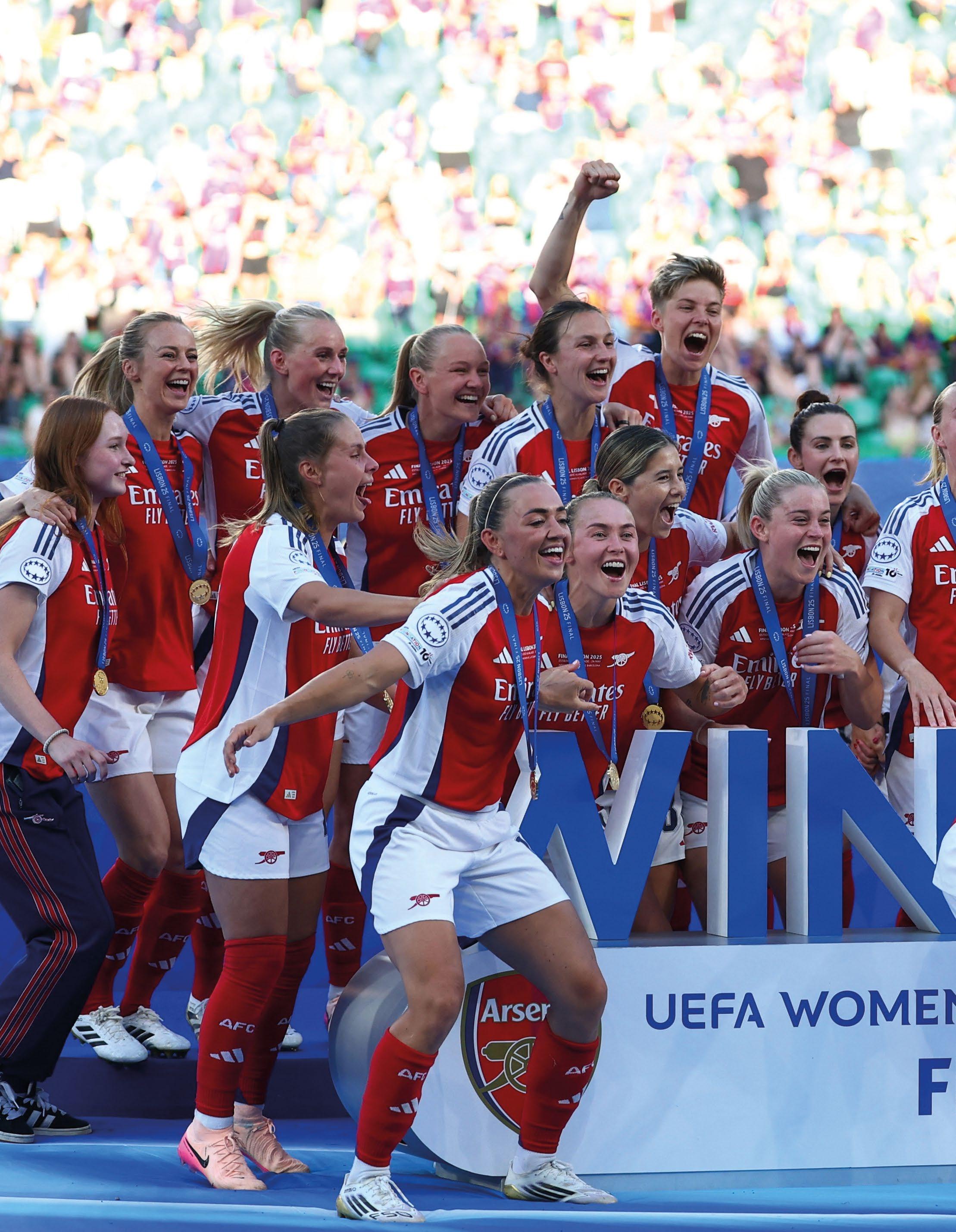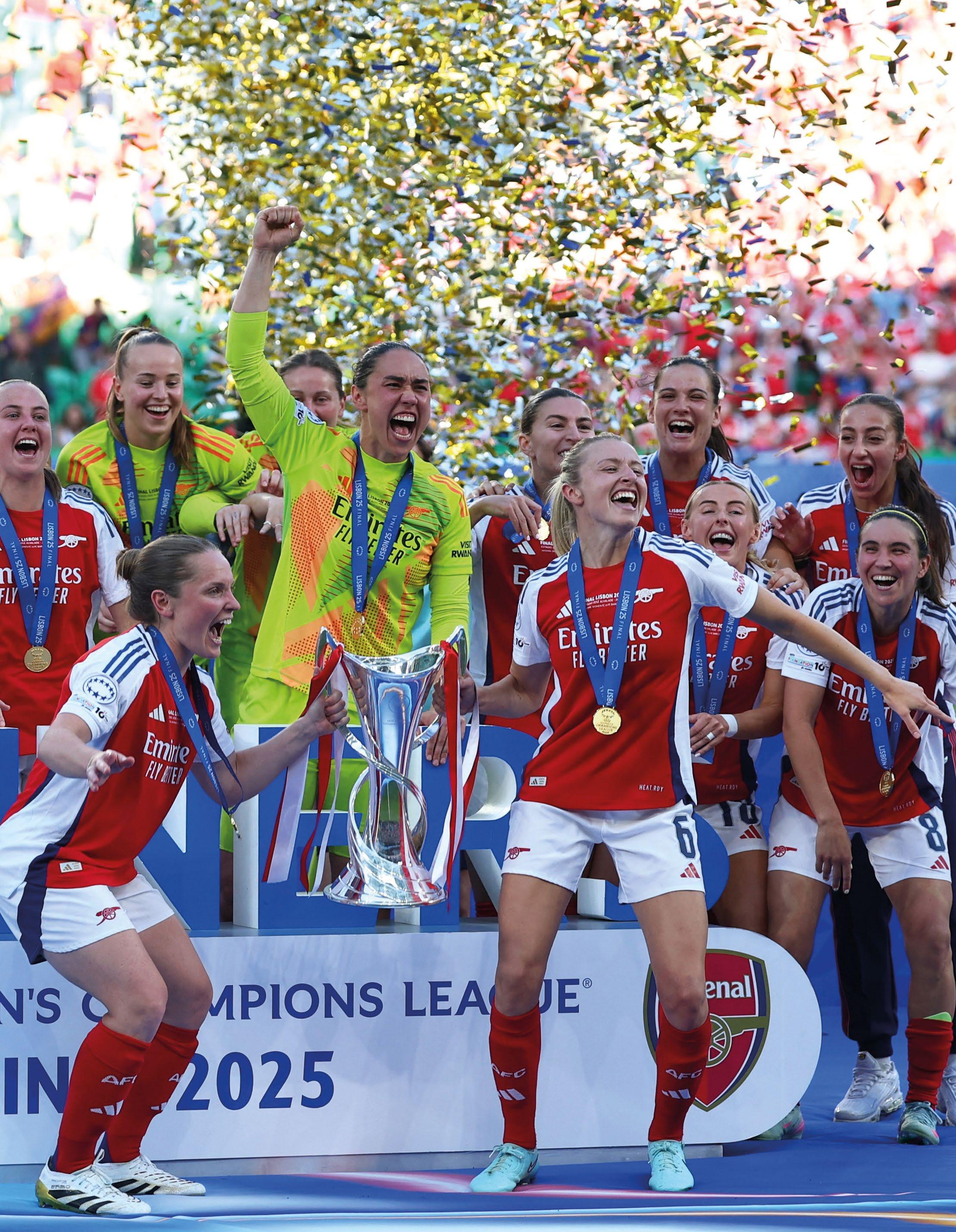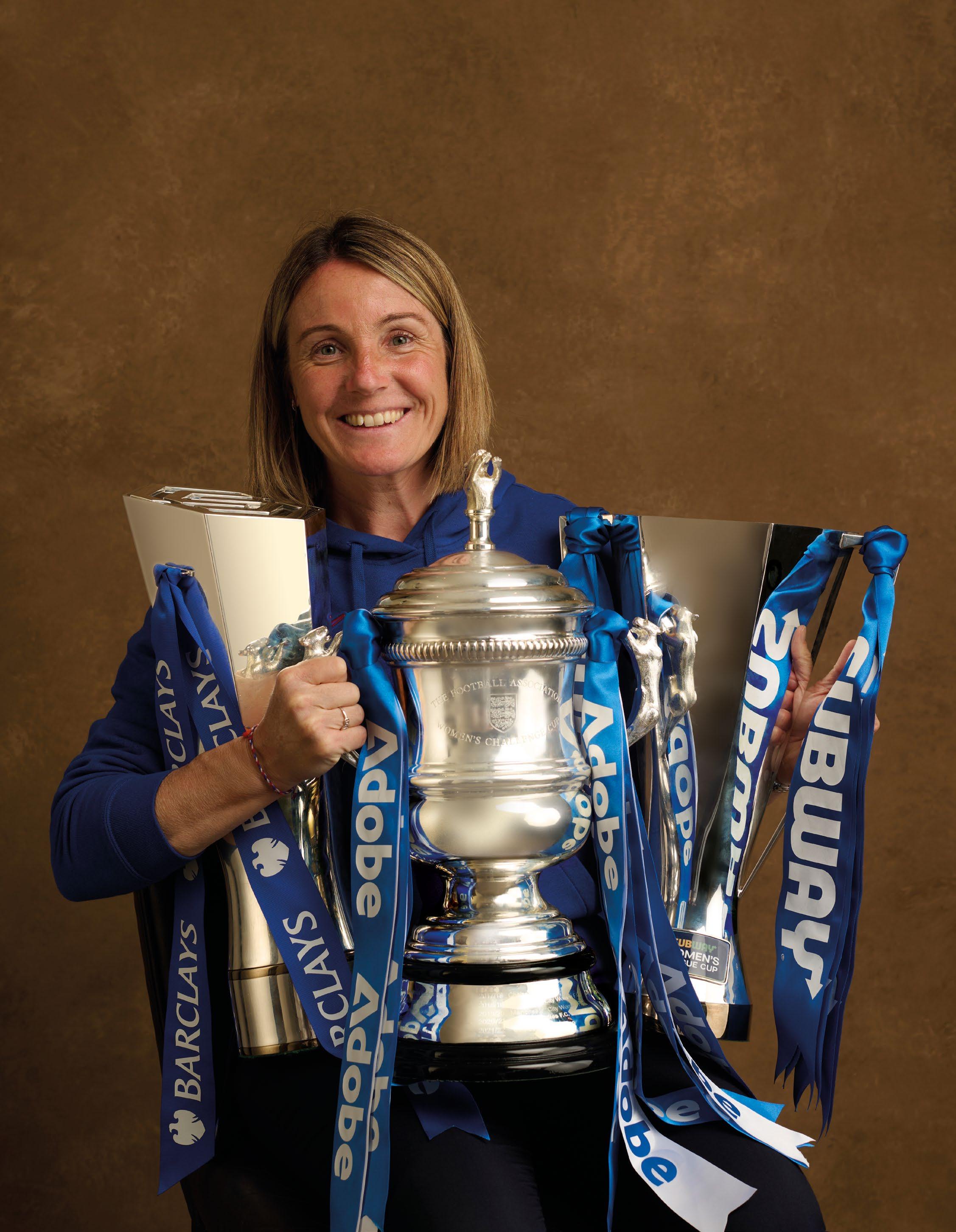

SONIA BOMPASTOR
WHAT WE DID WAS NOTHING SHORT OF

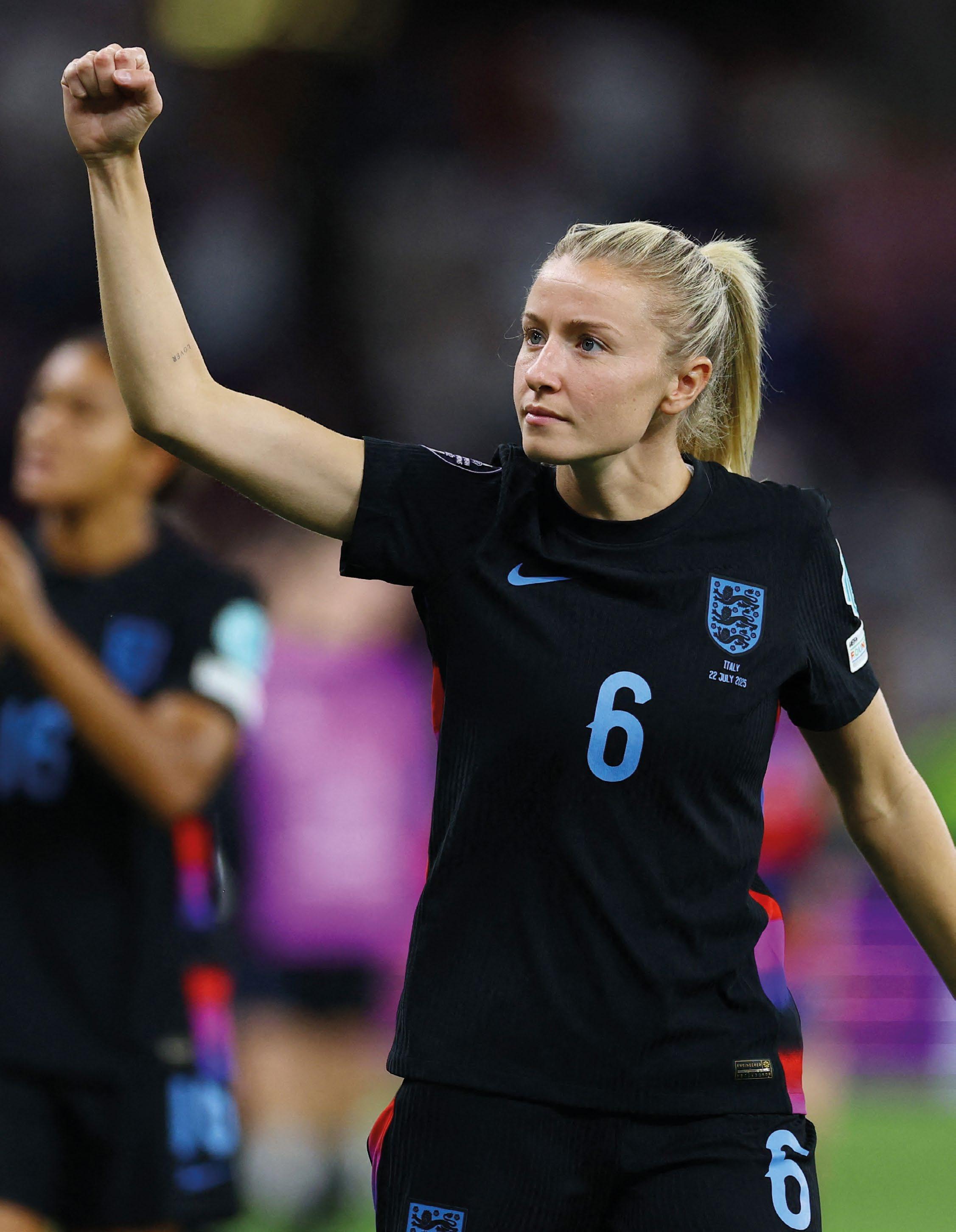
LMA Chief Executive
RICHARD BEVAN OBE.
Congratulations to Sarina Wiegman and Lee Carsley, who led their respective England teams to consecutive European titles this summer. Their determination and resilience were outstanding, and these back-to-back triumphs are a testament to years of hard work and sacrifice. I extend my praise to everyone at The FA who remains committed to developing both the men’s and women’s game.
In May, the LMA hosted its 33rd Annual Awards Dinner at the JW Marriott Grosvenor House London, where it recognised both individual award winners and John Duncan recipients following another memorable season. The prestigious evening also saw the induction of Ian Holloway, Jürgen Klopp, Mick McCarthy, José Mourinho, and David Moyes OBE into the LMA Hall of Fame 1000 Club, in honour of them managing 1,000 competitive matches throughout their careers.
The 2025/26 LMA Diploma in Football Management began in June. I wish all

students success as they start a year of vocationally relevant education, preparing them for the realities and challenges of football management. I also look forward to December, when the 2024/25 cohort will graduate at the renowned Liverpool Philharmonic Hall, a celebration of their fantastic achievements.
The LMA remains restless in the pursuit of its ambitions. We will continue to invest in our ever-expanding team at St. George’s Park, deepening our expertise while always mindful of our purpose-led approach, and will expand our delivery of world-class member services and
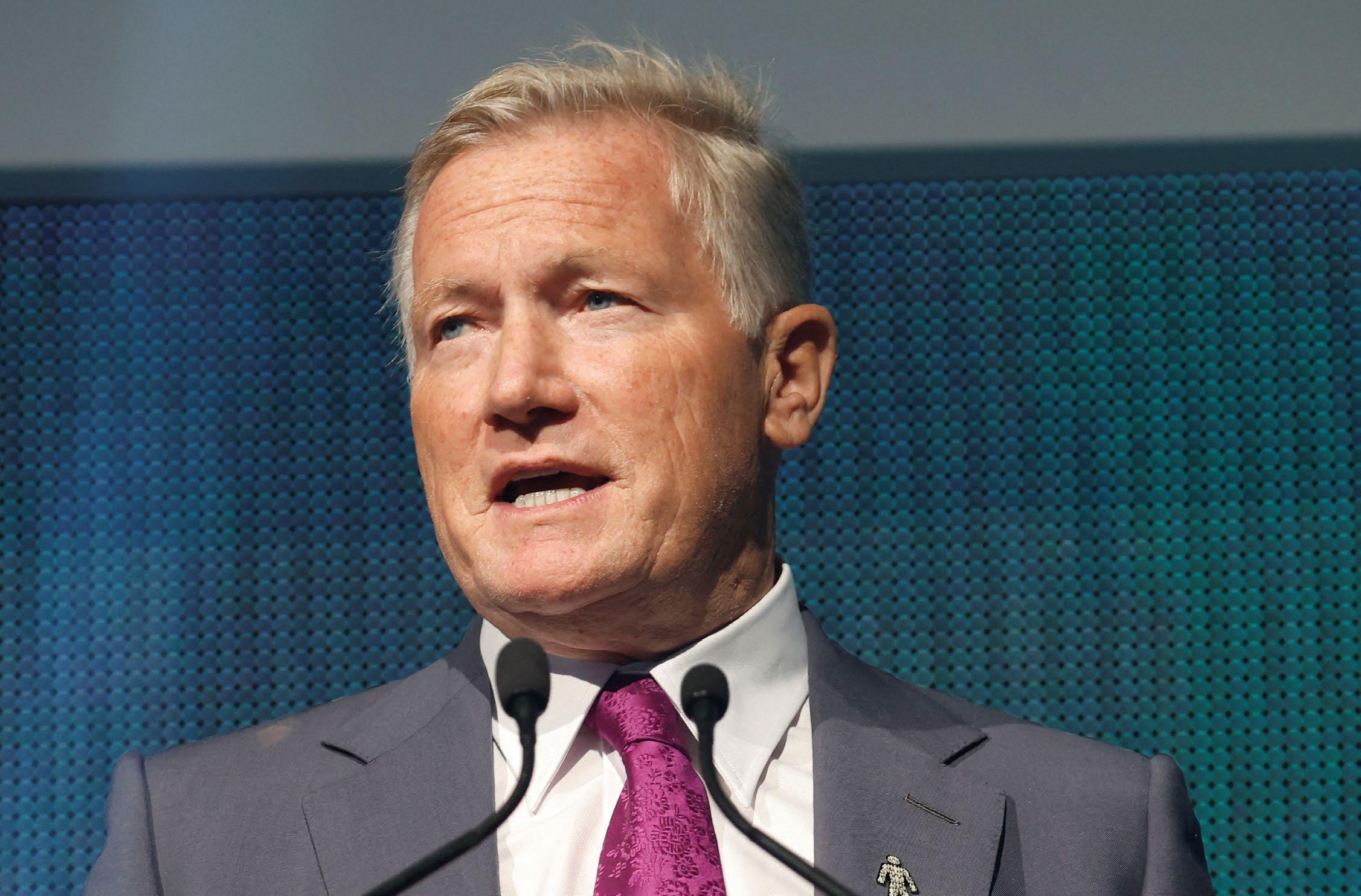
personal development support, seeking out new ideas and concepts to build relationships within the game.
Following an extensive review of the educational and personal development offering delivered by the professional game, 2024/25 saw the launch of the LMA and LCA short-course programme.
These short courses offer a 12-week programme of online learning, focused on a carefully selected range of subjects. Feedback from our first three courses – Coach, Perform and Lead – has been overwhelmingly positive, and we believe that
we have identified a compelling and accessible learning solution for the game, one that provides a structured and deep learning experience.
Without our strong and innovative commercial and service provision relationships, the LMA would not function effectively. Recently, we welcomed Anthony and the team at Everest, the new official partner of the LMA Performance of the Week Award, and were also delighted to announce Premier Relocation as our official relocation partner, ensuring seamless transitions for our members and their families.
We will expand our international horizons, reflecting developments worldwide, ensure the LMA and LCA are fit for purpose in the global game, and continue to strengthen our domestic and international charity and community relationships. We can and must use our position in world football to positively impact people’s lives.
Finally, as we embark on an exciting new season of football and look forward to the opportunities that lie ahead, everyone at the LMA wishes our members the very best of luck with their respective campaigns.
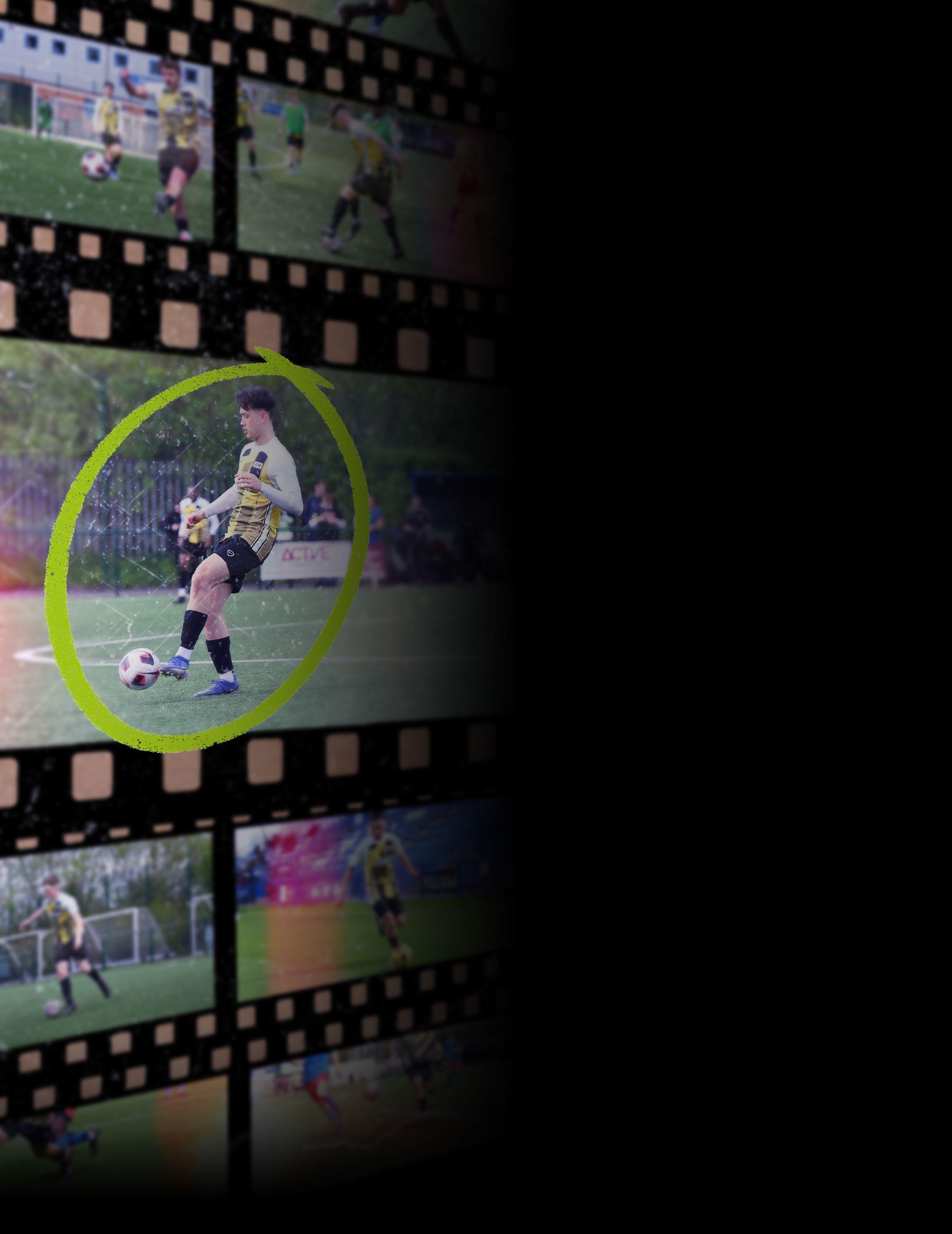


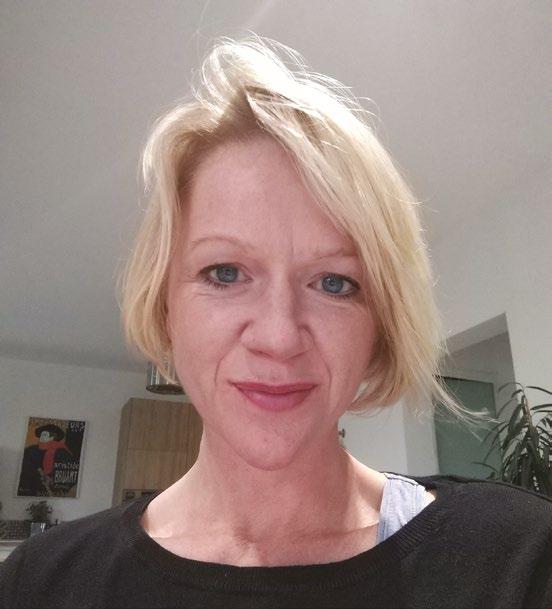
Alice Hoey
FROM THE EDITOR.
What turns a group of individuals into a cohesive, resilient and high-performing team? In this second of our special focus editions of The Manager, it’s the turn of the LMA’s LEAD short course. As course leader Jim Souter explains in more detail on page 34, this online short course programme unravels why it matters so much to us to be part of social groups and how this impacts on our behaviour and thinking.
Along the way, we learn from experienced LMA members such as Mick McCarthy and experts from other fields, including Langley Sharp, former head of the Centre for Army Leadership. “When you feel a strong loyalty and togetherness, your view shifts naturally from ‘me’ to ‘we’,” says Sharp. “You want to protect the group that you belong to, and which is so important to you, so your performance is likely to be enhanced. You’re not just doing it for yourself, you’re doing it for others.”
In this issue, we aim to share the fundamentals of each of the course’s six modules, understanding the psychology and processes underpinning great teams and the leader’s
role in exceptional team performance. Because it’s never solely about recruiting and coaching talent. No amount of skill or hard work will ever achieve success if things like shared vision, goals and values are lacking. These are the constituent elements of a group’s identity and they come from the top down.
The leader plays a crucial role in modelling the team’s behaviours, for example, giving context to its identity, and building strong and lasting connections with its members. As Lauren Smith says in our feature on page 50, “Great teams are never built on individual brilliance. Rather, it’s the brilliance of the team that supports the individual.”


The League Managers Association, St. George’s Park, Newborough Road, Needwood, Burton upon Trent DE13 9PD
The views and opinions expressed by contributors are their own and not necessarily those of the League Managers Association, its members, officers or employees. Reproduction in whole or in part without written permission is strictly prohibited.
www.leaguemanagers.com
EDITOR
Alice Hoey AliceHoey1@gmail.com
EDITOR FOR THE LMA
Sue McKellar
Sue.McKellar@leaguemanagers.com
ART DIRECTOR
Matt Draycott Matt.Draycott@leaguemanagers.com
CONTRIBUTING EDITOR
Luke Johnson Luke.Johnson@leaguemanagers.com
SENIOR WRITER
Mark Farthing Mark.Farthing@leaguemanagers.com
PUBLISHER
Jim Souter
Jim.Souter@leaguemanagers.com
BUSINESS DEVELOPMENT
Adam Tarrant
Adam.Tarrant@leaguemanagers.com
DESIGN
Luna Studio
PHOTOGRAPHY
Action Images, Anna Hemmings, Alamy, C1 Media, Crawley Town, Elite Soccer, Getty Images, iStock, Kick It Out, Liverpool FC, Mark Batch, Paul Winch-Furness, Premier League, Reuters, The FA, Vitality
PRINT PARTNER
Jellyfish Solutions Limited

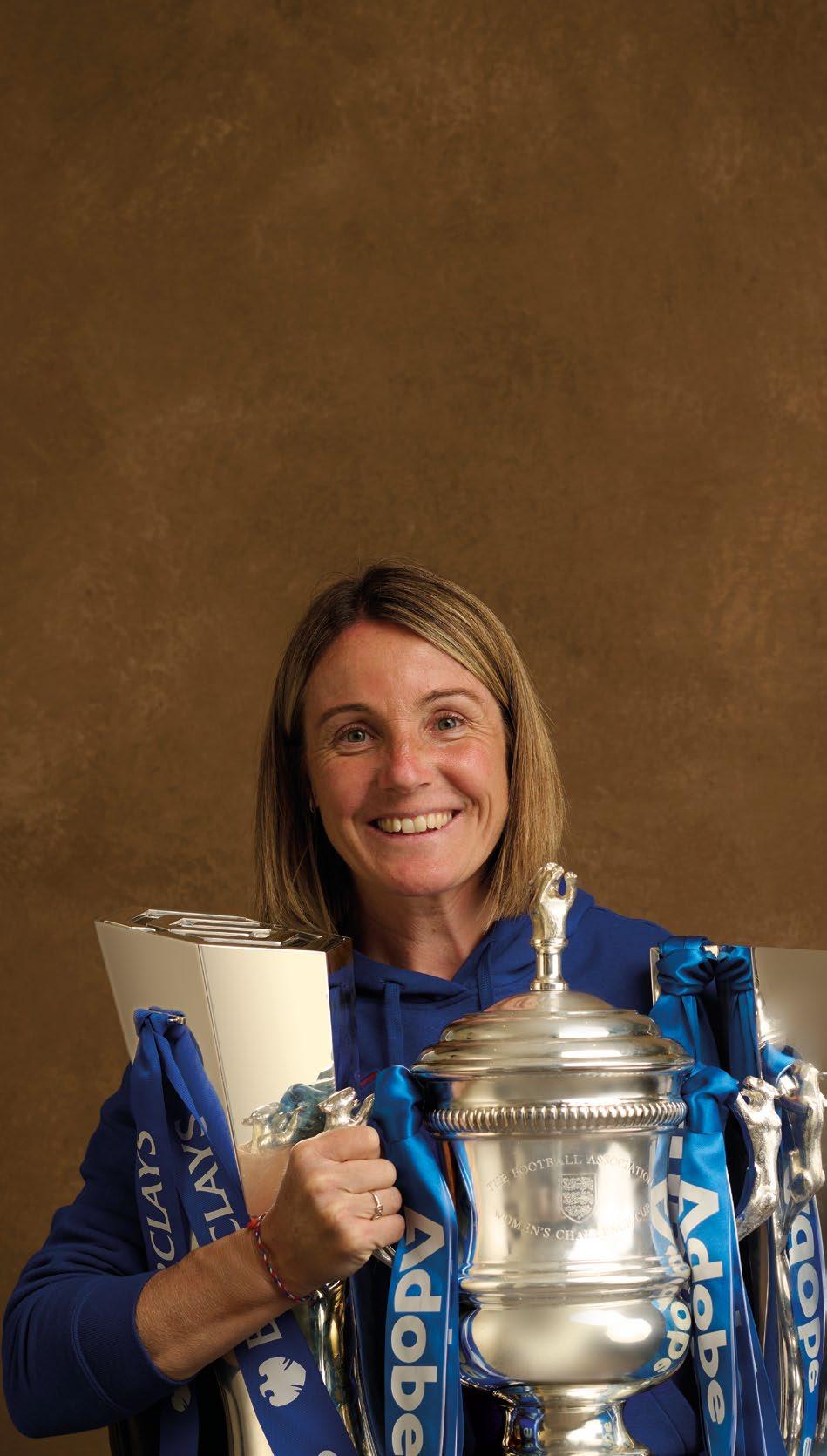
Column: Jim Souter
MODULE 1. Feature: Togetherness and purpose (feat. Langley Sharp)
MODULE 2. Feature: Flexing your style (feat. Mick McCarthy)
MODULE 3. Interview: Lauren Smith (Connections)
MODULE 4. How to: Communication
MODULE 5. Feature: Developing the individual (feat. Dan Micciche)
MODULE 6. 10 ideas: Leading in uncertainty
On the cover: Sonia Bompastor
From another sport: Charlie Hayter, England Women’s Rugby
Key takeaways: Anna Hemmings
Interview: Samuel Okafor, Kick It Out
Editor: Alice Hoey
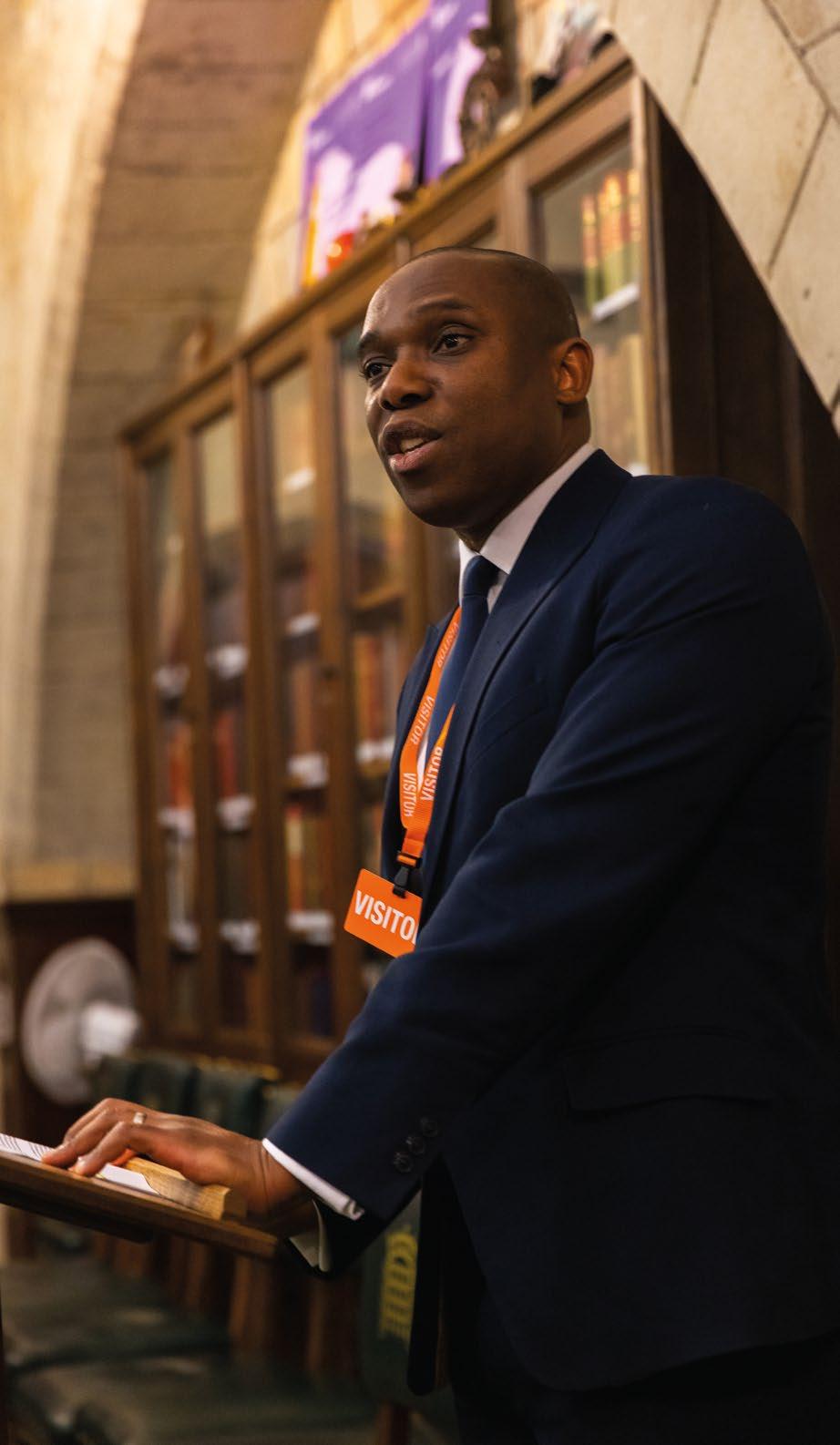
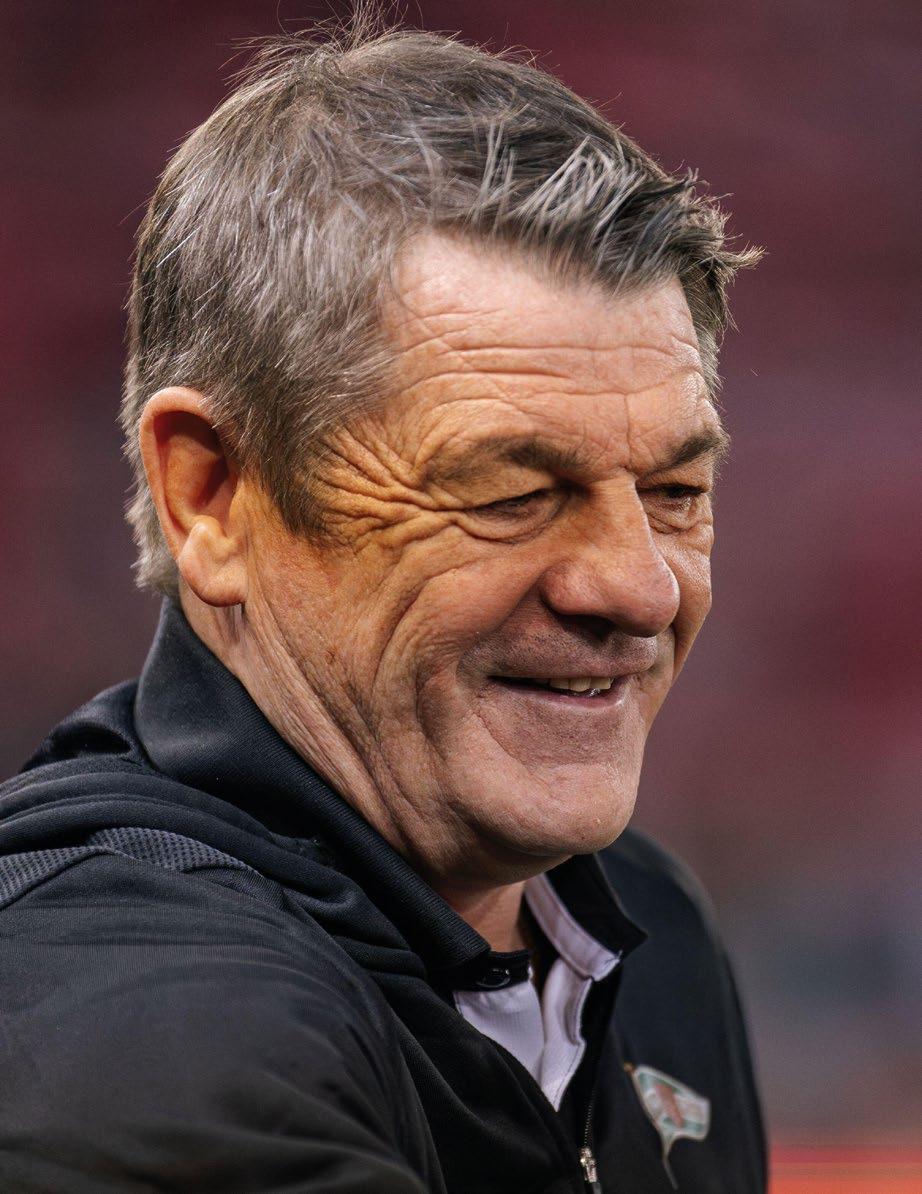
SAMUEL
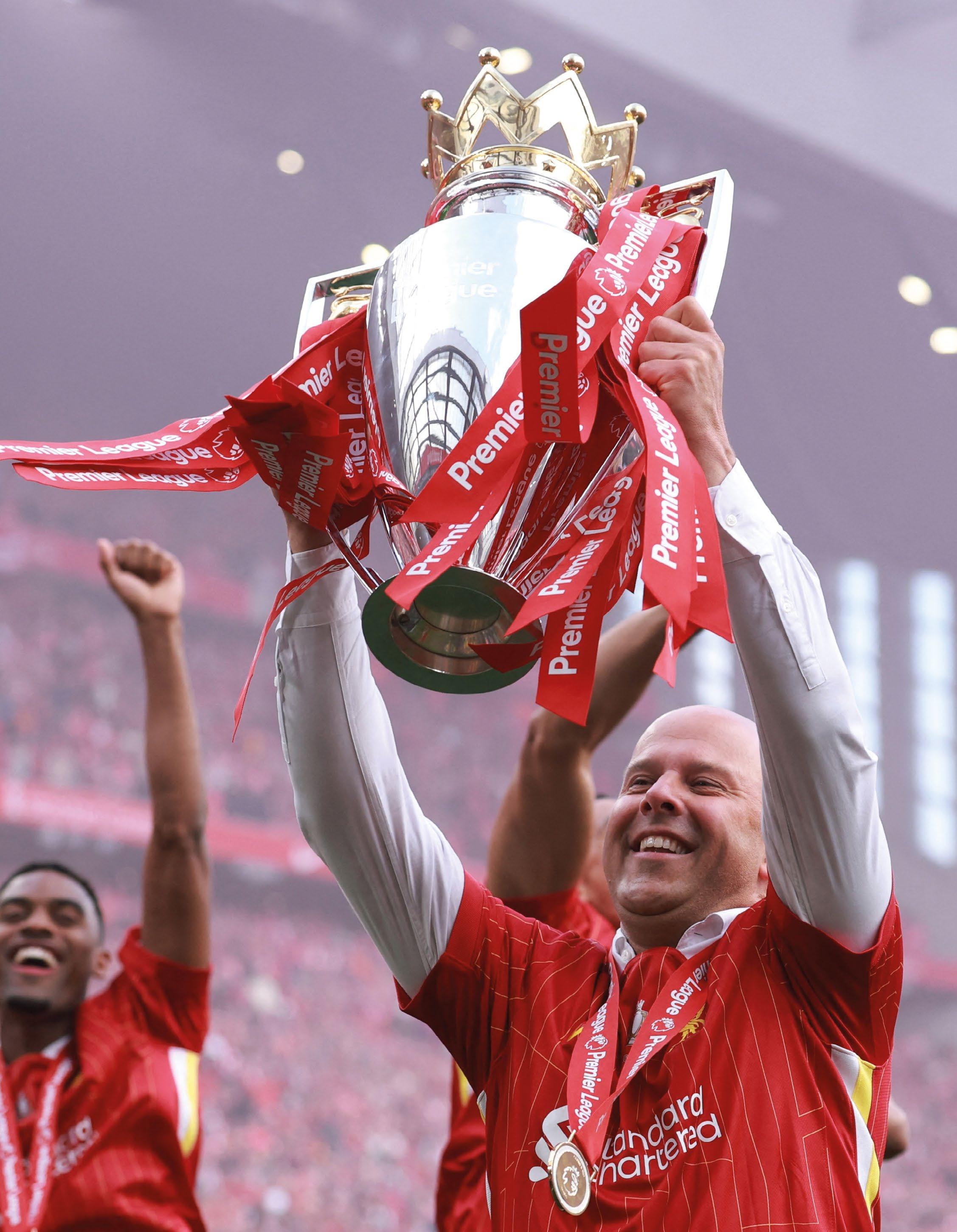
Arne Slot led the Reds to the 2024-25 title in his first season in charge as they finished 10 points clear of second-placed Arsenal. Reuters // Action Images
Liverpool manager Arne Slot was awarded the Sir Alex Ferguson Trophy for the 2024/25 LMA Manager of the Year.
The coveted award, voted for by the full LMA membership, was announced at the 33rd Annual Awards Ceremony at JW Marriott Grosvenor House London on Tuesday 27th May.
Slot was also honoured as the Premier League Manager of the Year sponsored by Barclays following a panel vote. This recognised his success in leading Liverpool to their first Premier League title in five years in his first season in charge, becoming just the fifth manager in league history to do so.
LMA Chief Executive Richard Bevan OBE paid tribute to those affected by the shocking incident at Liverpool’s victory parade, which understandably meant Slot could not be present to collect his awards.
“The LMA’s members recognised the incredible role that Liverpool manager Arne Slot played in leading his team to the Premier League title in a fantastic debut season in English football and he will be presented with the Sir Alex Ferguson Trophy for LMA Manager of the Year and the Premier League
Manager of the Year award at a more appropriate time.”
Other awards presented on the night included Daniel Farke, who won Sky Bet Championship Manager of the Year after Leeds United secured promotion back to the Premier League. Birmingham City manager Chris Davies collected the Sky Bet League One Manager of the Year following his titlewinning debut season, while Grant McCann of Doncaster Rovers picked up Sky Bet League Two Manager of the Year after assuring third tier football next season.
Portsmouth Women manager Jay Sadler was recognised as the Barclays Women’s Championship Manager of the Year after a promising maiden campaign in the division. The Barclays Women’s Super League Manager of the Year went to Sonia Bompastor after leading Chelsea Women to the WSL title.
Bompastor was also joined by Oliver Glasner (Crystal Palace), Eddie Howe (Newcastle United), Ange Postecoglou (Tottenham Hotspur) and Renée Slegers (Arsenal Women) in receiving the LMA John Duncan Award.
In awarding the John Duncan Awards, the LMA recognises
individuals who have achieved notable and historic successes for their clubs. Bompastor was acknowledged for achieving the domestic treble with Chelsea Women in her first season at the helm, Howe for victory in the Carabao League Cup and Newcastle’s first major trophy in 70 years, and Glasner for leading Palace to their first ever major trophy after winning the Emirates FA Cup.
Postecoglou was recognised for his triumph in the UEFA Europa League earlier this month, while Slegers oversaw Arsenal Women’s success in winning the UEFA Women’s Champions League.
The evening also provided the opportunity to induct LMA members Ian Holloway, Jürgen Klopp, Mick McCarthy, José Mourinho and David Moyes OBE into the LMA Hall of Fame 1000 Club, honouring the remarkable achievement of managing 1000 competitive matches throughout their incredible careers.
Amassing 46 domestic and European trophies between them, all were in attendance, adding their names to the long list of iconic managers to have left their mark on the professional game.

“I
extend my congratulations to Arne Slot on winning LMA Manager of the Year following a memorable first season at Liverpool. It takes a visionary with incredible determination to take over and win titles at one of the most illustrious clubs in the Premier League and to follow in the footsteps of fellow award winner Jürgen Klopp.”
O’NEILL OBE LMA CHAIR
MARTIN

“ The LMA was proud to induct Ian Holloway, Jürgen Klopp, Mick McCarthy, José Mourinho and David Moyes OBE into the esteemed LMA Hall of Fame 1000 Club. They now join an elite group of pioneers who have demonstrated the resilience, commitment and sacrifice required to be a modern day manager.
The LMA Hall of Fame 1000 Club is a celebration of success and longevity in the game, and on behalf of everyone at the LMA, I congratulate all inductees on reaching this outstanding milestone and thank them all for their extraordinary service to our sport.
Finally, I wish to thank our awards partners: Premier League, Sky Sports, Guinness, Nike, Barclays, Sky Bet, Utilita and Mappin & Webb for their continued support.”
RICHARD BEVAN OBE LMA CHIEF EXECUTIVE
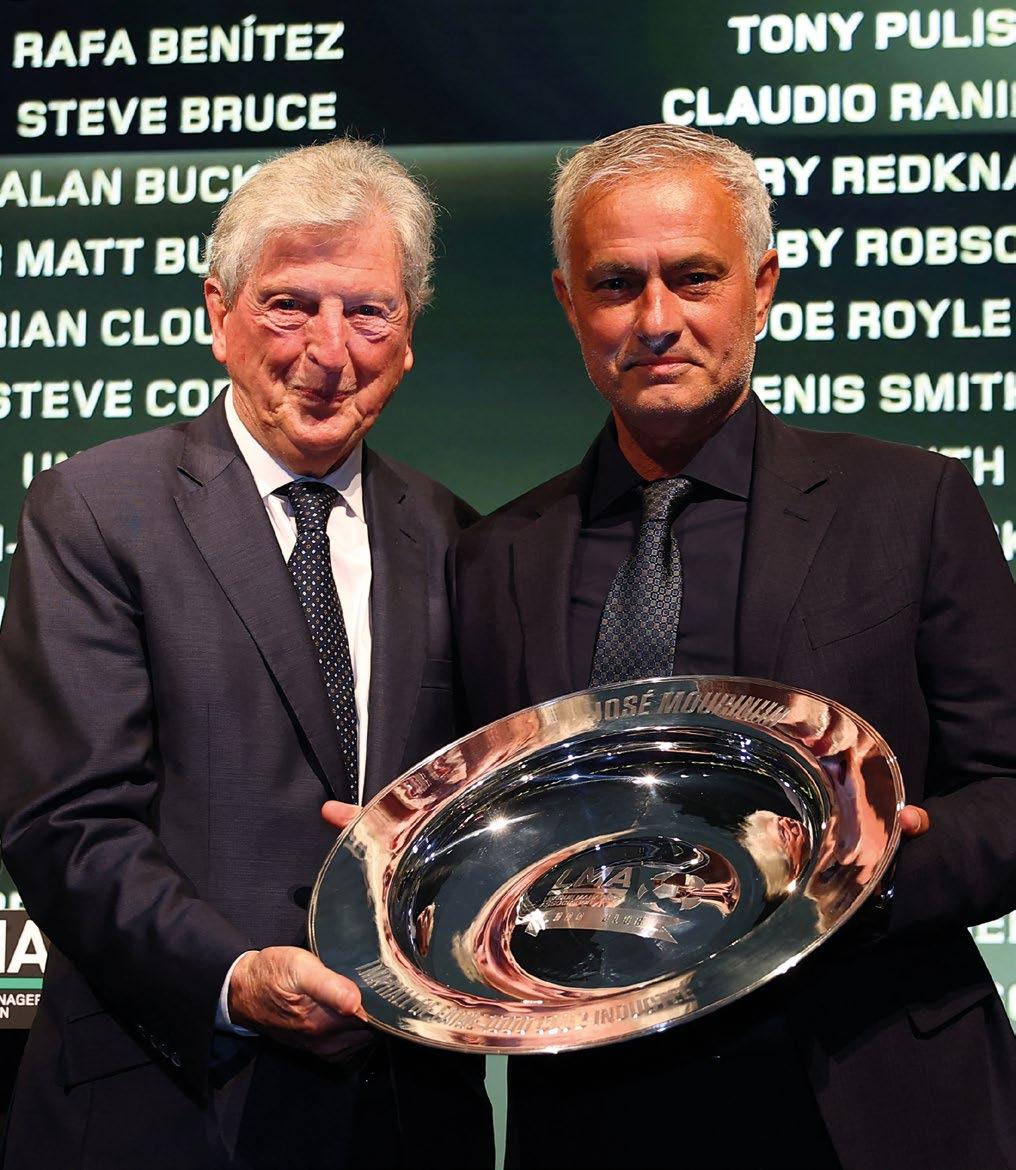
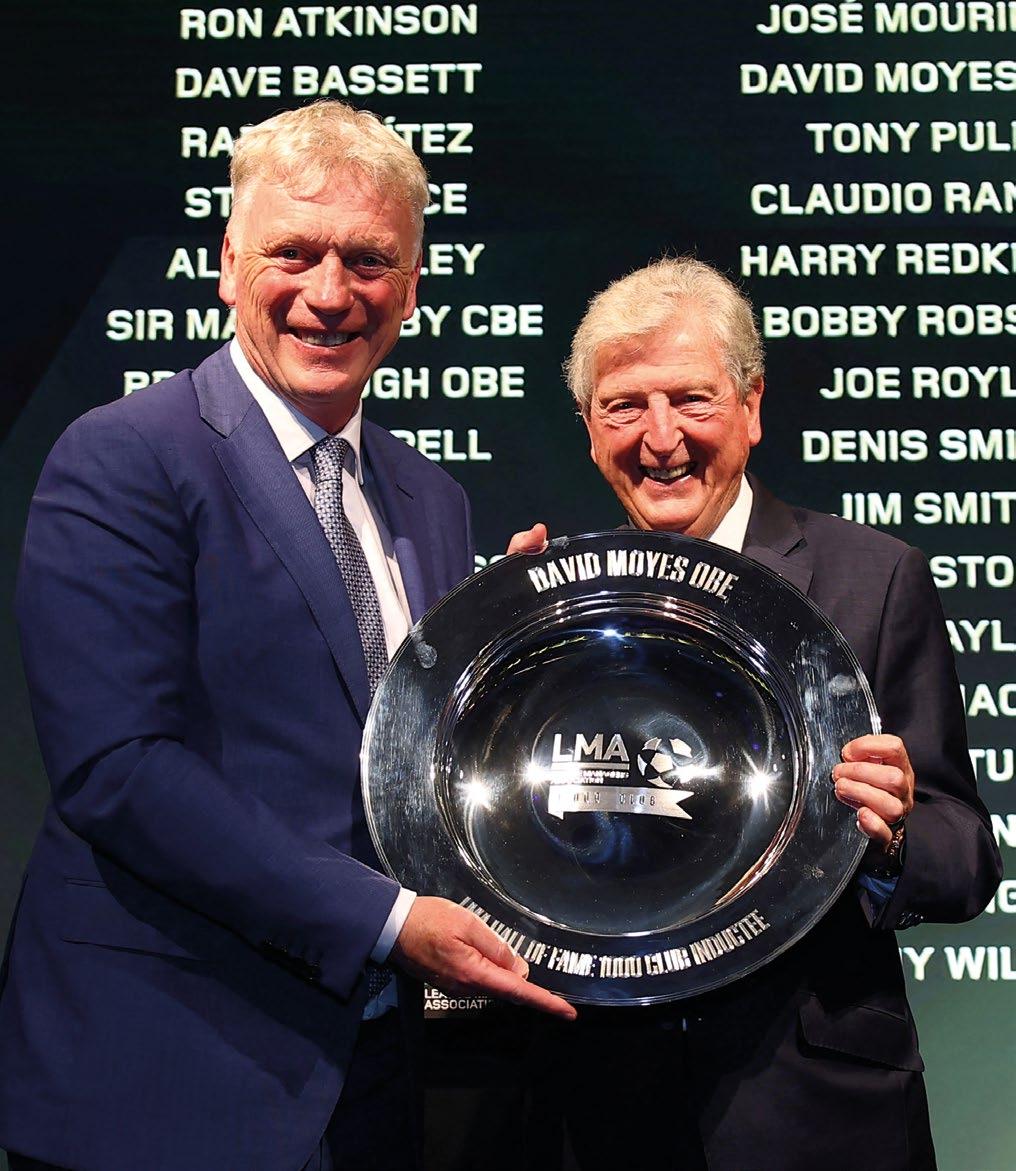
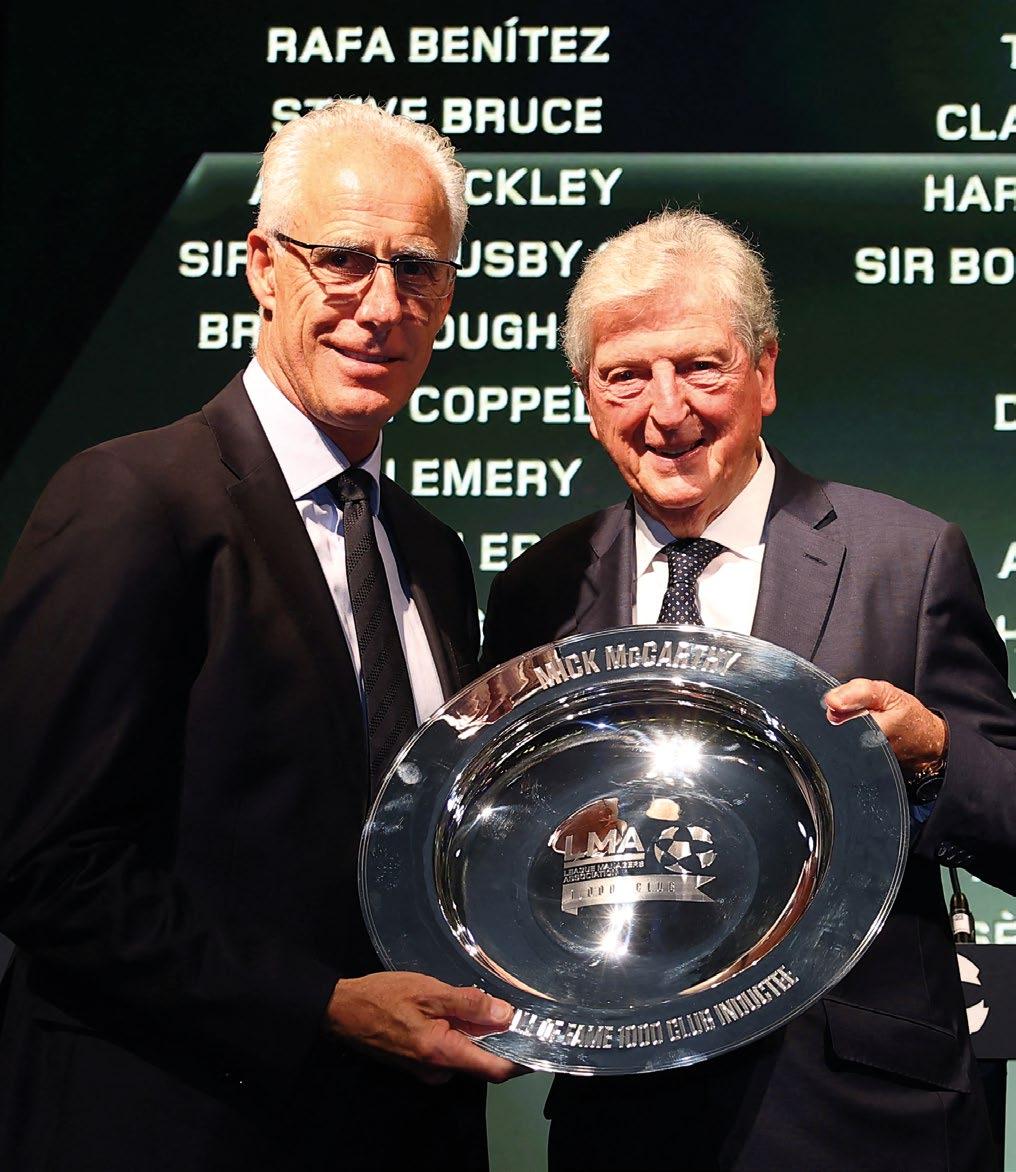
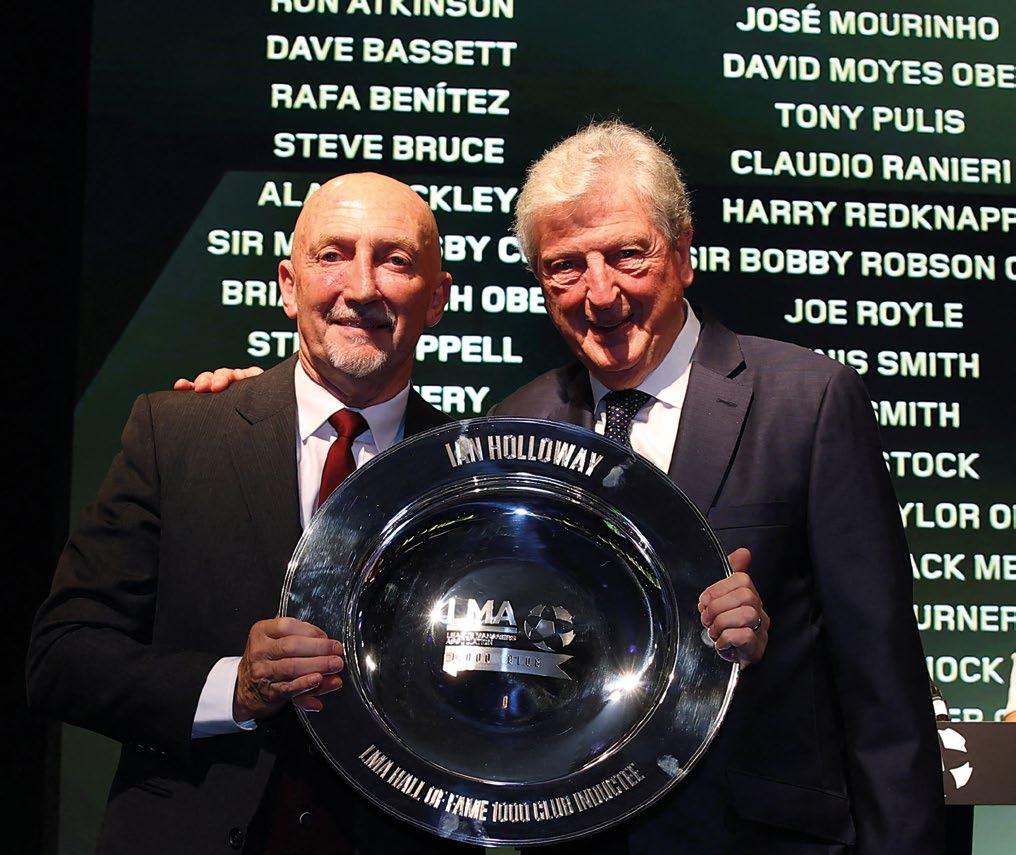
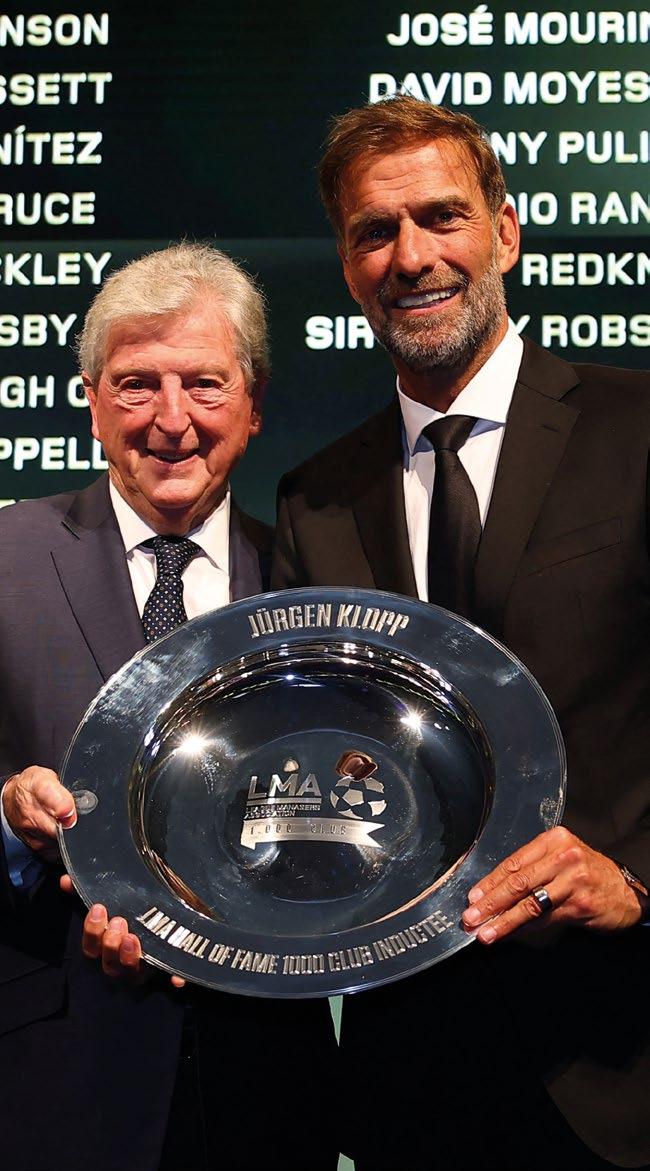

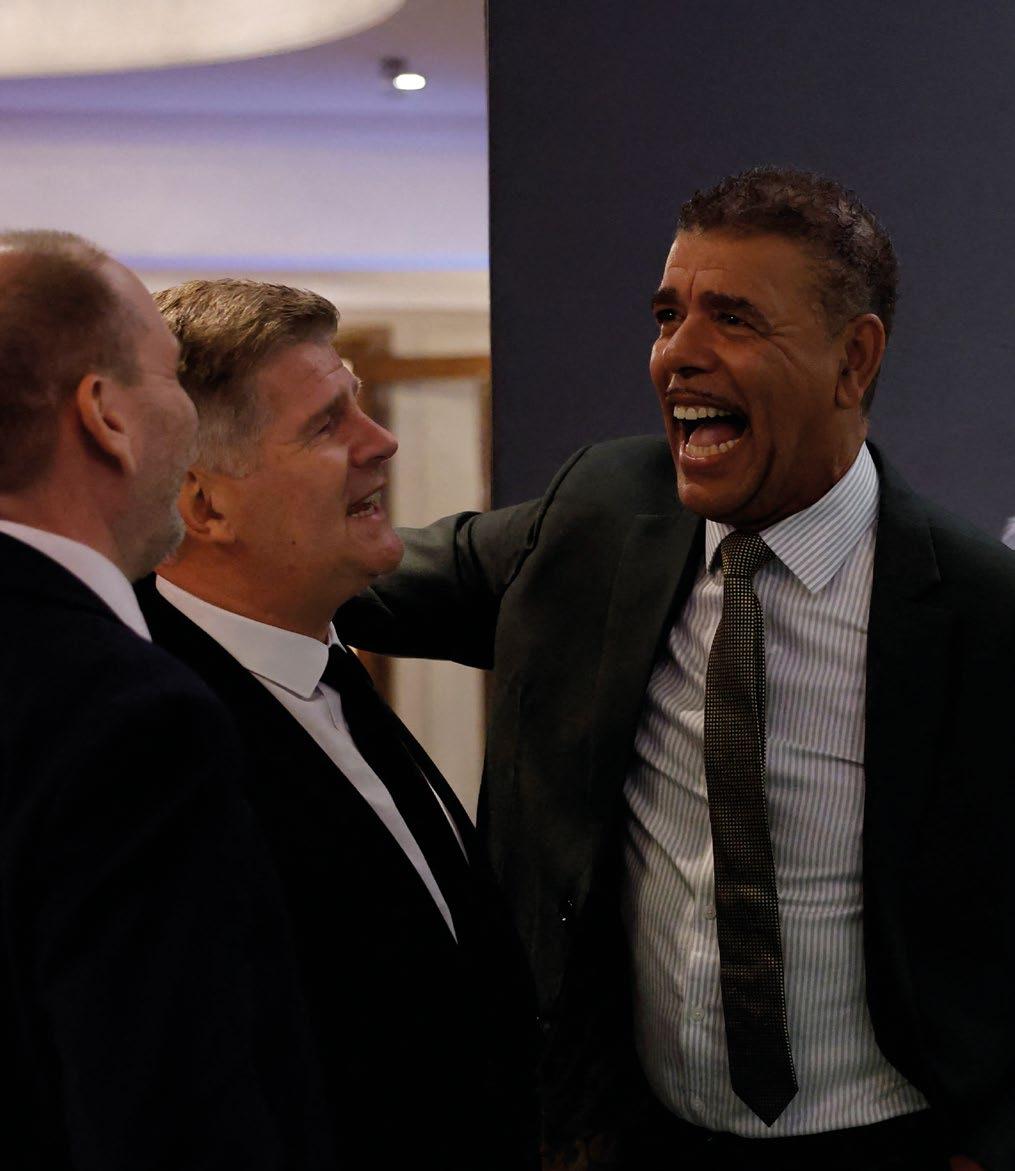
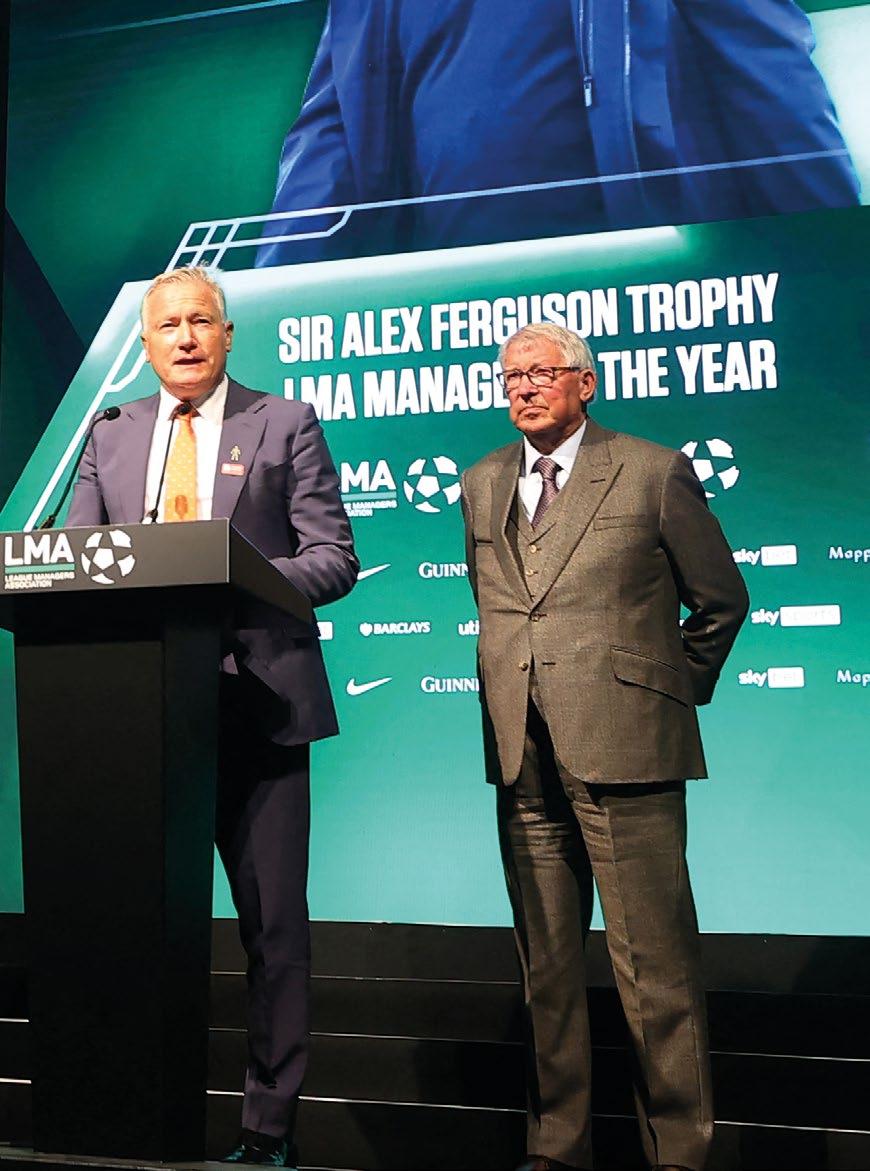
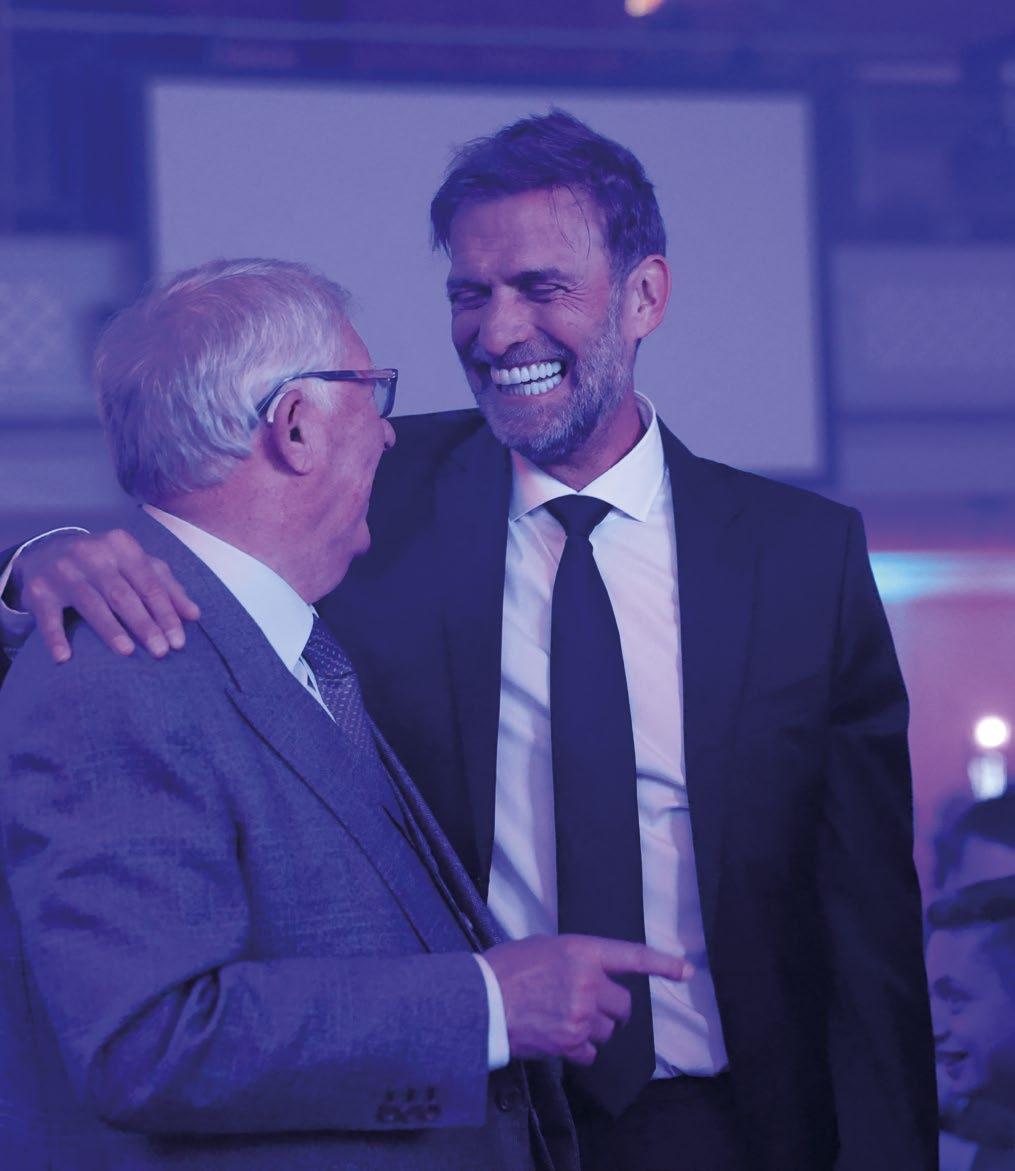
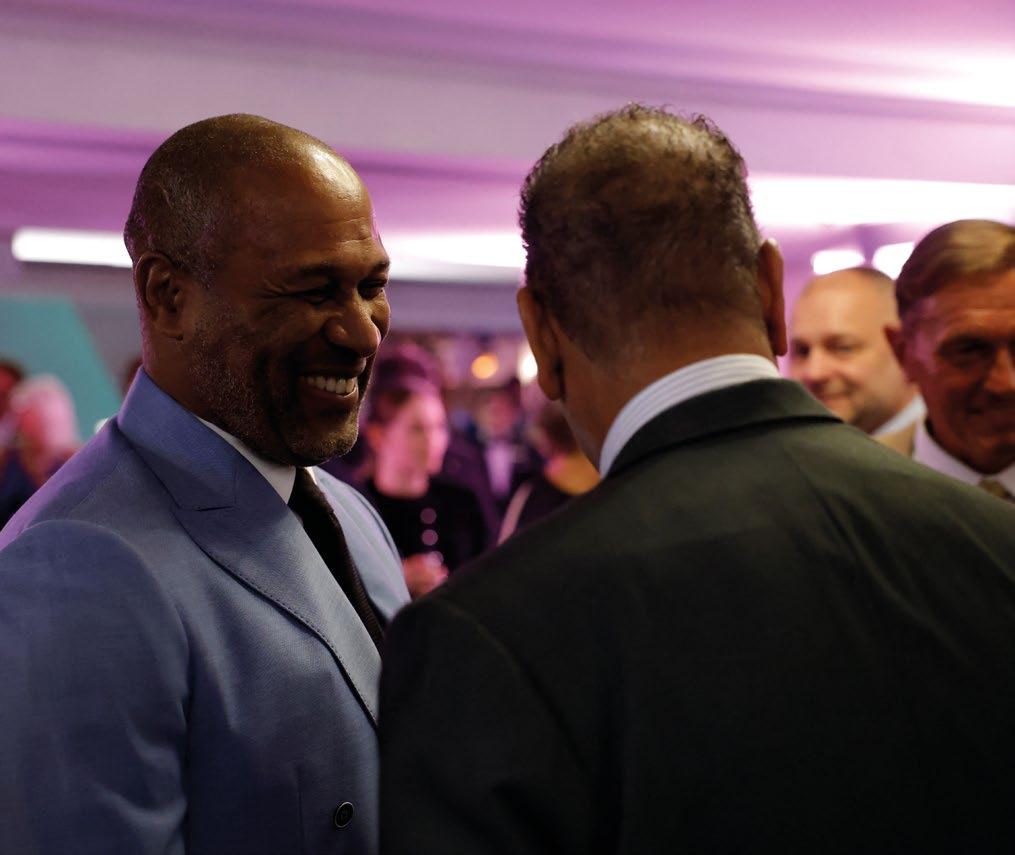
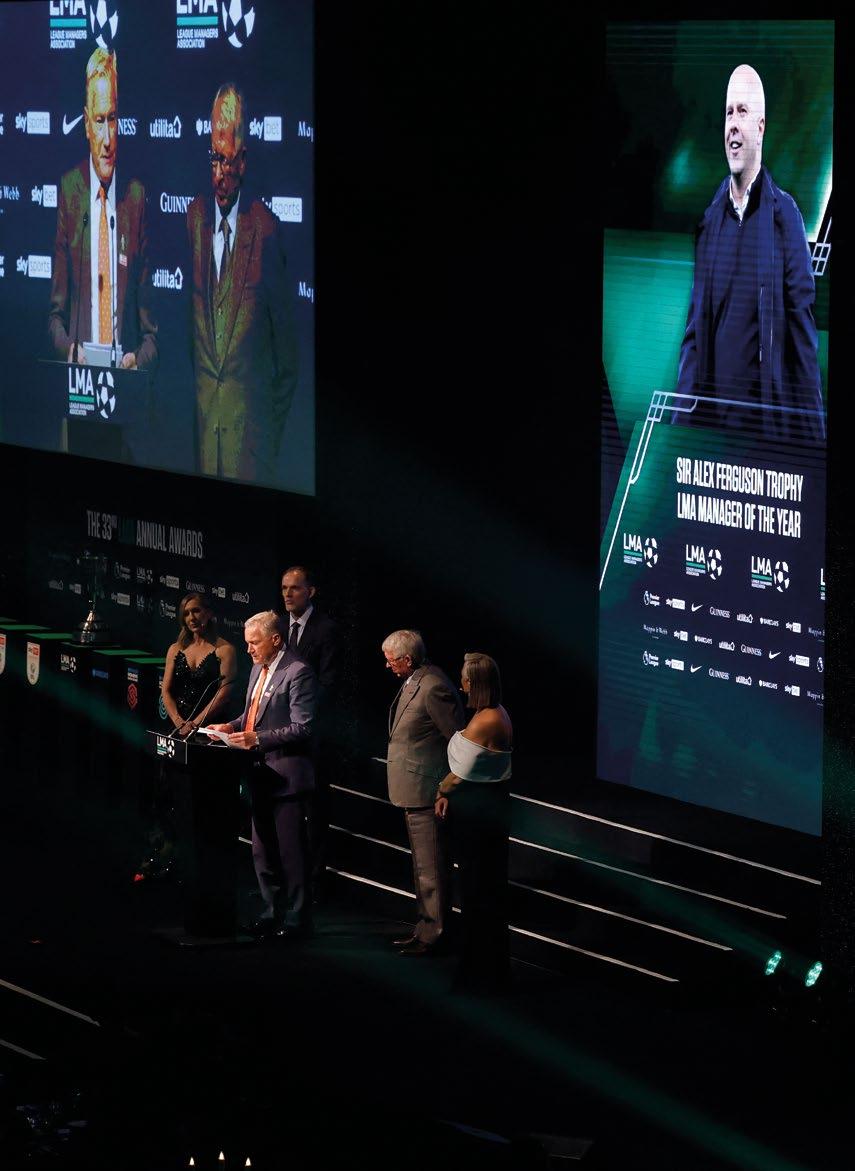




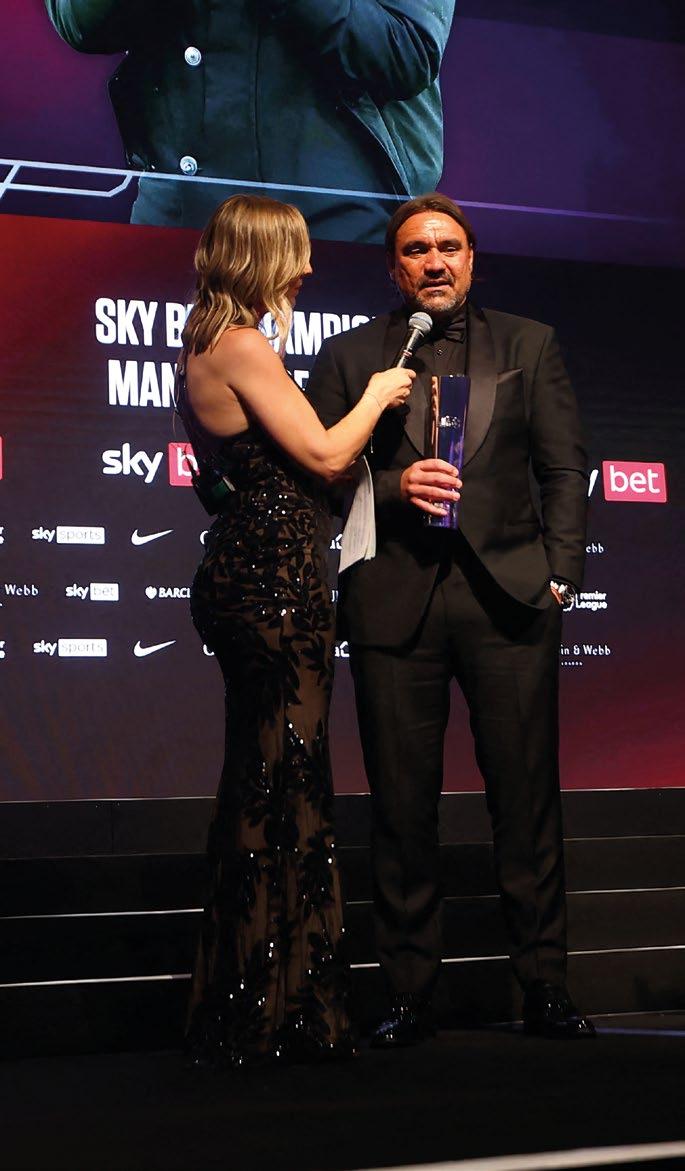
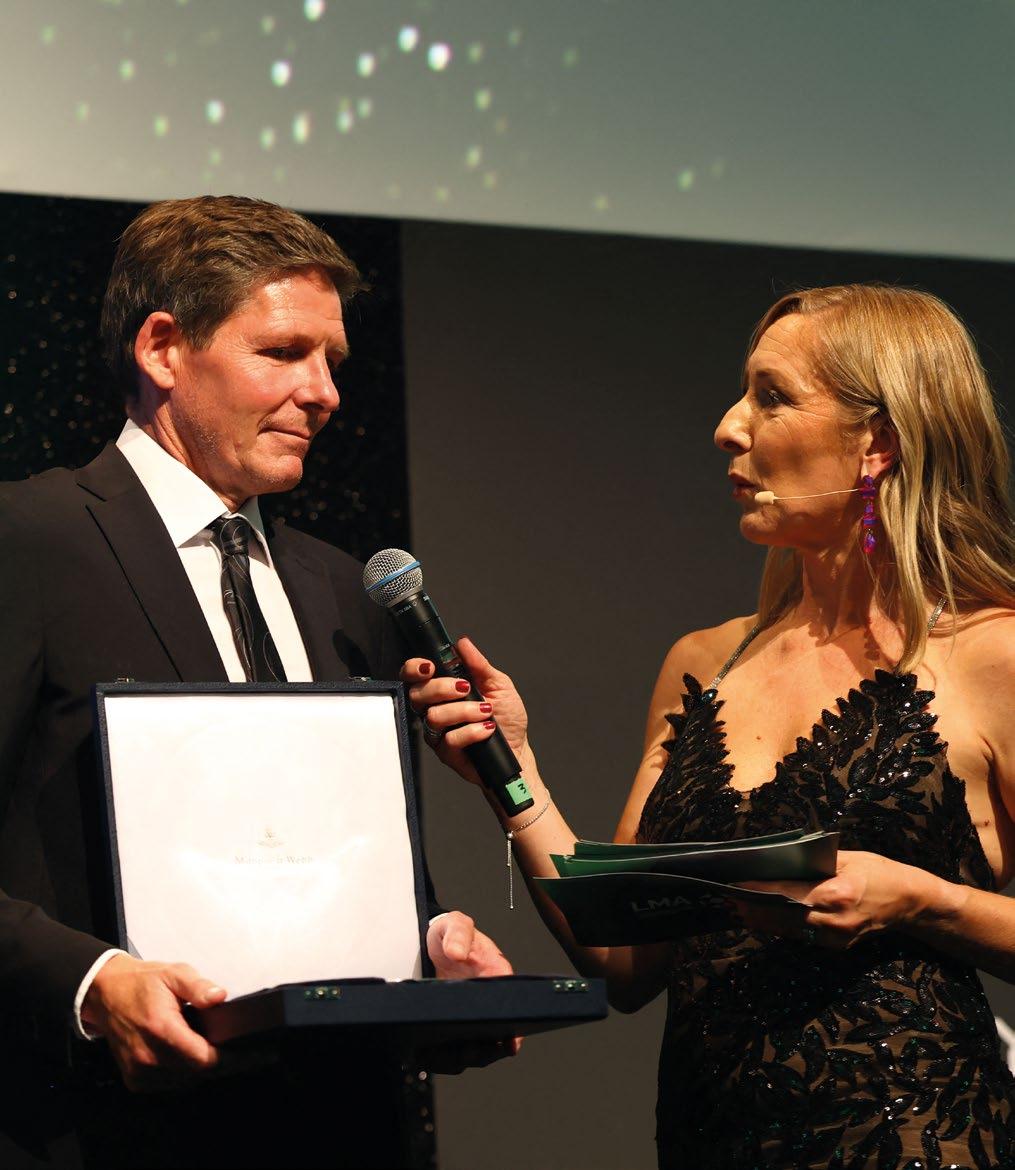
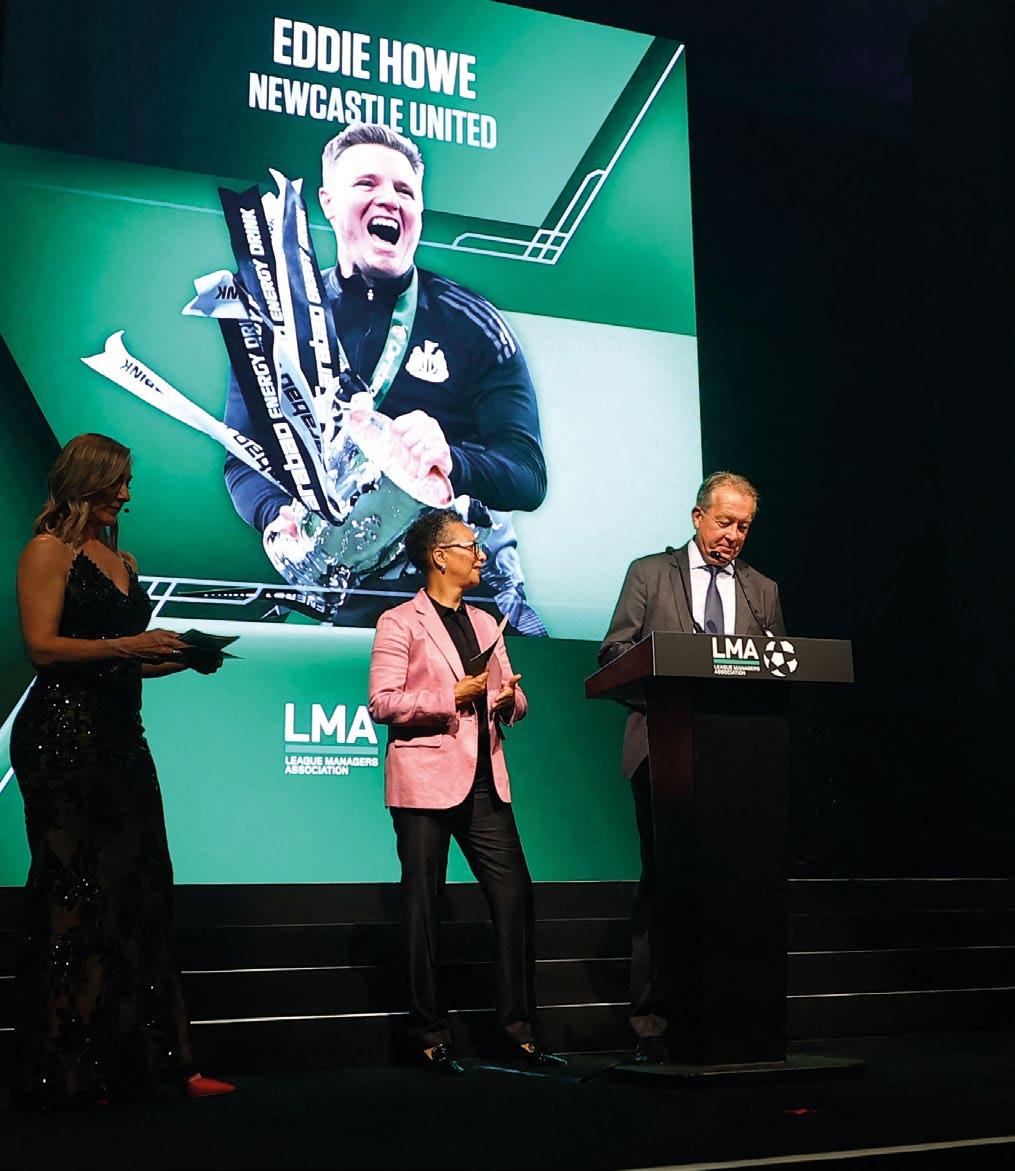

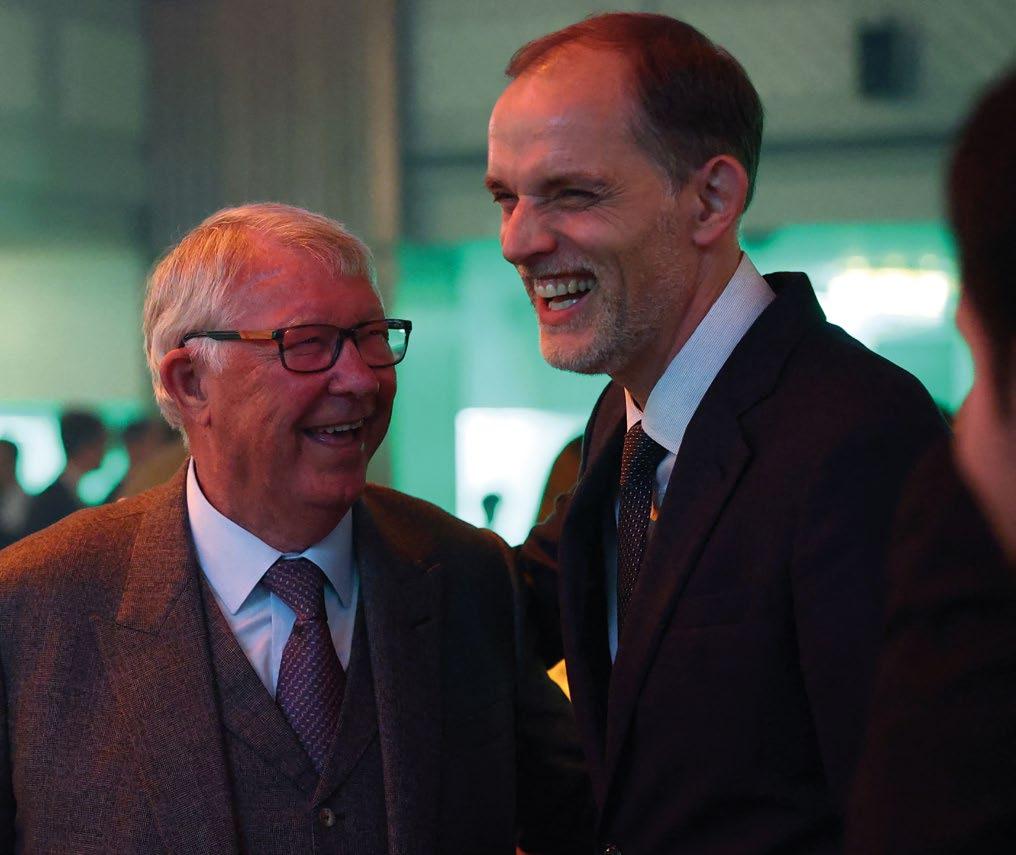
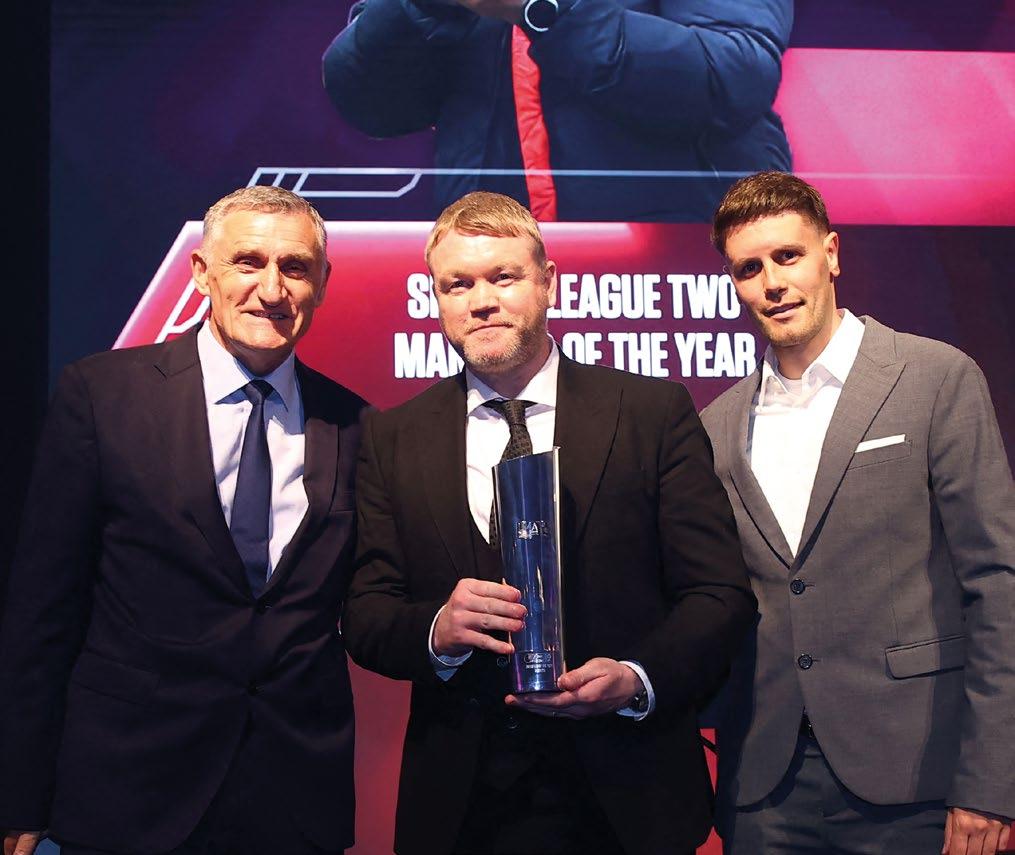
2024/25 AWARD WINNERS.
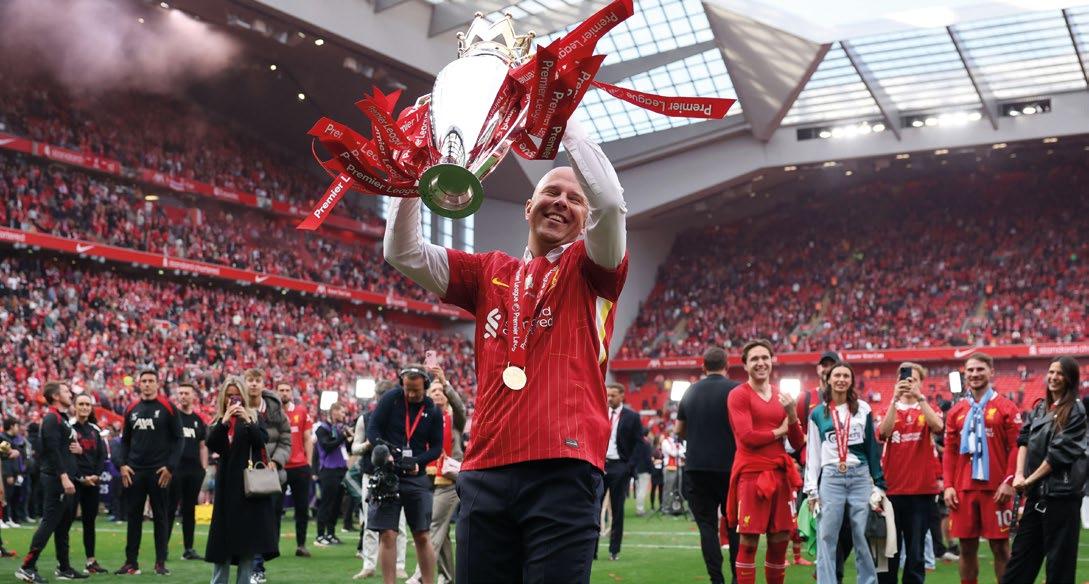
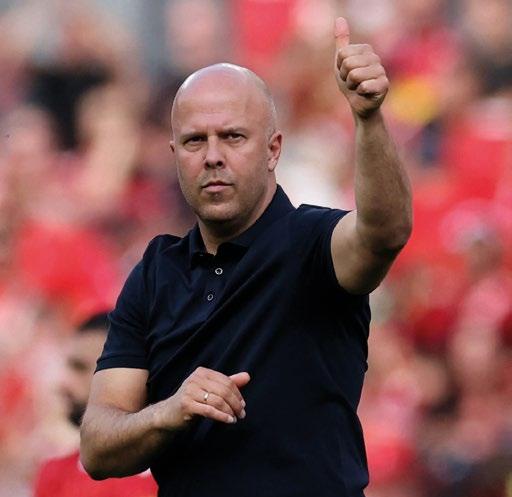
PREMIER LEAGUE MANAGER OF THE YEAR
ARNE SLOT

THE SIR ALEX FERGUSON TROPHY FOR THE LMA MANAGER OF THE YEAR
ARNE SLOT
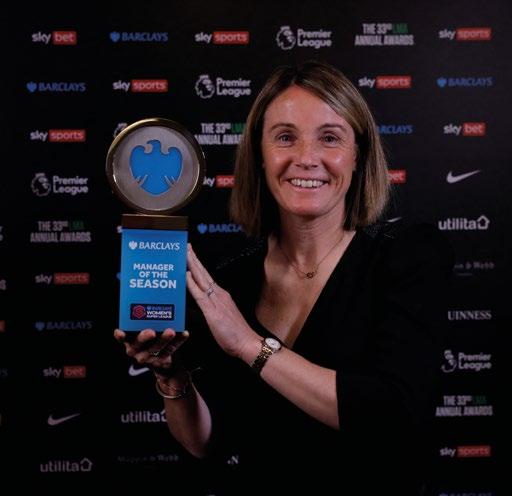
BARCLAYS WOMEN’S SUPER LEAGUE MANAGER OF THE YEAR
SONIA BOMPASTOR
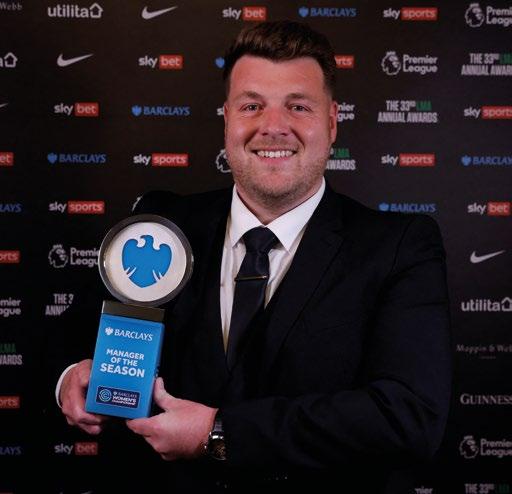
BARCLAYS WOMEN’S CHAMPIONSHIP MANAGER OF THE YEAR
JAY SADLER
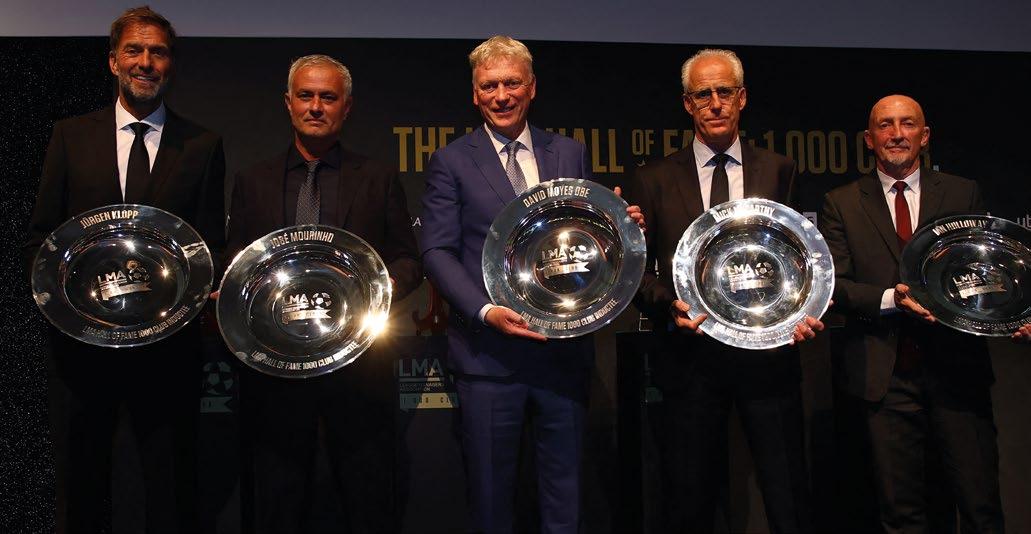
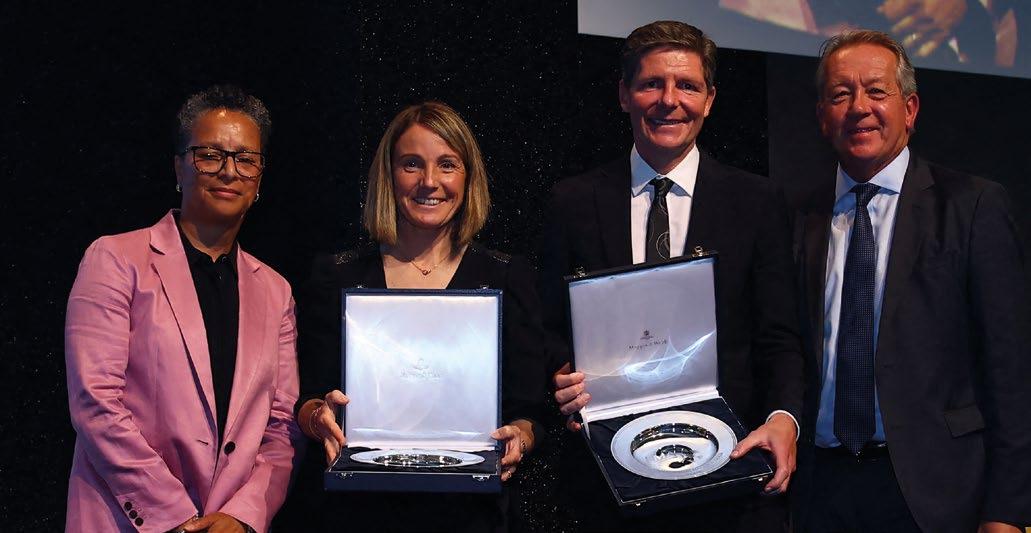
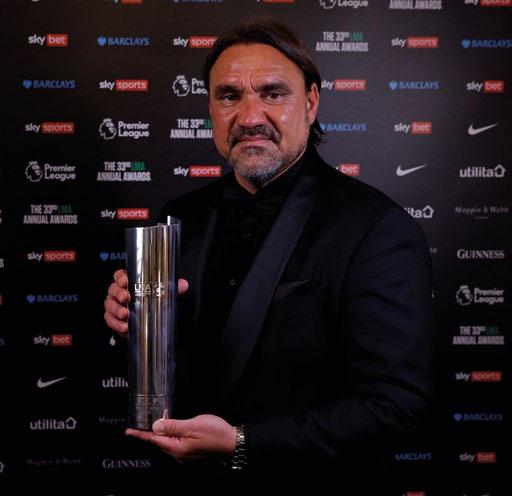
SKY BET CHAMPIONSHIP MANAGER OF THE YEAR
DANIEL FARKE

LMA HALL OF FAME 1000 CLUB
IAN HOLLOWAY
JÜRGEN KLOPP
MICK MCCARTHY
JOSÉ MOURINHO
DAVID MOYES OBE
LMA JOHN DUNCAN AWARD
SONIA BOMPASTOR
LEE CARSLEY
OLIVER GLASNER
EDDIE HOWE
ENZO MARESCA
ANGE POSTECOGLOU
RENÉE SLEGERS
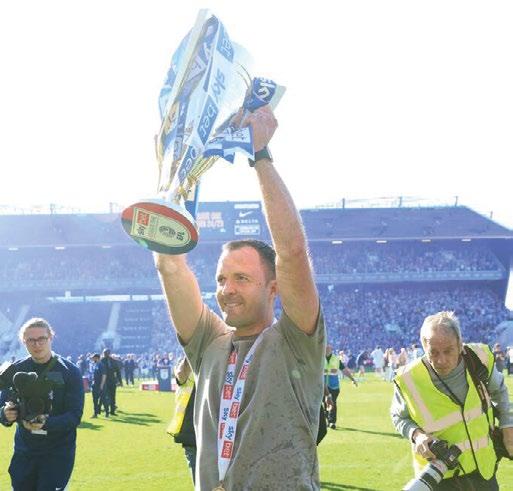
SKY BET LEAGUE ONE MANAGER OF THE YEAR
CHRIS DAVIES
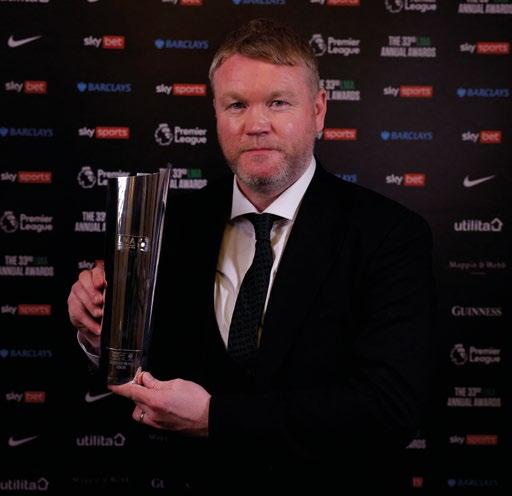
SKY BET LEAGUE TWO MANAGER OF THE YEAR GRANT MCCANN
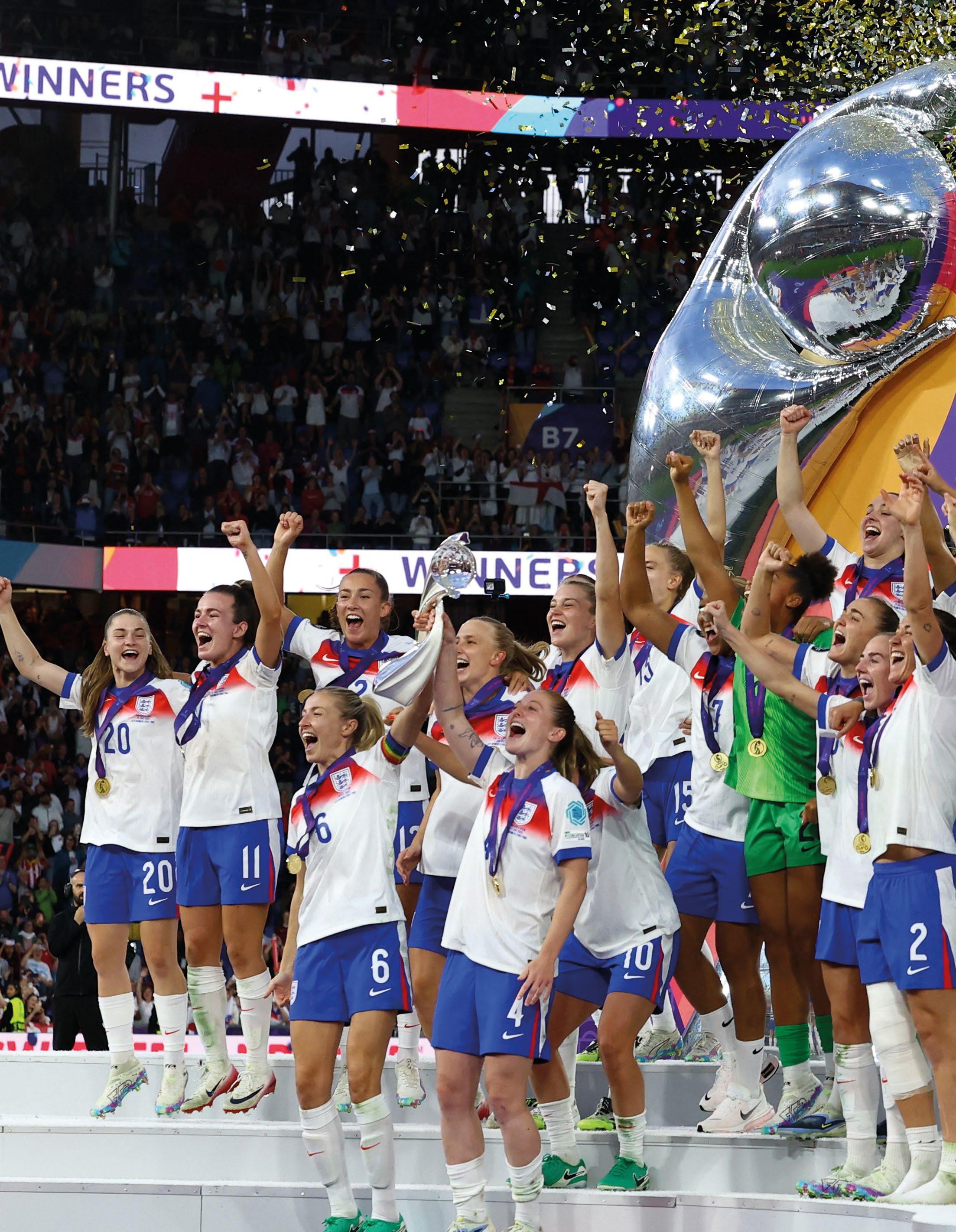
CHAMPIONS.
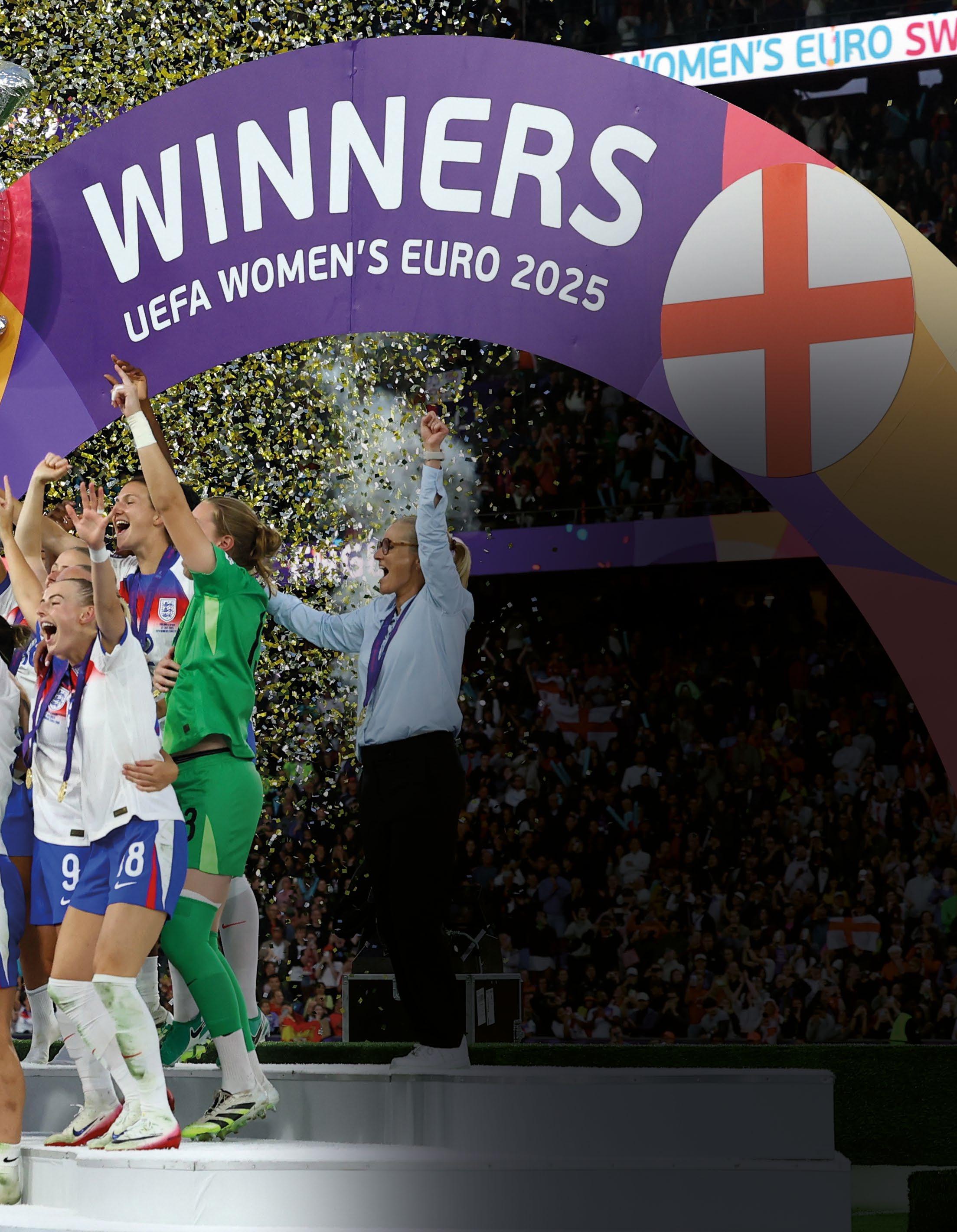
Following the Lionesses’ victory against Spain in the final of the UEFA Women’s Euro 25, successfully retaining the title, we celebrate their incredible achievement and look back to key moments in the competition.
Photography: Reuters // Action Images
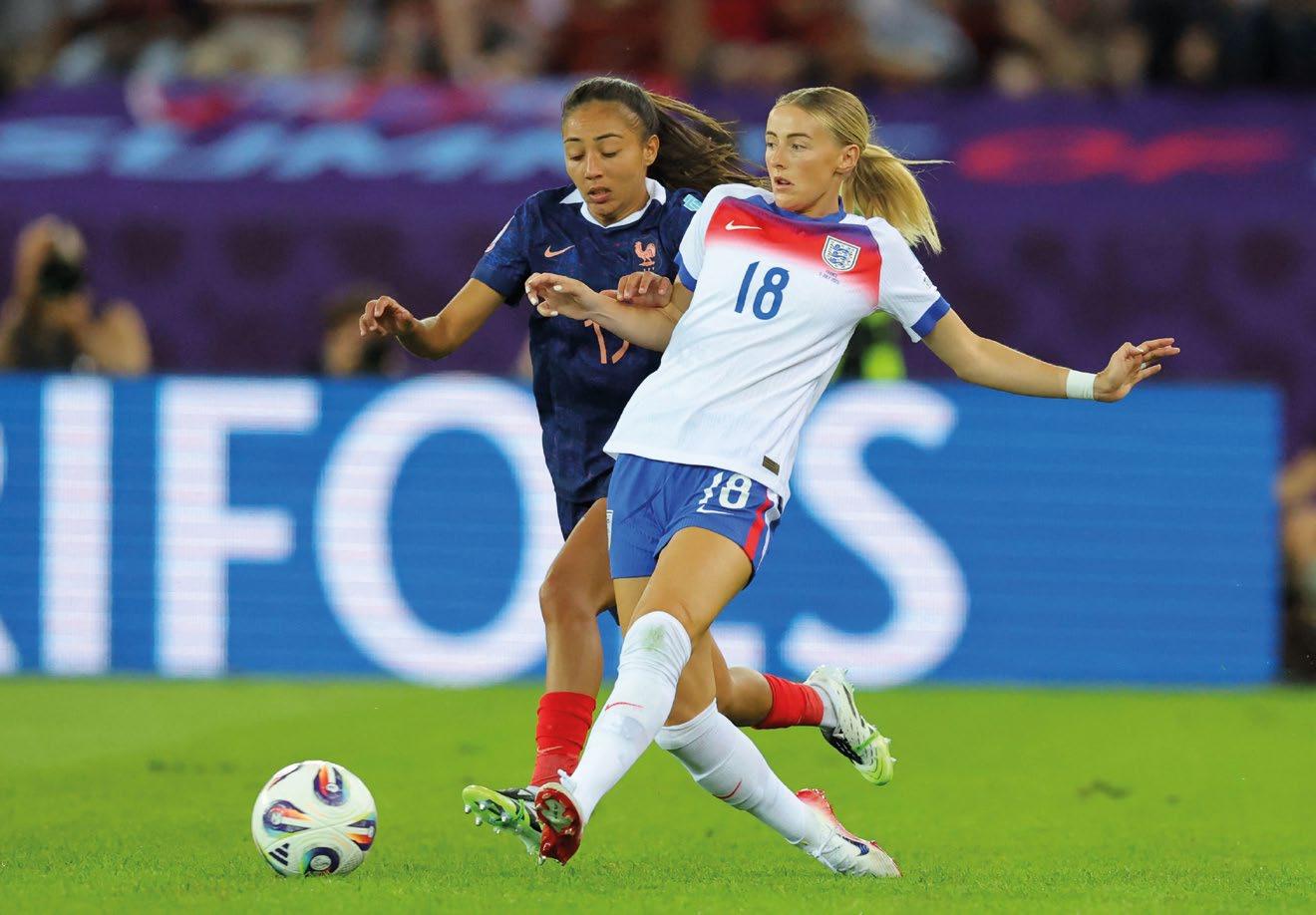
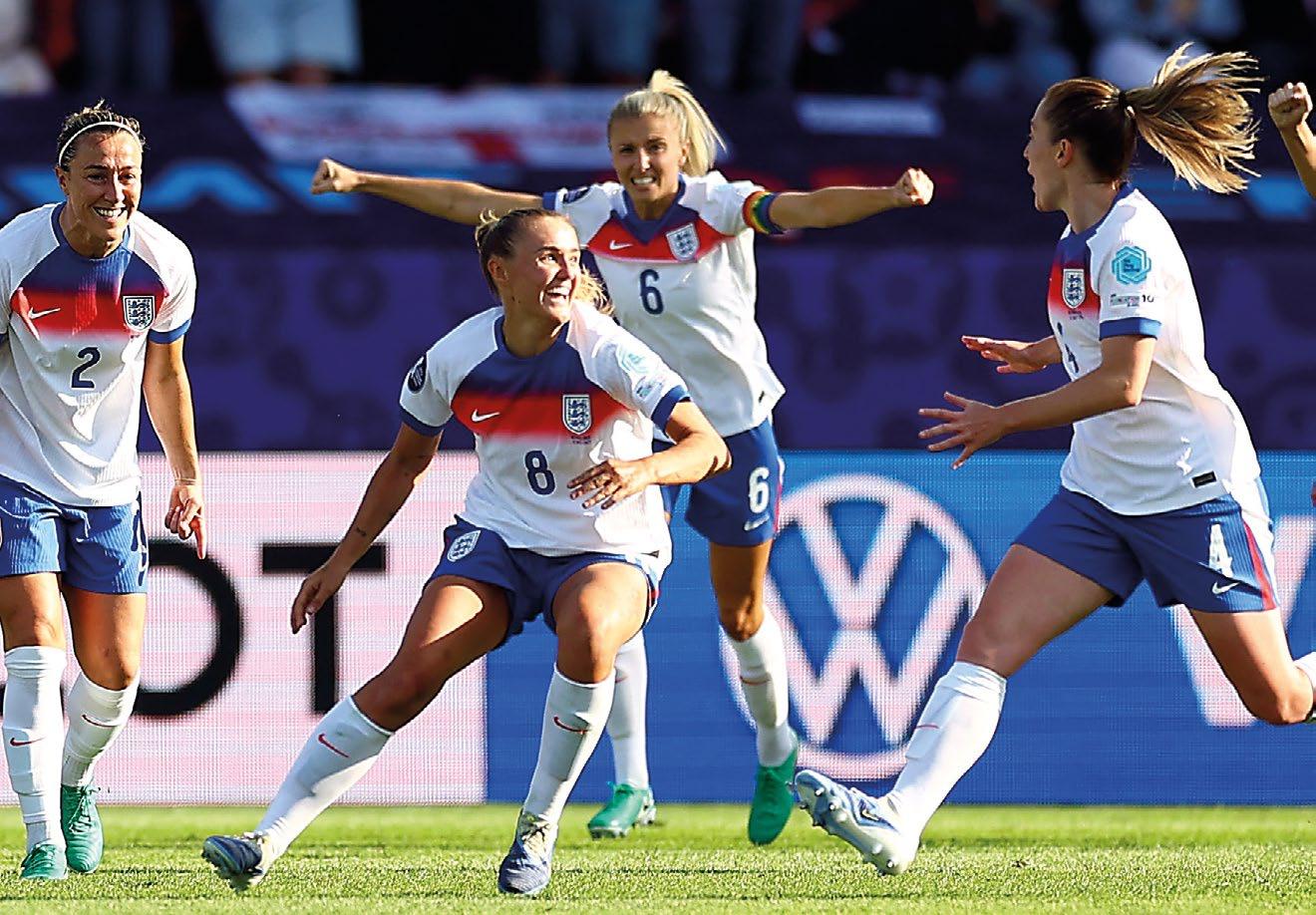
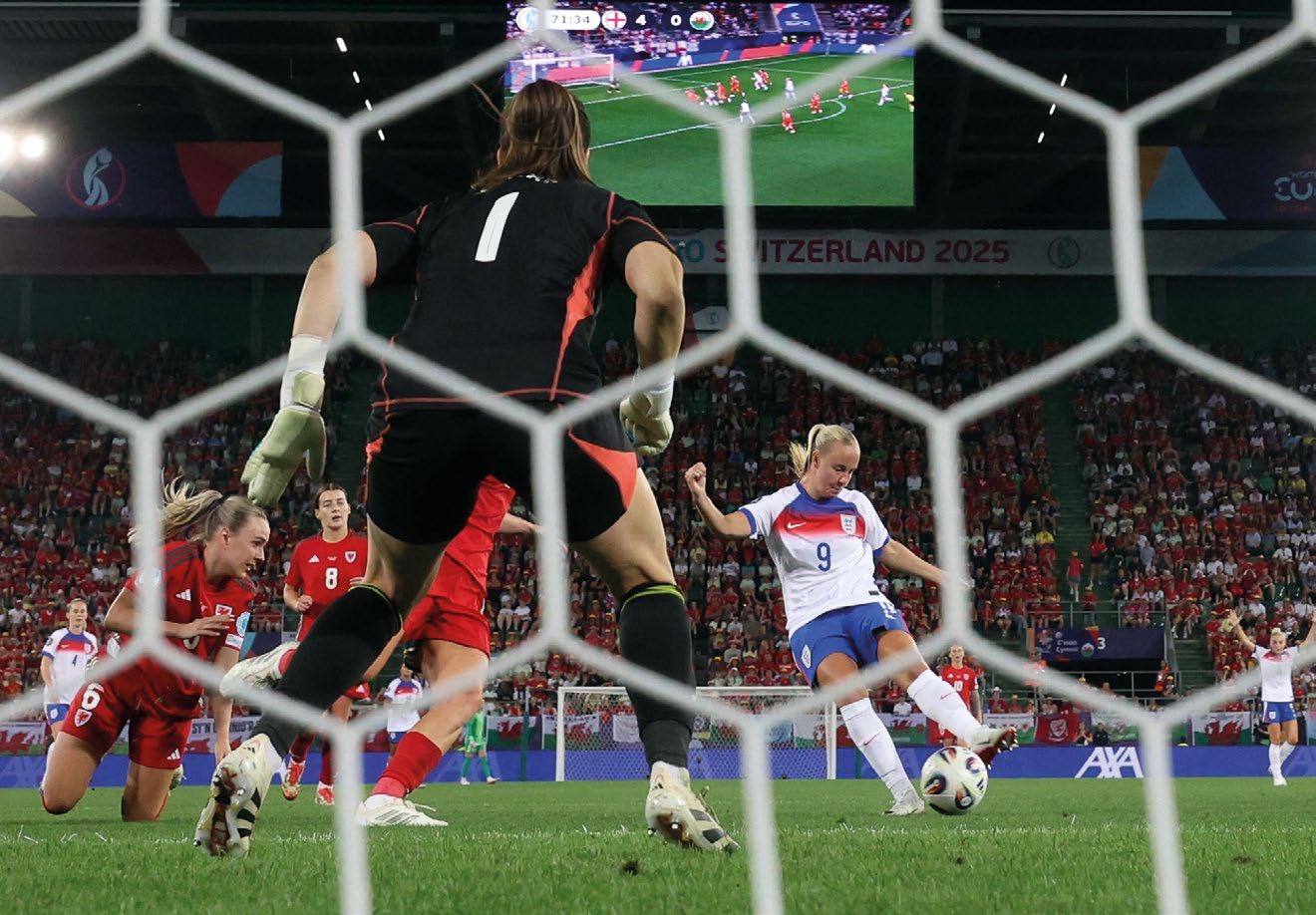
France 2
England 1
Saturday 5th July
Stadion Letzigrund, Zurich
Group D
England 4
Netherlands 0
Wednesday 9th July
Stadion Letzigrund, Zurich
Group D
England 6
Wales 1
Sunday 13th July
Arena St.Gallen, St.Gallen
Group D
England 2 (3)
Sweden 2 (2)
England win on penalties
Thursday 17th July
Stadion Letzigrund, Zurich Quarter Final

England 2
Italy 1 (AET)
Tuesday 22nd July
Stade de Genève, Geneva Semi Final
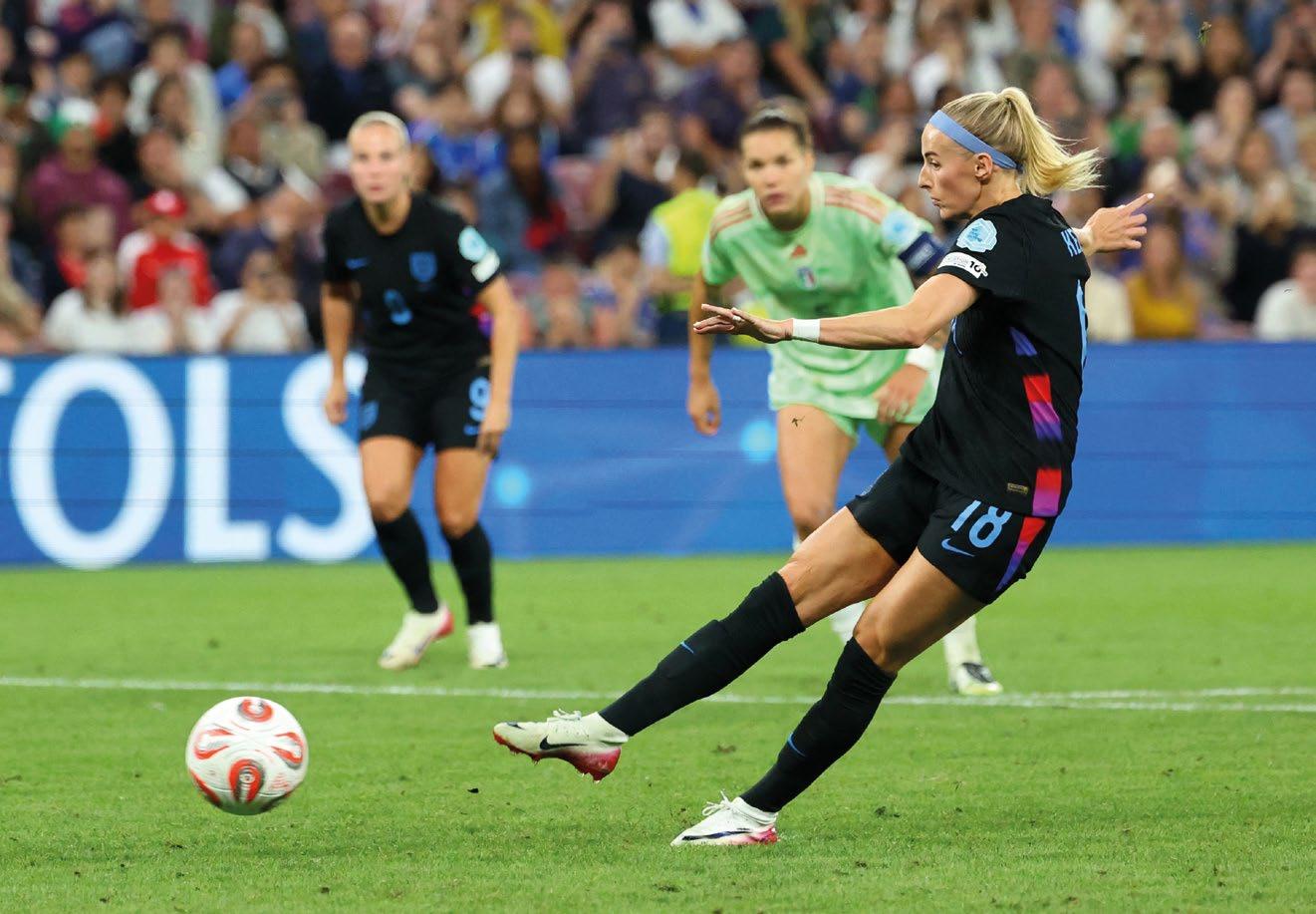
England 1 (3)
Spain 1 (1)
England win on penalties
Sunday 27th July
St. Jakob-Park, Basel Final
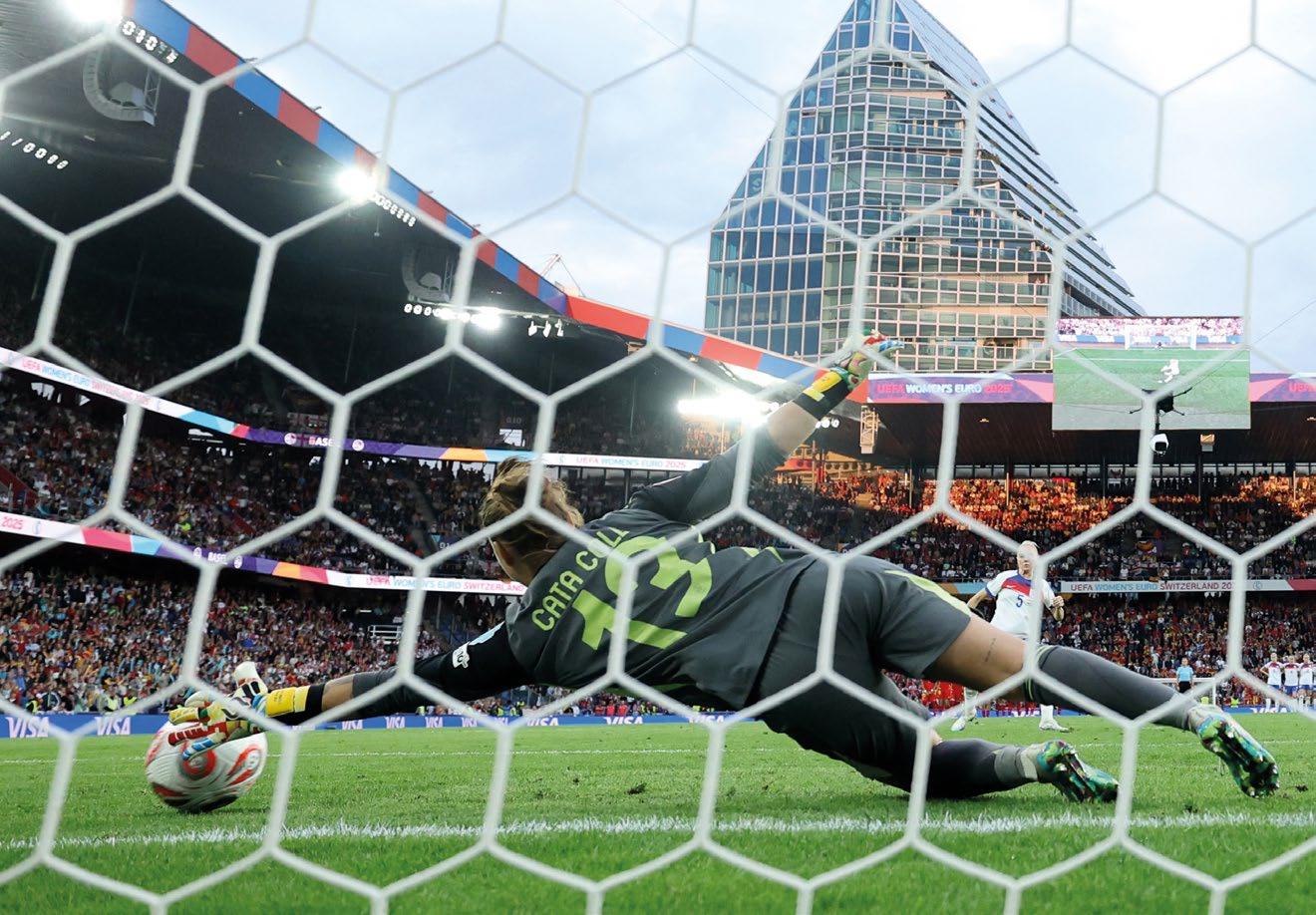
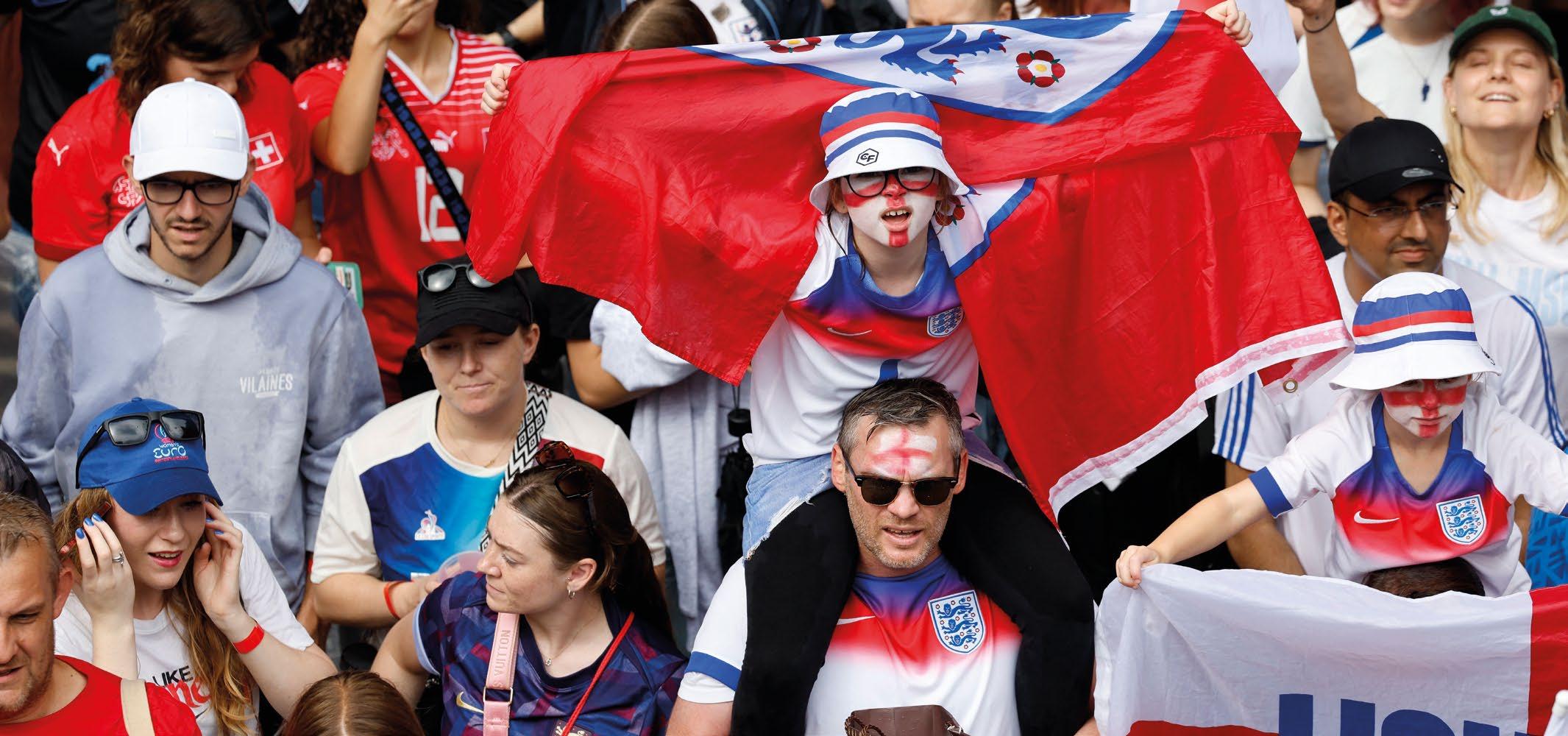
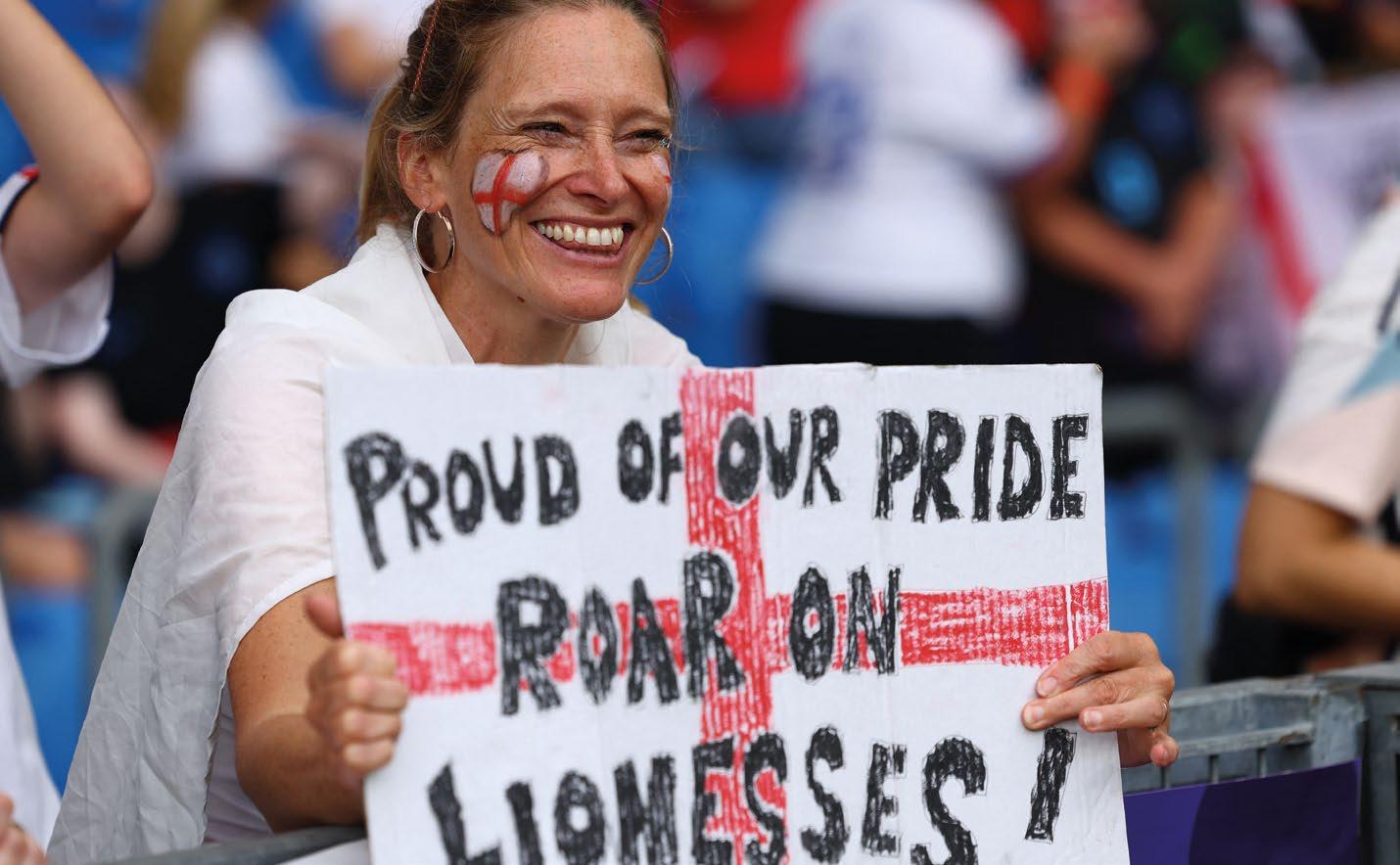
Support for the England Women was stronger than ever, with fans, young and old travelling to Switzerland to cheer the team on.
Reuters // Action Images


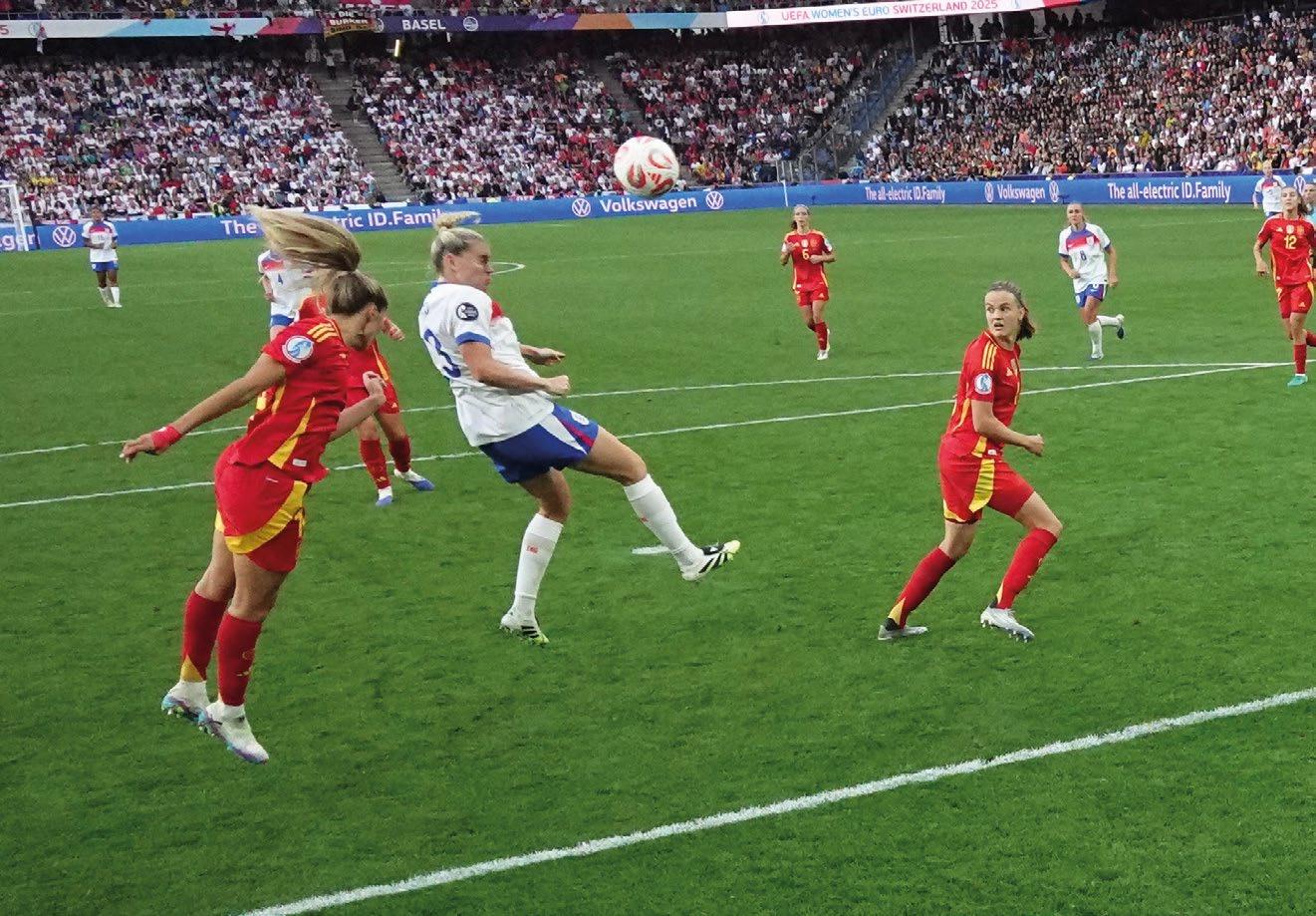
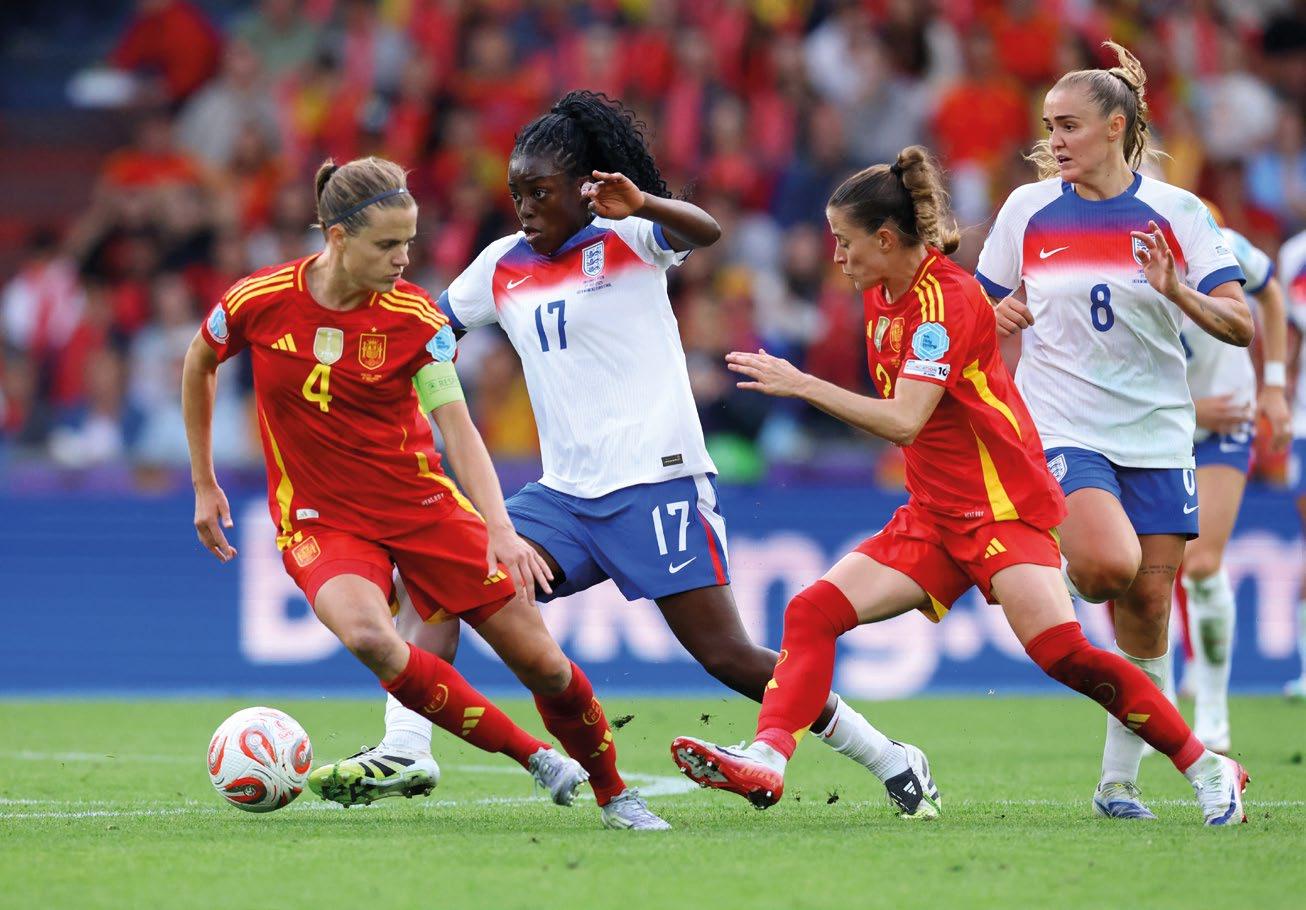
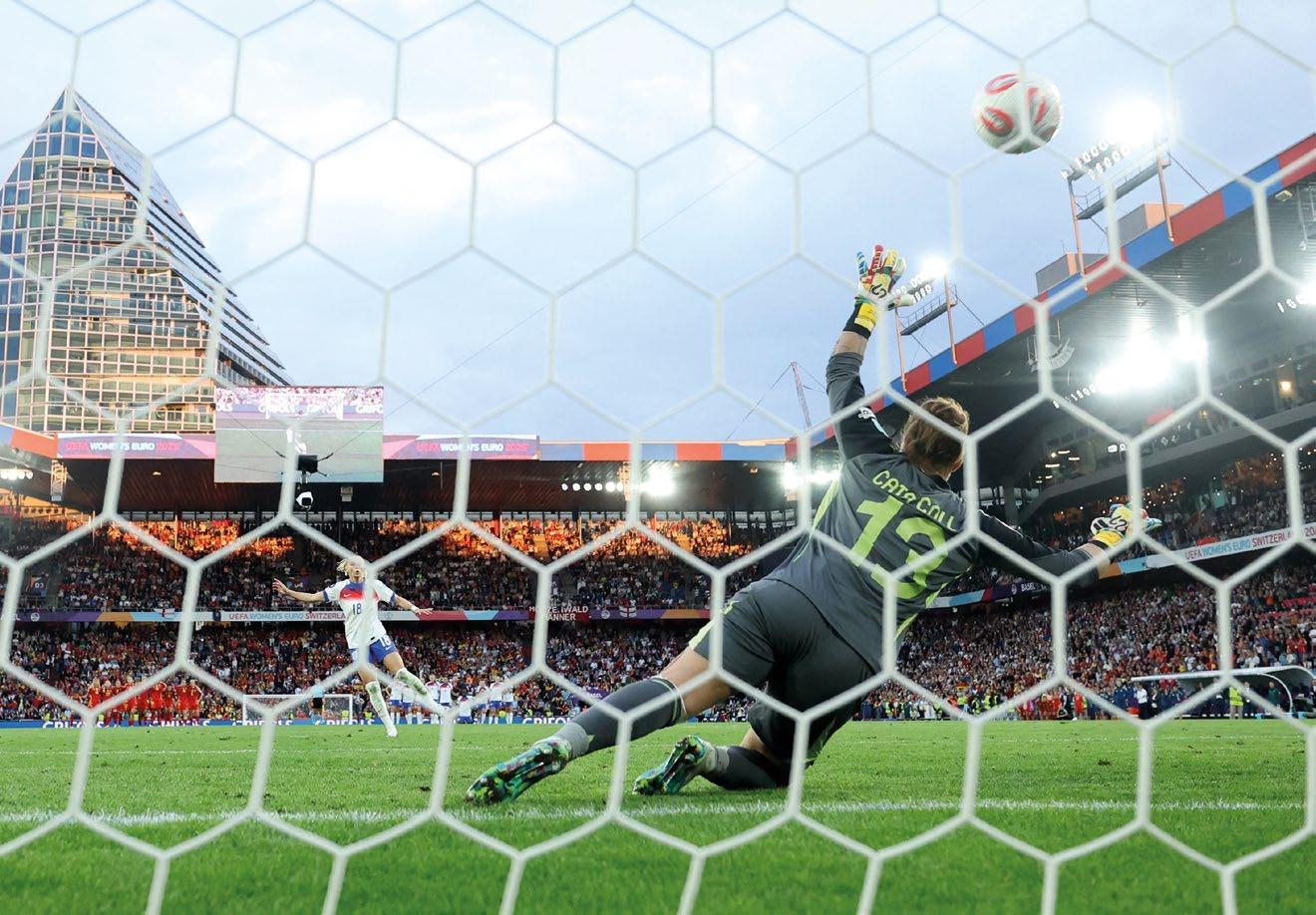
England’s Alessia Russo scores the side’s first goal of the tournament.
Reuters // Action Images
England’s Michelle Agyemang in action with Spain’s Irene Paredes and Ona Batlle.
Reuters // Action Images
England’s Chloe Kelly scores the winning penalty in a shoot-out against Spain in the UEFA Euro final. Reuter // Action Images
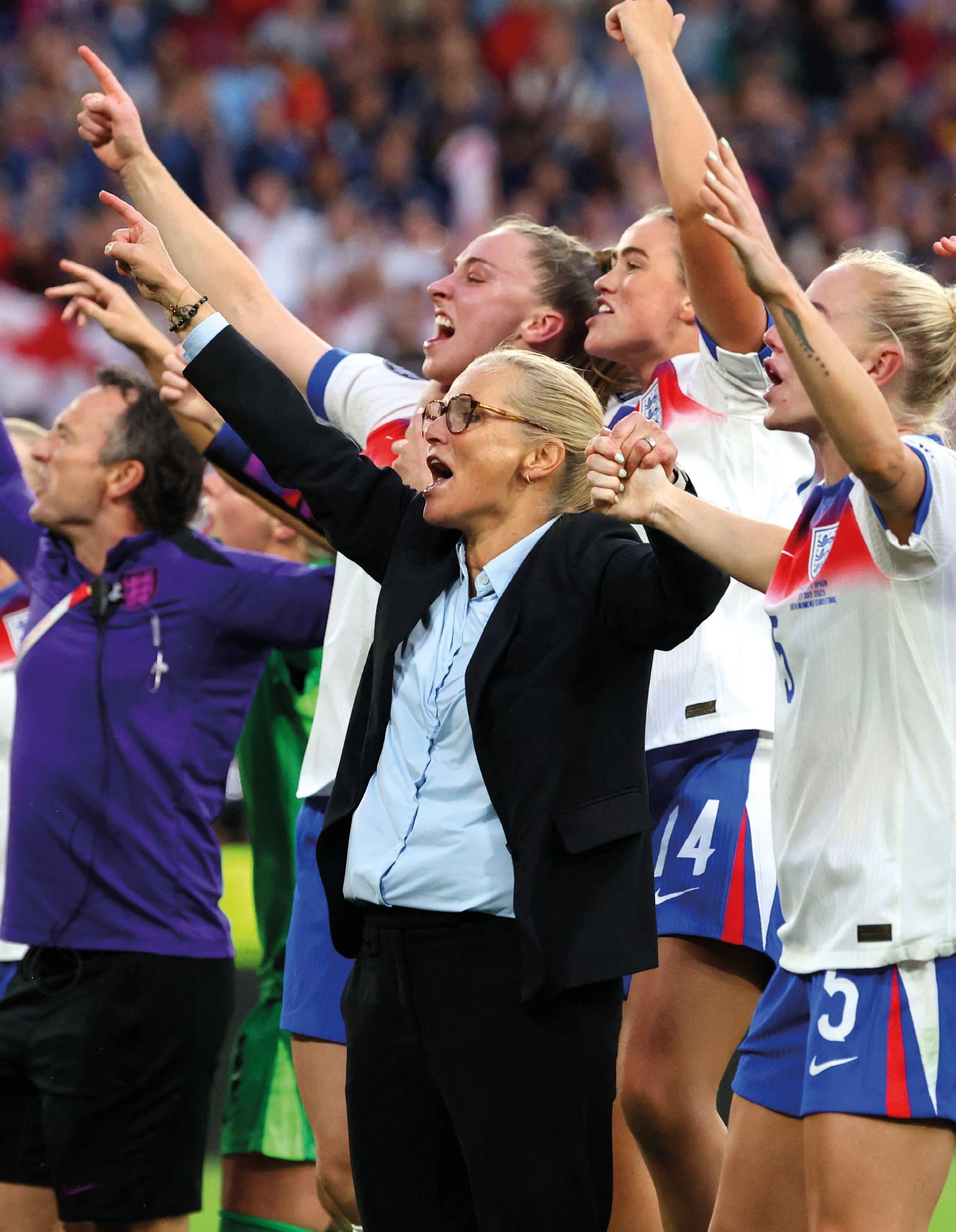
England manager Sarina Wiegman celebrates with the players after they secure the UEFA Women’s Euro 2025 title. Reuters // Action Images
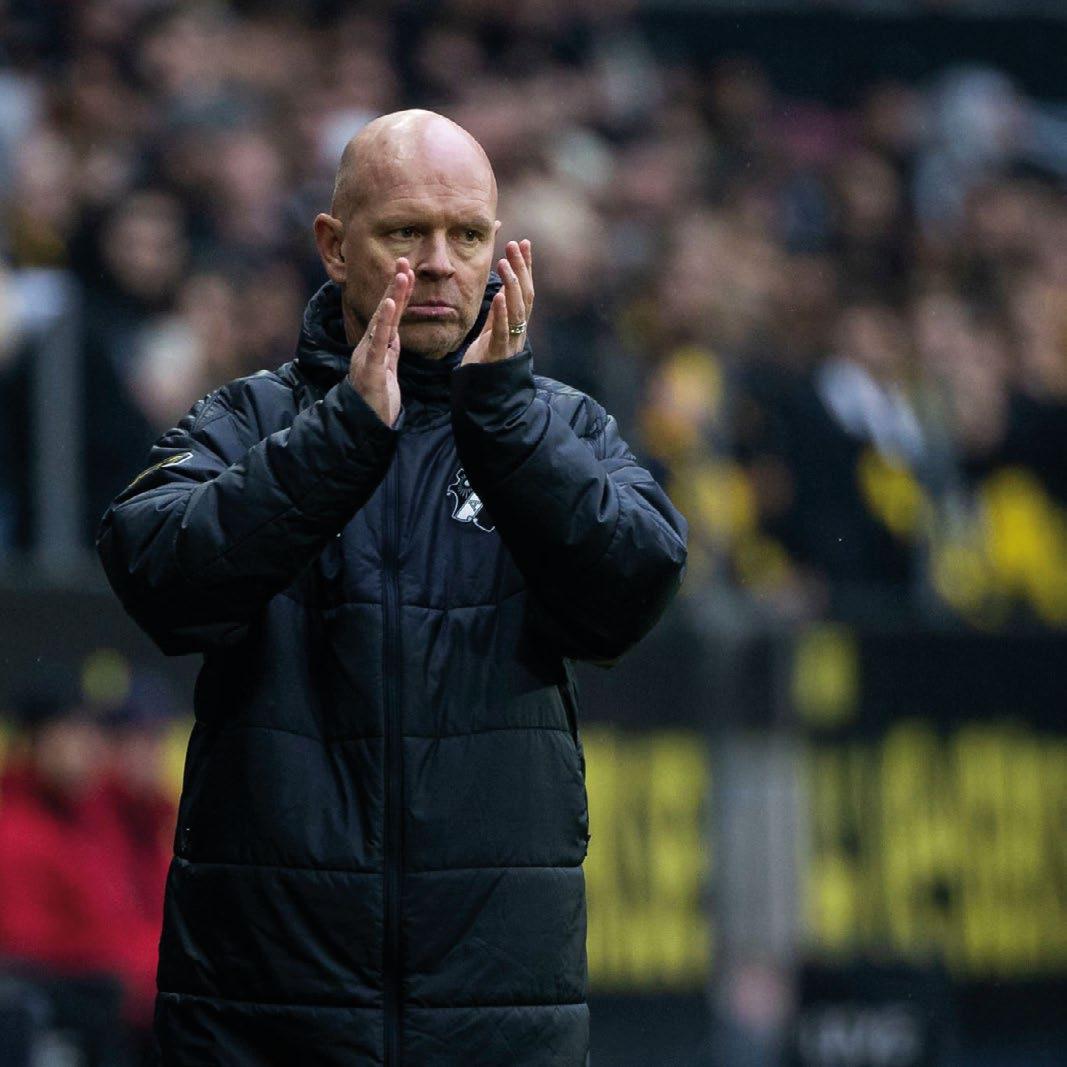
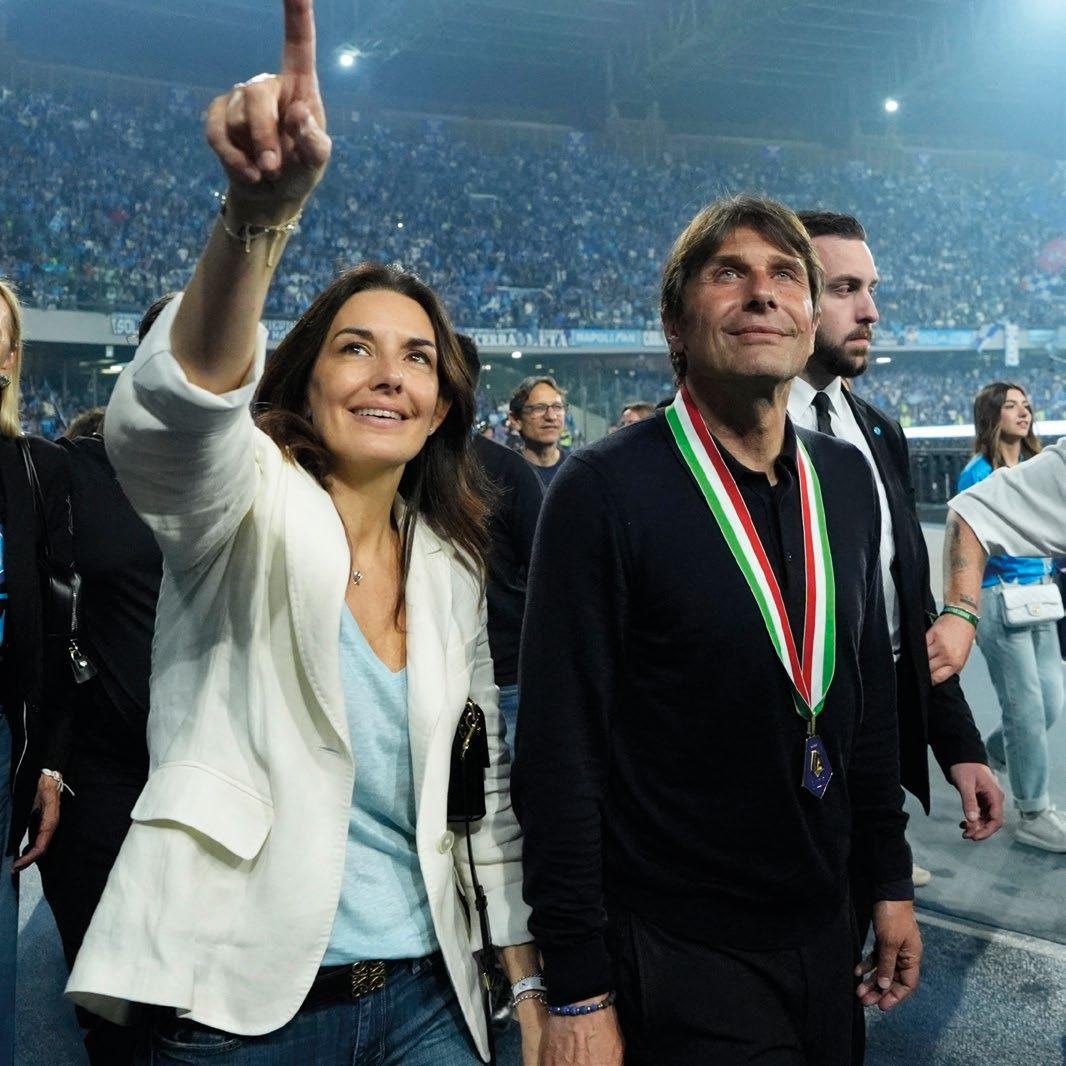
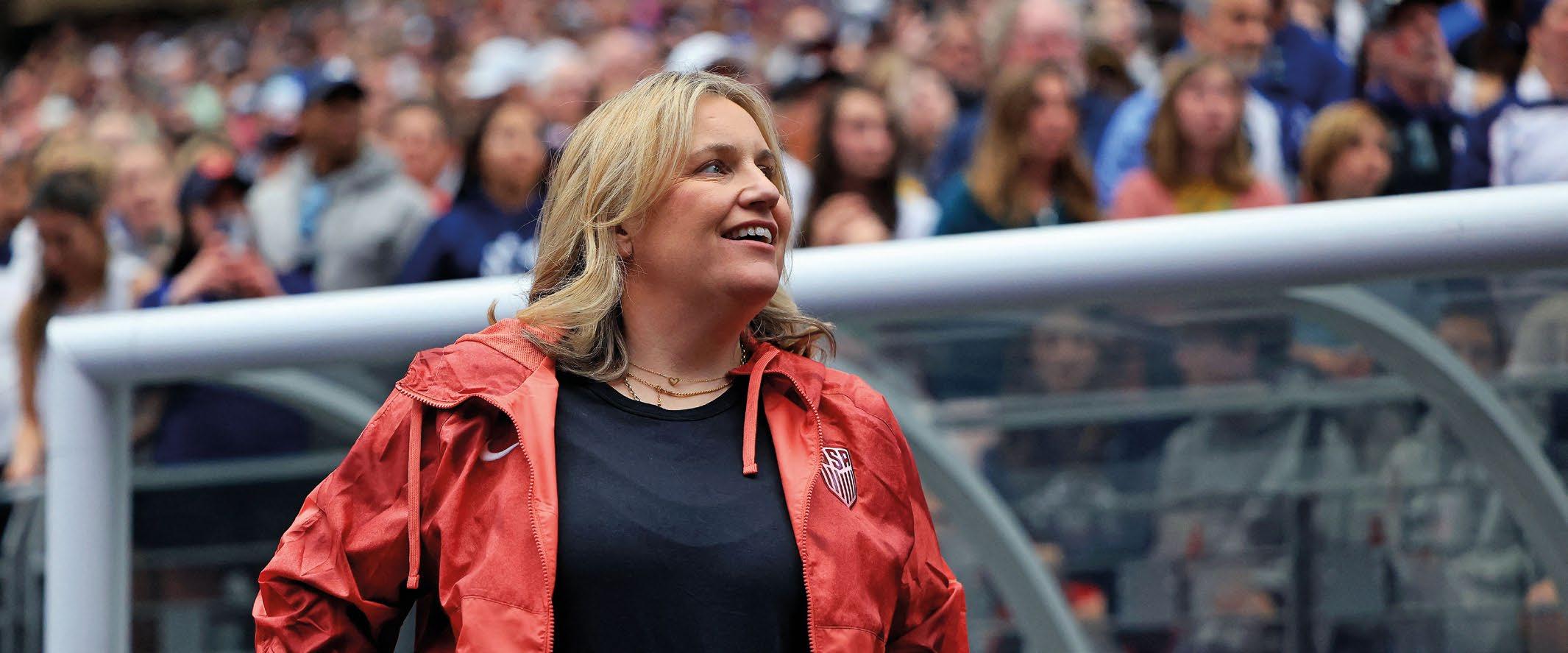
Henning Berg
Cypriot Cup with AEK Larnaca
Antonio Conte Serie A with SSC Napoli
Emma Hayes OBE Gold Medal at 2024 Paris Olympic Games with US Women’s National Soccer Team
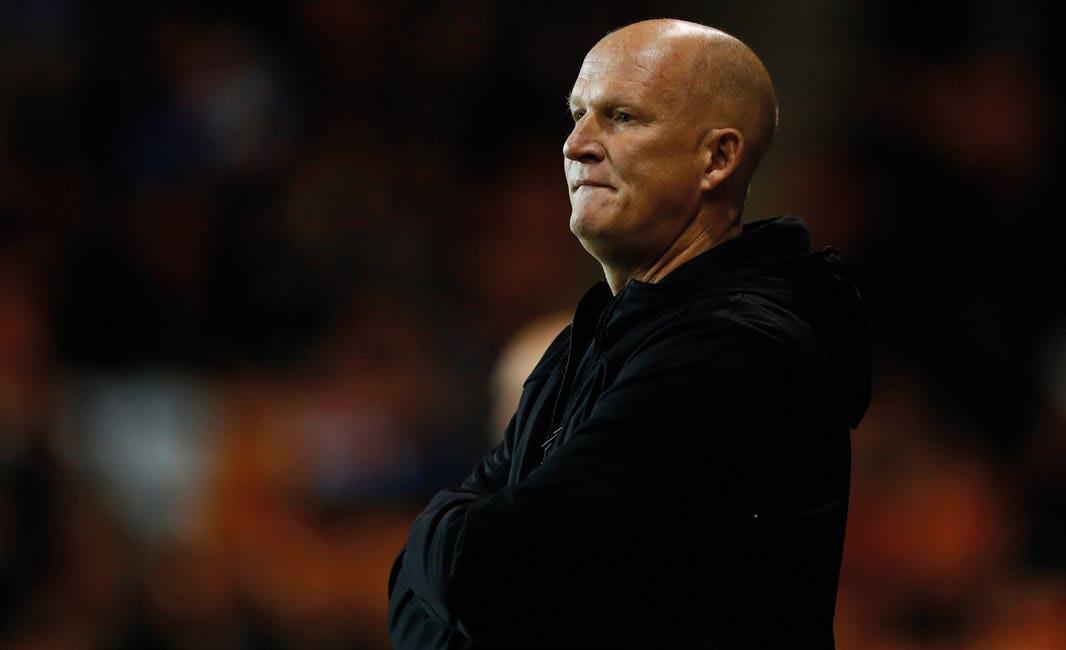
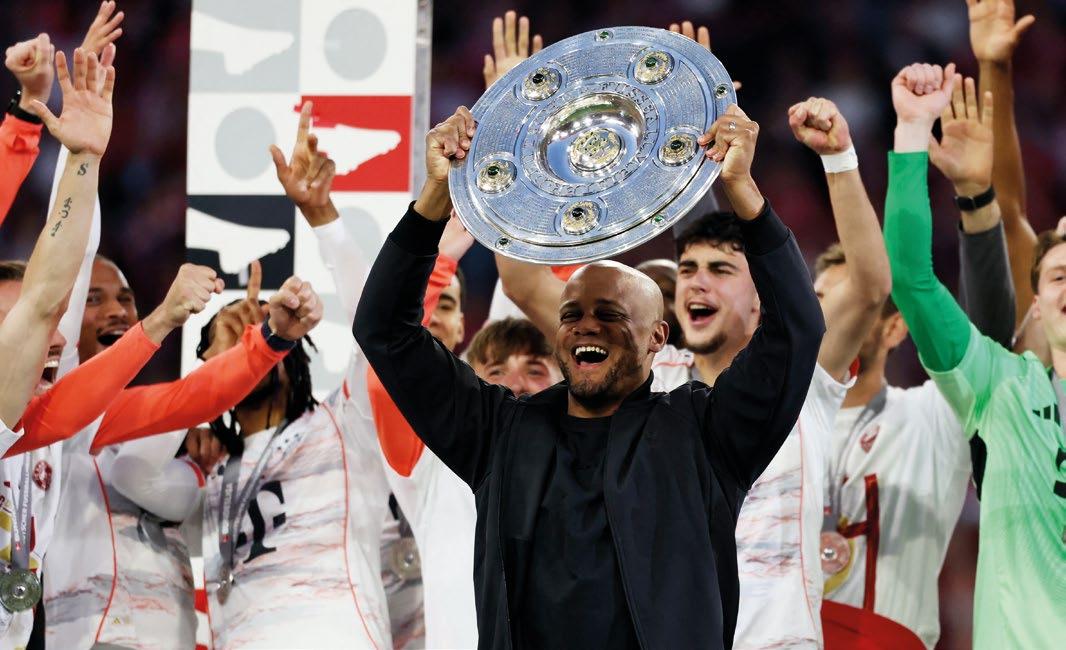
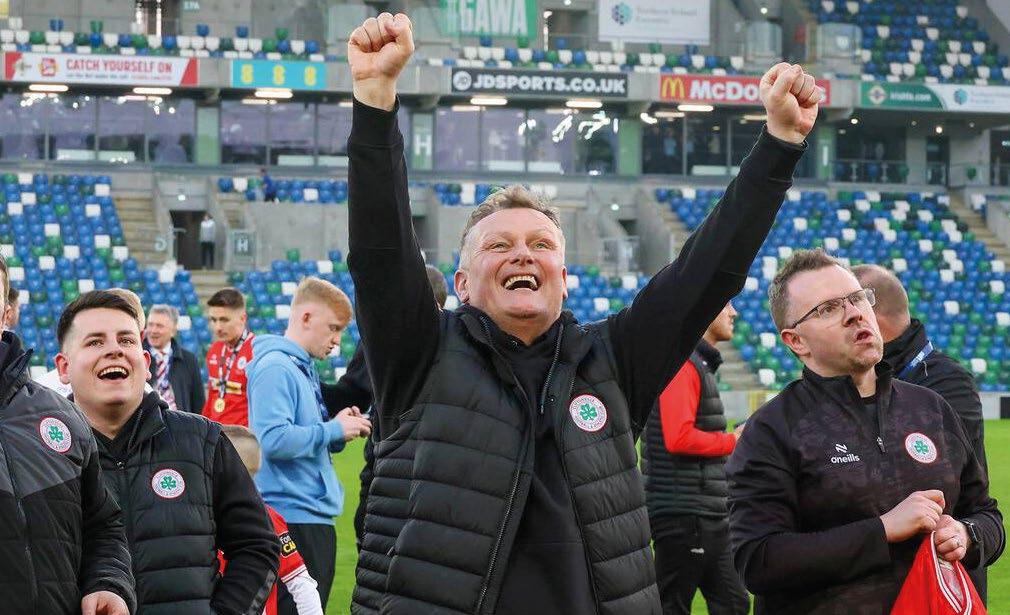
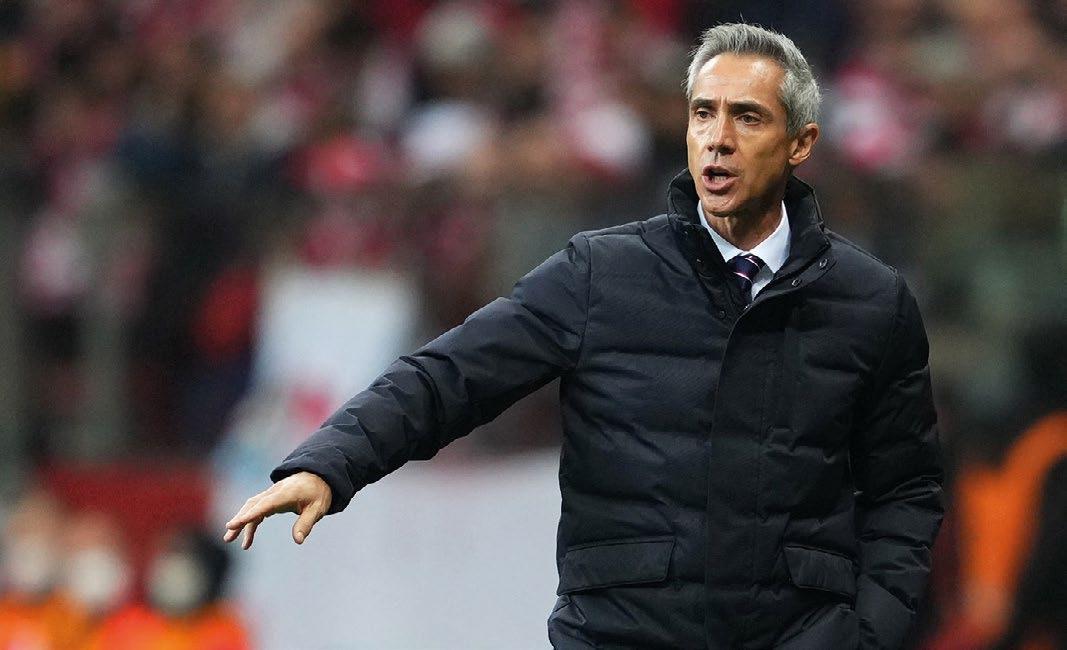
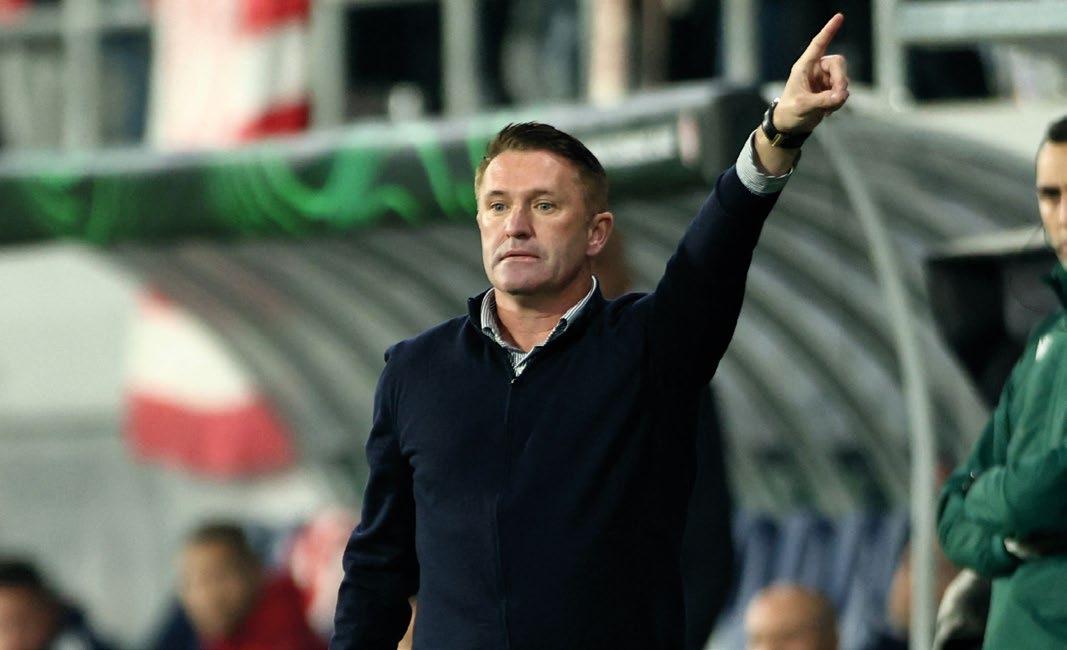
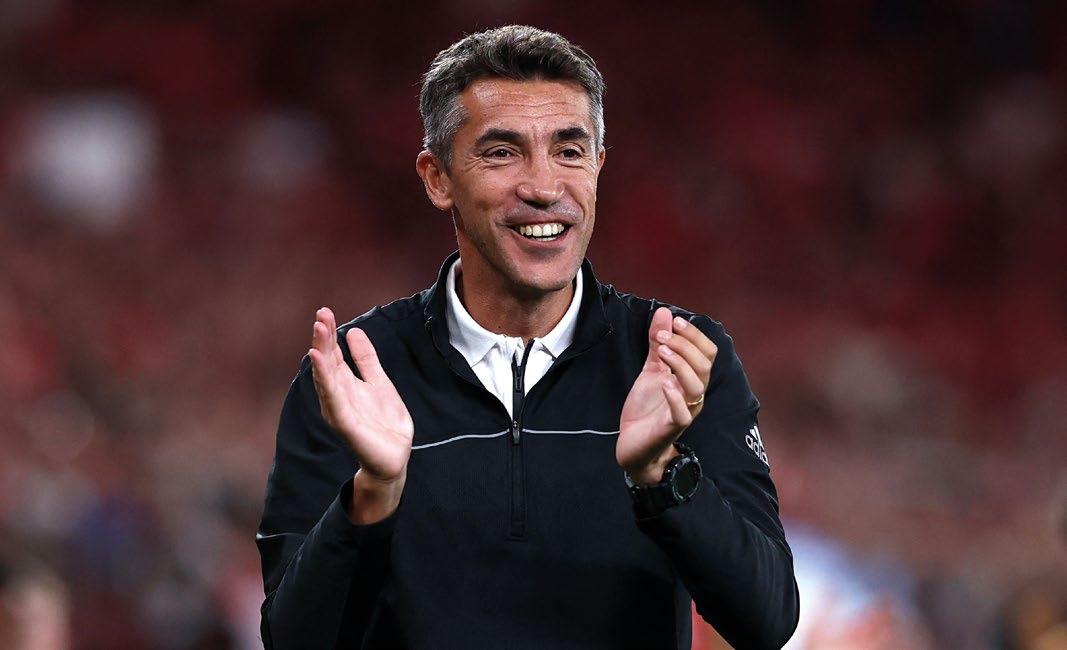
Bruno
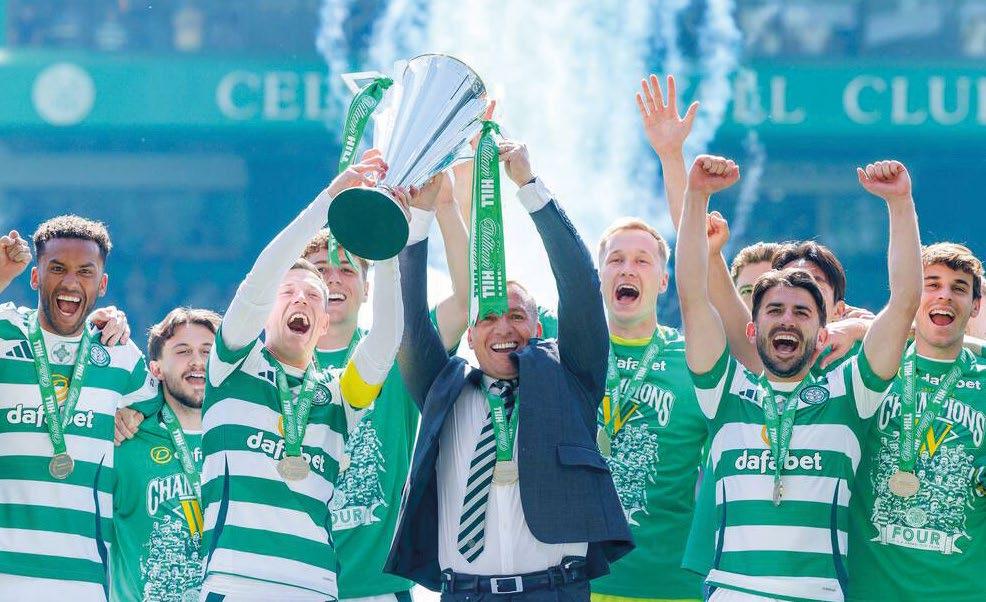
Brendan
Scottish
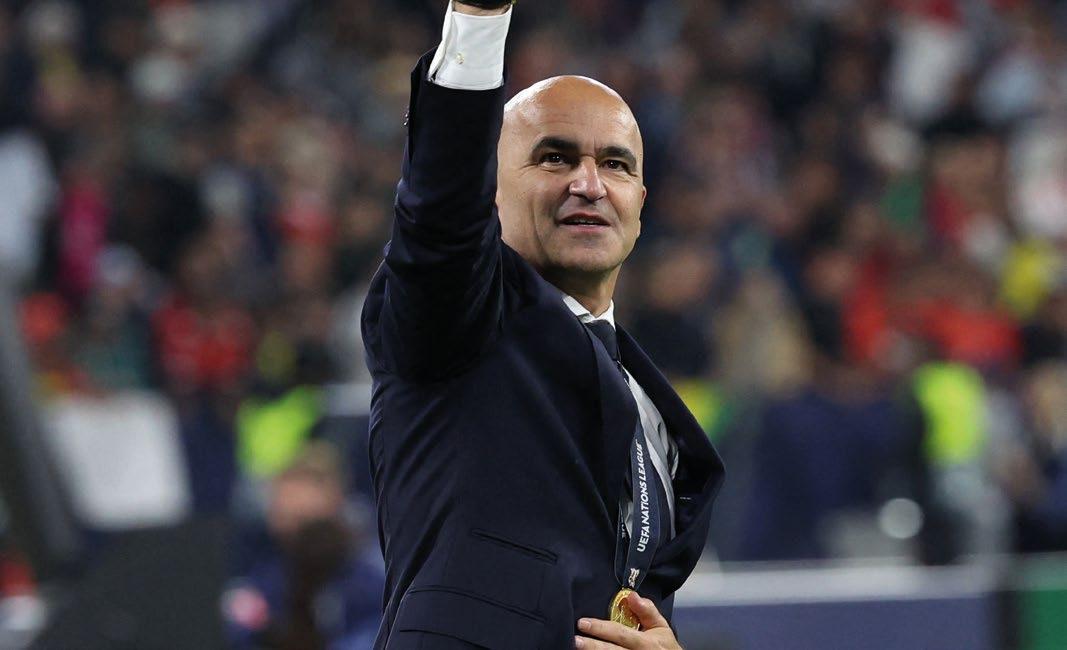
UEFA
Simon Grayson
Nepal Super League with Lalitpur City FC
Vincent Kompany Bundesliga with FC Bayern Munich
Jim Magilton Northern Ireland Football league Cup with Cliftonville F.C
Paulo Sousa
UAE Super Cup, UAE-Qatar Super Cup, UAE Pro League and Presidents Cup with Shabab Al-Ahli Dubai FC
Robbie Keane Nemzeti Bajnokság with Ferencváros
Lage Portuguese League Cup with Benfica
Rodgers
Premiership and Scottish League Cup with Celtic F.C.
Roberto Martínez
Nations League with Portugal National Team






LMA & LCA: LEADERSHIP SHORT COURSE
Increasing your understanding of effective leadership and how to develop your practice in designing, building and managing successful and high-performing teams.
LEADER COLUMN
Jim Souter
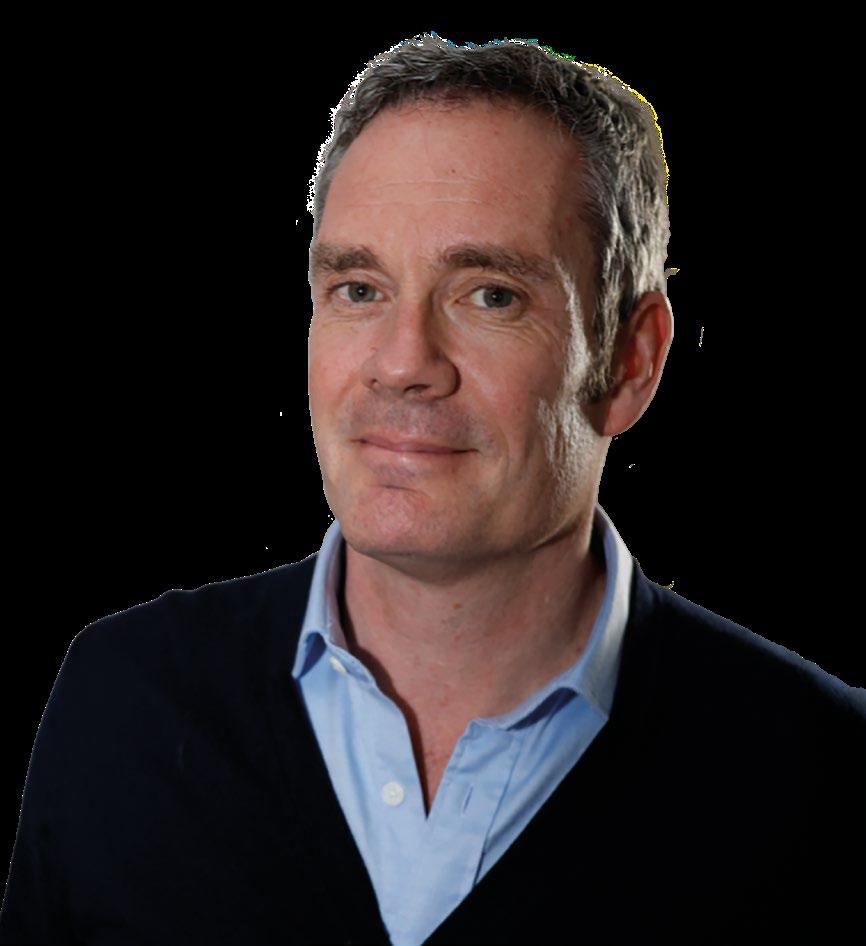
GROUP POWER, NOT PERSONAL POWER.
The LMA LEAD short course gets to the heart of what drives positive team behaviour, and examines how the leader can get a group of individuals thinking and acting like a high-performing team.
Successful teams
build personal connections, relationships and friendships that endure long after success.
Teams win titles, and there is something incredibly special about being part of a successful, vibrant and winning team. Successful teams foster a sense of togetherness and belonging. Teammates work harder towards collective achievement than they do personal reward, and successful teams build personal connections, relationships and friendships that endure long after success. It is how it felt to be winning Lionesses that will live long in Sarina Weigman’s players’ memories, not what she asked them to do, the training days, GPS data or tactical switches.
Teams are complex and socially dynamic. To underestimate the psychological dimension of teams is to ignore the fundamentals of human behaviour. That is not to dismiss strategy, spreadsheets and metrics – no highperformance team can deliver without brilliant processes –but if your team members don’t truly want to be there, to turn up every day and work for each other, no amount of analytics or KPIs is going to get them to deliver to their potential.
Leadership must therefore be seen as a group process with hugely significant psychological and emotional components. The best leaders in any discipline have the ability to turn a team
of great individuals into a great team, and it’s from this starting point that the LMA’s new LEAD online short course was designed. Following two years of extensive engagement with our members, and in partnership with performance consultancy Leading Edge, we have designed a theoretically underpinned programme that focuses on a set of key leadership components.
As identified through our member-focused research, LMA LEAD’s six modules cover: ‘understanding your own leadership style’, ‘building teams and connections’, ‘communicating with purpose’, ‘managing individuals’, ‘leading through change’ and most importantly ‘leading with purpose’. Over the following special section of The Manager, we’ll give a taste of the content of these modules, as we did with the PERFORM course in the last edition.
Collective purpose is the starting point for the programme and covered in depth in the first module. The primary function of a leader is to create a vision of the future that is directional and purposeful, one that has meaning for every member of the team, binding them to a strong sense of ‘us’ and ‘what we stand for’.
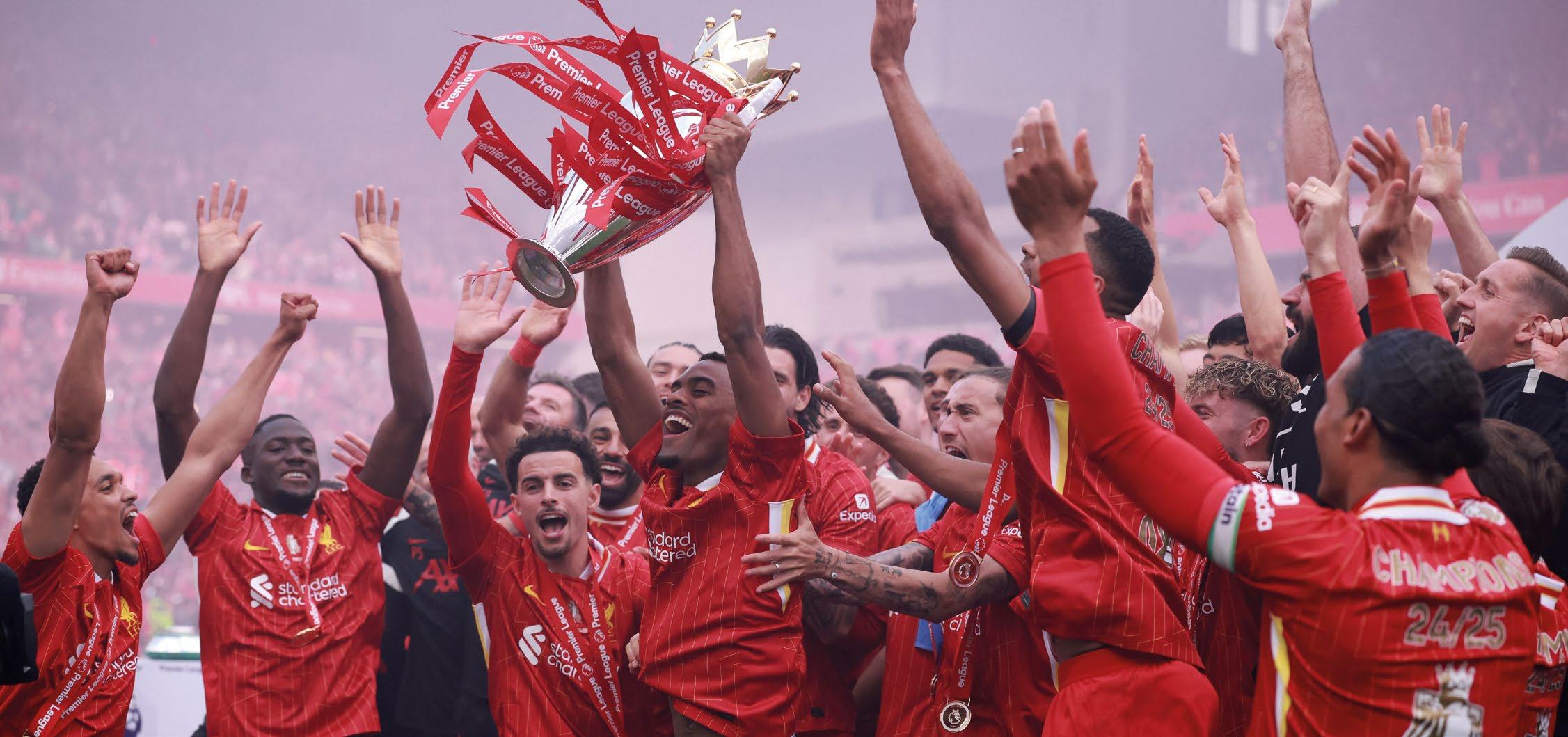
While we are guided by the most up-to-date, psychological approaches to leadership, this module, and in fact the whole programme, draws significant inspiration from American Mary Parker Follet, a brilliant and inspirational leadership thinker from the late 1800s. Due in large part to the male domination of 20th century leadership thinking, she has been ignored and overlooked for more than a century. However, more recently, academics and practitioners alike are recognising her as the mother of modern management thinking, so prophetic were her writings.
Follet stood squarely in opposition to the top-down, process-focused leadership of the industrial revolution and would be similarly confrontational towards the modern strategic, data-driven leadership that continues to dominate organisational development.
She sees the leader “not as the person in the group who is able to assert their individual will and get others to follow them, but as the one who knows how to relate these different wills so that they have a driving force. The leader must know how to create group power rather than express personal power. The leader must make the team.”
This power of purpose principle aligns squarely with a more contemporary leadership study conducted by Professor Alex Hill, and described brilliantly in his book, ‘Centennials’. In studying 11 of the most enduring and successful organisations, those that have consistently delivered excellence for 100 years or more, from The Royal Academy of Music to NASA, the All Blacks and the Royal Shakespeare Company, Hill found that it is the stability and clarity of a higher purpose, bigger than any individual or
short-term strategic plan, that sets the foundation for enduring success.
The challenge for the modern leader, especially those in football, is how to embrace these clear and powerful principles while dealing with the day-to-day complexity, messiness, politics, scrutiny and short-termism inherent in their organisations. It is this contextual reality that forms the backdrop for the LMA LEAD programme, turning it from a programme of theory into a programme of learning and doing in reality. As Follet commented on leadership development, “The man who thinks leadership cannot be learned will probably remain in a subordinate position. The man who believes it can will go to work and learn it. He may not ever be president of the company, but he can rise from where he is.”


MODULE 1
TOGETHERNESS AND PURPOSE.
Creating winning teams is the primary focus of leadership, but teams don’t live on spreadsheets, PowerPoints or in strategic reviews. They are messy, complex, social, emotional and dynamic. They function best when united around a clear vision, sense of purpose and direction, shared goals and embedded values, the constituent elements of a group’s identity.
Illustrations: iStock
When a sense of collective identity is strong, it binds team members together, making them feel they belong. Belonging makes people want to turn up, put the effort in and do their best for the group. It is the leader’s job to foster this belonging by crafting and nurturing the group’s identity.
Each of us is an autonomous individual with our own desires and objectives, but we’re also highly social creatures. Being part of a group not only enables us to achieve things and gain information that would be otherwise be impossible, it also satisfies our primal need to belong, a sense of safety, security, togetherness, connection and comradeship. It meets that most intrinsic of human needs – to be part of something bigger than ourselves.
As such, the group we become part of helps to define who we are, our personal sense of self and our collective social identity. Groups build and enhance our sense of self-worth, acting as a buffer or support blanket when our own self-esteem is shaken.
Strong social cohesion also tends to boost resilience, because in the face of personal challenges or setbacks we can focus on the group’s success and prestige, and find comfort and safety in the support of our teammates.
The need for social belonging has even been shown to have an impact on the brain. Researchers using MRI scanning to track neural responses found that when people were left out of a group activity they displayed heightened activity in two areas of the brain, areas normally associated with pain.
All of this means that when people feel a strong sense of belonging and social connection with a group, the impact on their wellbeing is very positive. However, it is also a huge driver of performance, because when team members are happier they want to come to work and, once there, to give above and beyond what’s expected of them. “When you feel a strong loyalty and togetherness, your view shifts naturally from ‘me’ to ‘we’,” says Langley Sharp, former head of the Centre for Army Leadership. “You want to protect the group that you belong to, and which is so important to you, so your performance is likely to be enhanced. You’re not just doing it for yourself, you’re doing it for others.”
THE LEADER’S ROLE
Sharp believes strongly that
the importance of belonging and team identity has long been underplayed, but in fact it can be a force multiplier, enabling a team to achieve far beyond the sum of its parts. Indeed, the creation of identity and setting a compelling but achievable vision, underpinned by shared values and accepted behaviours, is the starting point for everything. Identity guides the leader’s strategy, it enables decisionmaking and creates strong cultural norms.
Vision and direction are the stabilisers on the bike, keeping us steady through setbacks and uncertainty. Strong collective identities are forward thinking, action oriented and made with intent, rather than simply being nice-to-haves. They guide team members towards something and motivate them to give their
The creation of identity and setting a compelling but achievable vision, underpinned by shared values and accepted behaviours, is the starting point for everything.
best each day. The leader must therefore articulate a clear and compelling view of the future.
A strong collective identity that fosters a sense of belonging is also shaped around clear values, and these should aim to guide behaviour and be easy for people to adopt. This happens most readily when team members’ own values are closely aligned to those of the team. They feel at home or that they fit in, because things operate like they do. ‘I’ and ‘us’ become one and the same thing.
“The leader plays a key role in shaping that identity, which means first understanding what it is like right now, why it matters, and how it might be changed or reinforced to better achieve the team’s purpose,” says Sharp. “There does, however, need to be an acknowledgement that our
external environment has far more influence on us than we give it credit for. The leader is just one part of a wider conversation, a collective effort, where everyone has a choice. When everyone is involved in the conversation, and the crafting of their identity, they are more likely to buy into it.”
Key to crafting that identity is understanding that it comes not only from the here and now, but also from the past and the legacy of those who came before you. “The army is a classic example of where history is harnessed to foster belonging and cohesion,” says Sharp. “There are reminders around you every day of its 360- year heritage and you recount stories and relive that history, relating it to today. There are plenty of examples of people putting their
Whatever you tell people to do, they’re unlikely to do it unless they can see you setting an example.
lives on the line because they feel such a sense of belonging to their regiment or battalion, and are determined to live up to those standards.”
As well as fostering a sense of belonging around the heritage of the club or organisation, the leader can seek to find the thread that binds team members together, their reason for being there or collective goals. Serving in Afghanistan as a Task Force Commander, Sharp was responsible for pulling together a team of people from various defence units in the army and RAF, each with their own strong sense of identity. “I had to cohere them all into one group with a one-team mindset, and make sure that they all felt, regardless of who they were, their rank, experience or skillset, that they were there for a reason and were essential to its success. It’s about connecting to something that’s much bigger than yourself.”
Finally, it’s important to recognise that creating and maintaining a collective identity, and a strong sense of team cohesion, is not a one-off event, but an ongoing process of nurturing, growing and reinforcing shared goals, values and behaviours. The primary way leaders can do this is by role-modelling. “Whatever you
tell people to do, they’re unlikely to do it unless they can see you setting an example,” says Sharp, adding that praise and reward are also key. “The leader needs to uphold good standards and behaviours, and recognise or reward them, whether that’s in the form of a written letter or note, public acknowledgment in front of their peers, or more privately.”
Just as important, though, is to hold people to account when their behaviour is not in line with the values that the team has committed to. “Here you have to be particularly aware of the micro-behaviours that might otherwise slip through the net,” says Sharp. “Otherwise you can end up with a team or organisation whose cultural climate erodes due to a lack of attention to detail.”
Ultimately, we’re all driven by our own self-interest, but as highly social creatures, a considerable part of that relates to our need to belong to groups. Understanding the power of those social dynamics and fostering strong team identity and cohesion is fundamental to getting the best from a group, and the individuals within it. The strength of the wolf is the pack; the strength of the pack is the wolf.
SET VISION AND DIRECTION
Articulating a compelling group vision requires you to define what it is you’re aiming for, your intent and outcome, how you go about doing it (including your values, standards and behaviours) and why you’re doing it.
ROLE MODEL IT, FROM THE TOP
Staff, senior players and leaders must all live, and be seen to live, the values agreed as a group. Behaviour that aligns with those values should be praised and rewarded, while players and leaders need to call out when standards drop. This feedback should be linked back to shared values rather than it being personal.
MAKING US MATTER
DEFINE VALUES, CLEARLY AND CONTEXTUALLY
Values need to be more than just words; they need to have clear meaning and be given context so that the group understands how they translate to everyday activities. Rather than simply writing ‘Respect’ on the wall, for example, expand on it; “Every player supports each other on and off the pitch, regardless of age, status or role.” Likewise, you might contextualise the value of ‘excellence’ as “We give 100 per cent effort in every training session, game, and recovery period.”
REVIEW AND REFLECT REGULARLY
IDENTIFY KEY BEHAVIOURS
Break down each value into three-to-five nonnegotiable behaviours. Importantly, these must be observable, repeatable and coachable (able to be praised or corrected). To give an example, the behaviours linked to the value of ‘togetherness’ might include high-fiving teammates after a tough session, helping a teammate with rehab or analysis, and holding one another accountable in a constructive way. In elite environments, these behaviours are then referenced and reinforced during training, team talks and meetings, and prioritised during recruitment in order to ensure there is a good values-fit in new talent.
Leaders should try to build in space to reflect on how well the team has lived its values and been true to its identity that week, perhaps via a debrief or by sharing a video.
MODULE 2
UNDERSTANDING YOUR LEADERSHIP.

Photography: iStock // Reuters // Action Images

While we tend to talk about ‘the style’ of a manager, in reality we each have many different tools in our arsenal, a range of leadership and communication approaches that enable us to flex and adapt to each situation and audience we’re faced with. Knowing how to apply the right approach at the right time requires excellent self-awareness and emotional intelligence, and these are skills that can be developed over time and with experience.
We can think of leadership as a continuum. At one end of the spectrum there are ‘transformative’ approaches such as coaching, inspiration and motivation, whereby the leader
helps people believe they can achieve more than they thought possible. Approaches then shift through participative, where you seek the consensus and collaboration of the team, all the way to directive, where you have complete authority and control (see the table below).
While transformative approaches tend to have a more positive long-term impact on the team culture, there will be occasions, such as in times of high pressure or crisis, when it is necessary to be more directive. Used well and at the right time, being more results or deadline-oriented and leading with authority and control can enable you to
achieve compliance and get results quickly, without debate or resistance. Likewise, there may be times when the leader recognises the need to simply step out of the way, observe, listen and allow the team to work and develop together.
UNITY AND TRUST
Importantly, how effectively a leader can deploy each of these styles of leadership, and switch from one to another, depends on the groundwork they’ve laid with the team. When you have earned the trust and influence of your followers they are far more likely to accept that you are one of them and are acting in the best interests of the group. As a
When the leader represents ‘we’ not ‘I’ and is in service to the team, they will be viewed as one of that team.
result, they’ll respond more positively and quickly to your instructions and decisions, even if they don’t agree with them and find them difficult.
Where a leader has built strong trust with their team, there will tend to be greater unity behind their vision and strategy, and a greater sense of psychological safety. People feel able to take risks in order to grow and succeed when they are free of the fear of retribution and know that the leader has their back.
AUTHENTIC ROLEMODELLING
A principal leadership function is therefore to develop trust with their followers, and this happens neither automatically nor through demanding it and throwing your weight around. Trust is achieved by behaving in a consistent and authentic way that aligns closely to the group’s identity, shared values, rules and behaviours. It is the natural result of self-awareness, authenticity and role-modelling. In other words, while it is important to be able to adapt your style, it is essential that you remain authentic throughout, and continue to embody the identity, values and behaviours agreed by the team, whether that’s a hard work ethic, positivity or vulnerability. When the leader represents
‘we’ not ‘I’ and is in service to the team, they will be viewed as one of that team.
It’s also important that team members can see that their leader is capable of rolemodelling different styles, remaining calm in crisis, for example, assertive in decisionmaking, and collaborative in planning. They need to see you demonstrating emotional agility and situational intelligence.
Ultimately, your team members are appraising you constantly, watching not just what you say but how you behave, and they will bestow trust on you as and when your behaviour demonstrates that you’ve earned it. This acquiring of influence via constant follower appraisal is the underlying psychological mechanism for effective leadership.
As a leader, it’s important, therefore, to have the selfawareness to recognise where your role-modelling could be stronger and how you might build trust and better unlock potential. Meanwhile, understanding the various leadership tools at your disposal enables you to be intentional in your approach, planning ahead and modelling how you might behave and lead in different situations in order to have the most positive impact on, and for, the team.
You have to be consistent, fair and lead by example as a manager.
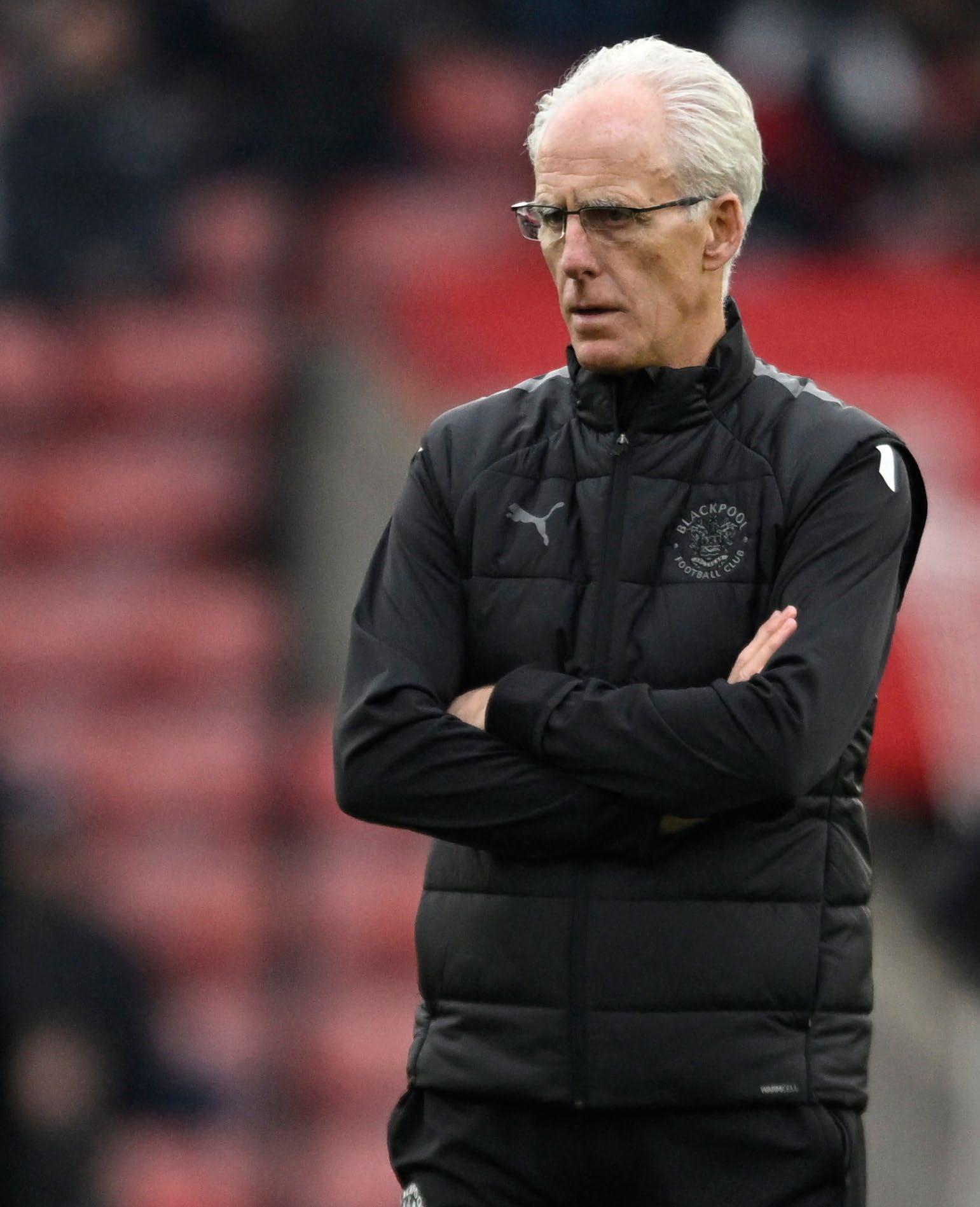

MICK McCARTHY
LMA MEMBER
This job requires a lot of diligence, perseverance and dedication, and I expect those things both of myself and the players. When they arrive at the club in the morning, they know, as I do, that we all need to adhere to the rules and behaviours we’ve set, whether that means always being on time for training, or being polite and respectful to everyone in the building, from the cleaner to the chairman and everybody in between. We’re all in it together.
You have to be consistent, fair and lead by example as a manager, so I’m at the training ground before everybody else
and I’m the last to leave. I’m polite to everybody, shake hands with the people I meet and treat them with respect. It’s hugely important that I live by those values and encourage everybody to do the same.
Doing that helps you to earn the respect and trust of the players. Initially, when you join a club, that respect might come from them looking at your stature and standing as a manager, what you’ve done before and where you’ve played. After that though, you have to earn it, through how you are with them, how
you train with them and speak to them. I also believe it’s important to own up when you’ve made an error of judgement, and to be empathetic and understanding of their personal issues, and emotional and psychological needs.
Most of all, though, I’m always authentic and true to myself. There’s no pretending with me; I am what I am, and I always speak to people in a straightforward and honest manner. I think people trust and respect that authenticity, and that helps them to accept your decisions, even if they don’t necessarily agree with them.
MODULE 3

According to England Women U19 Head Coach Lauren Smith, cohesion, great connections and psychological safety are all key to a happy, high-performing team.
Photography: The FA via Getty Images
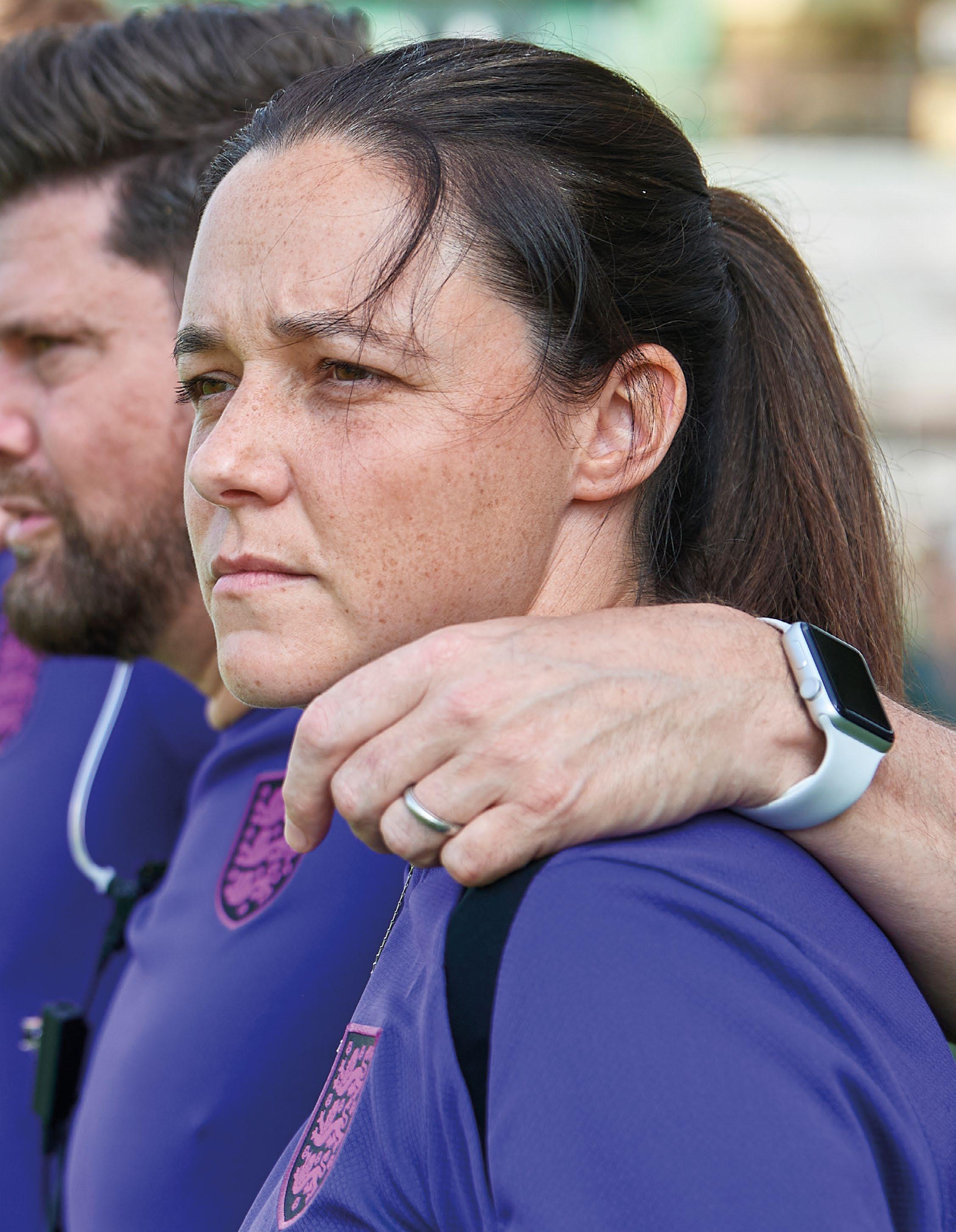
believes in fostering an environment where the players know they can be themselves.
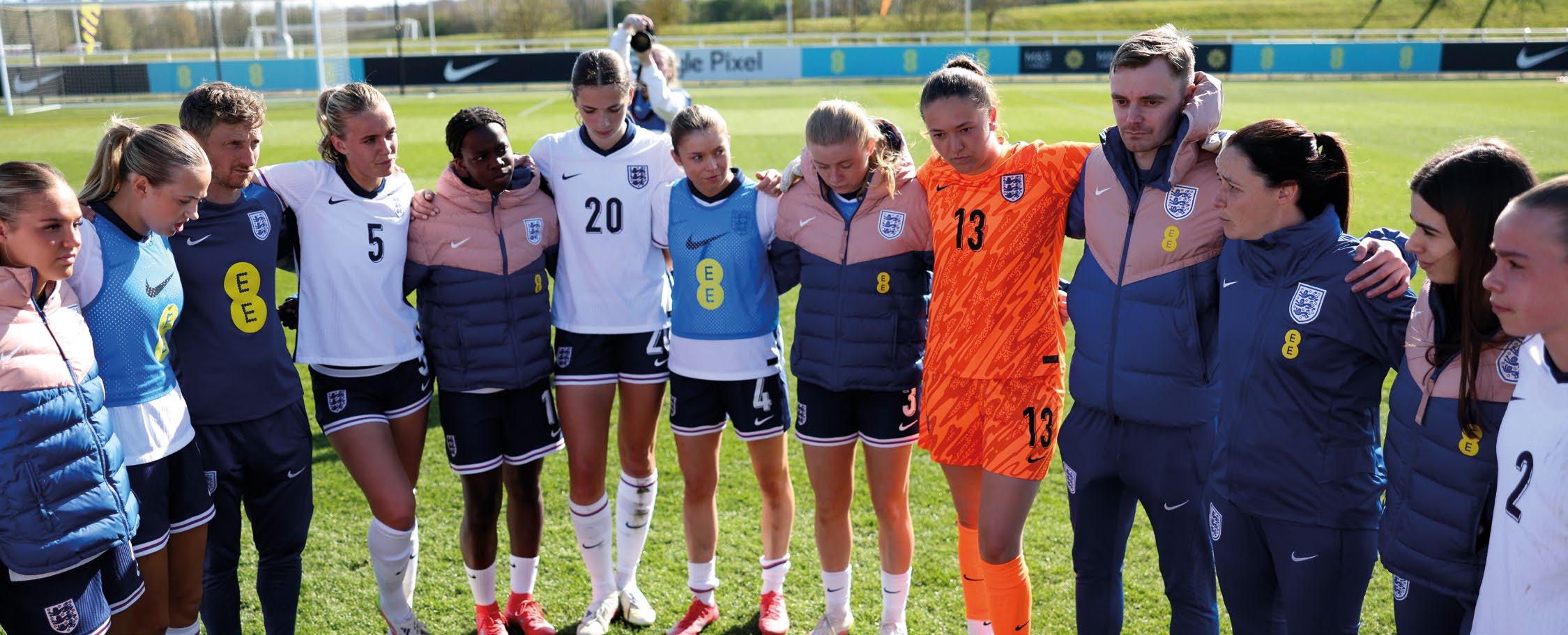
WITH GREAT CONNECTIONS, THE TEAM CAN OVERACHIEVE.
Those connections aren’t built overnight. It takes time and effort to develop bonds and strengthen team cohesion, and if those bonds are too fragile or are only superficial, they will break quickly. I don’t believe there’s a one-size-fits-all solution to building cohesion. In my experience, what works with one group of players doesn’t necessarily work with another. However, what is universally true is that the strongest bonds are formed when people care about each other in a way that goes deeper than just football.
INVITE THEM TO OPEN UP.
One of the best tools I’ve found for facilitating these deeper relationships is storytelling. I give the players opportunities to share something about their families, friends or careers with the group, and that can be as light or as
deep as they choose. You can’t force it, though. The players need to be ready and willing to share and connect with their teammates. It can take time for them to feel safe to do so.
THESE ARE VALUABLE LEARNING OPPORTUNITIES.
It’s when you learn how the players really feel about their environment, and when they find things that they have in common with their teammates, and can unite around. As a coach, you need to understand your players as people in order to help each of them develop, as professionals, teammates and individuals. I believe also in making time for the players to celebrate together, whether that’s because we have a new starter or a first captaincy at camp, or an individual player’s milestone or achievement. It’s important to recognise and celebrate these individual things as a whole team.
WE NEED TO SUPPORT AND DEVELOP THE WHOLE PLAYER.
That means creating an environment where they can express themselves, on and off the pitch. I try to facilitate this by being approachable, and by fostering an open environment, where the players know they can be themselves and they have the time and space to do so. At international camp, for example, I make sure the players have enough time in their schedules to do their own thing. Equally, though, there must be plenty of time for the team to be together as a group, off the pitch as well as on it. They need space to develop relationships with one another, to bond around their shared values, experiences, ambitions, and the thing that’s brought us all together, football.
THE PRIDE OF WEARING THE ENGLAND SHIRT IS A GREAT UNIFIER.
Lauren Smith
The FA via Getty Images
Great teams are never built on individual brilliance. Rather, it’s the brilliance of the team that supports the individual.
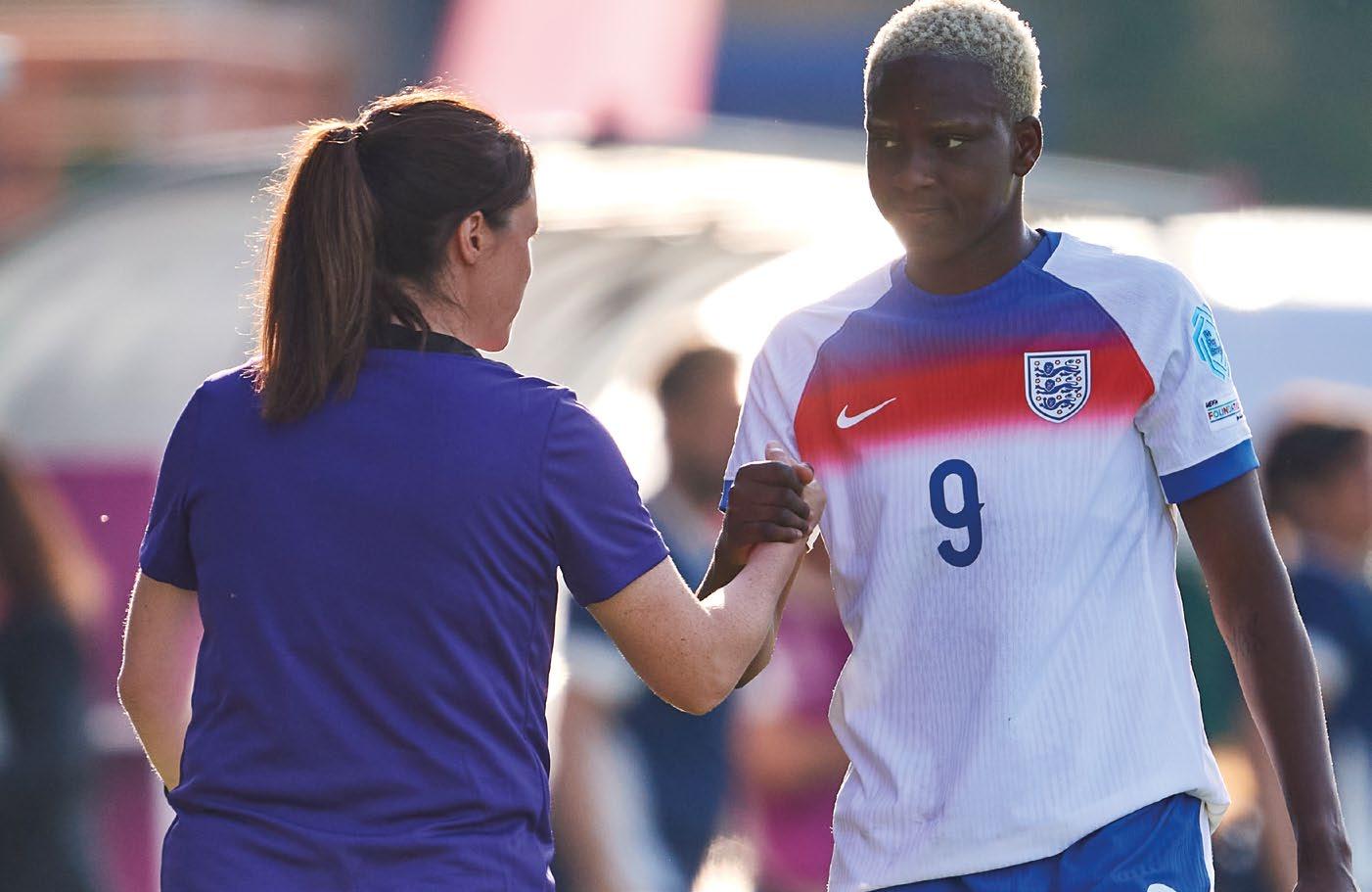
To really understand a player, and therefore help them to develop, you have to build a strong connection, says Smith. The FA via Getty Images
Lauren Smith has been Head Coach of the England women’s national U19 team since September 2024. Prior to that, she was manager of Bristol City Women for three years and has managed the Wales women’s national team U17 and U19 sides.
While it can be more challenging to foster team bonds when you only have short international windows, we have the advantage of that one powerful thing that binds us together – the pride of representing England. It’s an instant foundation on which to work in terms of our team dynamic. Team members don’t have to be best friends; instead there’s a kind of sibling respect and care between them, which is so important, especially when things get tough.
ALLOW THE GROUP TO EVOLVE IN ITS OWN WAY.
A group is an organic entity and you can’t predefine how it will be, or try to set it in one way of thinking or doing. I don’t like my teams to be too rigid. Rather, I know that they will evolve during our time together, because the journey belongs to everyone. It’s important, therefore, to recognise that, and create a sense of safety where every individual
can be themself and support one another.
THE PLAYERS MUST FEEL SAFE TO SUCCEED AND FAIL TOGETHER.
Great teams are never built on individual brilliance. Rather, it’s the brilliance of the team that supports the individual. I don’t believe you can get the best out of people without psychological safety. Equally, you won’t get the flare you’re after, where the players are thinking for themselves, coming up with their own ideas and solutions. People don’t necessarily take the same path in their development; some might get there quickly, others’ paths will be more bumpy. Players and coaches alike will at some point fall off the path or go in the wrong direction for a while, but that’s ok, and they need to know it’s ok. We’re all trying our best and will get there in our own way.
About Lauren Smith
Words: Alice Hoey
MODULE 4
HOW TO: COMMUNICATE.
OWN YOUR PERFORMANCE
Elite level coaching and leadership is a performance role, and communication presents some of your most important performance moments. These are the times when you are on show and have everyone’s ear, so prepare for them, logistically and mentally. Make sure the environment is right, paying attention to the timing, room, light, sound and technology. Choose a moment when you are unrushed and your audience is attentive and calm.
A MULTI-USE TOOL
Communication is the leader’s primary way of developing and reinforcing team identity, building trust and influence, and creating a sense of belonging and cohesion among team members. It is also an opportunity to have an impact on team performance, changing people’s behaviours or perspectives on what is possible. As such, communication should not be taken lightly, nor seen as something rigid or innate. Good communication is a skill that can be learned and improved over time and with practice.
PRACTICE, PRACTICE, PRACTICE
Your communication moments are too important to be left to chance, so prepare and practise, whether that be in front of a mirror or with a third party, or by seeking out varied opportunities to communicate, including under pressure. Evaluate your performance and ask for feedback. Like any skill, communication can and should be improved over time with experience, practice and self-awareness.
UNDERSTAND YOUR AUDIENCE
To communicate in a way that is impactful and relevant, it’s essential to understand who you are speaking to, what’s important to them, their goals, values and challenges, and what core messages and impression you want them to take away. Great communicators are able to adapt their style, framing and delivery according to whether they are speaking with an internal or external audience, are managing up or giving a team talk to the players.
USE COLLECTIVE LANGUAGE
Whether you’re delivering bad news, giving feedback or communicating goals, avoid being personal or calling individuals out. Instead, your language should refer to the group, to ‘we’ and ‘us’, not ‘you’ and ‘I’, and take collective responsibility for mistakes and successes alike. Communicating in this way builds a stronger connection to the team, makes everyone feel an integral part of the group and fosters a sense of unity.
SPEAK WITH INTENT
Before addressing the team, think about what you want to achieve, the message or sentiment you want them to take away. Overload your audience with too much information or too many ideas and they’re likely to retain only a fraction, or may switch off entirely. Aim to focus your speech or presentation around one central theme, with any subpoints linked to this, and allow people time to digest each element and make notes as you go along. Invite questions and feedback, in public or private, at the end, and give clear time-dependent action points, if need be.
HOW AS WELL AS WHAT
Effective communication is about more than simply choosing the right words. The volume, pitch, speed, emphasis and intonation of your voice all influence how well you convey your message. Turn the volume up, for example, and it can convey confidence and authority, while a softer voice can show vulnerability and empathy, inviting people to speak out and share their thoughts and emotions. Varying the pitch and intonation of your voice, meanwhile, is important in keeping the listener engaged, especially during long speeches, and adds depth and nuance.
FRAME IT POSITIVELY
Rather than highlighting weaknesses or errors, communication should be forwardfocused and constructive, finding the positives and opportunities for improvement: ‘next time, let’s make sure we achieve this’ instead of ‘you shouldn’t have done that’. It should also exude confidence: ‘I’m determined to find a solution’, for example, not ‘I’ll try to sort this out’. When speaking about change, meanwhile, positive framing is key. Talk about the benefits of adapting and moving forward, for example, rather than the risks of doing nothing.
FIND A BALANCE
When giving feedback, don’t attempt to sugar-coat or hide important truths. Aim for ‘radical candour’, where feedback is delivered clearly, candidly and directly, but with genuine care and empathy. By challenging people directly, but avoiding making it personal or public, you create an environment of psychological safety. Team members feel their mistakes are opportunities to learn and develop, and can speak out about their concerns and challenges without fear of repercussions.
MAKE CONNECTIONS
To deliver messages that really hit home, try using anecdotes and stories that initiate an emotional connection. That might mean drawing on personal experience, or better still using analogies and comparisons from the team’s past that enable them to better understand, visualise and engage with what you’re saying. While evidence and stats can be useful, it’s storytelling that makes the connection.
MODULE 5
DEVELOPING THE INDIVIDUAL.
While leadership is founded on managing a socially dynamic group, developing that group can only happen by nurturing the unique individuals within it. As Dan Micciche explains, leaders seeking to have a positive influence on individual development must first become attuned to their individual needs and preferences.

Photography: Crawley Town
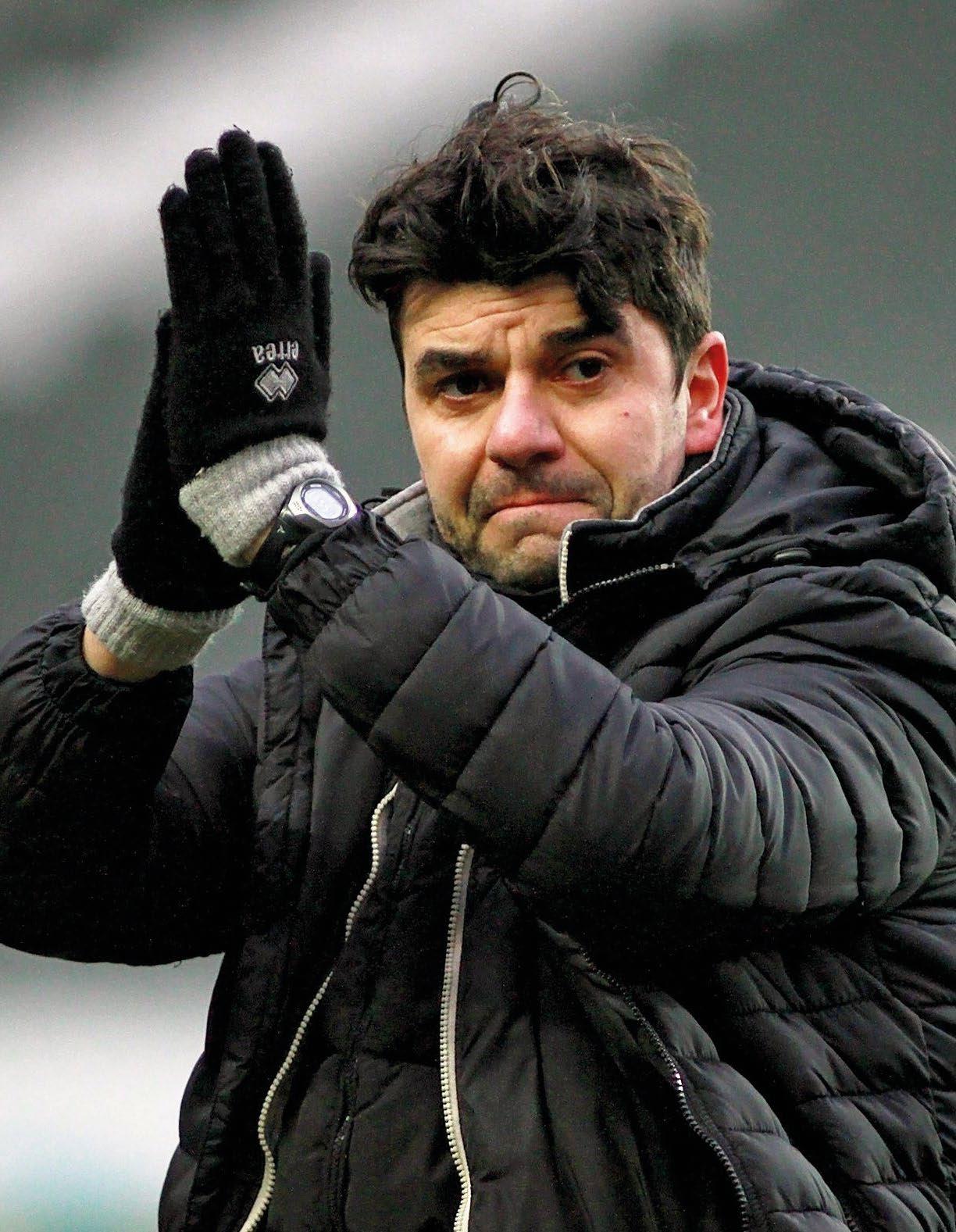
Humans are driven and influenced by their social groups, but they also each have extrinsic and intrinsic motivations within this group environment. According to self-determination theory, these motivations are shaped by three fundamental psychological needs: autonomy, competence and connection.
Autonomy relates to our need to feel some sense of control over our own destiny, while competence is about feeling that we’re contributing something valuable, that we’ve demonstrated good abilities, not passively, but when stretched and challenged. Finally, connection or relatedness links to those core elements of shared identity and values that we know to be of huge importance. We need to feel that we belong to, and are accepted by, the group and that we share something special with its other members.
As a leader, understanding what these psychological needs mean for each individual and finding ways to satisfy them is likely to result in a far happier, more motivated and more productive team. We are all unique, so the extent to which each element is important to us will vary. Similarly, we differ in how we like to be treated, and what motivates or energises us.
For example, while some individuals thrive off being given feedback or praised in front of their peers, others find it embarrassing and value private one-to-ones more highly.
Consequently, it takes a great deal of emotional intelligence, empathy and self-awareness on the part of the leader to ensure that each team member feels empowered, valued, connected and understood. While these interpersonal skills are shaped by our social environment and experiences from early childhood, they can be developed actively through self-reflection, curiosity and by questioning our assumptions and biases.
PLAYER CENTRIC
The ability to build a genuine connection with individual team members is fundamental to the success of a leader, says former England U16 manager Dan Micciche, who spent five years as an Arsenal academy coach as well as a spell as assistant manager at Crawley Town.
“That connection, in turn, builds trust and rapport, which enables you to have honest and open conversations with the other person, to really get to know them, their perspective on things, motivations, ambitions, hopes and fears. It’s only once you’ve invested time in the
relationship in this way that you can create a tailored development plan for that individual,” he adds, “one that puts the player at the heart of the process and gives them ownership and accountability.”
Developing that connection isn’t, however, a one-off process, he adds. Relationships need to be nurtured, because each player’s needs will vary over time. In particular, during times of high challenge, players will need greater support.
“Sometimes they might need to be left to their own devices, to have greater sense of freedom,” says Micciche, “while at others, such as when they’re injured or on loan for the first time, they will benefit from more frequent dialogue. At Arsenal, our motto was, ‘every player matters’, and we would track our interventions with each young player across the coaching and wider multi-disciplinary teams over time.”
This is key, because everything from personal issues to the pressure of the game can impact on players, physically and mentally, and therefore also on the support they require. Micciche believes that his first academy roles as a coach, at Crystal Palace and Tottenham, really helped to
Recognising individual progress and celebrating performance also enhances confidence and sense of competence.
open his eyes to the wide range of challenges that young players can face, and the potential impact of home life on football performance. “I learned, too, how important it is to be patient, to understand that learning and development doesn’t happen at the same speed, or at the same stage, for everyone.”
TRUSTED AND EMPOWERED
Developing the individual also requires coaches to develop excellent active listening skills, whereby you listen not to hear, but to really understand the other person. Not only does this listening with intent enable you to get the players’ perspectives on things like progress, change and the team culture, but it also shows that you really care and builds trust in the relationship.
Asking the players questions, giving them a platform to speak, and then actively listening to them feeds their need to feel competent, because their opinion is being heard and valued, as well as their sense of autonomy. “When players have some input, and their views and ideas are actioned, they feel they have more control over their development and working environment,” says Micciche. “When you have that autonomy and control, you’re more likely to give your best.”
It isn’t always the person with the loudest voice in the room who has the most valuable opinion, he adds, so coaches need to create a learning environment where everyone has an opportunity to be heard. “That might mean regular oneto-ones, either with the coach or another staff member, player-led team meetings or team leadership groups, whereby team members are encouraged to set their own group standards and hold one another to account.”
Likewise, leaders can bolster feelings of competence by assigning individuals greater responsibility, delegating tasks, and showing confidence in their capacity to take on work or make decisions unaided, without fear of failure or repercussions. Recognising individual progress and celebrating performance also enhances confidence and sense of competence.
Ultimately, leaders are most effective when they build connections with every member of the team, listening, supporting and coaching so that each individual feels trusted and empowered to take risks and grow. It’s only through creating an environment in which each individual can shine that the team as a whole can perform at its best.
MODULE 6
10 IDEAS: LEADING THROUGH UNCERTAINTY.
RECONNECT WITH THE BIGGER PICTURE.
During periods of change or uncertainty, it’s more important than ever to unite around your collective vision, identity and values. Constantly articulating why you’re here and what ties you together bolsters the team’s determination to grow and learn together, whatever the future brings, and gives them the confidence and courage to face what lies ahead.
SHOW COMPASSION.
Times of high challenge require equally high support, so make sure you turn up the empathy, keep your door open and be ready to listen during difficult periods. Consider bringing in additional support if need be. Remember, you are in service to the team, so be ready to tend to it, assess its needs and reassure it. Let the team know that you have their backs, whatever happens, and that you’re still on the right path.
CHANGE
YOUR MINDSET.
We can’t, and indeed don’t need to, have the right answer all the time, nor be able to predict or plan for every eventuality. Accepting this reality can take some of the pressure off during periods of upheaval or uncertainty, especially if we strive not to know it all, but to learn as much as possible. Encourage your team to expect and embrace uncertainty; learn to be comfortable being uncomfortable.
Fear grows in a vacuum, so communicating what the situation is and what it means for the team, clearly and regularly, is essential. Without this, people will come to their own, often incorrect, conclusions, and your silence may cause them to become anxious and suspicious. It’s the job of the leader to provide clarity, honesty and positivity, finding opportunities in uncertain times.
READY FOR ANYTHING.
While we can’t predict the future, we can plan for the most likely eventualities, practically, emotionally and mentally. That might mean testing team performance in a variety of difficult scenarios, under pressure or with sub-optimal conditions, or visualising situations that we know would throw us a curveball. While it might be uncomfortable to envisage disappointments or hurdles, it’s useful to imagine how we might feel in such situations, the example we would like to set as a leader and the messages we would want to convey to the team.
DRAW A CIRCLE OF CONTROL.
To prevent fears about the future spiralling out of control and remain rational in your thinking, it’s important to focus only on the things you can do something about. Thinking in ink is useful here. Draw three concentric circles with a ‘circle of control’ in the centre, a ‘circle of influence’ surrounding it and an outer ‘circle of concern’. Populating this diagram with your concerns may demonstrate that you have more control and influence than you thought, or highlight the futility of worrying about things that are out of your hands.
THINK BACK TO MOVE FORWARD.
Encouraging your team to draw on their past experiences can help to validate a more positive view of the situation. Reflect, for example, on times when things hung in the balance, and you felt helpless or anxious about what was to come. How did you handle that, as individuals and as a team? How productive or damaging were negative thoughts and anxiety at that time? Think, too, about the longer-term outcome. Can you identify occasions where opportunities and success emerged from uncertainty and change?
TALK ABOUT IT.
Events that cause uncertainty and change can challenge us both emotionally and professionally, often increasing the volume or complexity of our workload. In response, leaders may feel a responsibility to handle everything on their own and to shield those around them from the pressure and anxiety of events. This can lead to feelings of isolation at a time when their mental wellbeing is already fragile. In fact, times of uncertainty require the whole team to pull together, drawing on their collective experience, skills and positivity. Share responsibilities, allow others to lead, and be resilient as a unit.
QUESTION YOUR THINKING.
Negative thinking traps such as catastrophising, assuming the worst, and filtering out the positives are common in the face of uncertainty and change, and can have a detrimental impact on you and those around you. To remain resilient and perform at your best, it’s important to rein in any thoughts and behaviours based on fears and anxieties. Self-awareness and a willingness to challenge your thinking are key to shifting towards a positive mindset.
LOOK AFTER YOURSELF.
Consistency and routine are fundamental to mental wellbeing, giving us feelings of safety and control. It’s therefore important when we experience instability in one area of our lives that we seek to maintain stability in all others, such as sleep, rest and recovery, exercise, drinking and family time. While it’s easy for these habits and routines to fall by the wayside during times of stress and anxiety, they are key to safeguarding mental health and remaining resilient.
SONIA BOMPASTOR
SONIA BOMPASTOR
BRING IT ON.
For Chelsea women manager Sonia Bompastor, there is no challenge too great nor hurdle that cannot be overcome. It’s a mentality that has seen her rise from star player to triple-winning manager in only four seasons, earning the respect of her players, staff and peers on the way.
Interview: Sue McKellar
Words: Alice Hoey
Photography: Getty Images // Reuters // Action images

BOMPASTOR
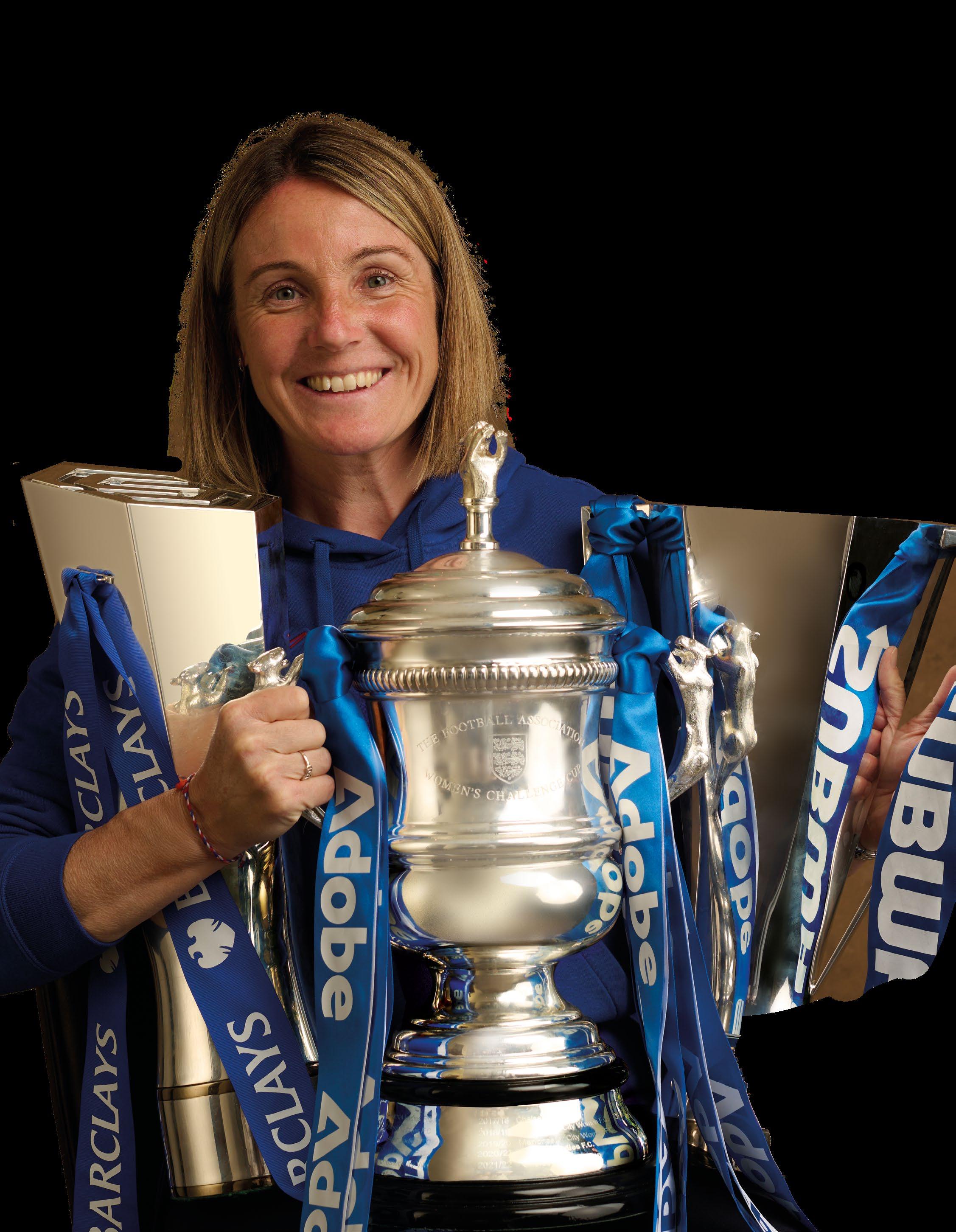
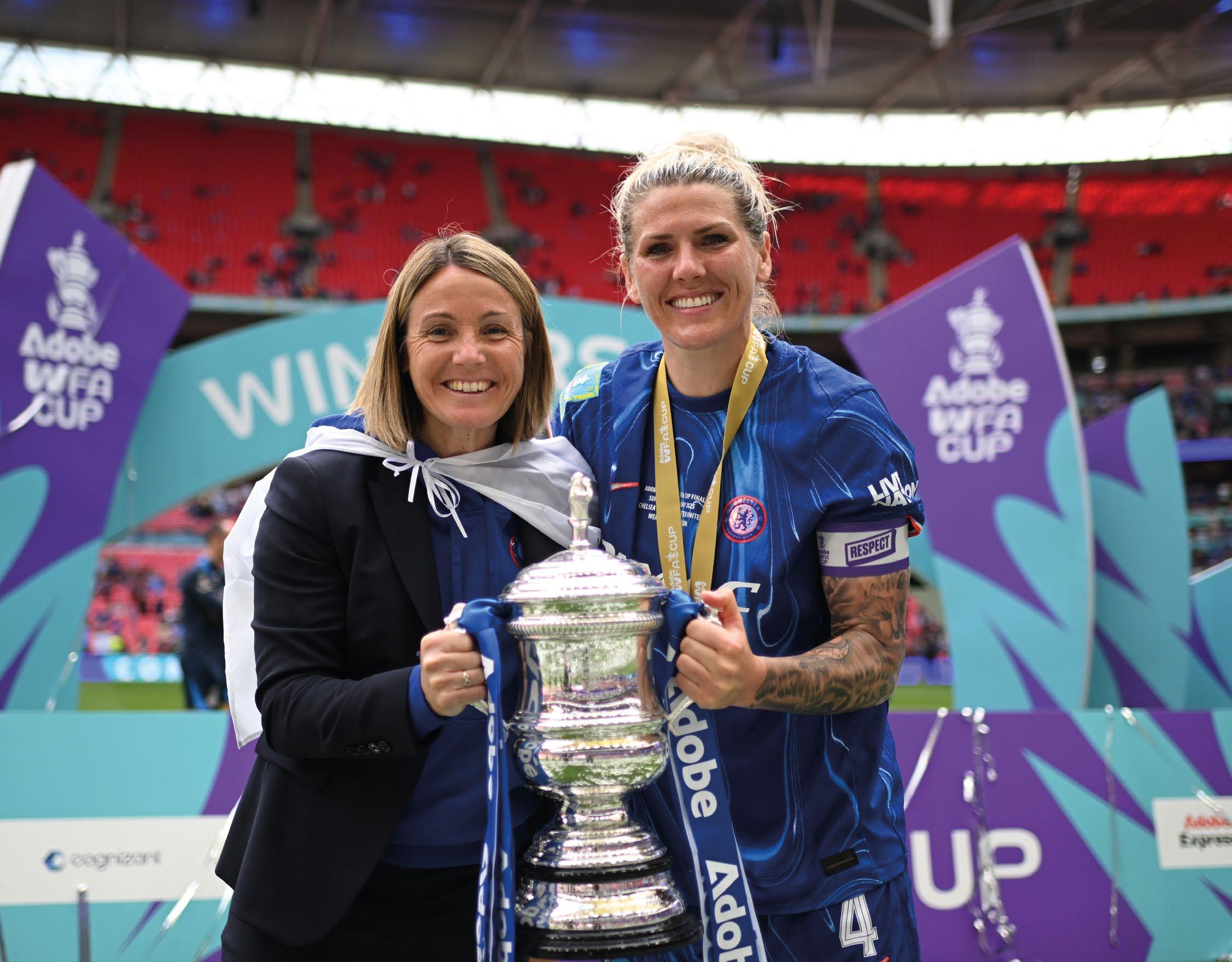
After the Lionesses lifted the UEFA Women’s Euro trophy back in 2022, 68,000 girls took up football, taking the total number of young female players to nearly 850,000 across the country (Sport England). With England retaining the title in 2025, and the huge uplift in visibility as a result of the tournament, that figure will undoubtedly swell further.
It’s a far cry from the world that Sonia Bompastor grew up in.
While 10 per cent of licensed players for the 2023/24 season in France were girls (FFF), back in the 1980s Bompastor was an outlier, the only girl on the pitch, facing constant discouragement for playing a ‘boys’ sport’.
The middle child of three, born in France to Portuguese parents, her interest in football was viewed by some as unbecoming. Yet, undeterred she continued to watch the matches refereed by her father, and tagged along with her
older brother and his friends whenever they played football at the local park or club.
The game can be very thankful that she persevered. Bompastor went on to become one of the finest players of her generation, earning over 150 caps for France and winning 13 trophies across her two three-year spells with Lyon. After retirement, she became the club’s academy director and then manager, honing her skills over four
Sonia Bompastor lifts the FA Cup trophy with Chelsea captain Millie Bright, the side’s longest-serving player. Getty images
I want to show myself and others what’s possible, and I believe there’s a solution to any problem.
seasons, including leading Lyon to three League titles and the Women’s Champions League, before making her debut in the WSL at Chelsea in 2024. After winning the treble in her first season in charge, she successfully marked her card as one of the most promising managers currently leading a team in English football.
“You have to be brave at the age of four or five to pursue something that you love when everyone around you is telling you ‘no’,” she says. “Perhaps I did so because I’m a strong character, or maybe it was dealing with that kind of adversity early on in my life that made me strong. Either way, I had something to prove back then, as I did later on as a professional player, and then a coach and manager. I want to show myself and others what’s possible, and I believe there’s a solution to any problem; any barrier can be overcome.”
ON THEIR SIDE
Perhaps one of the most challenging periods of her early career as a manager came when she made the transition from coaching in Lyon’s academy to managing its first team. Successfully taking the management reins at a club means quickly earning the acceptance and buy in of the players, which can be tough
for even the most seasoned of managers.
“I think the fact I’d had a great career as a player for Lyon and understood the women’s game at the highest level gave me some credibility in the first instance,” says Bompastor. “After that, though, it’s the work you do day in, day out with the team, the knowledge you demonstrate and your behaviour in the first three or four months that earns the players’ engagement and respect.”
Good leadership, she adds, is as much about your behaviour and the example you set than any credentials on paper. As well as being incredibly hard working, Bompastor is naturally empathetic, something that no doubt contributed to her appointment as captain at Lyon during her playing days. “Most players tend to focus only on themselves and their performance, and may not think too much about their teammates or support staff,” she says. “I wasn’t like that. I was always checking in on my fellow team members, looking for ways to help them, and feeding back to the manager and staff if there were any issues or concerns they should know about.”
ADVICE AND FEEDBACK
Having the empathy and desire to support those around you is
key as a leader, she says, but you also have to be able to recognise who is there to support you as the manager. “I think I’m good at surrounding myself with people who I know will help me to develop and who are strong where maybe I have a weakness, because we all have faults and areas for improvement,” she says. “I’ve always welcomed it when people have come to me with suggestions or advice on how to do things. I’ve never felt offended by that. It’s an opportunity to improve.”
At Lyon, Bompastor regularly sought feedback from a professional who was external to the club, but with whom she worked often and trusted. “They understood my perspective, and were able to offer alternative approaches, in particular in relation to communication, that I might try in order to get my
I’ve always welcomed it when people have come to me with suggestions or advice on how to do things. I’ve never felt offended by that. It’s an opportunity to improve.
messages across more effectively,” she says. “Likewise, now at Chelsea, I encourage feedback from my staff. For example, prior to a meeting with the players, I’ll speak with my support team to get their thoughts on how I might approach getting my messages across, the tone and so on that they think will work best.”
This close and open communication with her support staff was particularly valuable when she first joined the WSL club, following the successful 12-year tenure of Emma Hayes. While she was confident she could take the baton and run with it, any change in leadership carries some risk, and there can be resistance and anxieties among staff and players during the transition.
“The most important thing is to have clarity and alignment
in terms of standards and expectations, vision, goals and how you’re going to deliver on those ambitions,” she says. “You have to recognise also that change isn’t always easy for people, so it’s best to be clear about what you’re doing and why, and then give them the opportunity to open up and give their perspectives on things.
That doesn’t mean you abandon the direction and methods you’ve set just because someone doesn’t like it, but it’s far better if you can bring everyone with you willingly, rather than simply imposing change upon them.”
IN ANOTHER LEAGUE
The change was, of course, nowhere felt more than by Bompastor herself, who faced the challenge of moving not only to a new job, but relocating her family to a new country. As ever, it was a challenge she
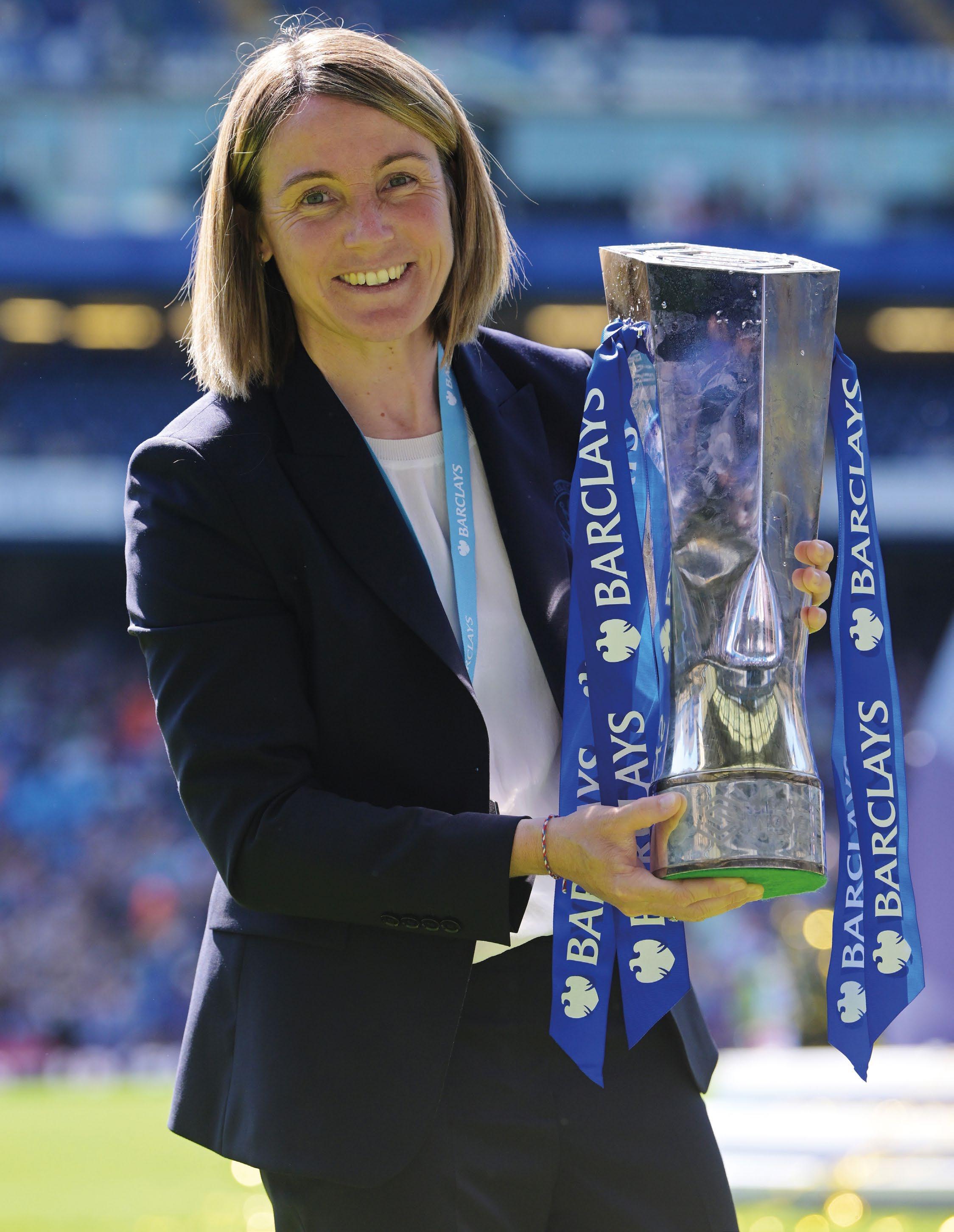
Bompastor poses with the 2024/25 WSL trophy. Getty images
I’m so grateful to Chelsea and to the LMA for making me feel so welcome right from the start.
was determined to take head on. “I’m so grateful to Chelsea and to the LMA for making me feel so welcome right from the start, and for their support in everything from helping to get the family settled quickly to arranging language learning support,” she says, adding that it made her even more determined to give 100 per cent to the role.
Currently completing her UEFA Pro Licence, Bompastor says
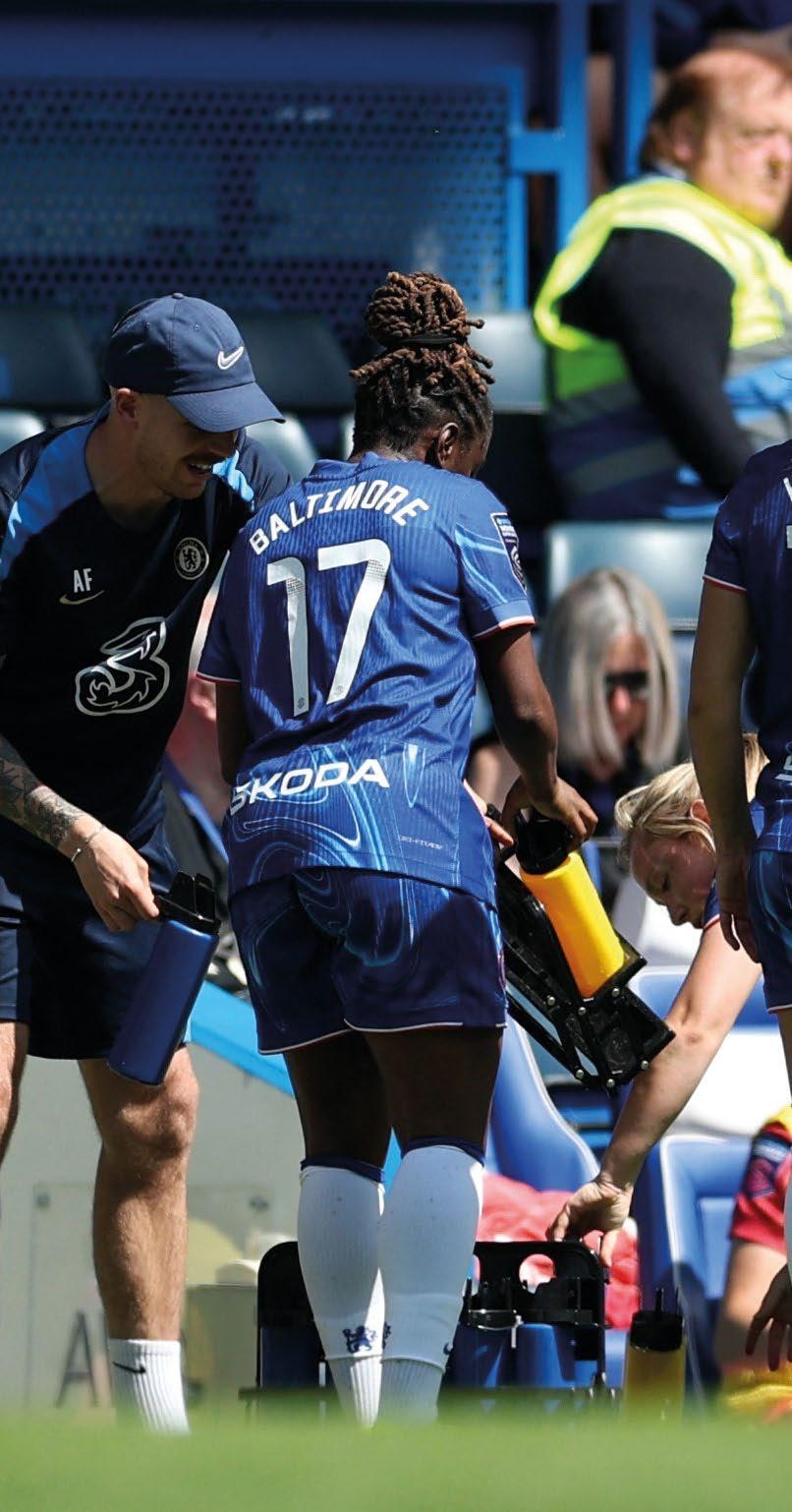
she’s ever conscious of the need to remain open-minded and curious in order to keep growing as a manager, learning not just from the world of football, but from other sports and leaders.
“I believe it’s really important to keep proving to myself that I can push myself further and further, and continue to learn and grow, and that as a woman in my mid-40s with four children, I can do that without compromising on my family life,” she says.
“When I was younger, I never thought I’d be able to achieve a successful personal and professional life; I assumed I’d have to decide at some point between the two, but I’m proud of the balance I’ve achieved.
I’ve never compromised. I’ve always given everything, physically and emotionally, to what I’m involved in, whether it’s my kids, playing or managing. I’m always 100 per cent invested and committed.”
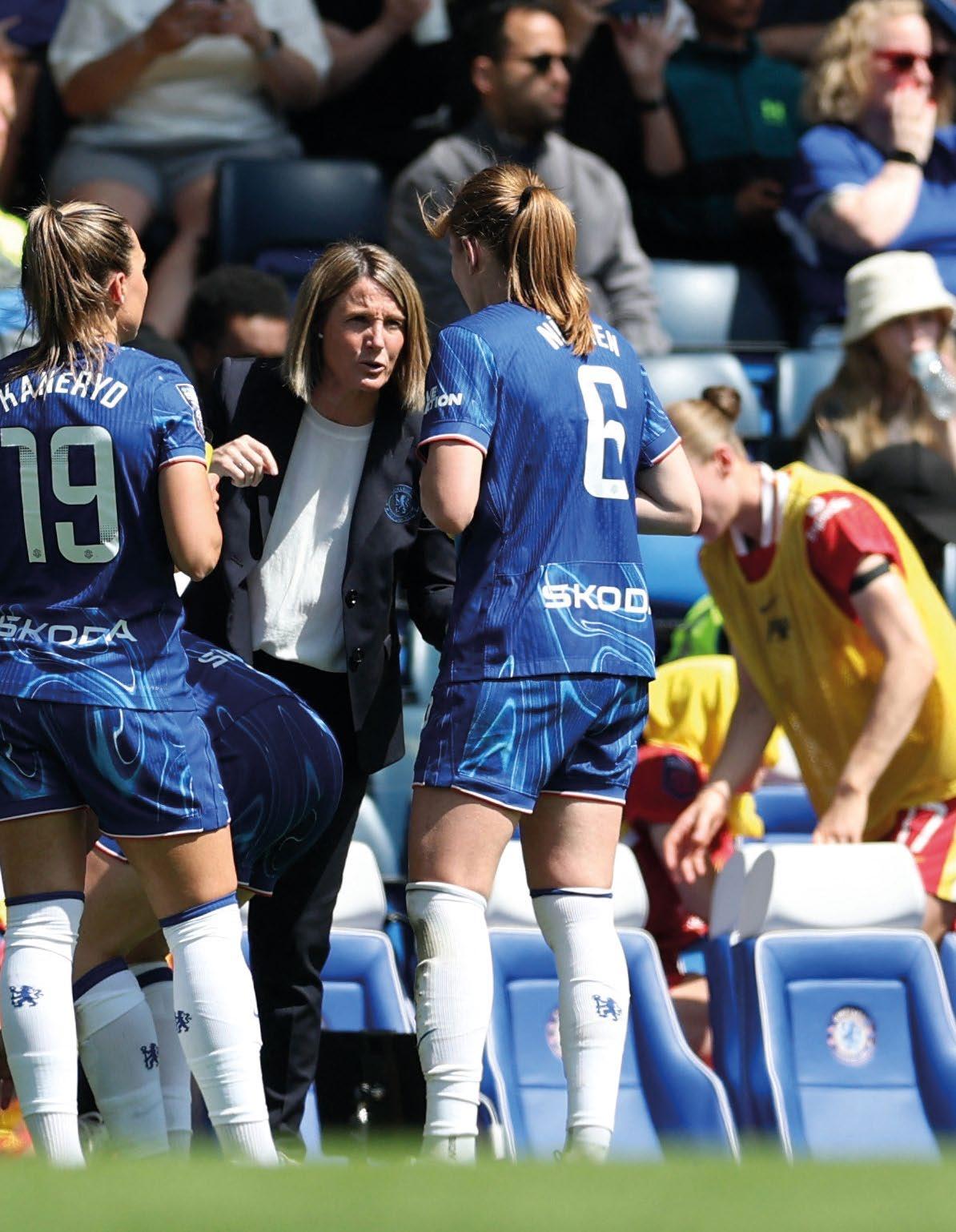
Bompastor believes strongly in bringing her team members with her, getting their buy in on her plans and decisions.
Reuters // Action images
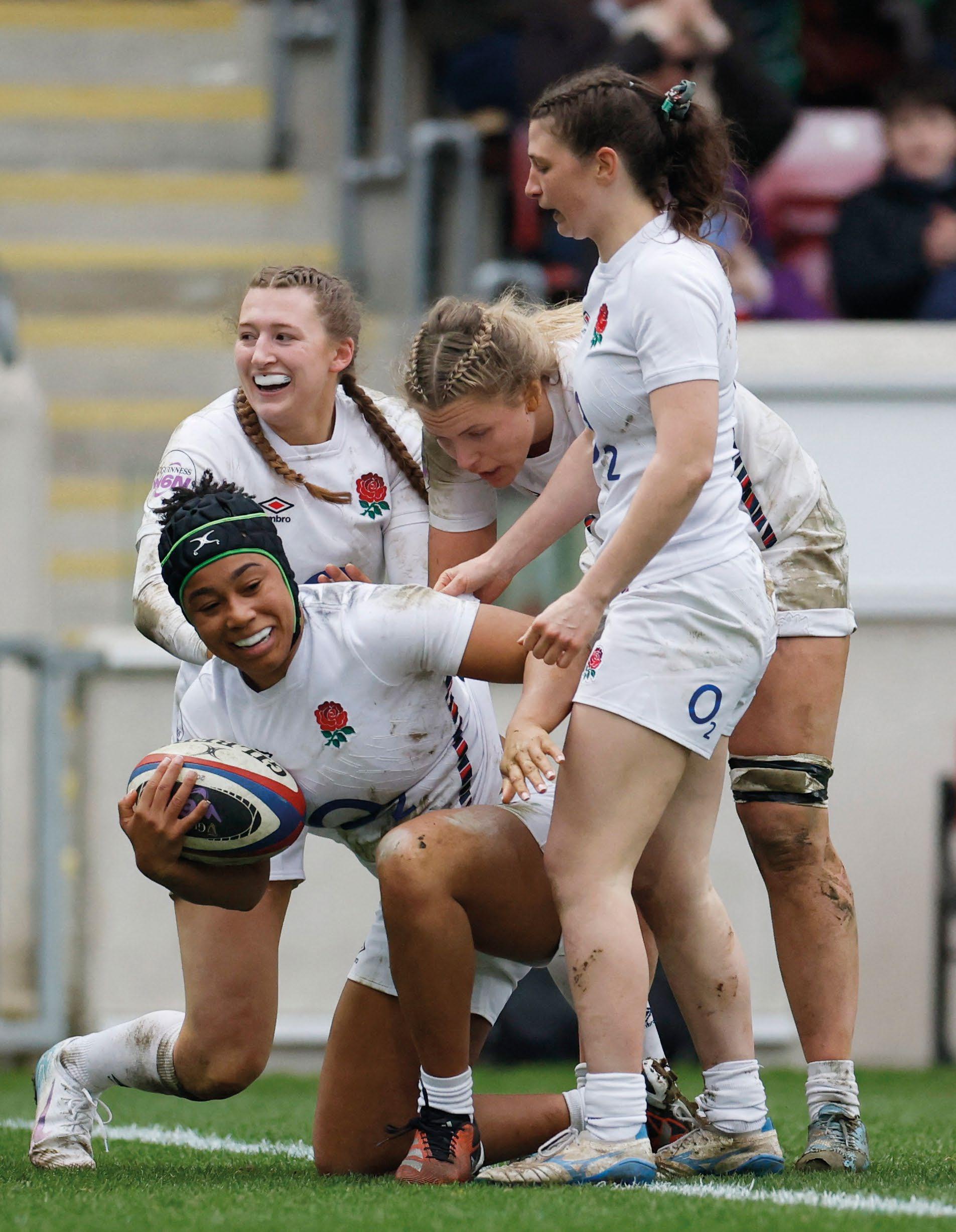
England’s Sadia Kabeya celebrates with her teammates after scoring a try against Italy in the Women’s Six Nations, March 2025. Reuters // Action Images
FROM ANOTHER SPORT:
CHARLIE HAYTER
PLAYING THE LONG GAME.
With the Women’s Rugby World Cup well underway, Charlie Hayter discusses his role as Head of Women’s Performance for England Rugby, and the challenges and opportunities of elite competition on home turf.
Interview: Alice Hoey
Photography: Reuters // Action Images
I’M RESPONSIBLE FOR PEOPLE, PLANS AND PROCESSES.
My role extends across the England Women’s performance and pathway system, from the development programmes for the U18 and U20 teams, through to the Red Roses. In that, I work closely with a broad performance team of coaches, and sports science and medicine professionals, as well as on strategic planning. In particular, I need to ensure we’re where we need to be throughout the fouryear cycles of major competitions such as this summer’s Rugby World Cup. I also liaise with the various stakeholders in England Rugby, externally and internally, to make sure we’ve got the best resources at our disposal, human and otherwise, and that we’re making optimal use of those resources.
THERE’S A BIGGER PICTURE OF DEVELOPMENT.
Throughout my 10-year playing career, I always tried to be curious, and was conscious of having only a limited time as a professional athlete. I’d therefore look to do other things outside of the game, including work experience in different industries, even things I knew I was unlikely to pursue later on. Likewise, with the players in our own teams, I believe we have a responsibility to help them to develop as people, and not just as athletes. After all, even those who do
make it to become professionals will have retired by their midthirties. We’ll look, therefore, for avenues to ensure the players have embedded opportunities to act on life outside of rugby.
THE 2025
WORLD
CUP
IS LIKE NOTHING WE’VE FACED BEFORE.
Going into an event of this scale on home turf as the favourites is incredibly exciting, but of course it presents some challenges. There’s a balance to be struck between normalising it, and recognising that it’s going to be far from normal. We’re aware of the opportunity that winning brings, not only to put our name on the trophy again after 11 years, but also the broader impact it could have on women’s rugby and sport. It’s important that we don’t add pressure unnecessarily, though, and the language we use, day-to-day, within the wider team, and how consistent we are in our communication, is crucial in this.
THIS IS A PERIOD OF GREAT CHANGE FOR THE PLAYERS.
We decided to bring in a performance lifestyle expert to help them manage the transition to the World Cup, and support any changes that may be on their minds over this period. I believe this will turn what might have been a performance distractor into a performance enabler. I’m proud of the psychological support network we have in
Our ultimate goal is, of course, to win the World Cup, but there also has to be fun.
place within the performance team, and this is part of that. It’s valuable, when you have potentially challenging or unpredictable aspects of your life, to know that they’re under control or that there’s support available should you need it.
WE CAN’T BE ‘ON’ ALL THE TIME.
Our ultimate goal is, of course, to win the World Cup, but there also has to be fun. I’m making sure we don’t lose sight of that. A lot comes down to the environment that we create, so whether, for example, we have dedicated spaces where players and staff can switch off. Furthermore, we have definitions of success aside from winning, and in fact we talk about these more as a team than anything else. Success at
England’s Zoe Aldcroft lifts the Women’s Six Nations trophy after the side’s victory against France in the final at the Allianz Stadium, Twickenham, April 2025.
Reuters // Action Images

the World Cup would mean a massive amount to everybody involved in the programme, but there’s also an opportunity to make sure it inspires and benefits those coming through the pathway, the girls who aspire to be the Red Roses of the future.
THE WHOLE PERFORMANCE TEAM HAS TO BE UNITED.
In the run up to the World Cup especially, it’s essential that we’re really clear about our vision as a group, why we’re here, what our priorities are and what standards, behaviours and language we want to uphold. Those things aren’t just something to be agreed on at the start of the season or cycle; you have to keep refreshing them over time.
DEVELOPING
THE TEAM MEANS DEVELOPING THE INDIVIDUALS WITHIN IT.
You have to put time and effort into working with each person, and that’s a different challenge at international level. You don’t have daily access to the players all year round, so when you do have them you have to find ways to accelerate those connections, both with and between members of the group.
The players need to spend time with one another, to get a better understanding of where they’re each coming from, why they are how they are and what drives them. Everyone has their own individual ‘why’, the thread that pulls them. But one individual thread will never be as strong as many threads all pulling together in the same direction.
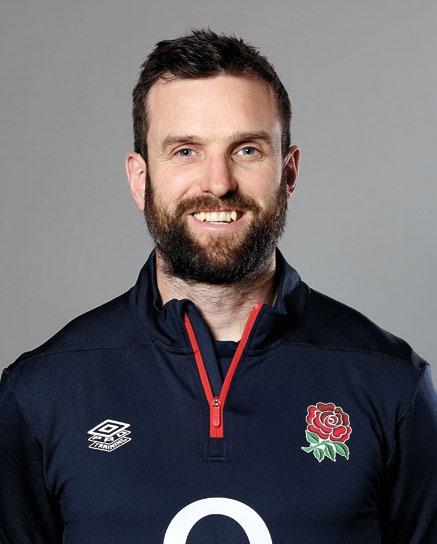
About Charlie Hayter
After a successful club and international playing career, Hayter moved into coaching in 2019, becoming Head Coach for the women’s 7s team. Three years later, he was appointed team leader and assistant coach for the GB 7s teams, heading to the Tokyo Olympics and 2021 World Series. In 2022, he was named Women’s and Sevens Performance Manager at the Rugby Football Union, tasked with overseeing the management of the women’s XVs game at international and domestic level, as well as the men’s and women’s England 7s programmes.
KEY TAKEAWAYS
ANNA HEMMINGS MBE
READY FOR ANYTHING.
In a recent LMA Webinar, Anna Hemmings MBE shared her experiences of training and competing as a marathon kayaker, winning six World Championship golds. Here are our highlights.
Photography: Anna Hemmings
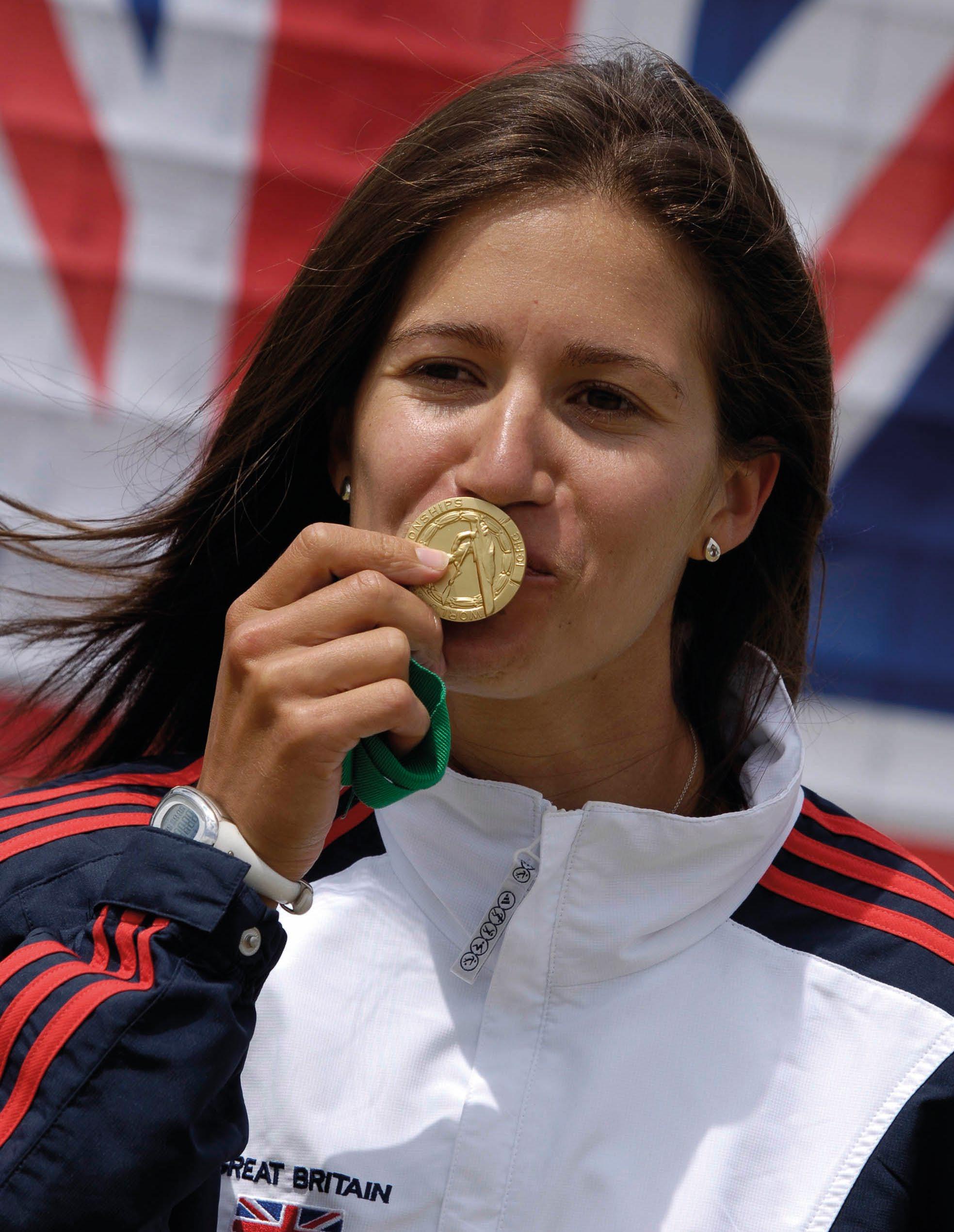
Now an inspirational speaker, Anna Hemmings shares the thinking, methodology and techniques she used to become a six-times world champion. Anna Hemmings

AN INSPIRATIONAL CLUB ENVIRONMENT IS INVALUABLE.
My club was one of the best in the country, and produced a number of Team GB athletes, who would regularly go off to compete in the Junior or Senior World Championships.
To be able to mix with them in the clubhouse, watch them train and hear their stories was incredible for me as a young athlete. The fact that I knew them to be normal people who trained and worked really hard made my own ambitions very real and obtainable.
TRAINING
CAN BE BOTH COMPETITIVE AND FUN.
As well as the formal races that I and my fellow kayakers went to, our training was based around races and time trials, with athletes of varying ability competing to move up through the system. It was a highly competitive environment, but there was also a big social aspect to the club, and that
was really important to me as a young athlete. It made it easier to turn up to training four or five times a week, and I didn’t feel I was missing out on the ‘normal’ teenage things my school friends were doing.
HIGH
PERFORMANCE REQUIRES COMMITMENT AND EFFORT.
To reach and stay at the top you have to be consistent, in terms of turning up to training, each and every time, and allowing your body to recover in between. That’s key because just attending training regularly is not enough; recovery means you can give it your all when you’re there. It’s the same in a corporate environment. Nobody can sit in meetings all day long and stay focused. In fact, neuroscience shows we can only fully focus for between 90 and 120 minutes at a time. To stay effective throughout the day, we need to build in short periods of recovery, whether that’s taking a walk, doing some
deep breathing exercises or engaging in an activity that you find re-energising.
ADDRESS THE WHAT-IFS.
To succeed at the highest level in this sport you need to excel in endurance, but also be good tactically. At my club, we spent a lot of time training with different people and in different scenarios. This is important, because a lot of our anxieties around our performance come from the unknowns. Scenario testing gives you confidence. You know that whatever happens you’ll be able to respond, because you’ve done it so many times before.
VISUALISATION PREPARES YOU, MENTALLY.
You can do all the training in the world, but how well you perform on the day is also a function of what’s going on in your head, your self-belief and confidence. Visualisation was an important tool for me. As part of my event planning, I would visualise how I wanted to think and behave,
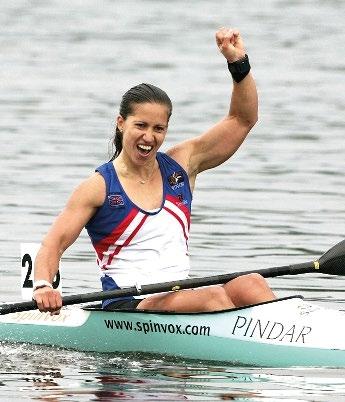
About Anna Hemmings
Anna Hemmings MBE is Britain’s most successful female marathon kayaker, with 11 World and European Championship medals, nine of them gold. Since retiring from sport, Hemmings has become a recognised specialist and leading inspirational speaker on resilience and the psychology of high performance. Hemmings is an accredited Leadership Coach and founded Beyond the Barriers high performance training consultancy. www.annahemmings.com
In the best teams, the trust is so good that they can say ‘I don’t understand’ or ‘I messed up’, confident that there will be no blame and no repercussions.
right from before I got into the water, through to the end. I would also visualise how I would respond in the face of potential setbacks, like bad weather or me not making the best start, so I’d be ready for any eventuality. Importantly, the focus was always on my process and the things I could control.
HIGH-PERFORMANCE
ENVIRONMENTS REQUIRE HIGH LEVELS OF TRUST. My kayak doubles partner and I were able to have very open and honest discussions about what went well or needed to be improved in our performance. Often, people are too worried about the consequences of opening up with each other. In the best teams, the trust is so good that they can say ‘I don’t understand’ or ‘I messed up’, confident that there will be no blame and no repercussions.
ADMITTING FALLIBILITY
AND ACCEPTING SUPPORT IS KEY.
At the peak of my career, I was diagnosed with chronic fatigue syndrome and was told I would probably never race again. I was out of the sport for two years, but like many athletes, I put a brave face on, making out I could deal with anything. In fact, the turning point for me was when I allowed myself to ask for and accept support. I successfully recovered, overcame my self-doubt and with the help of a compassionate and empathetic coach, I fought my way back into the sport.
FEEDBACK IS HOW YOU IMPROVE.
The best coaches are able to deliver it clearly and honestly, but with compassion and understanding. While the focus tends to be on technical feedback – what you need to correct in your performance –positive reinforcement is just as important. People need to hear that they’re doing well, and be made aware of what they should be doing more of. It’s essential for morale and self-confidence.
SAMUEL OKAFOR INTERVIEW
WE’RE HERE, WE’RE LISTENING.
With people from ethnic minority backgrounds still woefully underrepresented in non-player roles across the football industry, we speak to Kick It Out CEO Samuel Okafor about the importance of transparency and knowledge sharing.
Interview: Alice Hoey
Photography: Kick It Out
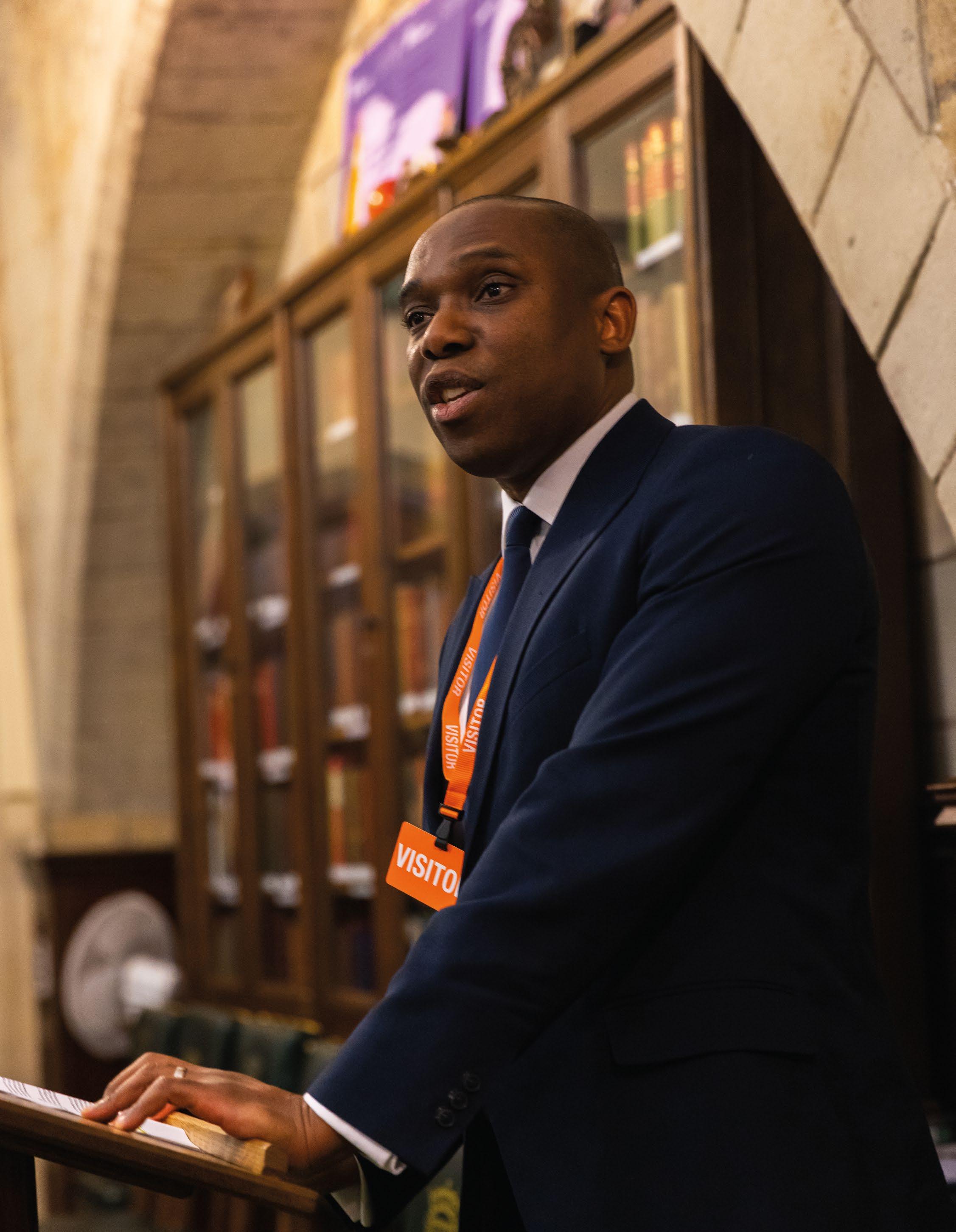
Samuel Okafor addresses MPs and football stakeholders at a Westminster reception. Kick It Out

As a former player with experience of league and non-league football, Kick It Out’s Samuel Okafor has a solid understanding of the football industry at all levels of the pyramid. Perhaps more interesting, though, is his 25-year post-football career in retail and wealth management, at Natwest and Coutts.
“Having that breadth of knowledge, expertise and leadership, in professional sport and financial services is certainly an advantage in this role,” says Okafor, who joined Kick It Out in July 2024. “It means, in particular, that I’ve seen the kinds of challenges and opportunities involved in implementing diversity, equality and inclusion (DEI) programmes
in industries that are at quite different stages of their DEI journeys.
“It’s always interesting to compare approaches,” he adds.
“I’ve seen real positive intent in organisations, borne out in their commitments and public statements and the targets they set around DEI.” Goodwill alone, however, is rarely enough, and Okafor, who led a racial equality taskforce at Natwest, has seen first hand the barriers that can hinder action towards lasting change.
“Sometimes initiatives fail because middle management or senior leadership are reluctant to implement new policies or change longstanding practices, either because they’re change-
averse or because they’re not fully engaged,” he says. “On other occasions, it’s down to the need to satisfy multiple stakeholders and a lack of appreciation of the commercial benefits of increasing diversity. Unfortunately, while most people now understand and would agree with the moral reasons for DEI, there’s work to be done to articulate the business benefits.”
It’s here, in particular, that Okafor believes many organisations fall short. “Football is no exception. Financial success and sustainability, and diversity and inclusion have traditionally been seen as quite separate entities, but in fact the two go very much hand in hand,” he says. “When
Delegates speak to football industry professionals at Kick It Out’s Raise Your Game event, designed to help underrepresented groups enter the game. Kick It Out

you are a diverse and inclusive club, you’re better able to connect, engage and grow your fanbase, which ultimately is good for your bottom line.”
A TRUE REPRESENTATION
Kick It Out’s agenda has grown and broadened since its inception over 30 years ago, with an original remit to ‘fight discrimination, in all its forms, within sport’. This has included running educational workshops, supporting and empowering victims of abuse and discrimination, and working towards an industry where everyone has an equal opportunity to thrive.
An updated strategy, to be launched at the start of the 2025/26 season, will strengthen
When you are a diverse and inclusive club, you’re better able to connect, engage and grow your fanbase, which ultimately is good for your bottom line.
efforts to make the game more welcoming for all. It will also prioritise improving representation on and off the pitch across the men’s and women’s games, and ensuring stronger accountability in tackling discrimination.
There’ll also be a continued emphasis on increasing the representation of women and people from ethnic minority backgrounds in coaching and management, match official and decision-making roles in the industry. Despite an awareness of the problem, progress has been painfully slow.
In 2023, the Szymanski Report, which examined the representation of Black people in English Football at
management level, found only 4.4% of managerial positions usually taken by former players were given to Black employees. At executive level, meanwhile, Black executives accounted for only 1.6 per cent of leadership and ownership positions. Against a backdrop of Black people accounting for 43% of players in the English Premier League and 34% in the English Football League, and with little change in the figures year on year, the report makes for sobering reading.
“It’s so important that we have people in our clubs, all the way to the top, who reflect their local communities, so they can make decisions that are aligned with those people,” says Okafor. While the desire for change is certainly there, he adds, there’s a lack of
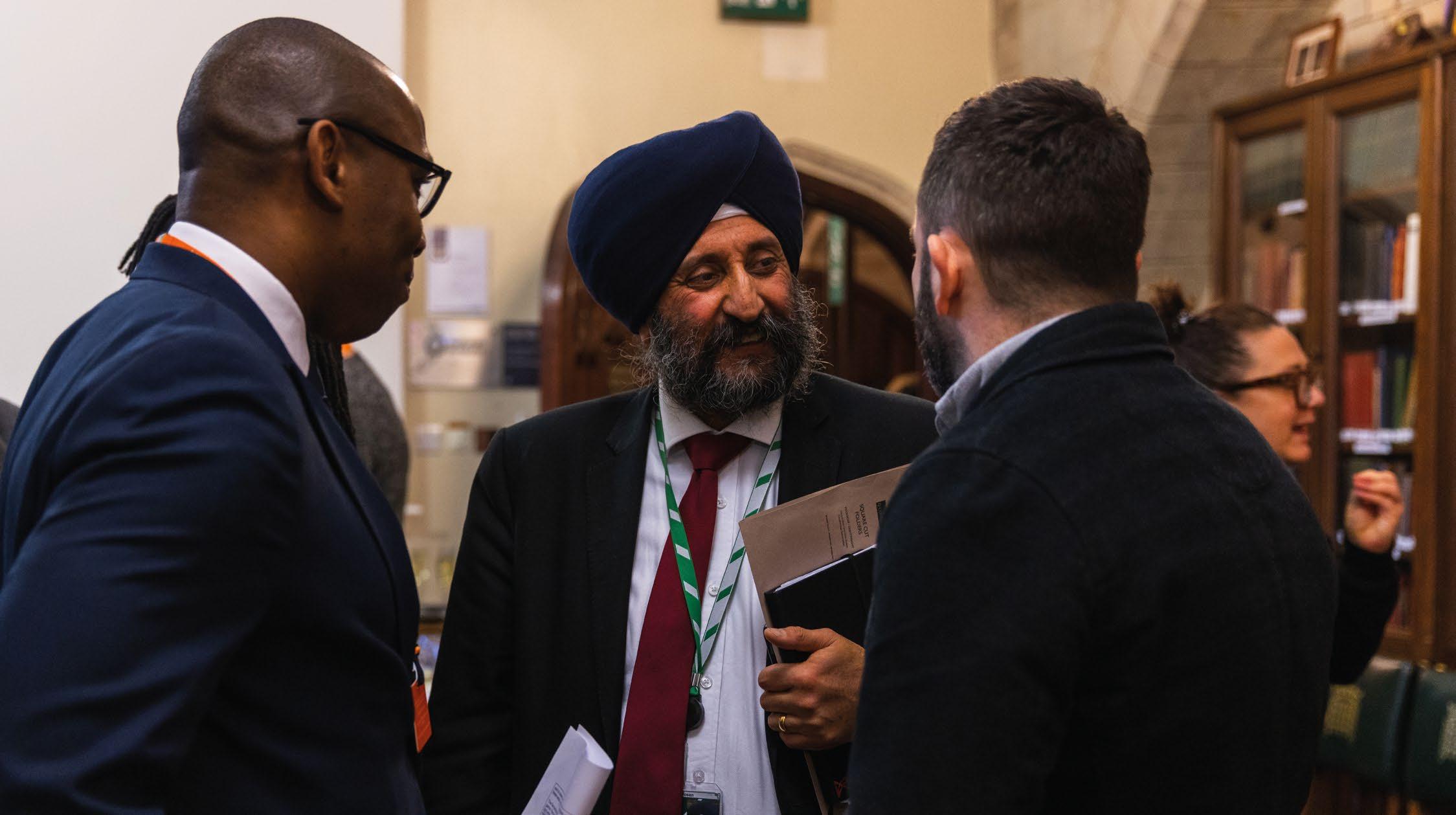
understanding of the real issues, and so how best to tackle them.
“If the game is serious about achieving greater diversity at all levels of the game, it needs to first unravel not only the extent of the problem, but the root causes, the structural barriers,” he says. “There is insufficient data being shared, for example, on how many Black, Asian and ethnically diverse players are completing their Pro licences, and what recruitment processes are being used. We need up-to-date information also on how many Black coaches and managers are applying for jobs versus how many are being shortlisted.
“Similarly, when underrepresented groups do get jobs, what barriers exist
to them staying in their roles and progressing? After all, there’s little point improving diversity if you don’t first ensure the work environment is inclusive. Otherwise, those talented people will simply leave or find it impossible to fulfil their potential.”
A LEARNING JOURNEY
With greater transparency of data and a better understanding of the ‘why’ behind the ‘what’, clubs and organisations like Kick It Out can set realistic targets and hold themselves accountable to them. This will, however, happen much faster through collaboration, says Okafor.
“Organisations need to come together to pool their resources
and expertise, rather than trying to solve these complex issues on their own. At Kick It Out, we want to work with the boards and leadership teams of clubs throughout the leagues to help them understand the huge rewards of driving inclusion and diversity, and how to achieve that.”
He also believes that with good progress being made in other sports and business sectors, leaders in football could learn a lot by looking outside their own industry. “To give one example, annual workforce reporting –where an organisation provides details such as the composition of its board, board pay, and gender pay gap – was introduced in football in June, but has been commonplace in UK businesses for many years.”
Kick It Out interacts with attendees at a recent Westminster reception. Kick It Out
Organisations need to come together to pool their resources and expertise, rather than trying to solve these complex issues on their own.
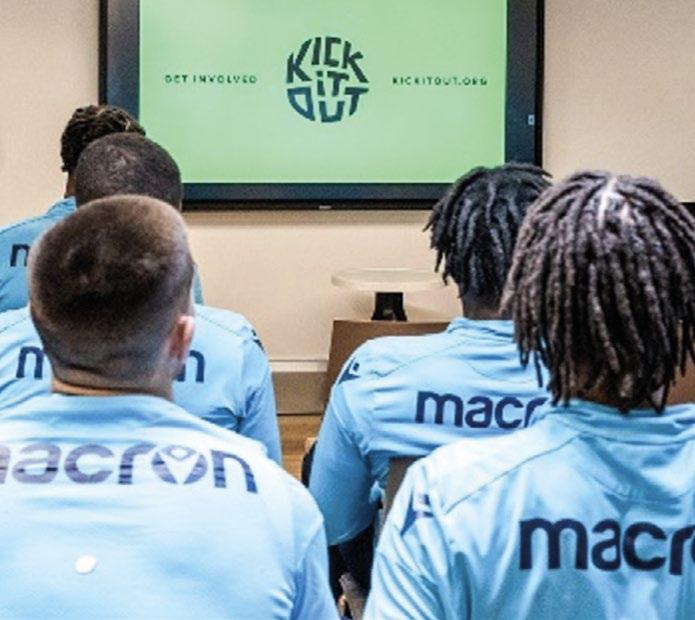
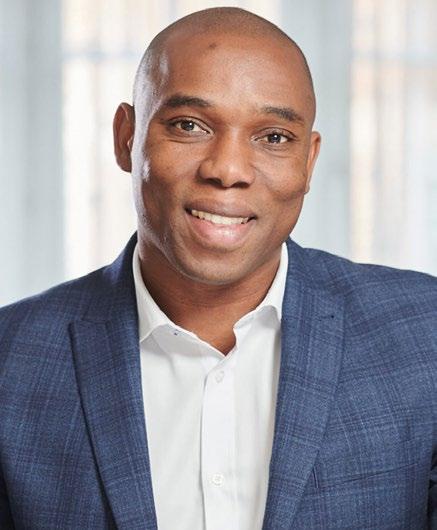
Across the Pond, meanwhile, the WNBA and NBA have been recognised as leaders in diversity and inclusion. Advances in their hiring processes have resulted in far more diverse representation, including in ownership, leadership and coaching positions.
Alongside these medium-tolong-term strategies, Kick It Out continues to be a powerful voice in the fight against racism, which many people face each week, at matches and online. “Racism at games is still very much a problem, while online abuse is a growing concern that has a serious impact on the wellbeing of players, coaches, match officials, and even family members,” says Okafor.
“We’ve done some work with Ofcom over the last few years
to ensure they’re better able to hold social media organisations to account. More, however, needs to be done to safeguard those at risk, and ensure they’re able to use these online platforms without fear of abuse and discrimination.
“In this, and on the issue of underrepresentation and exclusion at work, we want to send a very clear message to people that we’re here, we’re listening, and we want to hear their opinions and experiences. The better we can understand the challenges that people are facing, on all sides, the better we can help to break down the barriers that exist in the game and fight discrimination in all its forms.”
During his time as a player for non-league clubs, including Dover Athletic, Enfield Town and Bromley, Okafor joined NatWest as a customer service advisor, and worked his way up to branch and then area manager. He became an executive director at Natwest and Coutts. Okafor also holds several board positions in the charitable sector.
Academy players attend a Kick It Out workshop. Kick It Out
IN CONVERSATION WITH
JAY AHLUWALIA AND TONY OWEN
HANDS ON, PRESENT AND VISIBLE.
Alice Hoey met Jay Ahluwalia, Principal Director at Dominus, and Tony Owen, General Manager of The Dixon, one of an expanding portfolio of hotels owned and managed by the group, to discuss leadership for sustainable high performance.
Interview: Alice Hoey
Photography: Mark Batch // Paul Winch-Furness
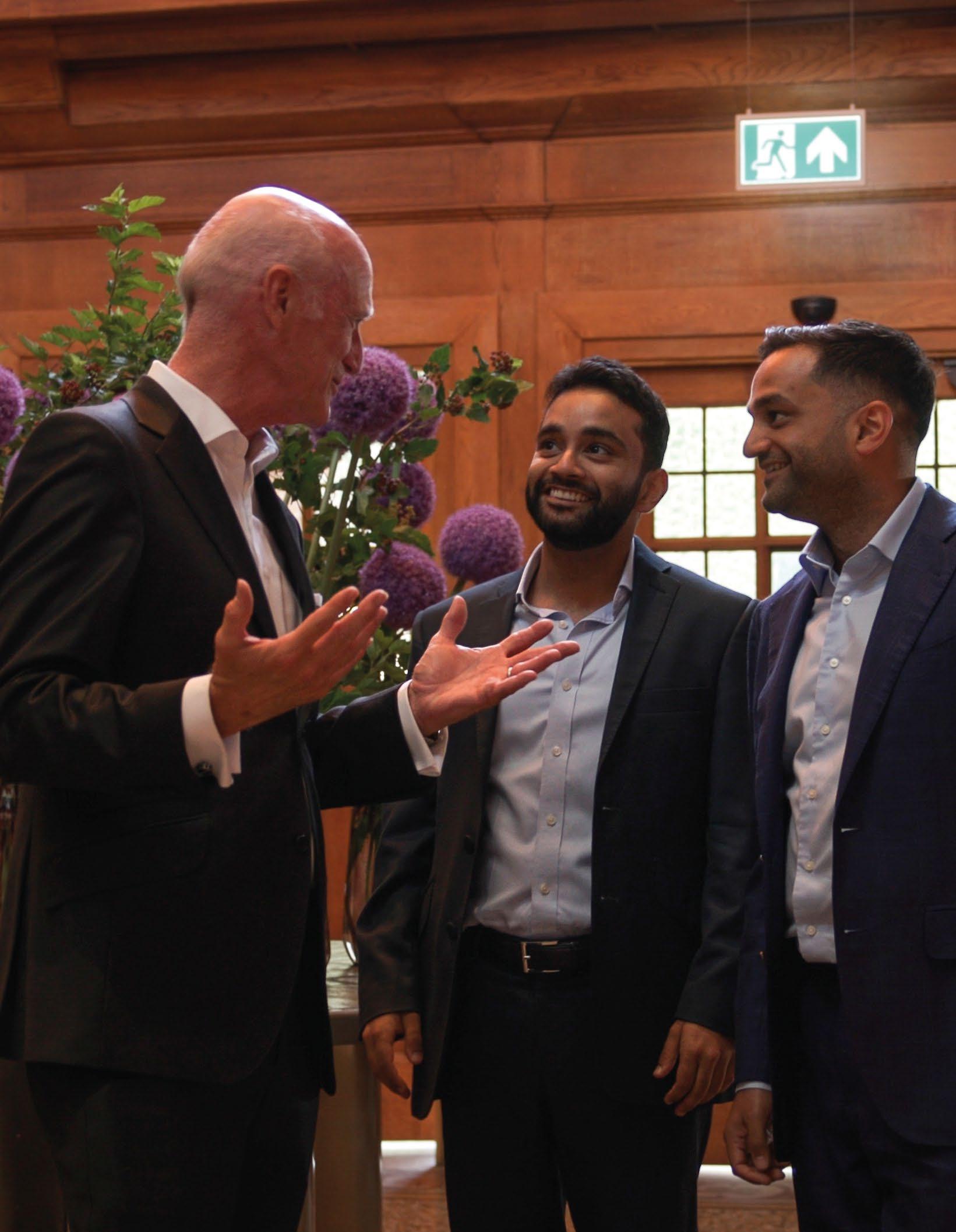
The Dixon General Manager Tony Owen chats with Dominus CEO Preet Ahluwalia and Principal Director Jay Ahluwalia in the hotel lobby. Mark Batch

Alice: Like a football club owner and manager, the two of you need to work well together to achieve success. What’s the key there?
Jay: The relationship between us is crucial. When you’re running a large business, you have to be able to trust the people who are managing its assets, and they need to be aligned in terms of their passion and beliefs about the organisation’s culture and values. I know Tony is leading his team based on those fundamentals.
Tony: Knowing I have the trust of Jay and the Dominus team is crucial. As general manager, I have a responsibility to look after the owners’ requirements – brand values, investment,
long-term strategies, and so on – as well as managing and supporting the hotel staff. I’m making decisions therefore for both parties, and while I won’t get those decisions right every time, I can make them knowing I have the respect and support of Jay and the rest of the board. That is invaluable.
Alice: You’re leading a huge multidisciplinary team, Tony. Given you can’t be an expert in every field, how do you ensure you’re getting the best from everyone?
Tony: I believe it’s important to create a really positive environment where reward and recognition are part of our culture. We’ve invested hard in our talented people, and we want
to keep them and help them to develop their careers. I also believe in leading from the front and I expect the same from my team. There are no invisible managers in this hotel.
Jay: I totally agree and it’s how I saw my father build his businesses. He was hands on, present and visible. Also, while it might sound simple, it’s important that we really love what we do, and that we go out into the market to find talented people who share our passion for delivering great guest service at the highest level.
Alice: How do you keep that passion alive, even through tough times, so that your
The building that houses The Dixon, London, dates from 1905, when it served as the Tower Bridge Magistrates Court. Paul Winch-Furness
I believe it’s important to create a really positive environment where reward and recognition are part of our culture.
team members really want to come to work each day?
Jay: I think, as Tony said, it’s important that it’s a positive, fun environment, where people feel recognised and rewarded. We have a great programme of staff events and when we receive complementary tickets to an event we’ll often share them among our team members, so they can see that the business is working for them.
Tony: It’s also about appreciating the pressures the team is under and doing things that can help them. It’s really important for them to know that we’ll always have their backs.
Alice: In hospitality, one mistake, shared on social media, can seriously damage your reputation. How do you cope with that pressure to maintain standards?
Tony: It’s tough, especially when events are out of your control, but it’s our job to preempt problems as best we can and ensure guests receive the best possible experience. For example, we knew there was a heatwave coming, and made sure that all the air conditioning was working well.
Jay: Empowerment is also key. When things don’t go quite to plan, you need people who can find solutions themselves in the
moment, and know they’ll be supported in doing that. If someone isn’t happy, I also try to speak to them personally, whenever possible, treating them with respect by really listening, and accepting what they’re saying. When you do that and respond in a positive way, you can often turn things around; they’re more likely to remember the great way they were treated than the issue itself.
Alice: Finally, you’re striving all the time to maintain standards and consistency. How do you do that while pushing the boundaries and ensuring you keep things fresh and relevant?
Tony: This industry is very fast-paced and it’s important that we keep up with trends. I find that the best ideas often come from the team. They almost always have the answers, so it’s important that I’m always listening to them and that we celebrate and reward their successful ideas.
Jay: I’d add that I think there are certain non-negotiables that we provide that will never change. Things like a great night’s sleep, service with a smile and good food. It’s when you have that solid foundation that you can innovate in order to raise the bar even higher.
About Jay and Tony
Jay Ahluwalia is a Principal Director at Dominus, a leading UK real estate investor, developer and asset manager. Tony Owen is General Manager of The Dixon, a Marriott Autograph Collection hotel and part of the Dominus portfolio.
In high-performing teams, leaders enable freedom of expression within well-defined boundaries.
2011.
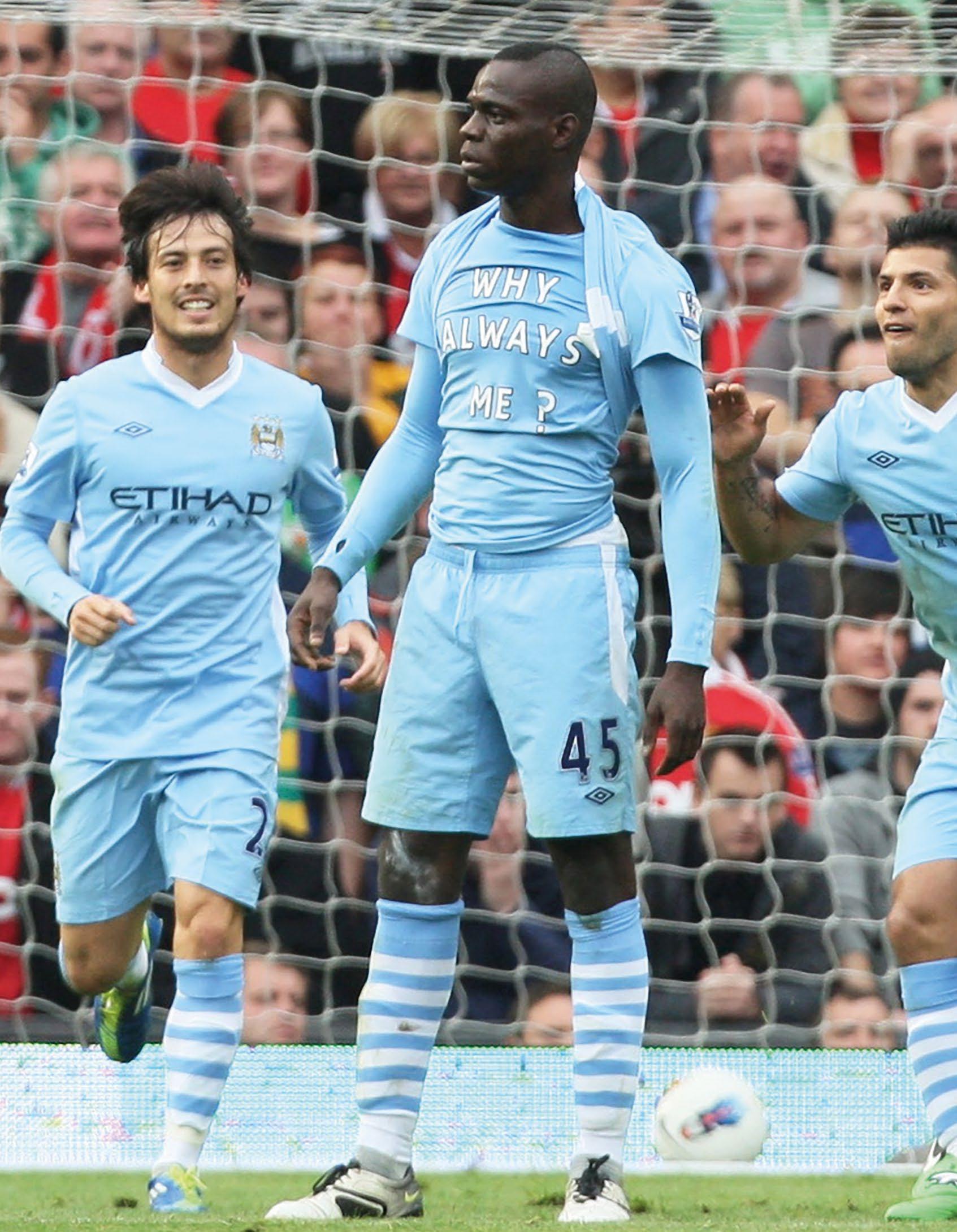

MANAGING THE MAVERICKS.
Leading Edge Performance examines how to make the most of exceptional but complex individuals, while protecting team culture and strategy.
Photography: Reuters // Action Images
Mario Balotelli, Manchester City, October
Reuters // Action Images
Depending on your perspective, characters like Eric Cantona, Mario Balotelli, Elon Musk, Michael Jordan and JK Rowling might be considered either mercurial mavericks or toxic individuals. All teams will, at some point, encounter people like this, enormously gifted but volatile. They can either light up the room or cast a shadow over it. The challenge for leaders when managing such individuals is to ensure they don’t undermine performance, morale and cohesion.
MAVERICK OR MENACE?
The line between being a maverick and being toxic is finer than many people think. Mavericks are instinctive, expressive and sometimes chaotic, but ultimately they are in service of performance. Toxic team members, by contrast, fracture trust. They divide the team, erode standards from the inside out and often recruit others to their mindset.
Through interviews with leaders in sport, business and
77 per cent of teams said their members failed to challenge poor behaviour, reinforcing the issue by staying silent.
the performing arts, research by Leading Edge Performance found that all toxic team environments have leadership blind spots, including an ‘us versus them’ culture or lack of clarity. 77 per cent of teams said their members failed to challenge poor behaviour, reinforcing the issue by staying silent. Meanwhile, in every breakdown examined it was found there was cultural contagion, where people are recruited based on alignment with toxic views.
The message is clear: toxicity thrives not just because of individuals, but because the environment allows it to thrive. That is a leadership challenge.
SCIENCE-BACKED STRATEGIES
Two academic models in particular offer leaders a practical framework for handling this complexity. Fransen’s Athlete Leadership Model challenges the assumption that leadership comes from the manager or captain alone. Fransen identifies four forms
of peer leadership: task, motivational, social and external. In elite squads, where influence flows informally, this model can be a gamechanger because distributing leadership roles, particularly among cultural icons, dilutes or redirects the influence of a volatile team member. A maverick, given a sense of responsibility, often rises to it. A toxic character, when confronted with authentic peer accountability, often steps back.
Peter Frost (2003), meanwhile, coined the term ‘toxic handlers’ to denote individuals who absorb emotional distress to protect others. In football, this is often a senior player, assistant coach or manager, but as Leading Edge Performance’s research shows, emotional buffering is not a sustainable strategy. Instead of shielding the squad from disruption, leaders must build structures that make it hard for toxicity to survive. That means transparency, consistency and cultural clarity.
As Bowling Green Falcons head coach, Scot Loeffler had the respect of players such as Connor Bazalak. Texas, 2024. USA TODAY Sports via Reuters

BALANCING FREEDOM AND STRUCTURE
Managing mavericks comes down to leadership clarity. Leaders must create a culture where freedom exists within boundaries. Here’s how:
1. SET CULTURAL NONNEGOTIABLES EARLY
Mavericks thrive in systems that respect their individuality, but only when they understand that the team’s values are not optional. Define nonnegotiables (e.g., effort, respect, accountability) and hold everyone to them, equally. A lack of clarity creates a vacuum that toxicity quickly fills. Use preseason to co-create values with your team, because when mavericks are part of defining the culture, they’re more likely to align with it.
2. ADAPT COMMUNICATION, NOT EXPECTATIONS
Some mavericks struggle with authority, traditional feedback and routine. They might need autonomy, one-to-one coaching
or performance data framed in different ways. As a leader, you might therefore look to tailor your messaging, or employ personality profiling tools (like Spotlight, Insights or Lumina) to understand their motivational drivers. Speak their language.
3. SURROUND THEM WITH CULTURAL ANCHORS
Our research shows that cultural icons and respected informal leaders are critical circuit breakers. Every team has informal leaders, those people who quietly set the tone. Pairing a volatile talent with a calm, respected peer or senior pro can diffuse their excesses and reinforce standards nonconfrontationally.
4. USE ROLE CLARITY AND PURPOSE AS ANCHORS
Mavericks often derail when they feel undervalued or misunderstood. Give them crystal-clear roles and connect their contributions to the team’s overall strategy and vision.
When Kennedy visited NASA in 1962 and asked the janitor what he did, he replied famously that he was, ‘helping to put a shuttle on the moon’.
5. ACT FAST WHEN THE LINE IS CROSSED
Our research warns of delayed decisions; the longer toxicity goes unchecked, the harder it is to reverse. If a maverick tips into consistent disruption it starts to affect cohesion, morale and retention, so it’s important to act, transparently and decisively. Don’t lose good people by protecting one unpredictable one.
Ultimately, managing mavericks isn’t about control, it’s about creating a system where exceptional talent amplifies team performance and collective identity, not ego. As a leader, your legacy won’t be trophies alone, it will be the culture you created and the standards you upheld. Let the mavericks shine, but make sure the team stays in the light.
A 5-PART FRAMEWORK
If you’re leading a team with one or more maverick (or potentially toxic) members, use this checklist to guide your strategy:
DIAGNOSE
Are they a maverick, toxic or just misunderstood? Observe closely and listen.
DEFINE
Set crystal-clear non-negotiables and role expectations from day one.
SUPPORT
Adapt your communication and mentoring structure to fit their needs without compromising the group.
SHIELD AND ANCHOR
Use senior pros or coaching staff as stabilisers around high-maintenance personalities.
DECIDE
Know your line. If the individual is costing the team more than they contribute, act in service of the group.
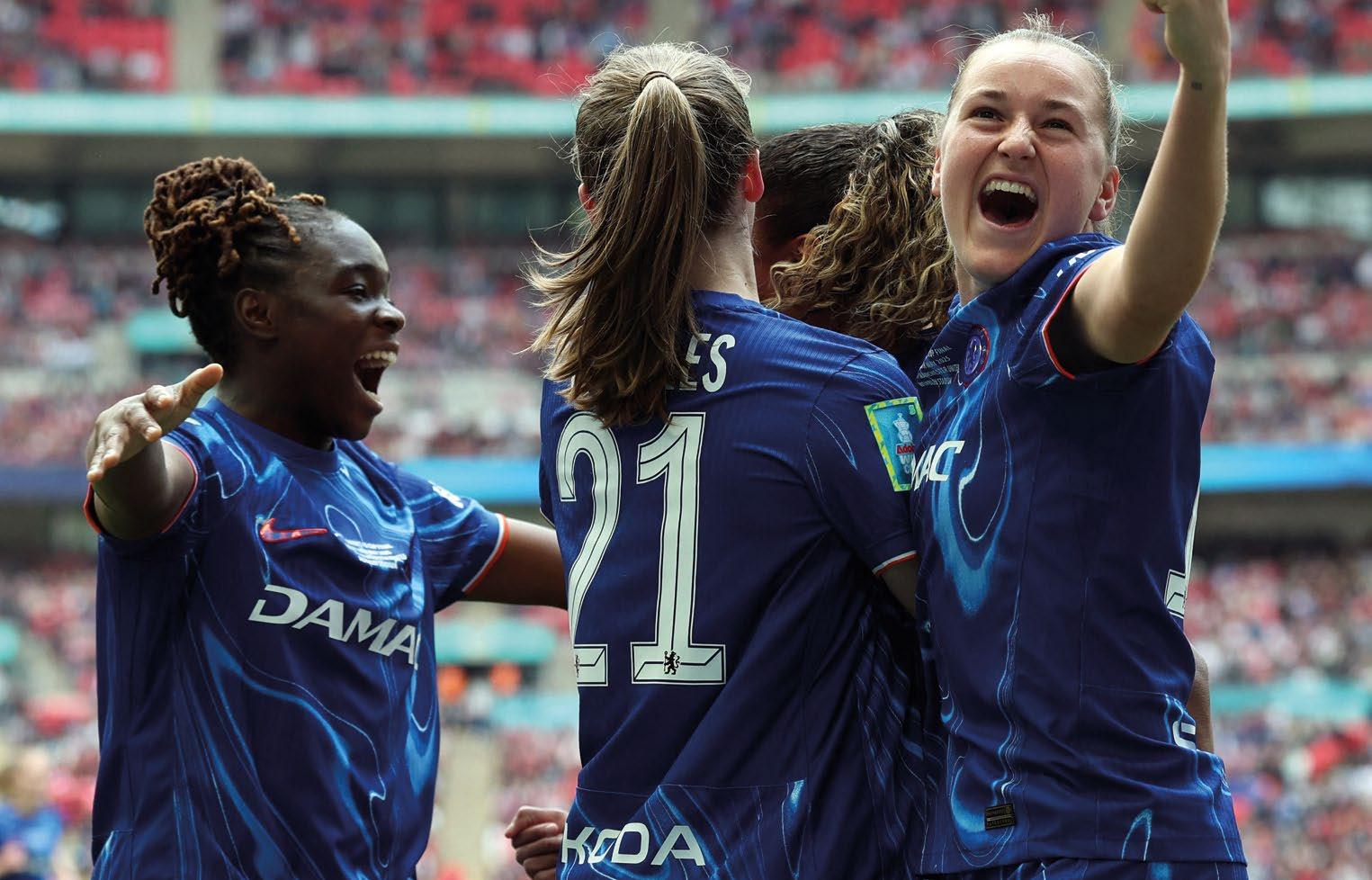
About Leading Edge Performance
Leading Edge Performance is the LMA’s partner in the LEAD programme, supporting the development and growth of leadership skills for managers, in line with our vision of unleashing human performance to change the game.
Leading Edge Performance routinely deploys unique approaches to leadership and team development (Human Intelligence for Performance), gathering and analysing the essential intangibles that create unparalleled insights into behaviour, motivation and the things that really matter in an environment.
Through interviewing, running forums, analysing and processing with experts in performance who are deeply immersed in an environment, we support organisations all over the world to capture vital insights, equipping leaders to create meaningful impact and have the right conversations in service of high performance.
This approach has been a key part of Leading Edge Performance’s work with the LMA, identifying themes and key context to inform the building blocks of the LEAD programme, which looks to change the game for managers in their leadership development.
Contact Nick Levett, Lead Team Coach, on nick@leading-edgeperformance.com
Visit www.leading-edgeperformance.com or find us on LinkedIn to subscribe to our LinkedIn newsletter.
Great teams win and lose together, with every member working for the good of the group rather than for personal gain. Women’s FA Cup Final champions Chelsea, May 2025.
Reuters // Action Images
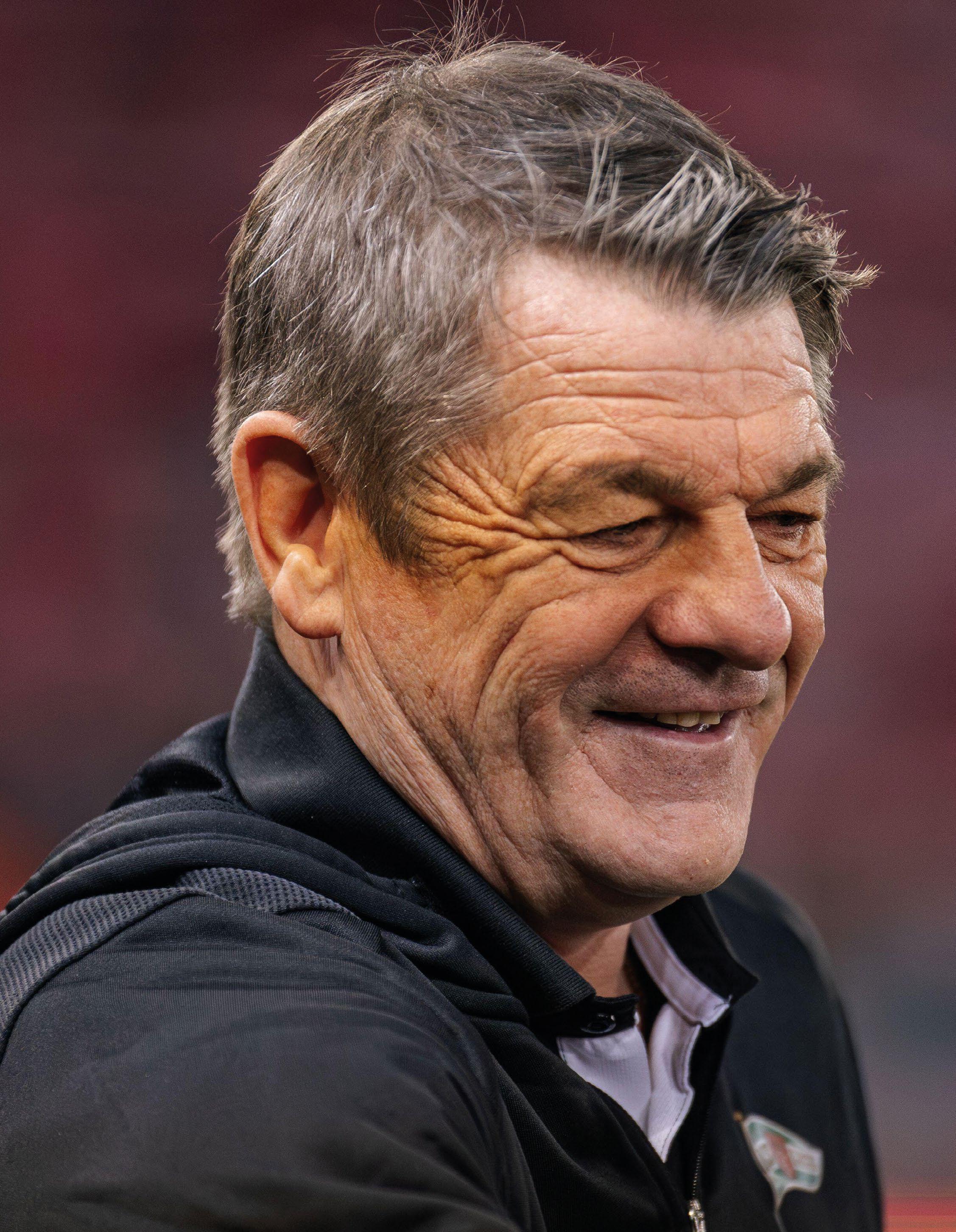


I LEARNED FROM THE BEST. JOHN CARVER
Manager of Polish Ekstraklasa club Lechia Gdańsk since November 2024, John Carver has gained a wealth of experience in a variety of roles, at national level and in the Premier League, and under a series of exceptional managers.
Interview: Marc Williams
Photography: Alamy // Reuters // Action Images
BIG
SETBACKS CAN LEAD TO NEW
OPPORTUNITIES.
When I was 17 and playing for the England youth team under Graeme Taylor, I suffered a major injury, which eventually led to my retirement from the game at 20. It was really tough, especially as I had no one to talk to. There were no club psychologists back then, and I couldn’t face telling my parents that I was out of the game and coming home. Football had been my life since the age of five or six, and playing was all I’d ever wanted to do, but as that was no longer an option, I thought that the next best thing would be to coach. I’d always watched games with a critical, analytical eye, so it was a natural move for me, and I was determined to be the best I could be. Thanks initially to a government scheme and, later, a fantastic mentor called Barney Jones, I developed as a coach and eventually got my B Licence at the young age of 26. So, while it was a huge disappointment to have to retire early as a player, I can look back at it as a blessing in disguise.
I’M FORTUNATE TO HAVE LEARNED FROM SO MANY TOP MANAGERS.
I’ve worked with Kevin Keegan, Kenny Dalglish, Steve Clark, Kevin Blackwell, Peter Reid, among others, and learned something valuable from each
of them, and their different styles of leadership. However, it was Sir Bobby Robson who influenced me the most as a person, as well as a coach.
I was working as director of Newcastle United’s Centre of Excellence when he made me assistant manager, and it proved to be an important step in my development. In particular, I learned from Bobby how to deal with people, and would watch how he adapted his approach from one person to the next, shifting from directive to empathetic as the situation demanded.
THE ASSISTANT MANAGER’S JOB IS HUGE AND OFTEN UNDERAPPRECIATED.
Whether at club or international level, as I had with Steve Clarke at Scotland, you’re a vital bridge between the players and manager, a sounding board. My approach has always been to give my honest opinion to the manager I’m working with, but then back their decision all the way. This honesty and respect as an assistant manager has led to the building of some incredible partnerships over the years. It was perhaps natural, though, that having learned from so many top managers, I would want to step into the number one role myself one day. I have always wanted to prove my worth.

// Action Images
While it was a huge disappointment to have to retire early as a player, I can look back at it as a blessing in disguise.
John Carver with Scotland manager Steve Clarke during the side’s friendly against Northern Ireland at Hampden Park, March 2024. Reuters
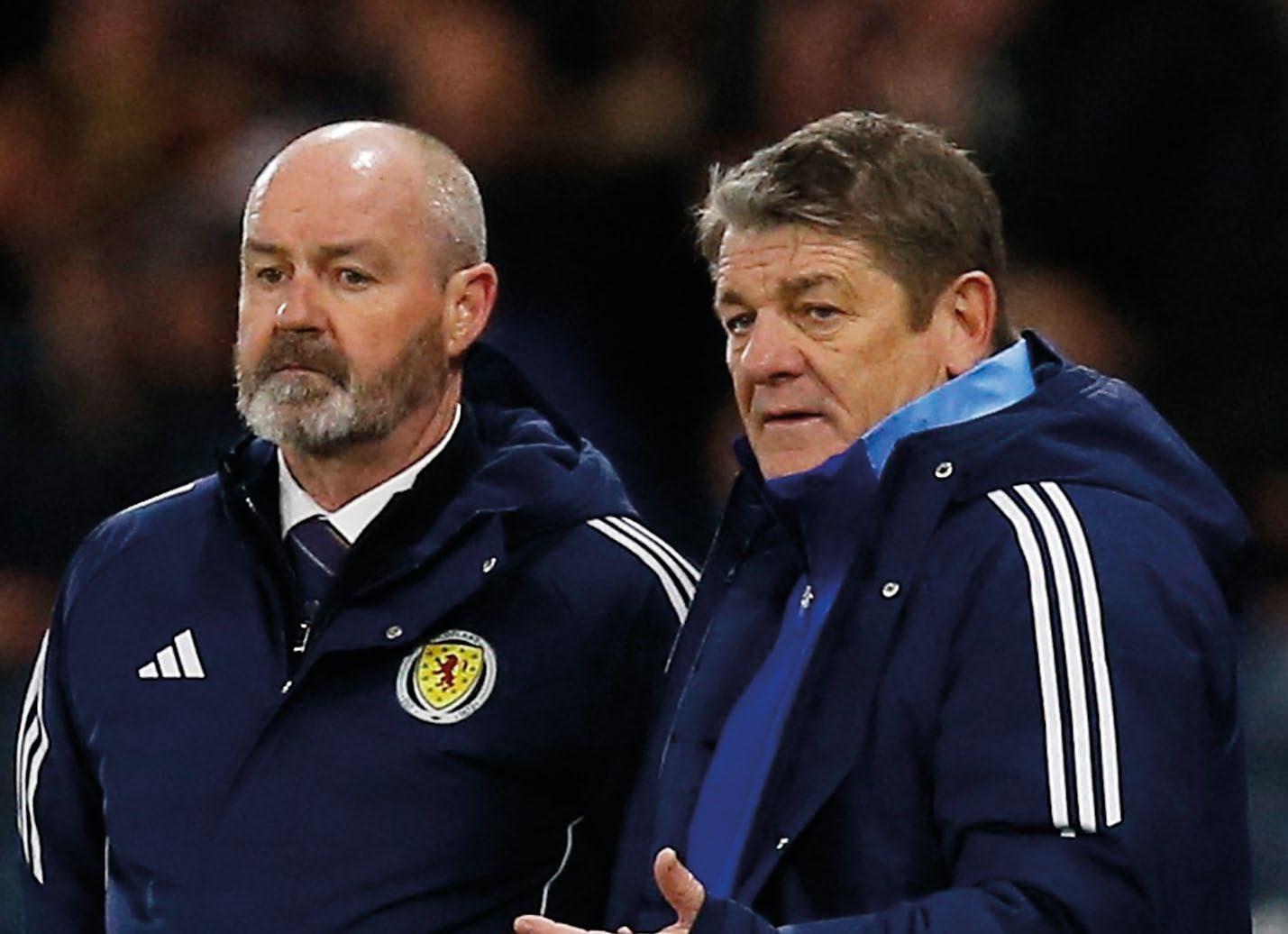
LEAVING THE SCOTTISH NATIONAL TEAM WAS TOUGH.
I was appointed as Steve Clark’s assistant in 2000 and we went on to manage 60 matches together. It was quite an emotional decision to take on the manager’s role at Polish Ekstraklasa club Lechia Gdańsk in November 2024, continuing also to coach Scotland until March 2025. Steve knew, though, that I was keen to take on a manager’s role; it was just a question of finding the right opportunity. The strength of our friendship, and
the level of respect and honesty between us made that conversation easier. I left for Lechia with a desire to lead and face new challenges, building success on my terms. While it was difficult balancing both roles at the same time, I was able to draw on my breadth of experience, and I had full confidence in my abilities, adaptability and decision making.
I ARRIVED WITH LECHIA IN THE BOTTOM THREE. They’d achieved 11 points from
17 games and were under a transfer embargo. Players and staff hadn’t been paid and the club was struggling to settle its bills. It was therefore a massive risk taking on the role and relentlessly hard work, but I saw the potential in the side and was confident I could make a difference. The whole place was understandably demoralised, so my focus initially was not tactics, but man management. I had to try to rally everyone round, unite them and instil a sense of trust, inclusion and shared purpose. They really valued and respected
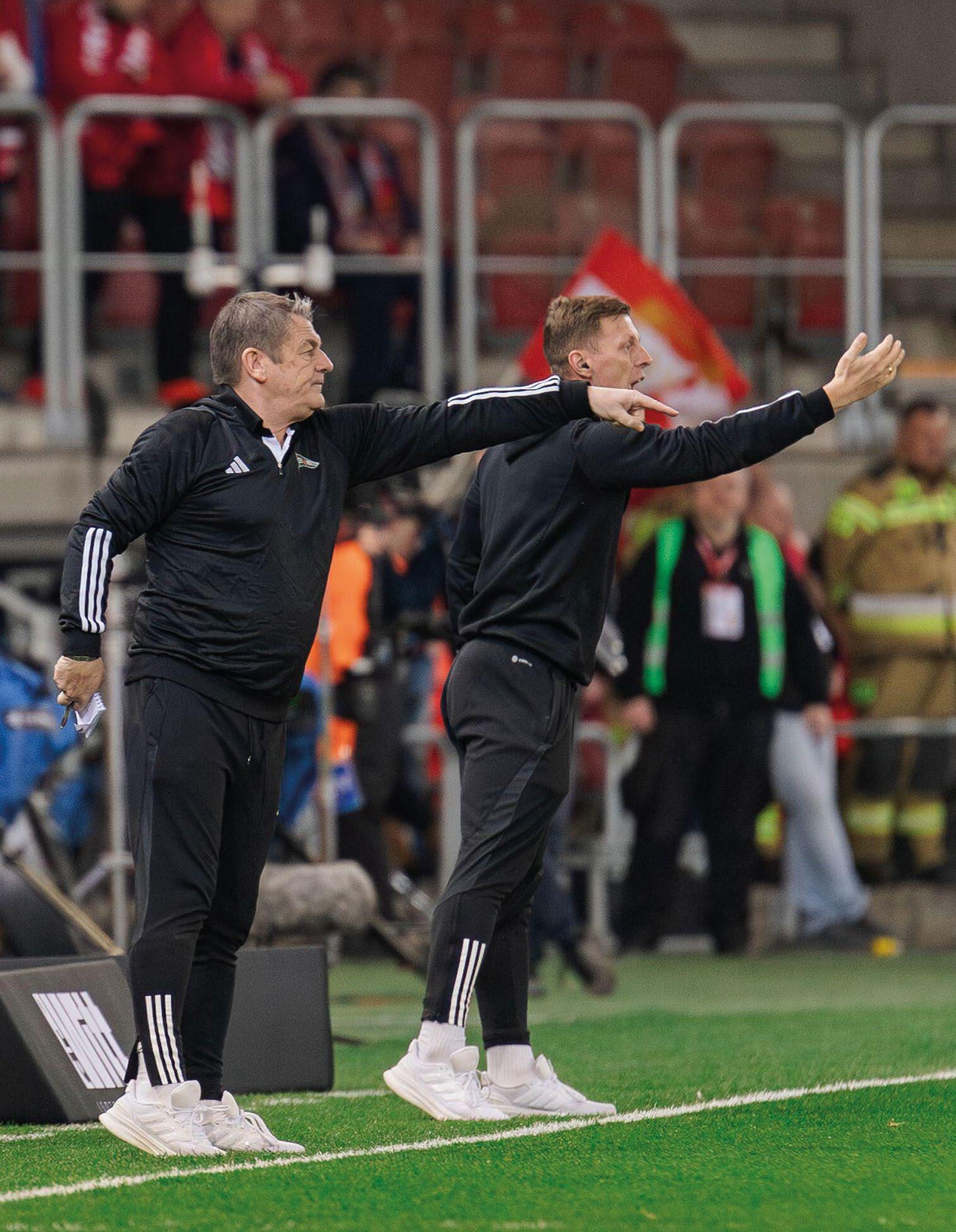
Manager John Carver watches from the sidelines as his Lechia Gdańsk side takes on Widzew Lodz in the Ekstraklasa. Alamy
Reuters // Action Images
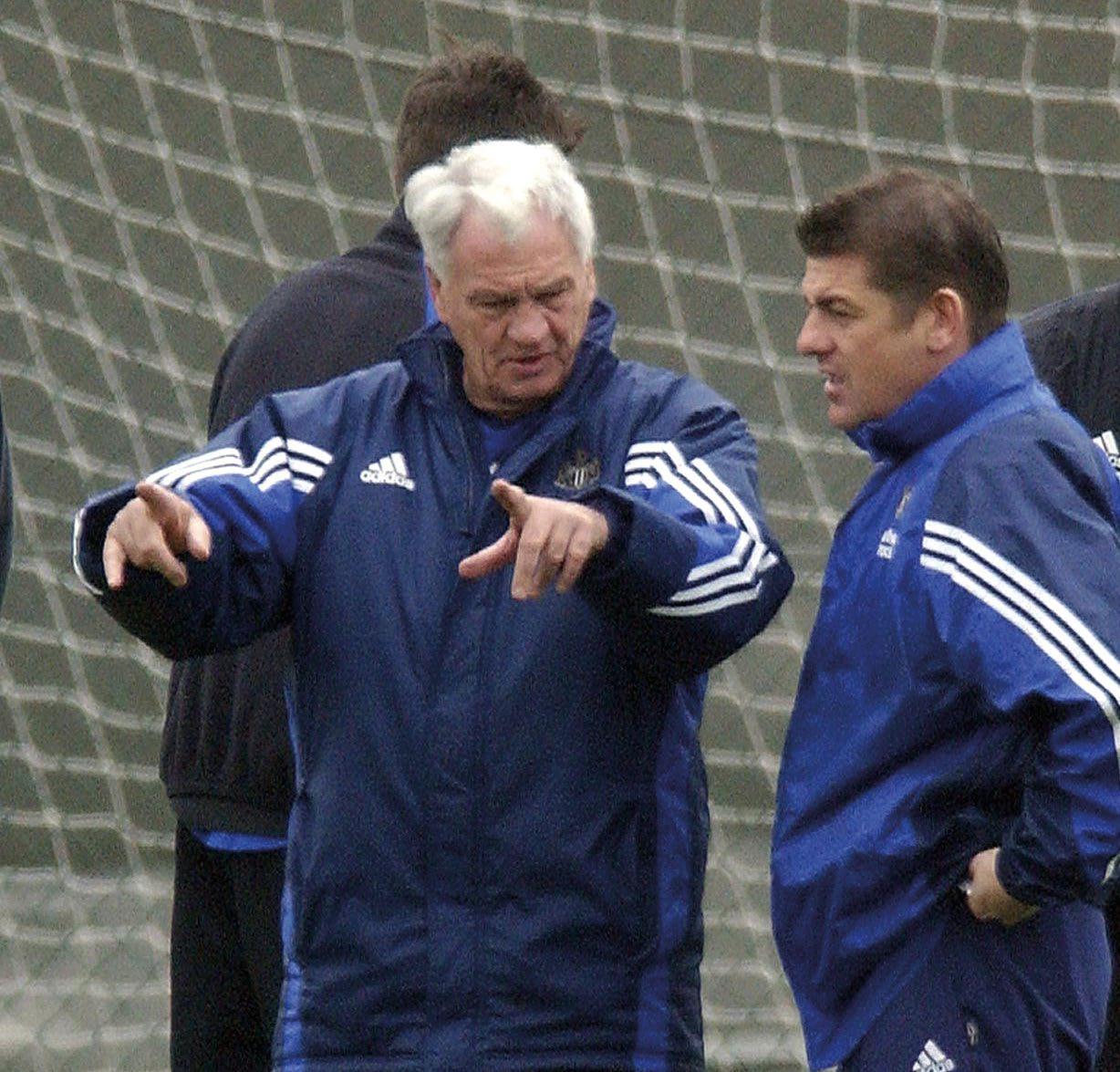
I believe that every staff member, from the kitman to the physio, has an important impact on a club’s success.
my experience at national level and with the Premier League, and the calibre of managers I’d worked with, and they were in desperate need of knowledge, support and structure. I was able to come in with fresh ideas on things like tactics and style, responsibility and collective standards.
MOST IMPORTANTLY, I EMPOWERED EVERYONE.
I believe that every staff member, from the kitman to the physio, has an important impact on a club’s success. After all, they often have more contact with the players than you as the manager, so the connection and buy-in that you establish with them
is essential. It creates positive ripples throughout the club. At Lechia, everyone bought into what we were doing, not only the club itself but the whole city of Gdańsk; even local government and business people got involved. We successfully survived relegation by six points, despite the adversity we faced, and having the youngest squad in the league. After we’d secured survival, I brought all the players and staff together and made it clear just how important they all were to that success. I was nominated for the Ekstraklasa Coach of the Season award, after only five months in the job, which was an incredible feeling. However, I didn’t do it on my own; we all did it together.
Newcastle United manager Sir Bobby Robson makes his point to assistant John Carver, April 2004.
Proud to Support
T. Rowe Price believes in the power of deep partnerships. By sharing a vision, and combining core strengths, we can achieve better outcomes together than we can alone. We are proud to work with the League Managers Association and look forward to our continued partnership.
T. Rowe Price is not affiliated with any of the companies mentioned.
©2025 T. Rowe Price. All Rights Reserved. T. ROWE PRICE, INVEST WITH CONFIDENCE, and the Bighorn Sheep design are, collectively and/or apart, trademarks of T. Rowe Price Group, Inc.
LMA NEWS.

LMA EVENTS& CORPORATEACTIVITY.
Guinness
> ANDY COLE // DENIS IRWIN // NATALIE SAWYER
LMA Ambassadors Andy Cole and Denis Irwin supported Guinness with various fan activities at the Guinness Storehouse in Dublin. The event, hosted by Natalie Sawyer, was in celebration of the 25th anniversary of the Storehouse and included a pre-match Q&A, Manchester United game watch, and post-match analysis from Irwin and Cole.
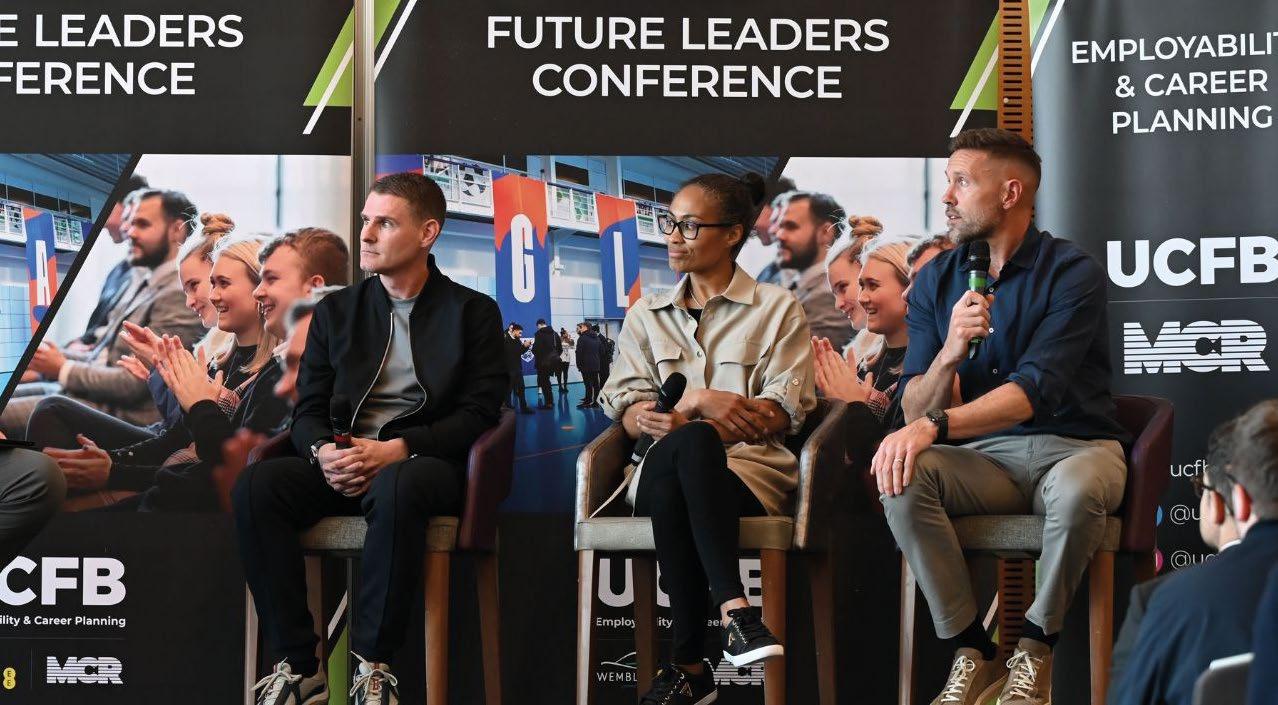
UCFB
>
MATTHEW UPSON // ANTHONY BARRY // RACHEL YANKEY
LMA members Anthony Barry and Rachel Yankey OBE, and Ambassador Matthew Upson joined UCFB for their Park Future Leaders Conference at St. George’s Park. They participated in a live Q&A with students, where they discussed their involvement with England teams, and shared advice on working in the football industry.
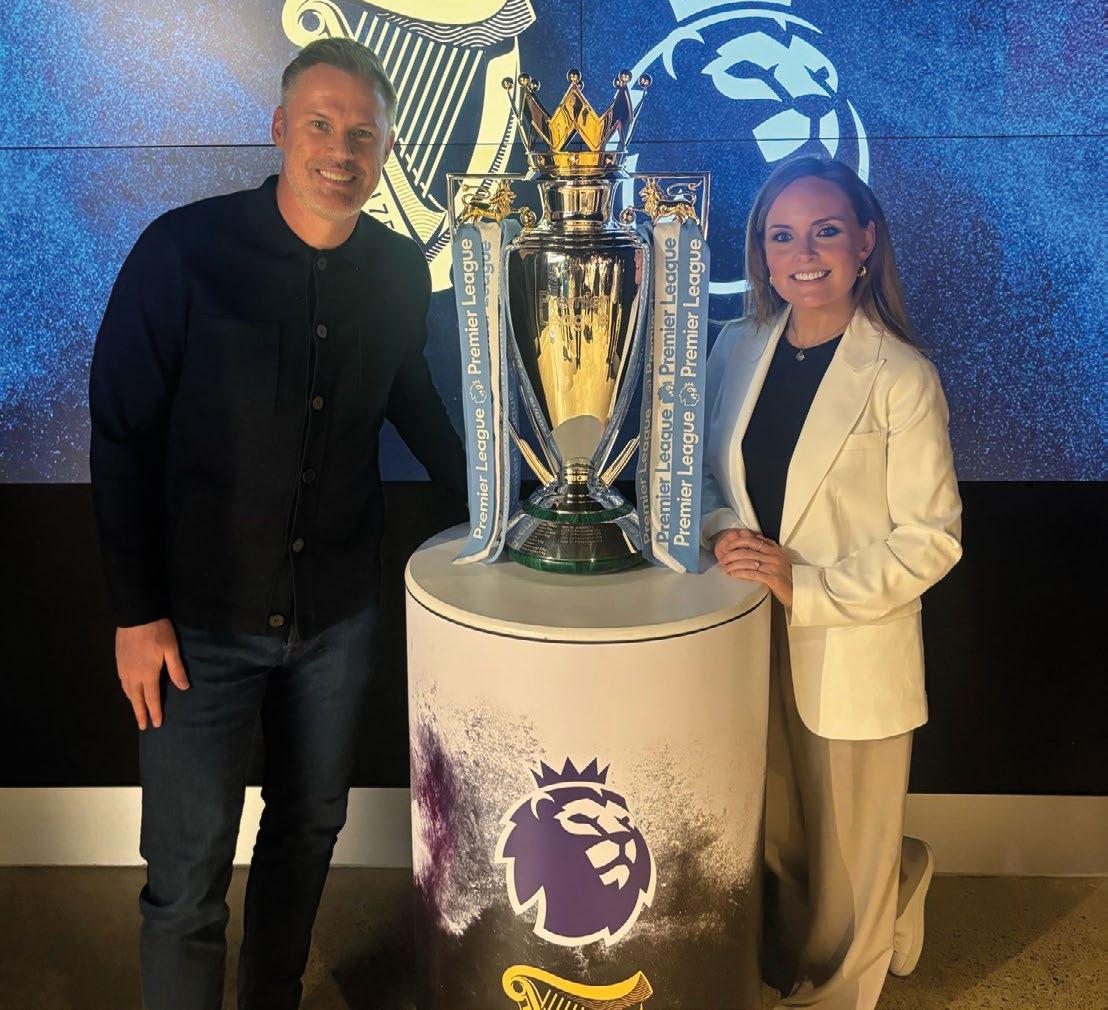
Guinness
> KELLY SOMERS
LMA Ambassador and host Kelly Somers supported Guinness with the inaugural Diageo Live event at the Co-op Live arena, Manchester. Somers interviewed analyst, pundit and former player Jamie Carragher about his career, rounding off a day of activities with Diageo’s UK customers.

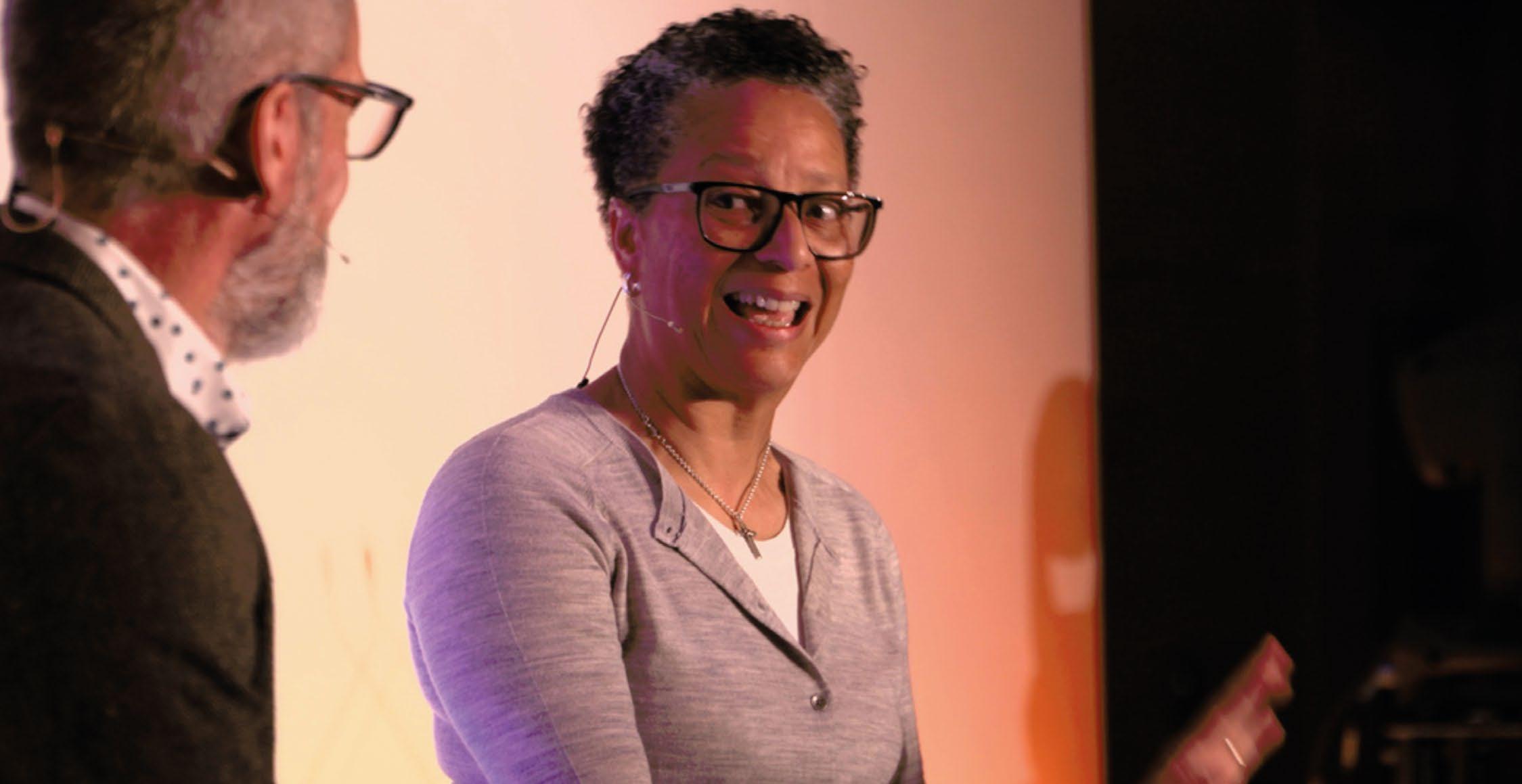
CIEHF > HOPE POWELL
LMA Committee member Hope Powell CBE supported the Chartered Institute of Ergonomics and Human Factors (CIEHF) with its annual conference at the Hilton St. George’s Park. She discussed the challenges and intricacies of creating success with teams in the professional football environment, drawing on her past experience as a player, manager and technical director.
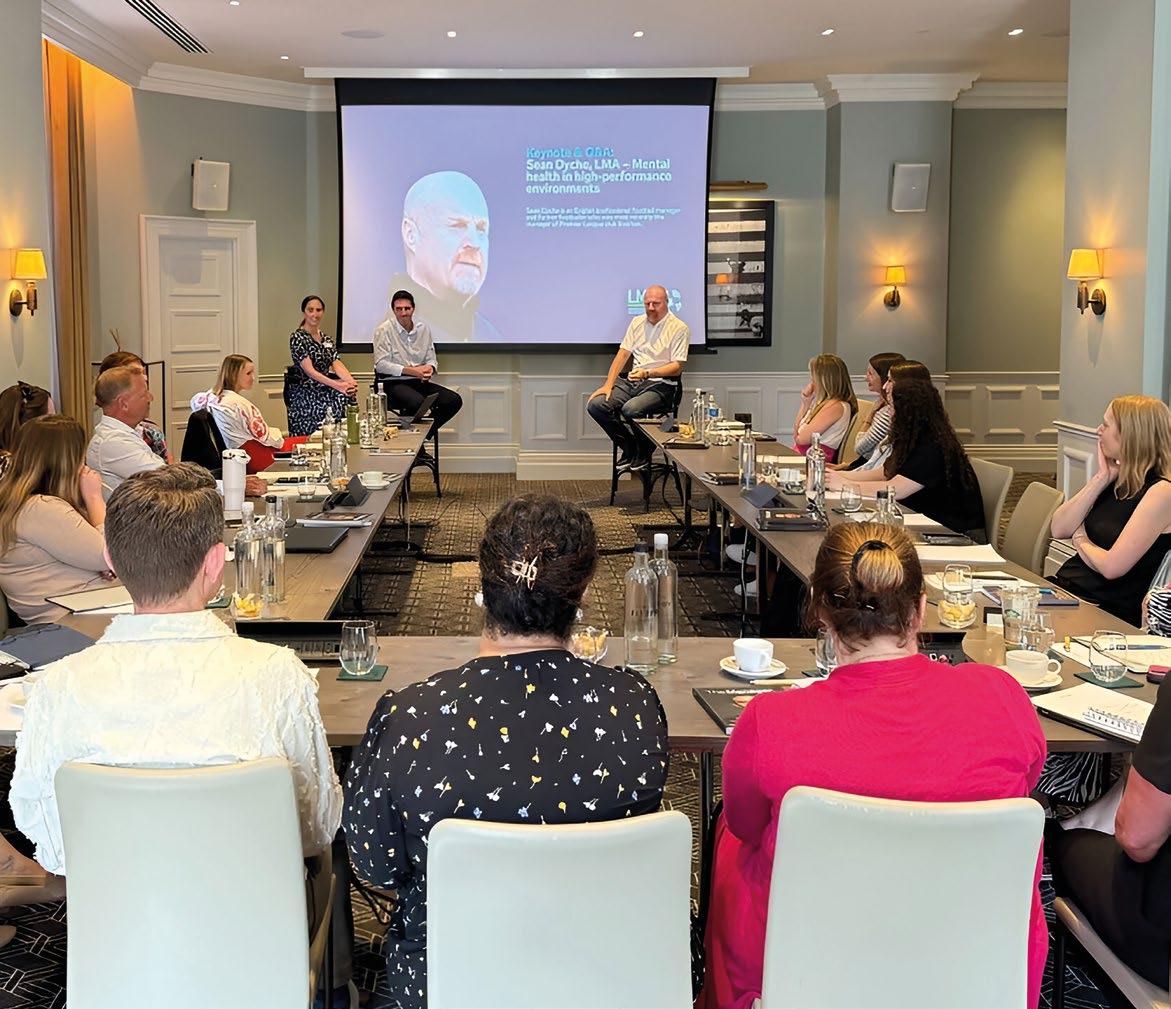
HCA Healthcare UK > SEAN DYCHE
LMA member Sean Dyche provided an insightful Q&A around mental health and wellbeing with the Corporate Health Team at HCA Healthcare UK. He discussed the challenges he faced during his playing and management career, reflecting on the importance of resilience and harnessing pressure.
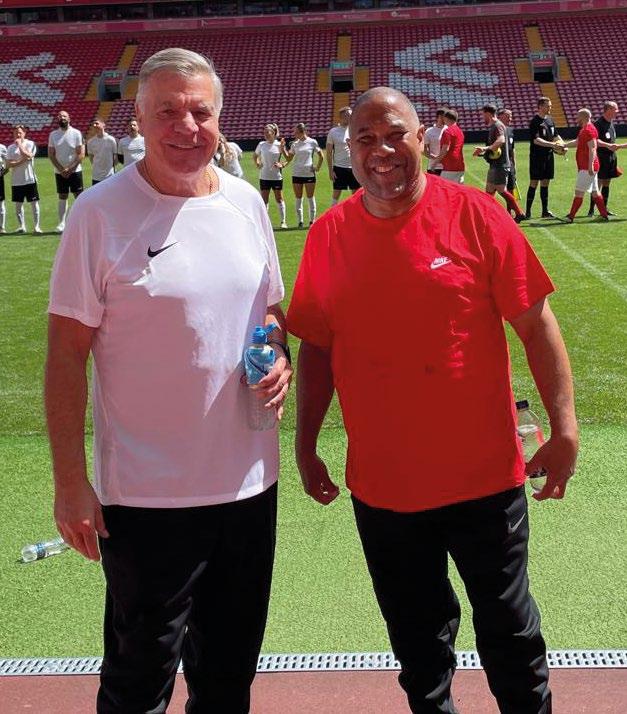
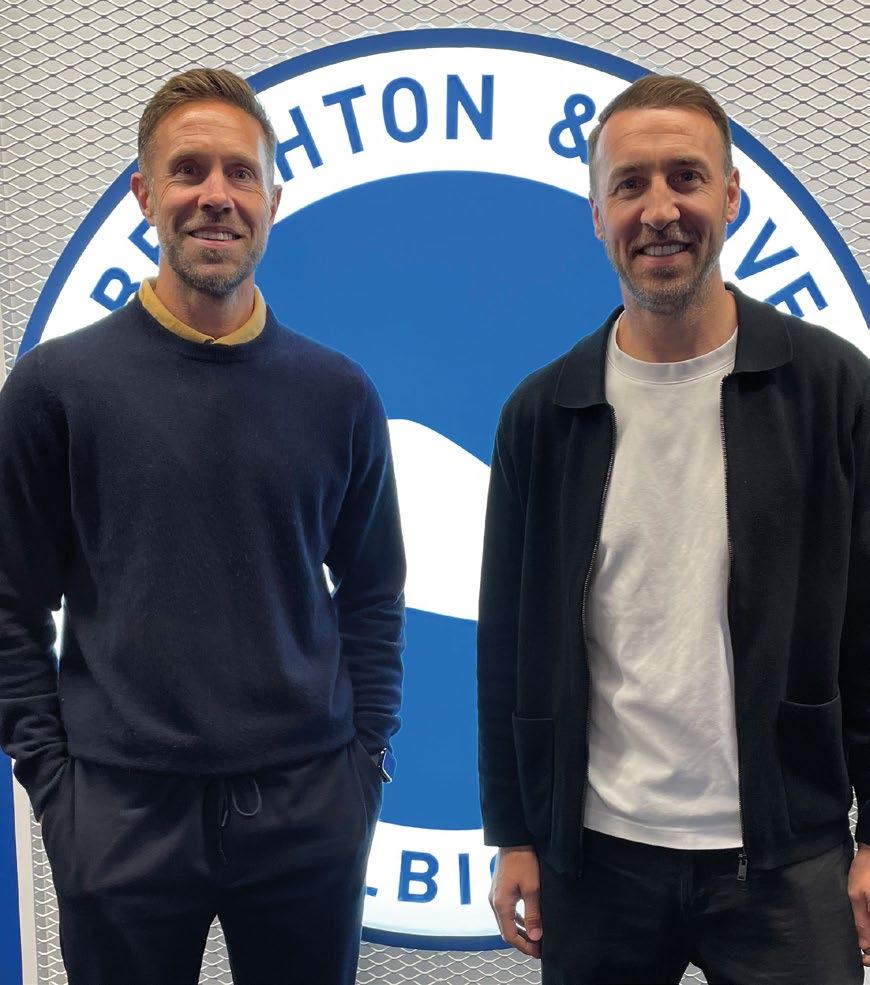
Nike
> JOHN BARNES // SAM ALLARDYCE // MATTHEW UPSON // GLENN MURRAY
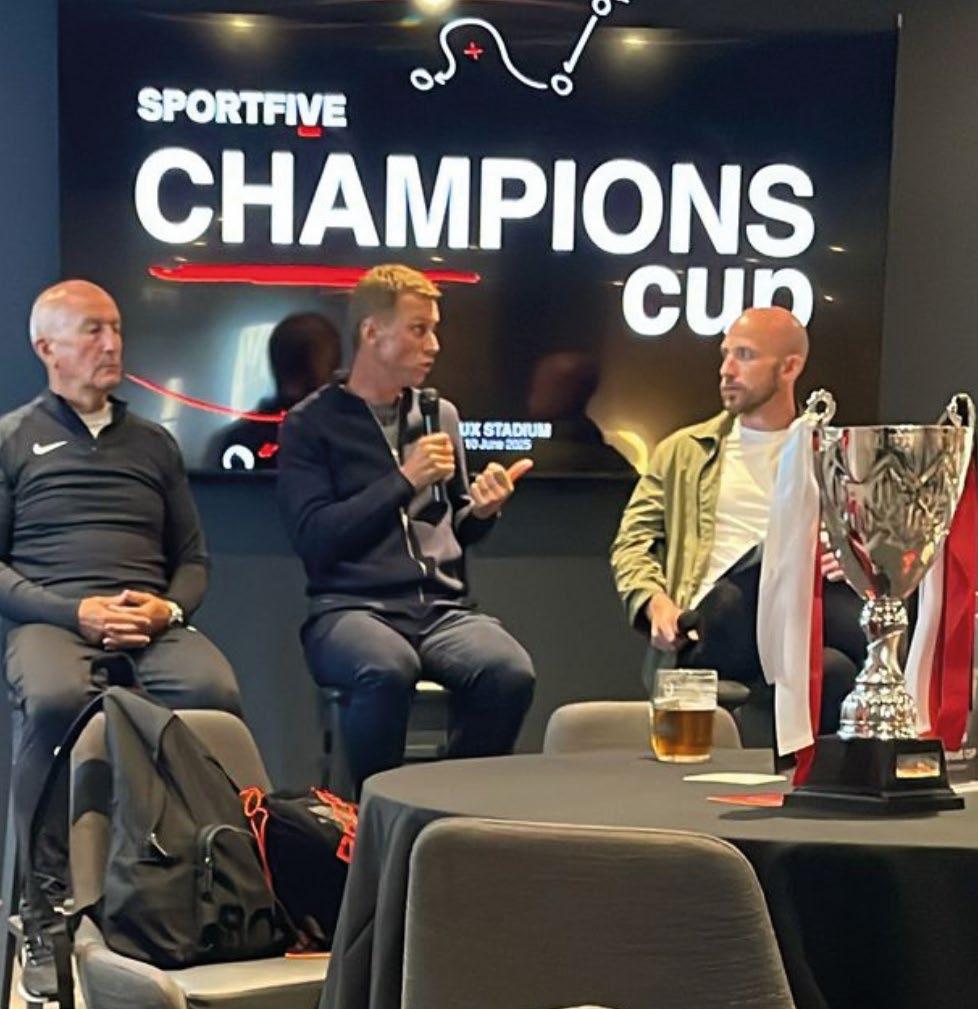
Sportfive
> TONY PULIS // STEVE SIDWELL
Six LMA members and Ambassadors supported Nike and Sportfive with Play on Pitch days at Anfield, the American Express Stadium, and the Molineux. LMA members Tony Pulis and Sam Allardyce joined LMA Ambassadors Steve Sidwell, Glenn Murray, Matthew Upson and John Barnes MBE to manage teams of employees and customers.
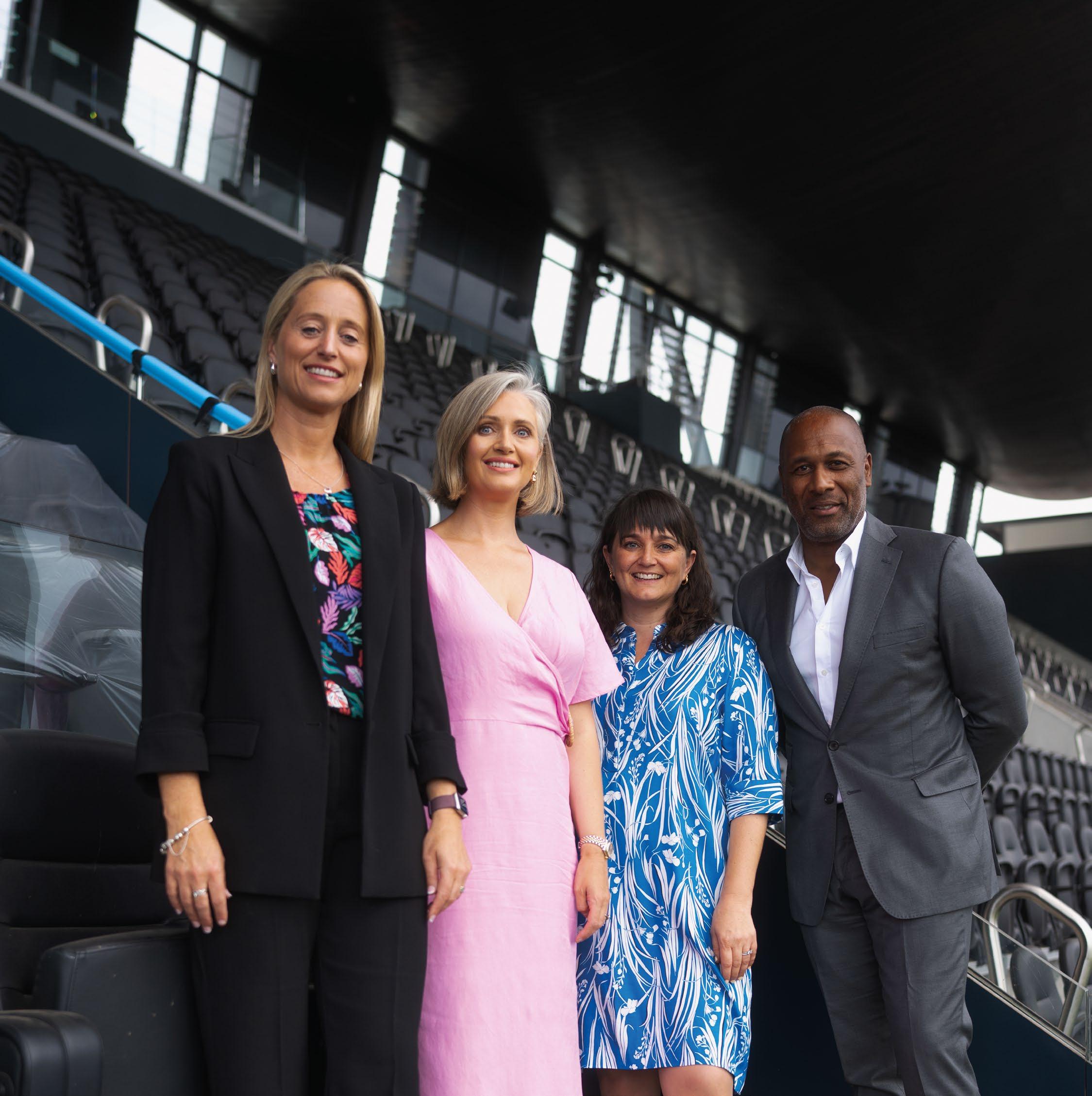
Indeed
>JESS THIRLBY // LES FERDINAND // KATIE MOBED // HAYLEY MCQUEEN
The LMA delivered an insight into Elite Team Development at Fulham Pier for Indeed as part of a Series of Leadership and High Performance events. Katie Mobed delivered a masterclass on the psychology of teams before guests enjoyed a three-course fine-dining menu. They were then treated to insights from Les Ferdinand MBE and Jess Thirlby, Head Coach of England Netball.
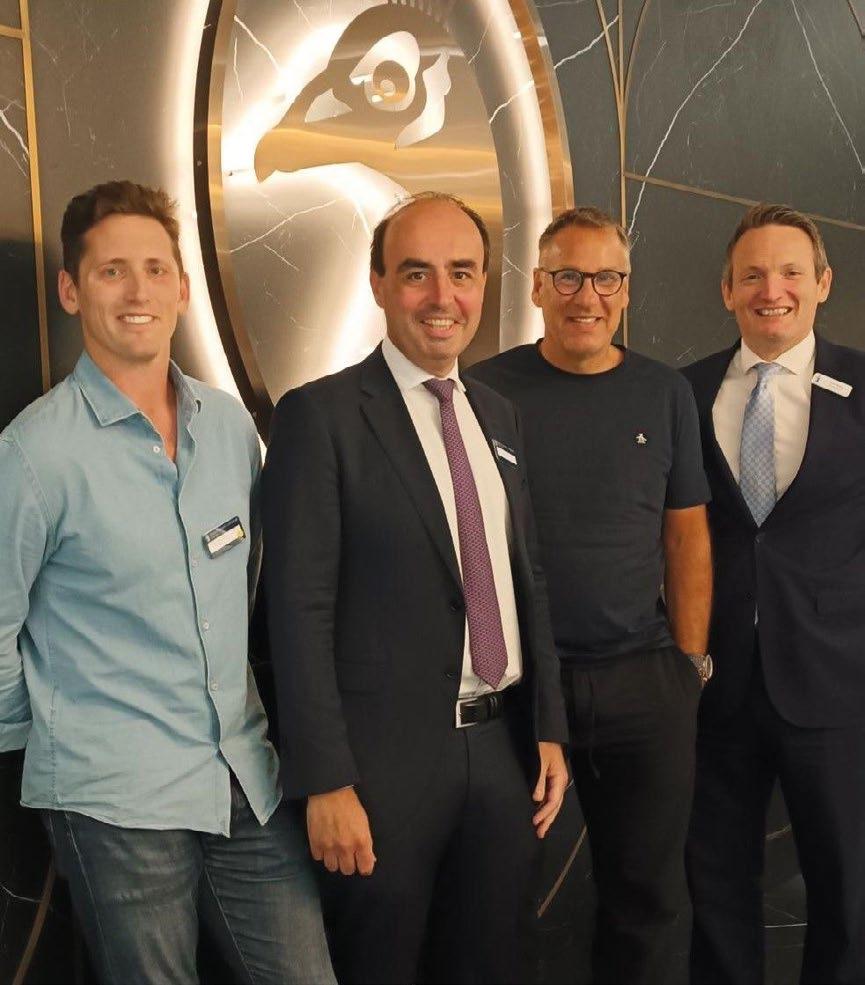
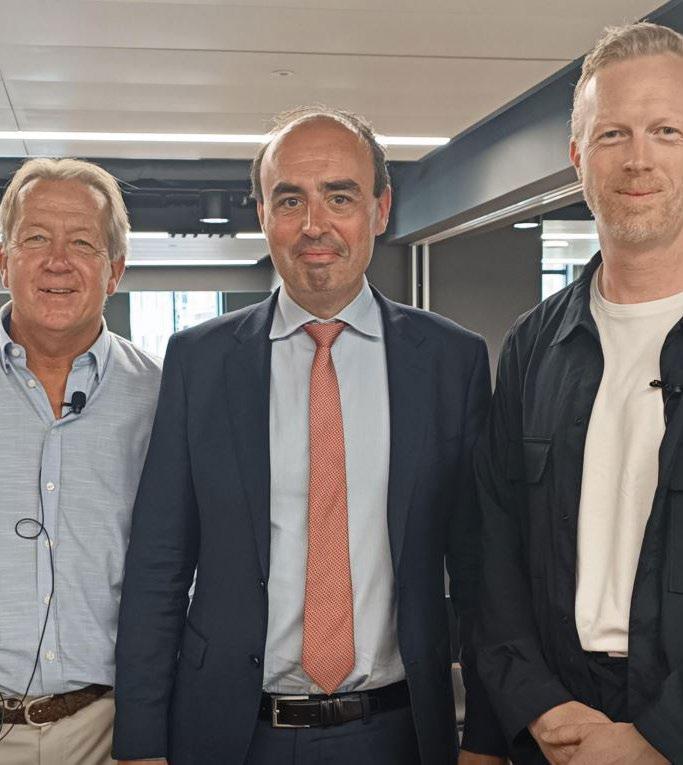
Arbuthnot Latham
>
PAUL MERSON // ALAN CURBISHLEY // OLI PATRICK
LMA member Alan Curbishley, Ambassador Paul Merson and leading expert in human performance
Oli Patrick attended World Wellbeing Week talks at Arbuthnot Latham. Merson discussed the struggles and pressure he has experienced throughout his career, advocating for the power of team culture and conversation to help others. Patrick and Curbishley also talked about the importance of feeling energised and challenging how we look at wellbeing.
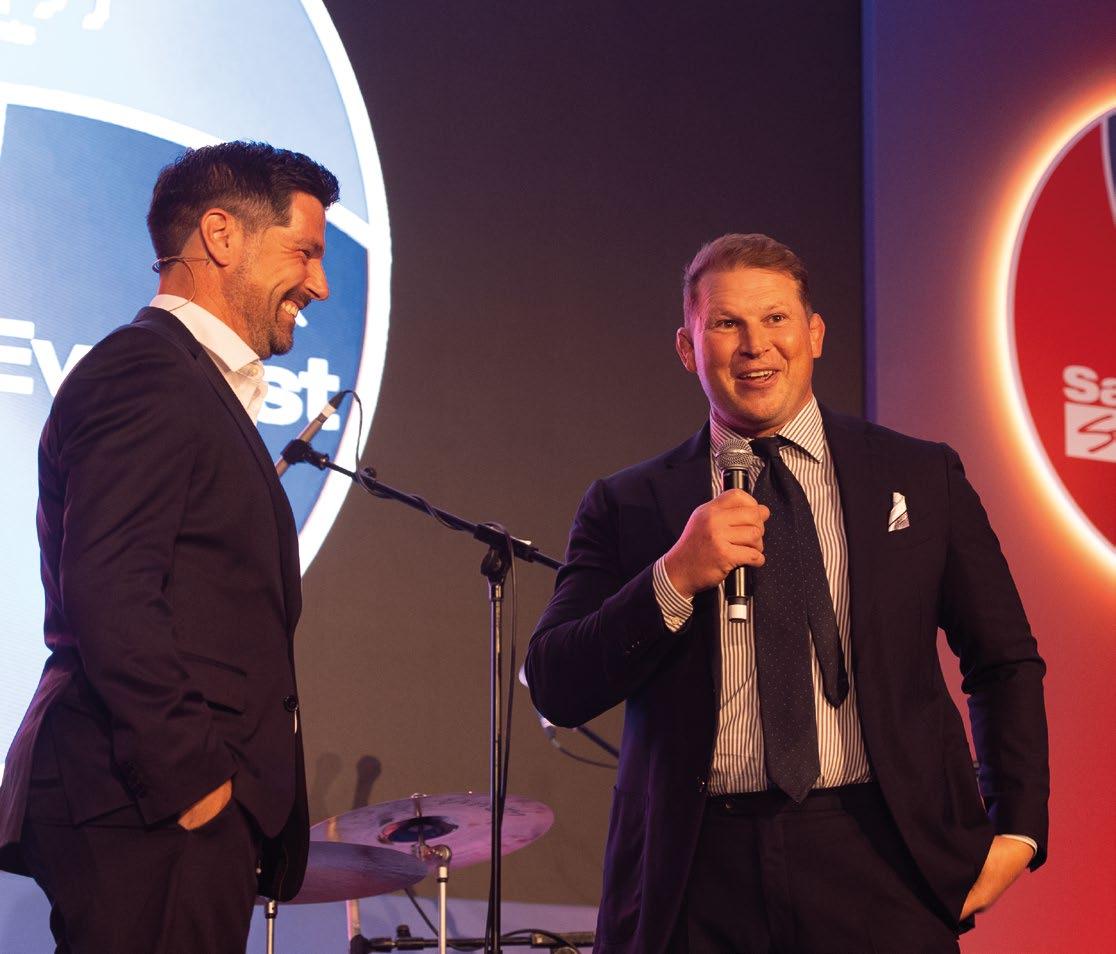
Anglian Home Improvements
> DYLAN HARTLEY
LMA Ambassador Dylan Hartley attended the Anglian Home Improvements Champions Conference at the JW Marriott Grosvenor House, London. The LMA also provided event organisation for the Power of 3 conference, as well as the evening’s awards presentation. Hartley joined host Craig Doyle for a Q&A as part of the proceedings.
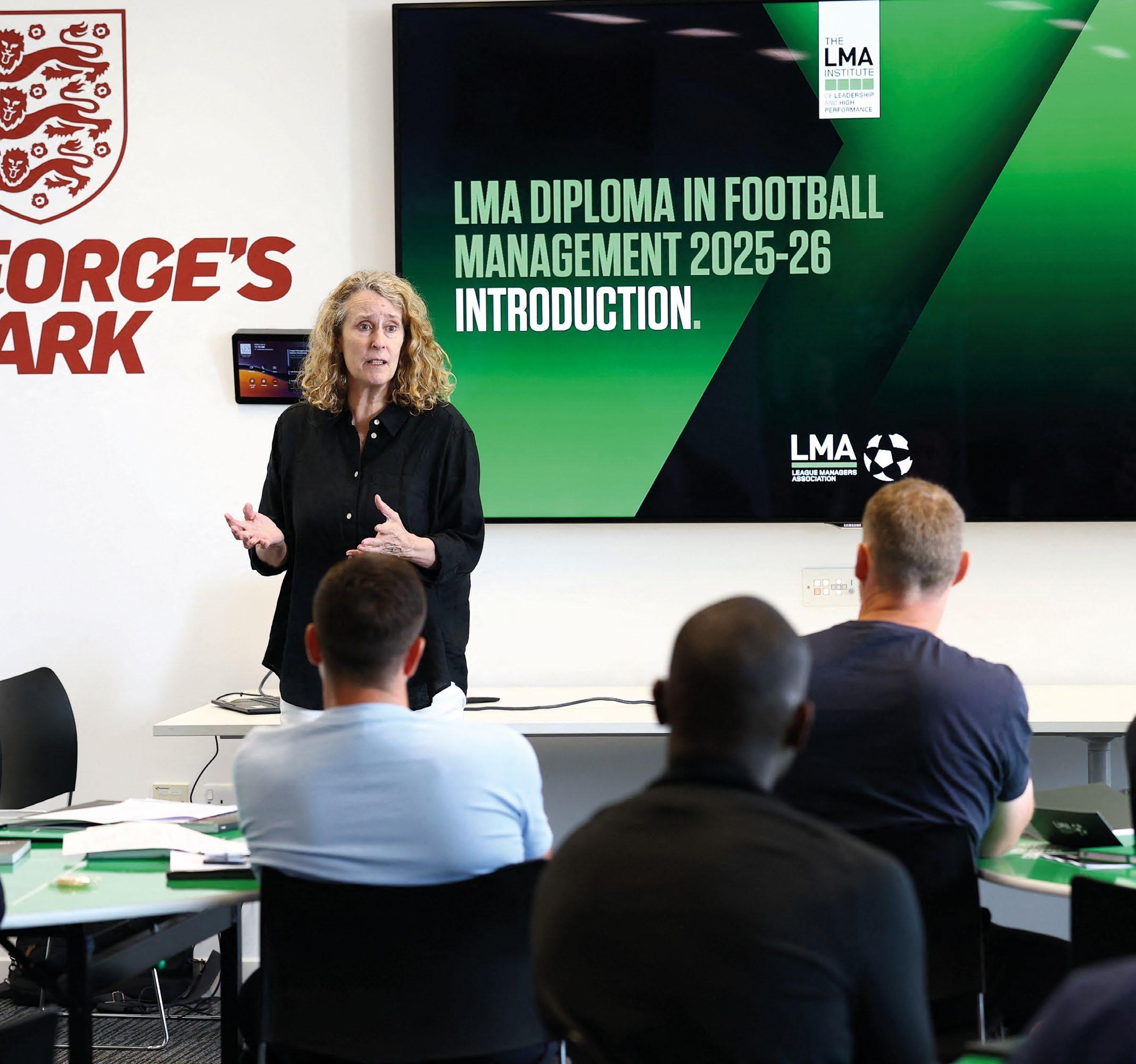
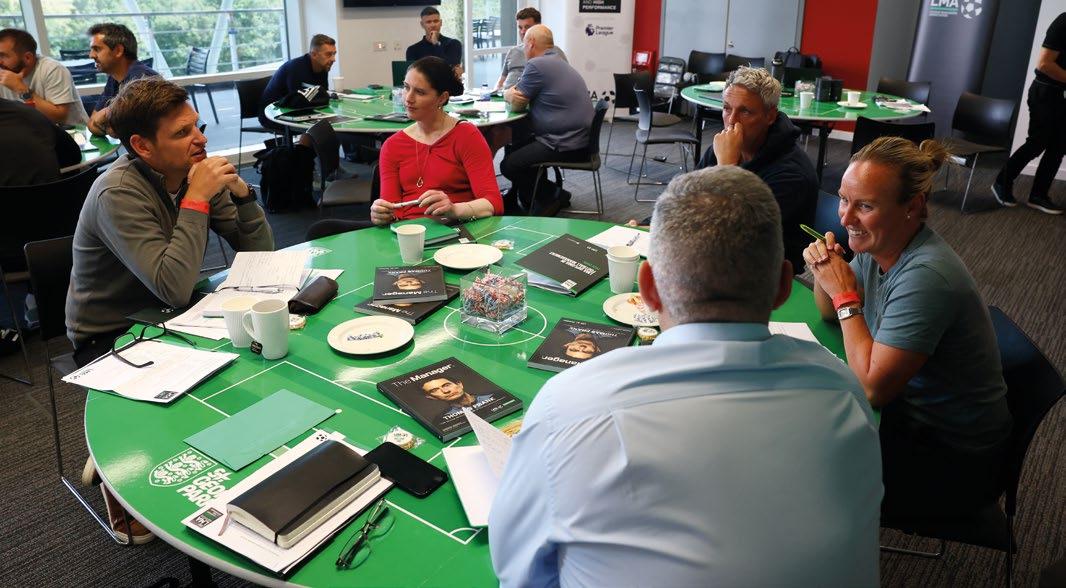
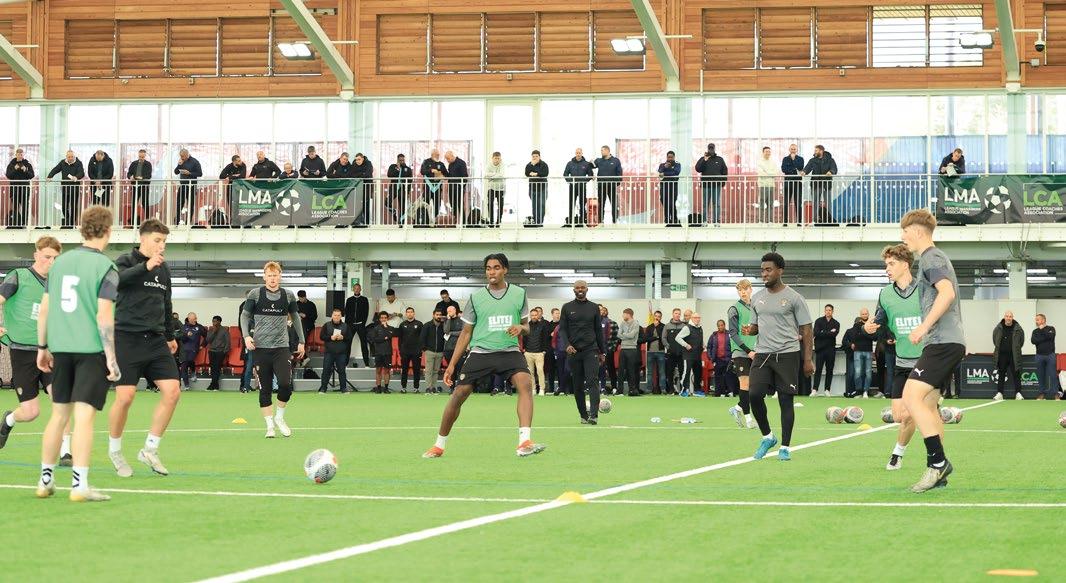
01 Diploma in Football Management
The 2024/25 LMA Diploma in Football Management concluded in Liverpool with a closing residential week. The students participated in vocationally relevant and engaging workshops, including Media Strategy and Skills, Media and the Law, Participant Behaviour and Career Development, Optimal Performance and Self-Awareness.
Meanwhile, the 2025/26 LMA Diploma in Football Management began in June at St. George’s Park, with an opening residential week. The participants ran through the contents of the course and will now work on their first few assignments ahead of their one-day masterclasses, beginning in September 2025 and continuing throughout the season.
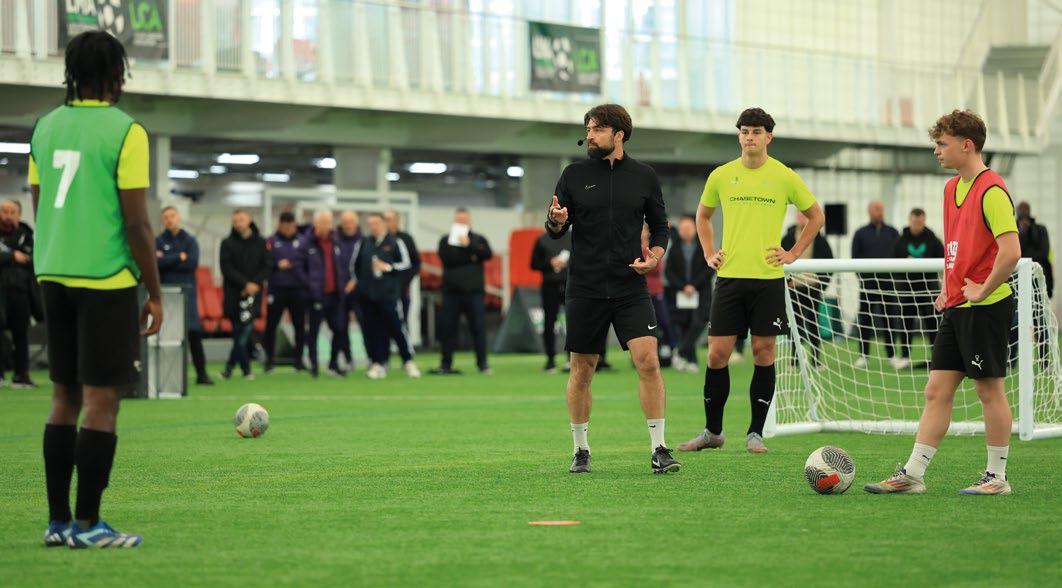

02 Postgraduate Award in Strategic Leadership
The 2024/25 cohort completed their final series of one-day in-person masterclasses at St. George’s Park, rounding off the Governance module of the course. These masterclasses covered Good Governance and Applied Strategic Leadership, with a focus on Leading Change, and included workshops delivered by Professor Geoff Walters and Professor Sue Bridgewater of the University of Liverpool.
03 LMA & LCA Annual Technical Performance Masterclass
The second LMA and LCA Annual Technical Performance Masterclass, in association with Elite Soccer, took place at St. George’s Park in April.
The 2024/25 webinar calendar concluded with online sessions from Anna Hemmings MBE, Holly Sedlacek and Dan Harris. Hemmings covered resilience, and specifically how to overcome, adapt and excel, while Sedlacek discussed team culture and leading with intention. The EFL’s Harris shared insight into the academy retain and release process. 02 03 03 04
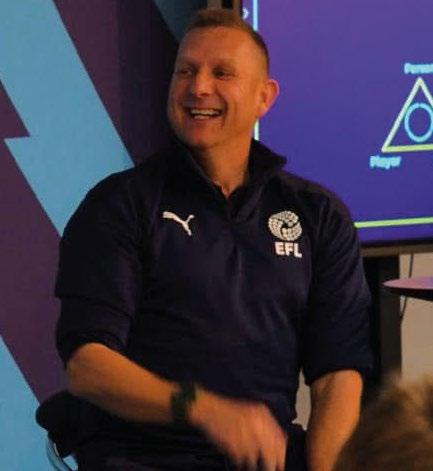
Over 200 LMA and LCA members attended this year’s flagship coaching event, which is designed to provide peer-to-peer insight and practical expertise, with six demonstrations from some of the best coaches in the men’s and women’s professional game. Guest presenters included Ian Evatt, George Boateng, Russell Martin, Gemma Grainger, Jon Brady and Vitor Matos.
04 LMA & LCA Webinars
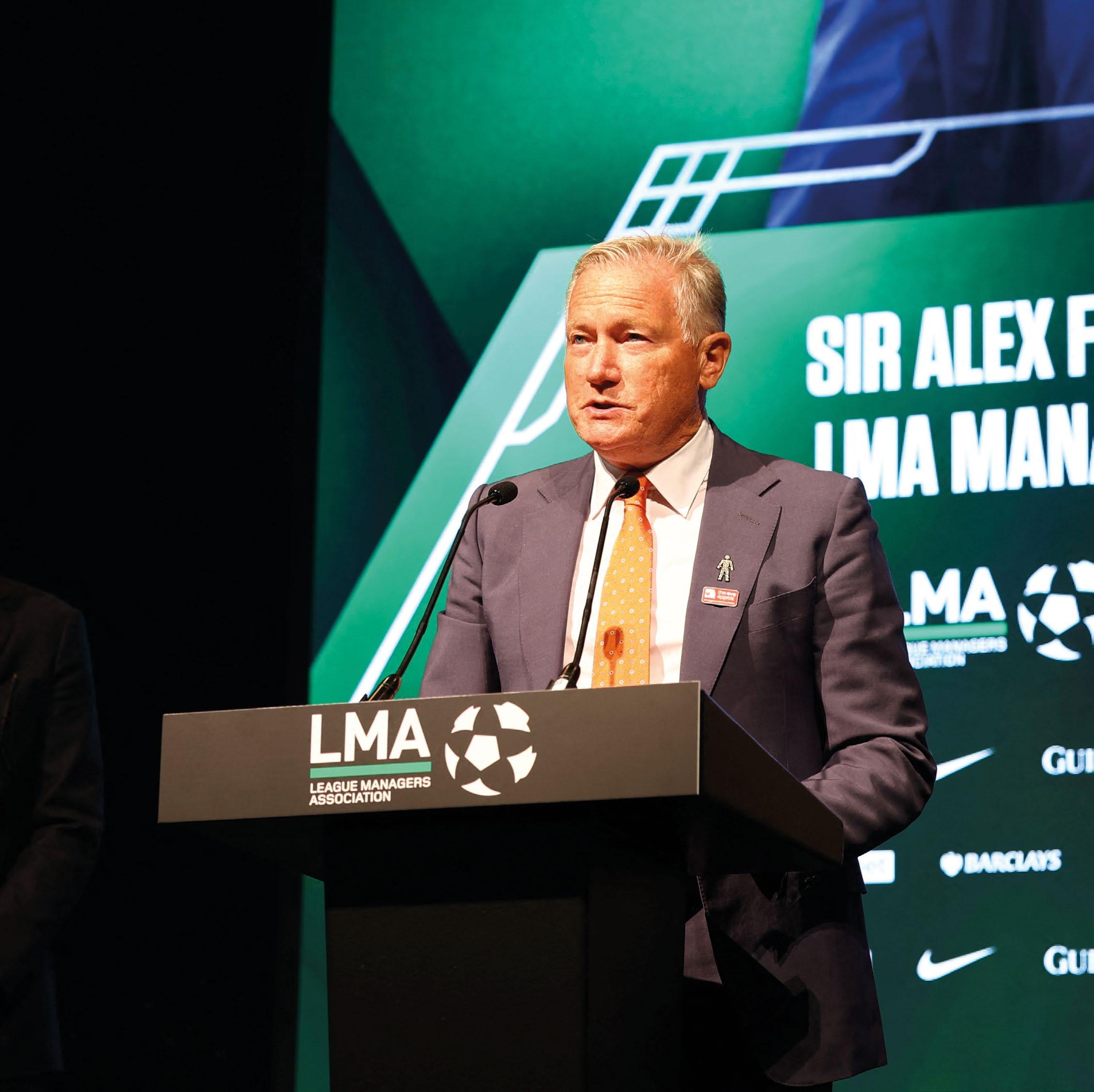
IN THE GAME: CHARITABLE DONATIONS.
As part of its In The Game charity support, the LMA was delighted to donate £10,000 each to Alzheimer’s Society, the Eve Appeal and Prostate Cancer UK.
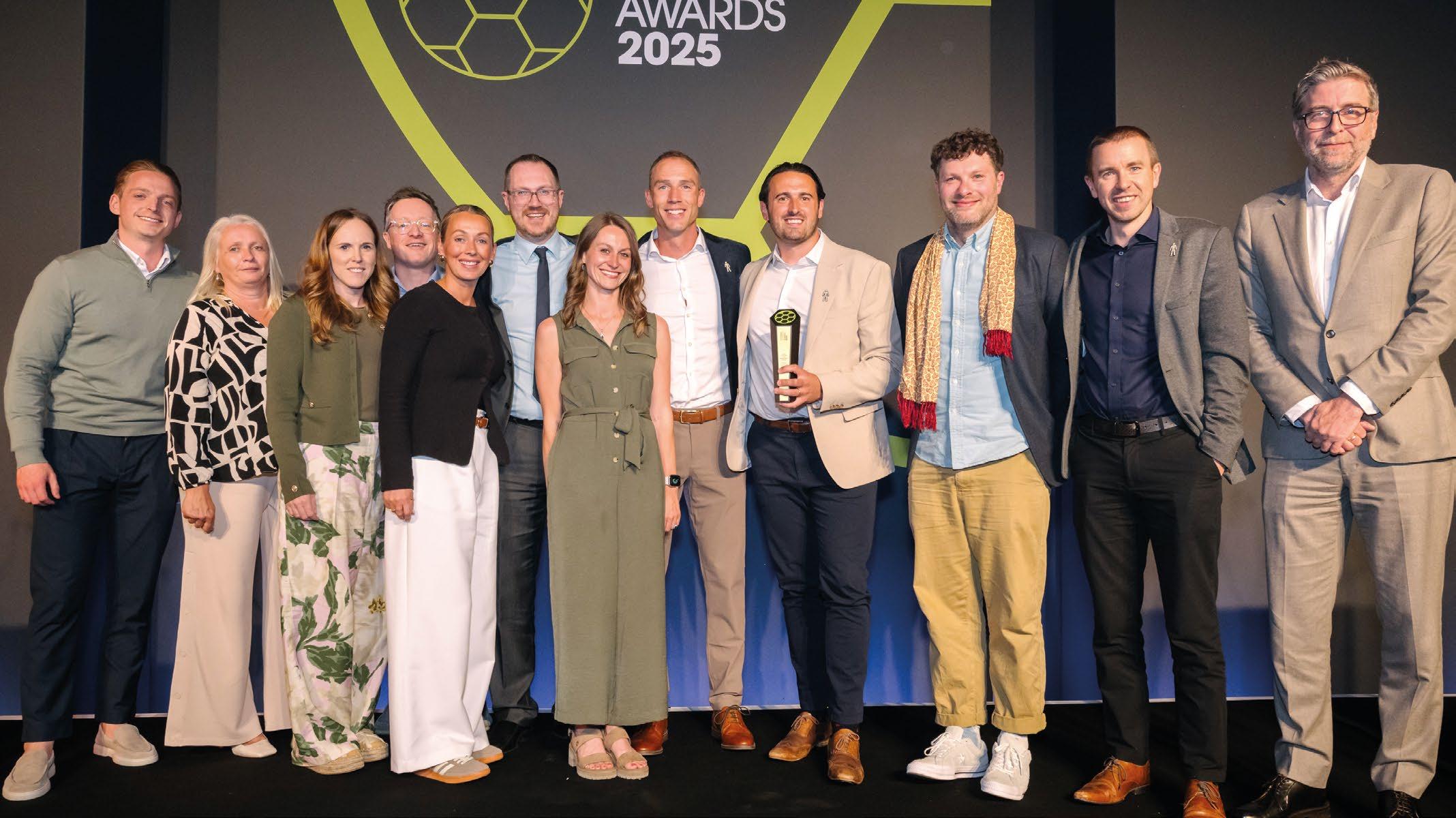
01 Alzheimer’s Society
Alzheimer’s Society and the LMA continue to work in unison to support LMA members and families living with dementia. The LMA has a range of educational support resources and is part of a football-wide awareness campaign.
02 Eve Appeal
The LMA has been proud to support the Eve Appeal with multiple campaigns, including the hosting of an educational webinar for members, helping to reduce the stigma and taboo around women’s health.
03 Prostate Cancer UK
PCUK CEO Laura Kerby has written to LMA members to thank them personally for their continued unwavering support in raising awareness of the importance of prostate checks. The LMA has also shown commitment to this by including prostate and PSA checks in the LMA Health Assessments.
We were delighted that Prostate United, with the support of the LMA, was recognised at the Football Business Awards 2025 for Best Corporate Social Responsibility scheme.
ROUSING, RESPONSIVE AND RESILIENT.
Elite Soccer’s Ben Bartlett explains why you should move beyond a binary approach to coaching, connecting what’s important in your context to the nature of the players in your care.
Photography: Elite Soccer
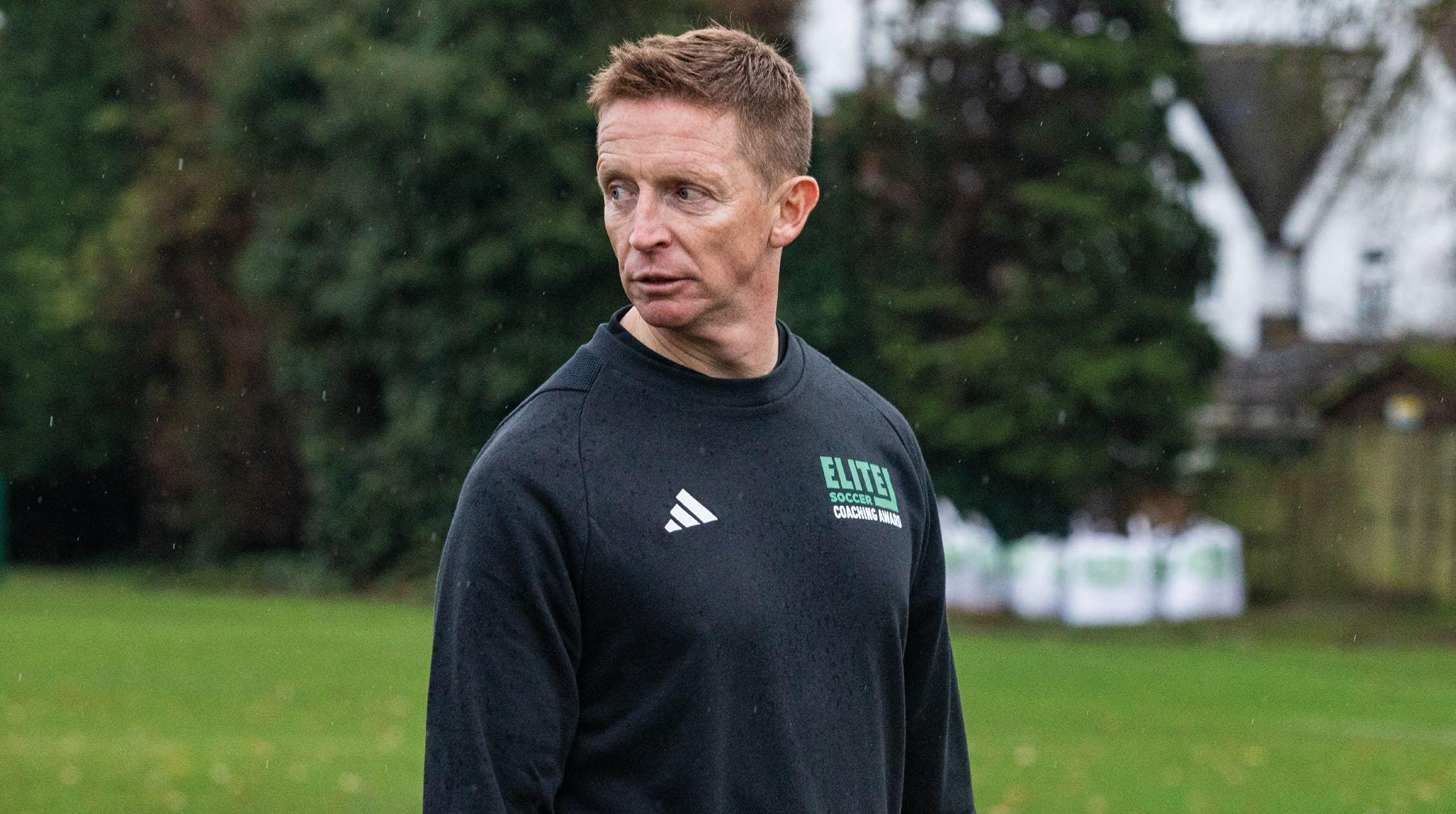
As coaches, we often find ourselves divided and constrained by binary choices. For example, in terms of style of play, we might ask whether we should coach positional play or focus on ‘relational’ football? Likewise, when supporting players in their development, we might question whether it’s better to work from an information processing perspective (where players are taught pre-defined moves and language that they can draw from memory) or an ecological approach to learning, where solutions to problems emerge from individuals’ interactions with the environment.
If we stand in the middle of the road, we fear getting run over in both directions, but by choosing one over the other, we
wed ourselves to a particular way of doing things. In reality, we shouldn’t feel constrained by what may appear to be limited options or controlled by what we believe to be the currently accepted practices.
To be creative rather than simply follow the herd, we need to look to a far broader set of ideas and influences, taking a focused, flexible and responsive approach to human development and, ultimately, soccer. Focusing our attention and learning on better understanding the game and its athletes can help to liberate both coaches and players from rigid rule-based routine and rote replication.
PLAYER DEVELOPMENT
Rather than working to rigid systems of play, principles and
practices, we should be more responsive, connecting what’s important in our context to the nature of the players in our care. Supporting player development should ideally be rousing, responsive and resilient.
Rousing, here, refers to the capacity to elicit positive emotions from the people playing and watching the game, while responsive means responding in ways that take account of our ever-deepening understanding of the people in our care (and the opposition we compete against). That rousing and responsive approach to playing football should be resilient over time, when the competitive temperature dials up and when the opposition adapt to what they believe they know about us.
Therefore, while we may feel the pressure to choose between one practice or another, thereby compromising in one way or other, it is possible to commit to various approaches, connected together.
PLAYING THE GAME
For example, in terms of styles of play, the narrative surrounding relational or positional play is, mostly, unhelpful and inhibiting. Instead we might consider the game in terms of Principles (important moments in the game), Strategies (team interactions that help players navigate those moments) and Tactics (more specific ideas that help us start and stop attacks, and score goals). Figure 1 shows this in more detail.
Flexible frameworks of this
HOW WE PLAY – TEAM
STRATEGIES
FOOTBALL
nature have been useful for me in multiple professional roles, supporting clubs, teams, players and coaches to develop rousing approaches to playing the game while ensuring significant degrees of freedom for players and coaches to express their own unique brilliance. Such thinking frees us from the shackles of positional profiles (often exemplified by stating the specific things a number 10 should do, for example) and the sometimes limiting nature of promoters of positional play, where players occupy arbitrary lanes on a pitch.
In terms of profiling, the more deeply aware we are of the human beings in our care, the more able we are to interact with them, coach them and support their development in ways that are responsive to the person that
TACTICS
SOME IDEAS ON HOW TO ACHIEVE WHAT’S IMPORTANT
they currently are and intend, aspire and have the potential to be. Profiling the players as they are and reflecting what we’ve come to understand about them is a rich investment of our energy.
IN PRACTICE
As for practice design, ensuring that the playing principles from our framework are always ‘in the water’ of our sessions reduces the need to ‘inject’ players with lots of information during stoppages in sessions as these ideas are continually washing over the players. This can support us to highlight ideas, encourage them and praise their progress across multiple events, rather than feeling the pressure for certain things to happen at once.
These ideas are not ‘mental models’ that the players run or
FIGURE 1
THE GAME
POSSESSION
MEASURE – WIN AND DEVELOP ROUSING, RESPONSIVE AND RESILIENT
25.7% INCREASE IN POSSESSION
16% INCREASE IN PROGRESSIVE PASSES
PPDA (PASSES PER DEFENSIVE ACTION)
24.9% REDUCTION IN HOW MANY PASSES THE OPPOSITION ARE ALLOWED
FINISHING ATTACKS
TOP FOUR FINISH
NATIONAL CUP WINNERS
CONFERENCE FINAL CHAMPIONS LEAGUE QUALIFICATION
5% INCREASE IN EXPECTED GOALS
STOPPING ATTACKS
27% DECREASE IN EXPECTED GOALS AGAINST
have to process before executing, or things that we ask them to regurgitate back to us verbatim to demonstrate what they have learned. Rather they are just opportunities for players to act; shaped by their own interactions with what is going on in the game at any given moment.
Our players, within our agreed playing principles, contending with the opposition who are trying to stop us, is a ‘constraints-led approach’ to coaching. This is an approach that supports us to develop the rousing, responsive and resilient approach to football and player development that can illuminate our collective futures.
MEASUREMENT
Finally, the aspects navigated through this article are the things we measure. This can
THE PLAYERS
% OF FIRST TEAM MINUTES PLAYED BY CLUB-DEVELOPED PLAYERS
79% INCREASE
AVERAGE AGE OF SECOND TEAM 2.74 YEARS YOUNGER
% OF MINUTES PLAYED BY ACADEMY GRADUATES
47% INCREASE
support us to check how we, as coaches, are getting on, principally in the same way we check how the players are getting on.
We should measure how we play, and focus on opportunity as a metric. Some of the ways we have reflected on the progress of the team and players in a club environment across a two-season period are illustrated in figure 2.
This places a laser focus on measuring the things we value and enables a club to consider winning from a variety of perspectives: win games, win in progressing the nature of the way soccer is played in your local and more global environment, and win in supporting player development.
The more deeply aware we are of the human beings in our care, the more able we are to interact with them, coach them and support their development.
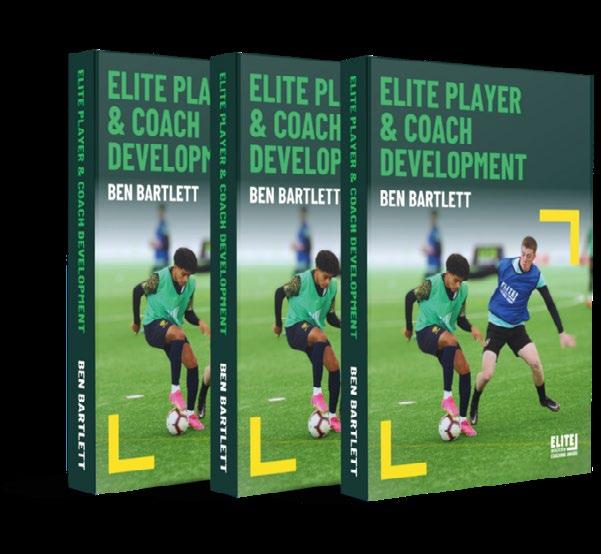
Read Ben Bartlett’s book, Elite Player & Coach Development, for free: www.elitesoccercoaching. net/book/elite-playercoach-development
FIGURE 2


ALL THESE COMPETITIONS IN ONE PLACE
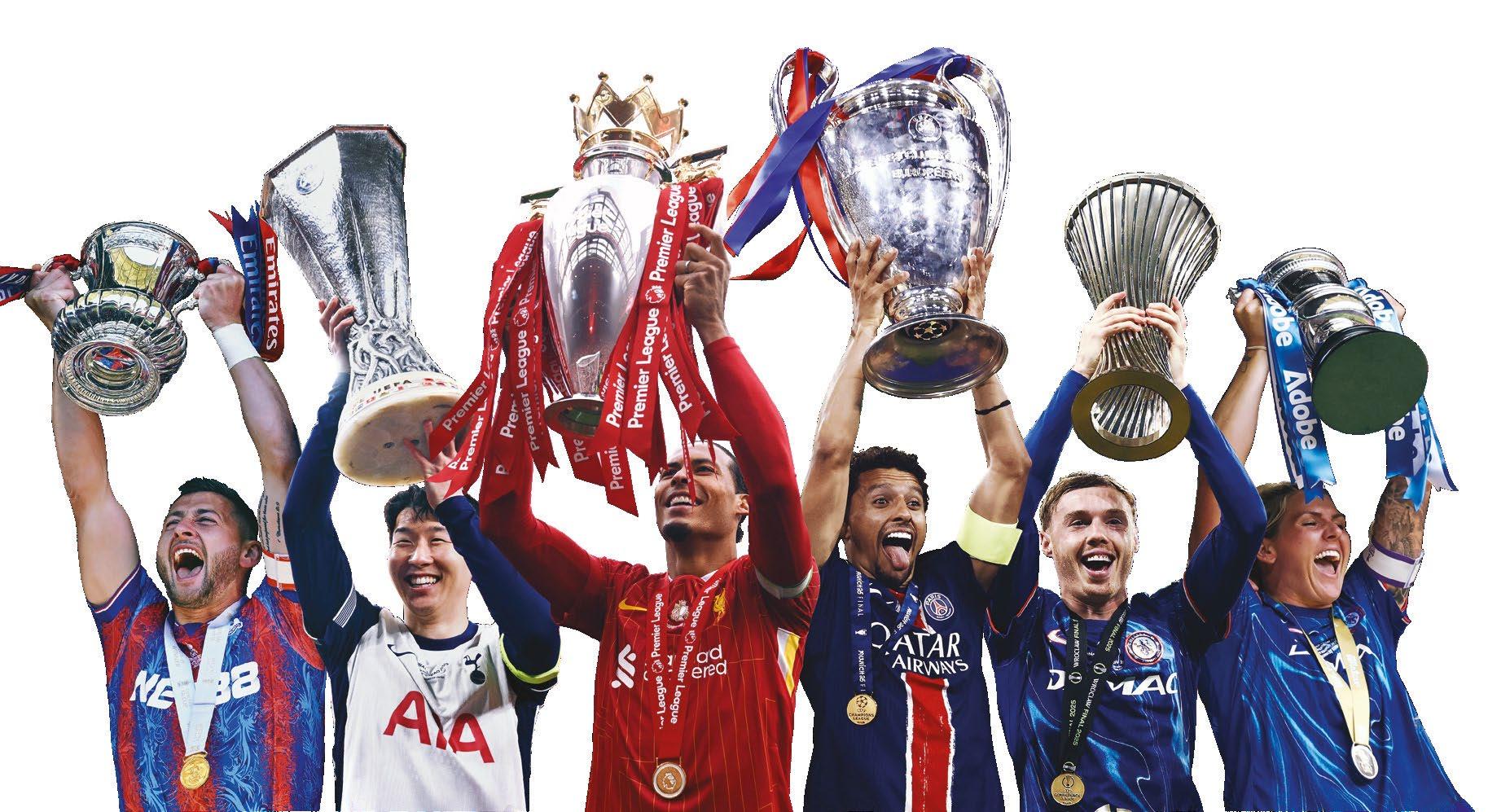


PERSONAL WELLBEING & PERFORMANCE.
PERSONAL WELLBEING & PERFORMANCE COLUMN
Tiana Gordon

THE SCIENCE OF CONNECTION.
For managers operating under intense pressure, relationships are a driver of creativity and productivity, and a buffer against stress, enabling us to not just survive, but thrive.
Before you can connect effectively with others, you need to understand yourself.
If you reflect on the moments that left an indelible mark on you, the chances are they’re rooted in connection – a breakthrough with an athlete, a shared victory with your team, your wedding day, or when your daughter opened up about her crush. These are the moments that energise us and remind us of just how important connections are.
Decades of research by Harvard have shown that social connections are the single strongest predictor of long, healthy and fulfilling lives, even outweighing wealth, fame and genetics. Social activities reduce psychological distress, protect us from chronic heart disease and lower the risk of Alzheimer’s. Despite all this, they tend to be the most overlooked area of professional and personal development.
Practical strategies
Investing in your relationships starts with self-awareness.
Before you can connect effectively with others, you need to understand yourself. What are your triggers, how do you react under stress, and what do you value most in a partnership or team dynamic? The clearer you are about your own needs and responses, the more authentic and effective your interactions will be, making it easier to build meaningful connections.
Some easy ways to improve your self-awareness are reflective journaling, feedback loops with trusted colleagues, and working with a development partner to shine a light on elements that might be holding you back. Selfawareness isn’t a one-off exercise; it’s an ongoing journey. However, once you’ve built a consistent practice into your routine, you can move your focus to the 3Cs: curiosity and vulnerability, commonality and clarity.
Curiosity and vulnerability These are the twin engines of meaningful connection. When
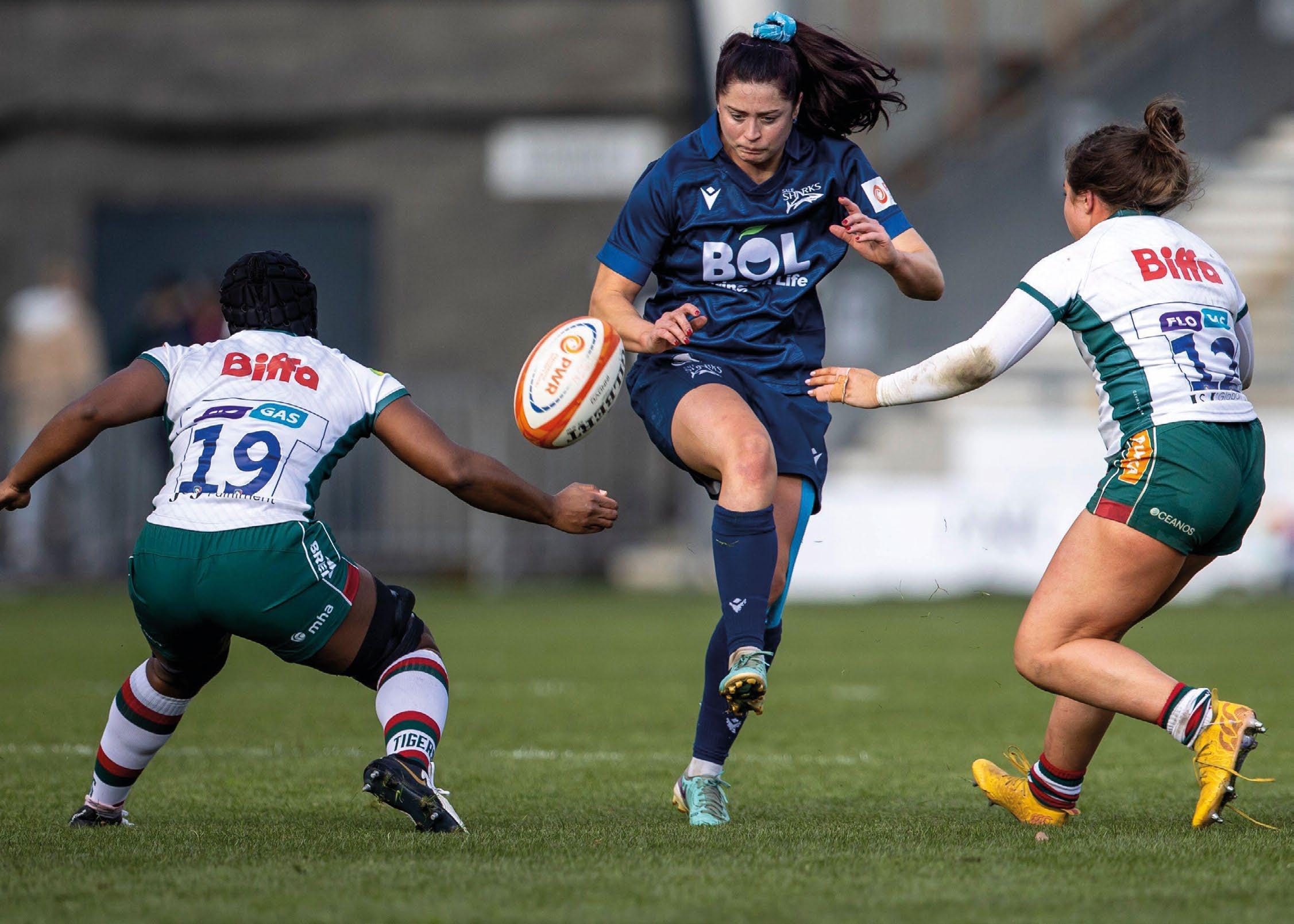
you take a genuine interest in someone around you, whether they be an athlete, a colleague or the barista who makes your coffee, you create a moment of connection that can spark something deeper. Everyone loves to feel seen and valued, and curiosity is the simplest way to show you care.
Vulnerability isn’t about oversharing or wearing your heart on your sleeve. It’s about honesty, openness, and creating a safe space where others feel comfortable reciprocating.
The fastest way to encourage someone else to open up is to take the first step yourself, perhaps by sharing a challenge, admitting a mistake or being real about how you feel.
Commonality
Commonality goes deeper than shared interests or backgrounds; it’s about connecting on the level of thoughts, feelings and perceptions. It’s the understanding that someone else sees the world in a way that resonates with your own. Research shows that when we
find this shared sense of reality, something incredible happens: our neural activity begins to sync, interactions flow more easily and stress levels drop. This creates trust, comfort and genuine affection. To foster this kind of connection, focus on understanding and reflecting on another person’s internal world, their emotions, perspectives and experiences, rather than relying on surfacelevel similarities. This depth of connection creates bonds that are not only stronger, but also more enduring.
Tiana Gordon in action for Leicester Tigers Women alongside Evie Wills and Sale Sharks’ Robyn Wilkins, Salford Community Stadium, 2024. Alamy
When everyone knows where they stand, relationships become less about navigating potential conflicts and more about supporting mutual growth.
Clarity
Great relationships are built not on perfection, but on alignment. Clarity about what you want from a relationship and what the other person expects in return is the foundation of trust and collaboration. Without it, misunderstandings creep in, tensions build, and resentment takes root.
Start by being upfront about what you can offer in a relationship and what you need in return. When everyone knows where they stand, relationships become less about navigating potential conflicts and more about supporting mutual growth. Ultimately, investing in your relationships doesn’t mean becoming everyone’s best friend. It’s about transforming your bonds, so that they’re positive and energising, rather than draining.
Next Steps
If you’re ready to elevate your personal and professional success, start by evaluating your relationship ecosystem. First, reflect on your self-awareness practices. Do you have routines in place, such as reflective journaling or working with a development partner?
Next, map out your key relationships by identifying the people you interact with most frequently, whether weekly or daily. For each relationship, ask yourself two important questions and rate them on a scale of 1 (not at all) to 6 (very much). How helpful is the connection and how upsetting is it? Relationships that score above 2 on both questions tend to be the most harmful, because they are positive, but highly straining. Reflect on whether these are relationships that you want to continue nurturing. If they are, think about how you can apply one of the 3Cs to strengthen the bond. By investing in these relationships, you will elevate your wellbeing and professional success, clearing the path to unlock your potential.
Tiana Gordon is the founder of Peak Team Performance, which supports coaches and leaders to unlock sustainable high performance. A semi-professional rugby player for Leicester Tigers and a specialist in social connection, Tiana brings a unique perspective to team performance. Her work focuses on optimising coach-athlete relationships and team dynamics. For more info, visit www.peaktp.com

LEE RICHARDSON
REINVENTION STARTS WITHIN.
Former player and manager Lee Richardson is now a successful psychologist, running his own mental health and performance consultancy, and working with clubs such as Liverpool FC and Lancashire CCC. Here, he shares how passion and curiosity took him on a completely new career path.
Words: Alice Hoey
Photography: Reuters // Action Images // Liverpool FC
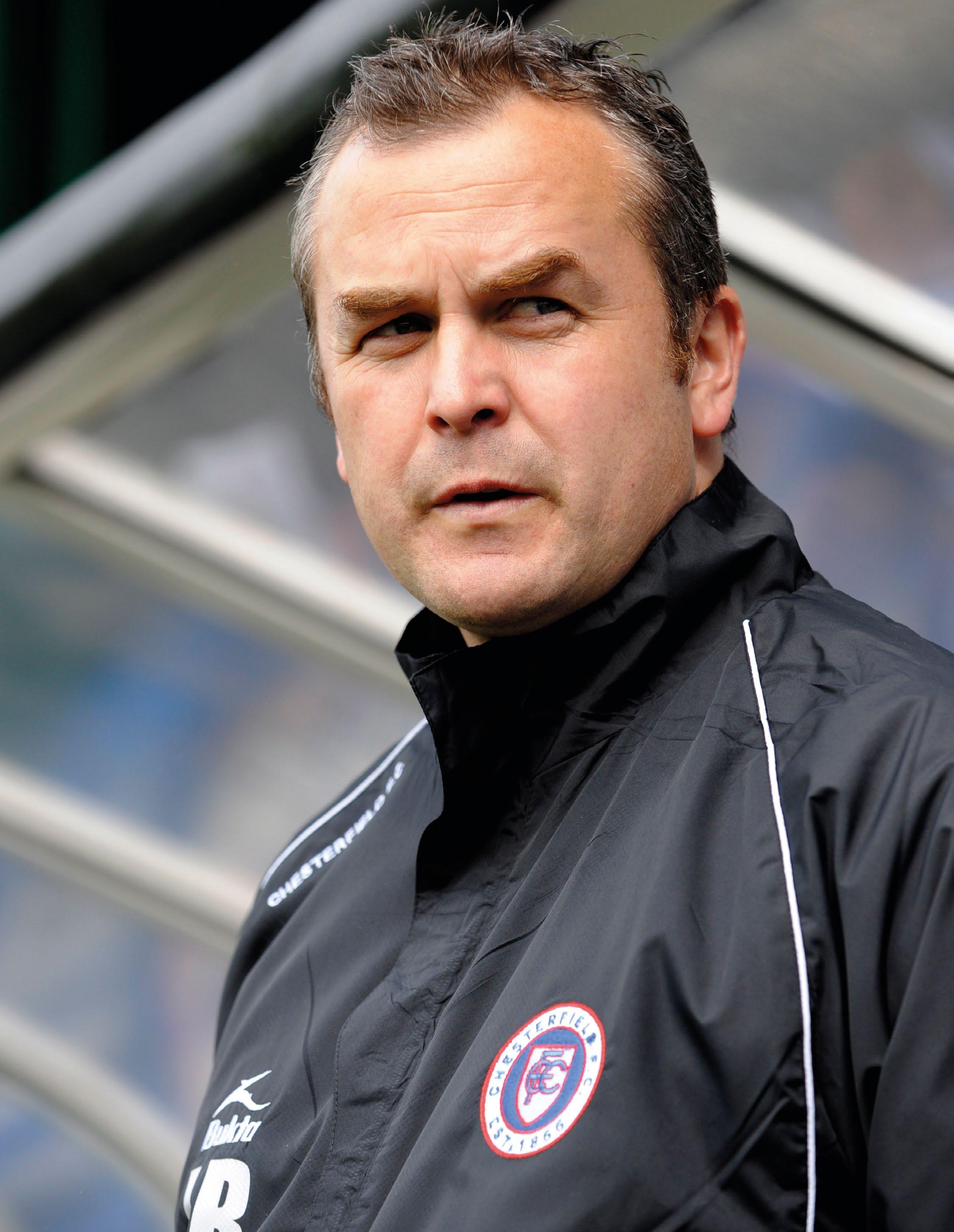
As well as working within club medical departments to help players deal with the mental impact of injury and rehab, Lee Richardson provides managers, coaches, support staff and their players with all-round support around mental wellbeing and performance, including aspects of game analysis and with the psychological elements of recruitment.
“At times, with the demands and pressures of the game, there is plenty of firefighting with both players and staff, while at other times I’m educating others to be firefighters, because I work with different departments to share knowledge and skills,” he
says. “I think it’s important to have an informed approach in this area, as it can be reassuring for people to know that there’s someone in the building who has experience and expertise in and around mental performance, mental health and wellbeing. With even the finer details often proving decisive, considering the psychological aspects of performance is crucial.”
Certainly, he adds, this wasn’t the case during his own near20-year playing career. In fact, it was the realisation that there was such a huge untapped potential in sport psychology that sowed the seed of interest in the field. “I recognised towards the end
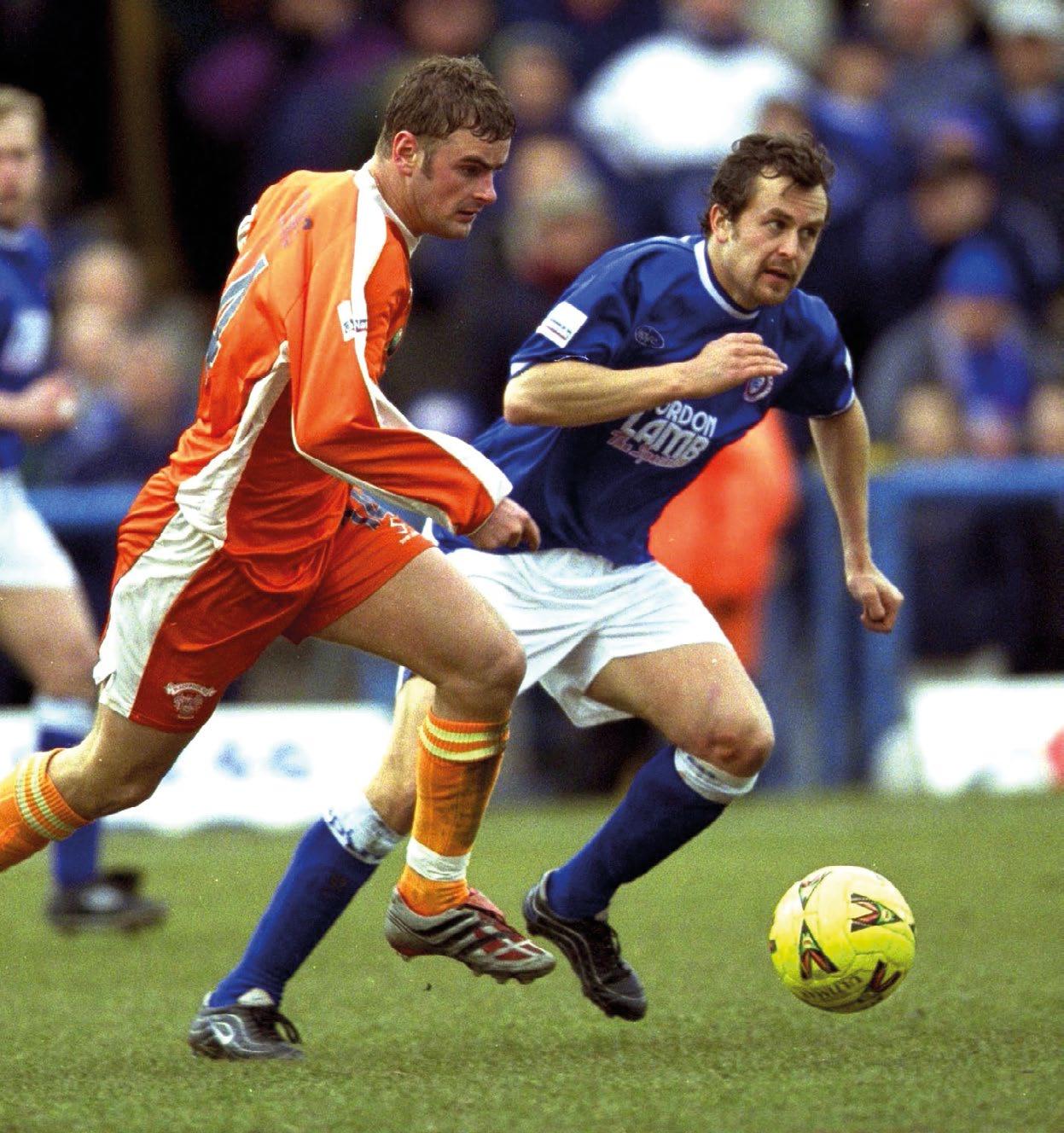
of my time as a player, in the late 1990s, that so many of the performance challenges that we faced as a team were linked to what was going on in our heads,” he says. “Yet, there was little going on in that area in the industry at the time; there was very much a one-size-fits-all approach to managing people and their problems.”
ACADEMIC PURSUITS
Richardson embarked on an Open University course in Social Sciences, which then progressed to a degree in Psychology, as he was beginning to transition from player to coach at Chesterfield.
I recognised towards the end of my time as a player, in the late 1990s, that so many of the performance challenges that we faced as a team were linked to what was going on in our heads.
Given that Richardson had left school without much in the way of qualifications, these deep forays into the world of academia took determination and courage, not to mention a huge investment of time and energy. However, he says it was driven by curiosity. “I don’t know that I had lots of self-belief back then, but what I did have was a genuine passion to find out more about the subject,” he says. “I do believe that both players and managers have huge potential to reach out into different fields, and to achieve things they never imagined they could. The biggest challenge is often not doing the course or
training required, but actually identifying what it is that you’d like to do and taking the leap.”
Richardson later completed his coaching badges and Pro Licence before becoming manager of Chesterfield, then struggling for survival in League One. “My plan B in terms of my career was always to go into the field of psychology. When, in 2009, my contract as manager of Chesterfield wasn’t extended, I decided that rather than wait indefinitely for another similar opportunity, I’d set up my own consultancy business, Achievement In Mind (AIM). Three years later, I set up the
Psych Tech business AIM-FOR with my elder brother Nick, who is also an ex-pro player and tech specialist.”
Richardson also completed a Master’s course in Sports Psychology, and with his steadily mounting qualifications and first-hand experience of the world of football, had no trouble securing work. Rather than resting on his laurels, however, he was keen to expand his knowledge and potential further, and so embarked on the five-year journey to acquiring British Psychological Society chartered status. “It was the hardest thing I’ve ever done, but it made me very
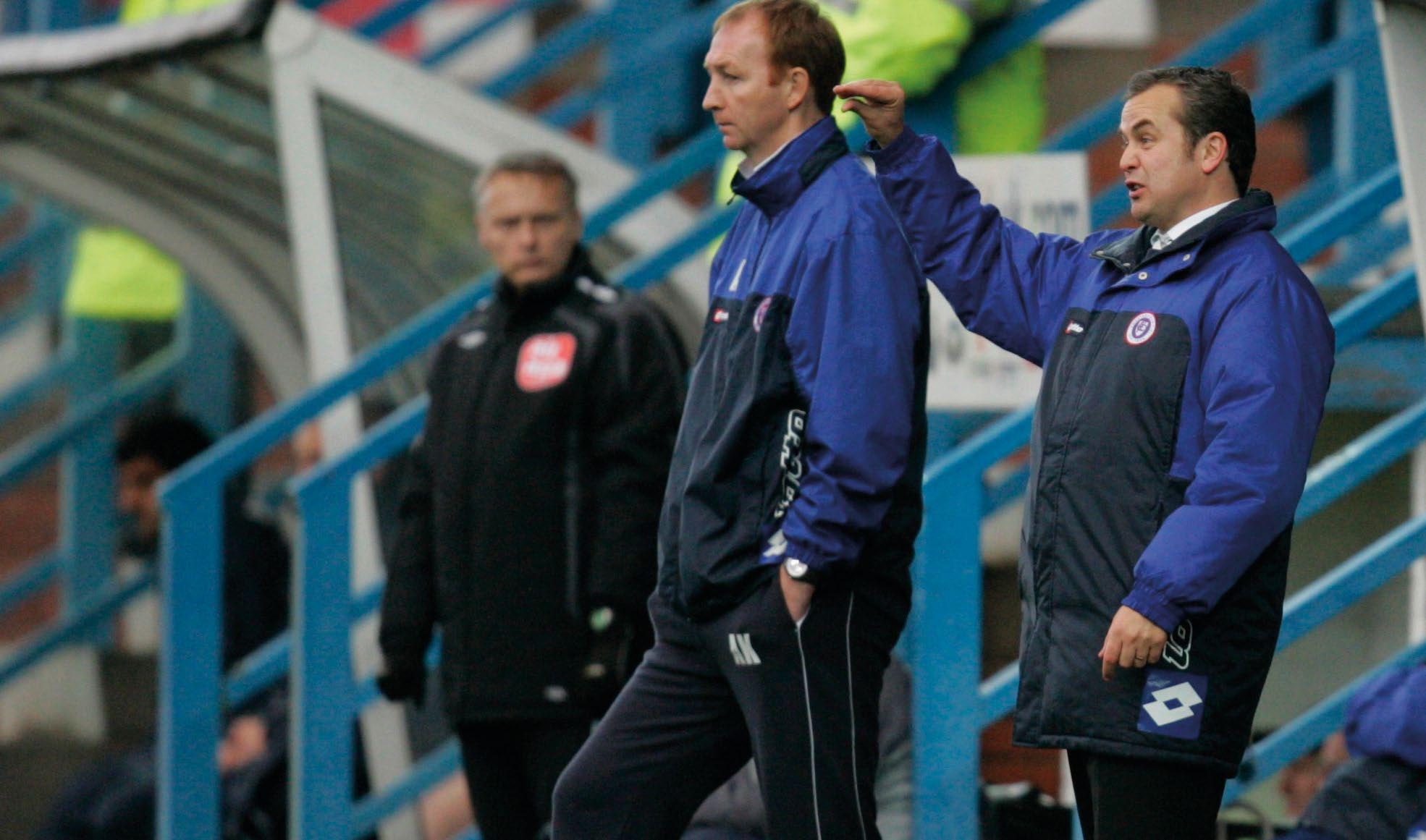
Lee Richardson as Chesterfield manager during the side’s FA Cup first round match against Tranmere Rovers, Saltergate, 2007. Reuters // Action Images
Just because you started out on one career trajectory doesn’t mean there aren’t other paths available.
proud, because I never imagined I’d achieve chartered sports psychologist status or that I’d have my own enterprise. I think, trying to work out what you want to do for the rest of your life is too big for most people. It’s better to focus on the next five years, because they might lead to something else and the path may then become clearer. Before you know it, a lot has happened.”
APPLY YOUR TALENT
Just because you started out on one career trajectory doesn’t mean there aren’t other paths available, he adds, provided the curiosity and determination are there. Indeed, he believes anyone who has made it to football league coach or manager has already proven they have a highly valuable and transferable skillset.
This includes man-management skills, communicating with and influencing different audiences, understanding how to motivate others, and tactical and technical planning. Richardson adds to this list multi-tasking and adaptability, something he says was crucial as manager of Chesterfield. “Aside from the coaching side of things, I was involved in everything from dealing with agents, signing players and liaising with their families through to getting the shirt numbers printed and doing my own analysis,” he says. “Sometimes I would even drive the bus to the training ground.”
As well as equipping him with a broad set of skills and the ability to spin multiple plates, his tenure as a manager gives him a unique insight as a psychologist. “It’s certainly an advantage in this role to have had experience both as a player and on the coaching and management side of things,” he says. “It means I understand not only the academic aspects, but also the realities of the game, the difficult decisions that need to be made and the mental health challenges of coaches and players alike.
“For example, I know from my own experience how tough it can be to transition from player to coach and equally from manager to another role. You can feel that you’re losing part of your identity,” he says.
THE FOUNDATION OF EVERYTHING
He has seen also, over the course of his career, the impact that the pressure of the game, combined with personal issues and mental health, can have on player wellbeing. In 2009, Richardson went to the PFA with the concept of the Safety Net, an accessible educational platform on mental health, which was launched in 2014. It was one of the first of its kind anywhere in the world.
“There was very little information or support available around mental health back then,” he says. “In fact, even the words ‘mental health’ would
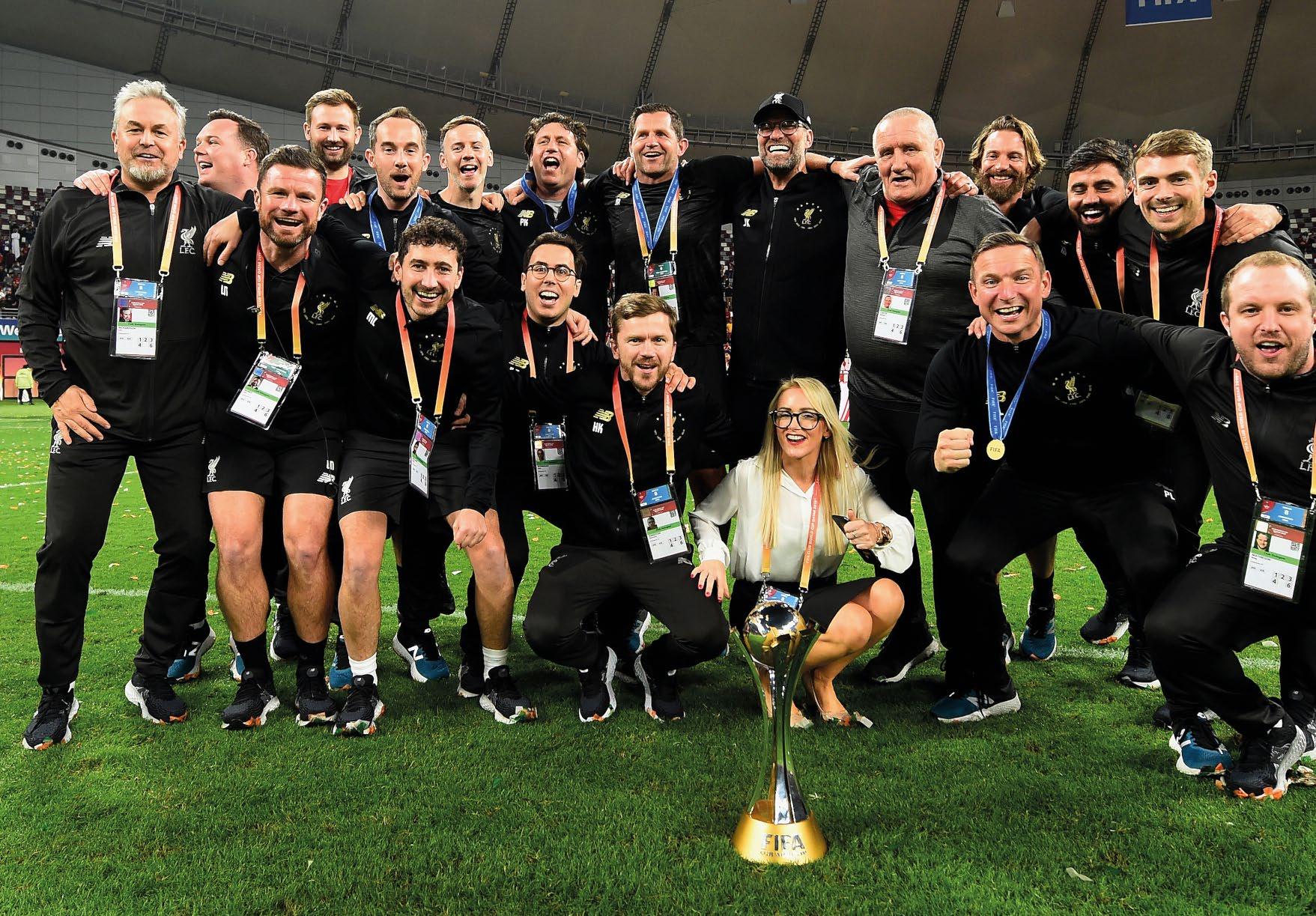
It’s from those difficult situations and emotions that we develop resilience, learn to cope with adversity and bounce back stronger.
have people wincing, because it was so taboo. It’s interesting to see today how far the pendulum has swung the other way. That’s a really good thing, but I do think we need to recognise that good mental health doesn’t come from shielding ourselves from challenge or disappointment. It’s from those difficult situations and emotions that we develop resilience, learn to cope with adversity and bounce back stronger.”
While there’s now far greater understanding of key
psychological principles such as resilience, reflection and self-assessment in sport and business, Richardson believes there’s still much that is relatively untapped. “At the end of the day, everything we do or think links back to psychology,” he says. “That’s the realisation I came to, right back at the start when I embarked on my Open University course. Psychology underpins everything, every technical, tactical and physical aspect of performance. As someone once said to me, psychology is so big, we sometimes struggle to see it.”
Lee Richardson (first on the left) with Jürgen Klopp and the backroom staff after their Club World Cup win in 2019.
Liverpool FC
TIME TO SHIFT THE DIAL.

Weight management is one of the fundamental pillars of long-term health. As HCA Healthcare explains, with the right support it can be achieved even within the most demanding of schedules.
Photography: iStock
In the pursuit of optimal performance on the pitch and the wellbeing of team members off it, the manager’s own health can slip down the list of priorities. Packed schedules, irregular patterns and frequent travel can make weight management a particular challenge for even the most experienced and organised of managers. Weight gain, particularly in mid-life, can also be influenced by factors such as hormonal shifts, stress, reduced activity and disrupted sleep.
As well as impacting negatively on mood, self-esteem and energy, being overweight can lead to high blood pressure, joint problems and sleep apnoea. Serious long-term issues, meanwhile, include type 2 diabetes, cardiovascular disease, certain cancers and fatty liver disease.
As with cardiovascular screenings and prostate health assessments, early intervention in weight-related issues can significantly reduce future complications. However, while there is no shortage of diets and fitness regimes available, unless these are tailored to the individual and grounded in
medical expertise, they tend to have only short-lived results.
TAILORED AND COMPREHENSIVE
The HCA Healthcare UK Healthy Weight Management Programme was created with this in mind. Rather than promoting quick fixes or crash diets, it focuses on behaviour change techniques, goal setting and motivational strategies, sleep and stress management, and long-term nutritional education.
The programme offers a confidential and holistic weight management service designed for individuals with busy, high-stakes careers. This means activity plans are practical, sustainable and built around existing commitments. Throughout the programme, experienced GPs conduct indepth health reviews, screen for related conditions like hypertension or diabetes, and monitor progress.
Meanwhile, dietitians create nutrition plans that are designed around real-life needs and habits, promoting sustainable choices over restrictive fads. There is also support from
clinical psychologists, helping clients to address behaviours, motivations, and emotional triggers around eating and lifestyle. These consultations can be arranged around fixtures and travel, with virtual followups ensuring that support continues, wherever you are in the season.
MADE TO LAST
What sets the HCA model apart is its sustainability. The interventions are designed not only to reduce weight, but to embed lasting, positive habits. Even after the initial programme ends, clients receive follow-up tools, nutrition advice, and exercise support. Additionally, the HCA team can link with other specialists if needed, from endocrinology to cardiology, ensuring that any underlying health issues are addressed holistically. Health doesn’t need to conflict with career. It can enhance it, because improved stamina, sleep and stress management all contribute to performance, on and off the pitch.
For more information about the HCA Healthcare UK Healthy Weight Management Programme, please visit www.hcahealthcare.co.uk
COLLECTIVE EFFORT IS KEY.
Challenger health and life insurer Vitality has deeper links with AFC Bournemouth than just its namesake stadium. They are both ready and willing to compete in the big league.
Photography: Vitality
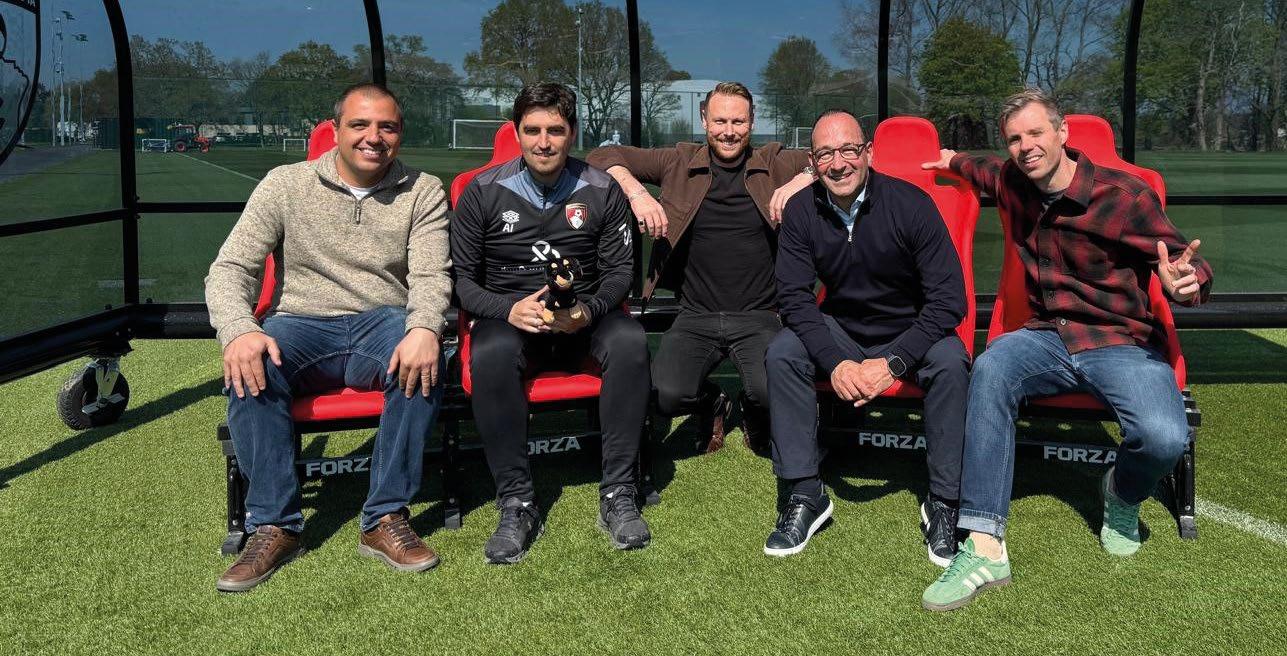
Vitality Deputy CEO
Greg Levine sat down with Bournemouth manager Andoni Iraola at the club’s state-of-theart training facilities to share their experience of reaching new heights and getting the best out of people.
Under Iraola, who joined Bournemouth from Rayo Vallecano in 2025, the club matched its career-best ninth position in the 2024/25 season, finishing above the likes of Manchester United and Tottenham Hotspur.
Speaking with Levine for Vitality’s YouTube channel, Iraola said it’s the willingness to challenge that makes all the difference. “We are fighting against clubs that are bigger than us, and we use that as a tool,” he said, adding that they also look beyond their own sport for inspiration and insight.
“I like to analyse different sports. Cycling, for example, may be an individual sport, but it’s still a whole team effort, where everyone works together, often to give one cyclist the edge. This
kind of collective effort is key in football,” says Iraola. “You can’t have individual success without it.”
THE BACKROOM
The Cherries’ new state-of-theart training ground means the side has the best possible environment in which to perform, but Iraola says what really makes the difference is the people working in it. Having the right talent around him to deliver on his vision is key.
“In football, everything is about the people and focusing on what you want to achieve,” he says, “so while the new facility is amazing, it won’t win us games. Without my support team of analysts, coaches and so on, I couldn’t get the best out of the players.”
BEING A LEADER
As a former player who spent most of his professional career with Athletic Bilbao, Iraola can manage his team members with first-hand experience and empathy.
“I remember moments when I was struggling as a player,” he reflects. “As a manager, I know that to help
You cannot have individual success without collective success.
everyone achieve their best means taking different approaches with each of the players.”
He also understands that there is sometimes a balance to be struck between building a resilient team and protecting them. “Good teams,” he says, “are built in hard times,” but it’s important to consider when to give feedback. “I tend to discuss a player’s weaknesses, for example, when they’re on a high, because in low moments it isn’t helpful to hear criticism.”
NOT EVERYTHING’S ABOUT FOOTBALL
Leaders, too, need to find a balance, with time away from the pressure of the game. Iraola says he benefits from having a family that isn’t particularly into football. “Sometimes, I’ll get home after Bournemouth have just won a big game, and find the kids fighting, and in two minutes we’re not talking about football,” he laughs. It’s good for his mentality, he admits, because it helps him focus on other things. He’s a dad and a husband, as well as one of football’s fastest-rising coaches.
Vitality Greg Levine (2nd from right) chatted with Bournemouth manager
Andoni Iraola (2nd from left) at the club’s training ground. Vitality




THE GAME.
PETE THOMAS INTERVIEW
A FRESH TAKE ON A HISTORIC COMPETITION.
Since launching in one of the most competitive and demanding markets in the world in 2023, TNT Sports has put fans first, broadcasting the game differently, with a lighter, more relatable tone. Now preparing to broadcast the Emirates FA Cup and Adobe Women’s FA Cup competitions for the first time, Head of Football Pete Thomas shares why he’s so excited about the opportunities the move presents.
Interview: Alice Hoey
Photography: C1 Media
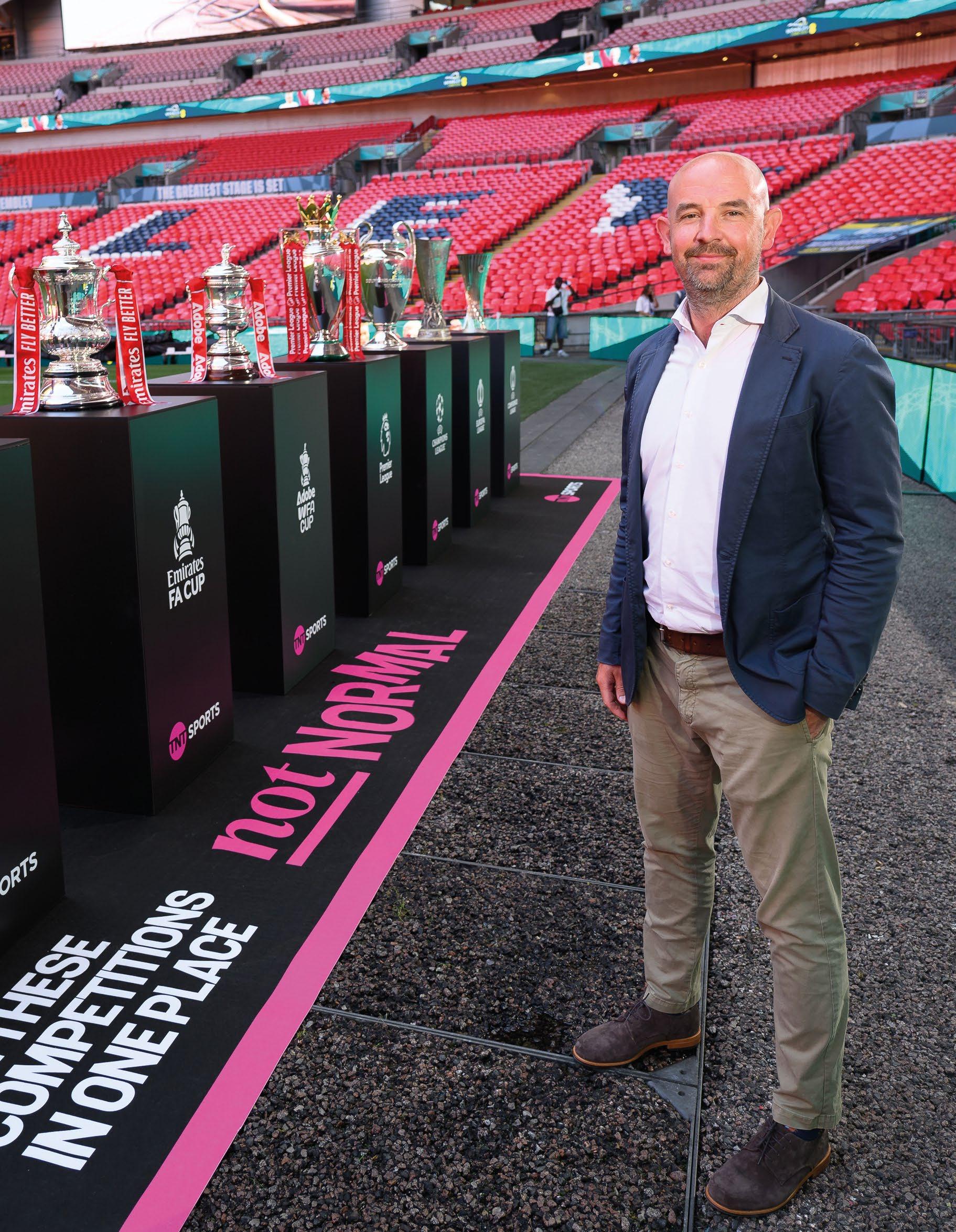
TNT Sport’s Pete Thomas stands in front of the 2025/26 season’s trophies.
C1 Media
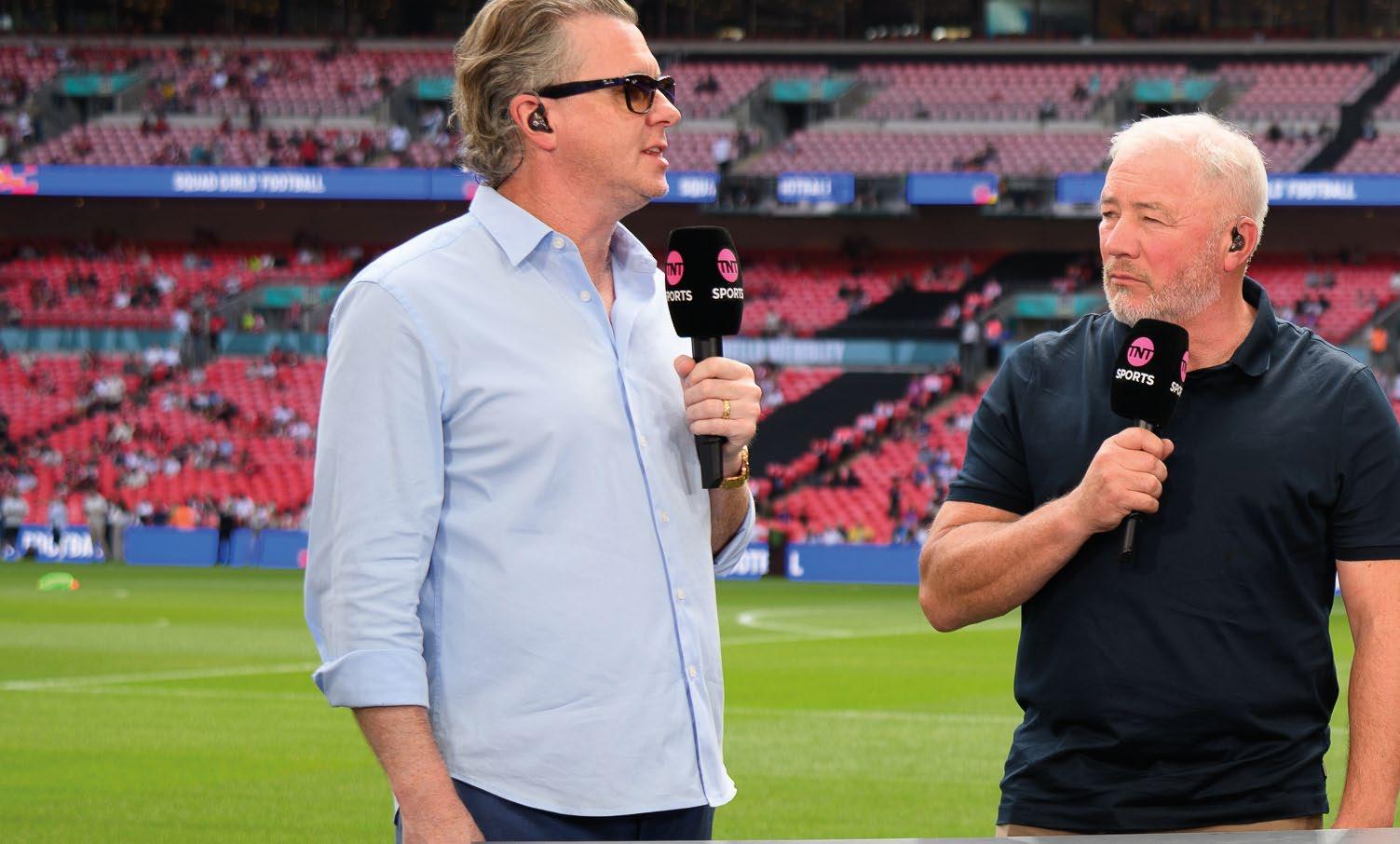
WHAT DOES HAVING THE CHANCE TO BROADCAST
THE FA CUP AND WOMEN’S FA CUP MEAN TO YOU PETE?
Working on the Cup has been a real high point for me, so far, professionally and personally as a football fan. It’s different from broadcasting the Premier League, principally because we have the opportunity to visit clubs and their communities that we otherwise wouldn’t necessarily get out to. The beauty and charm of the FA Cup is in the stories that emerge on and off the pitch, the excitement and hope of the fans, the chance to face up against some of the giants of the game, to progress, or even just get a goal, against the odds. I’m really looking forward to telling those stories
as they emerge, because of course it isn’t just the end result that matters, especially in the FA Cup, it’s the changing hopes and dreams over the 90 minutes and beyond.
…AND OF COURSE
YOU’LL HAVE ACCESS TO THE MANAGERS OF THOSE CLUBS ACROSS THE LEAGUES.
Absolutely, managers and head coaches at all stages of their careers, from different backgrounds, and with contrasting styles and approaches. It’ll be a fantastic opportunity to showcase those leaders, to get to know them better and tell their stories, as well as perhaps also members of their coaching and support staff.
What’s key is that we really want to work with the clubs at every step of the way to ensure we’re telling their stories in the right way, getting across the unique characters of their clubs and fans. That means actively seeking feedback and insight from those clubs, because it’s important that we look constantly for ways to learn and improve, especially in our first year of broadcasting the competition.
ARE THERE ANY PARTICULAR CHANGES OR SURPRISES IN STORE THIS SEASON?
In football, as in other sports, we’re constantly looking to push the boundaries on our coverage to improve the viewer experience and bring them closer to the
TNT Sports presenters Laura Woods, Ally McCoist and Steve McManaman.
C1 Media
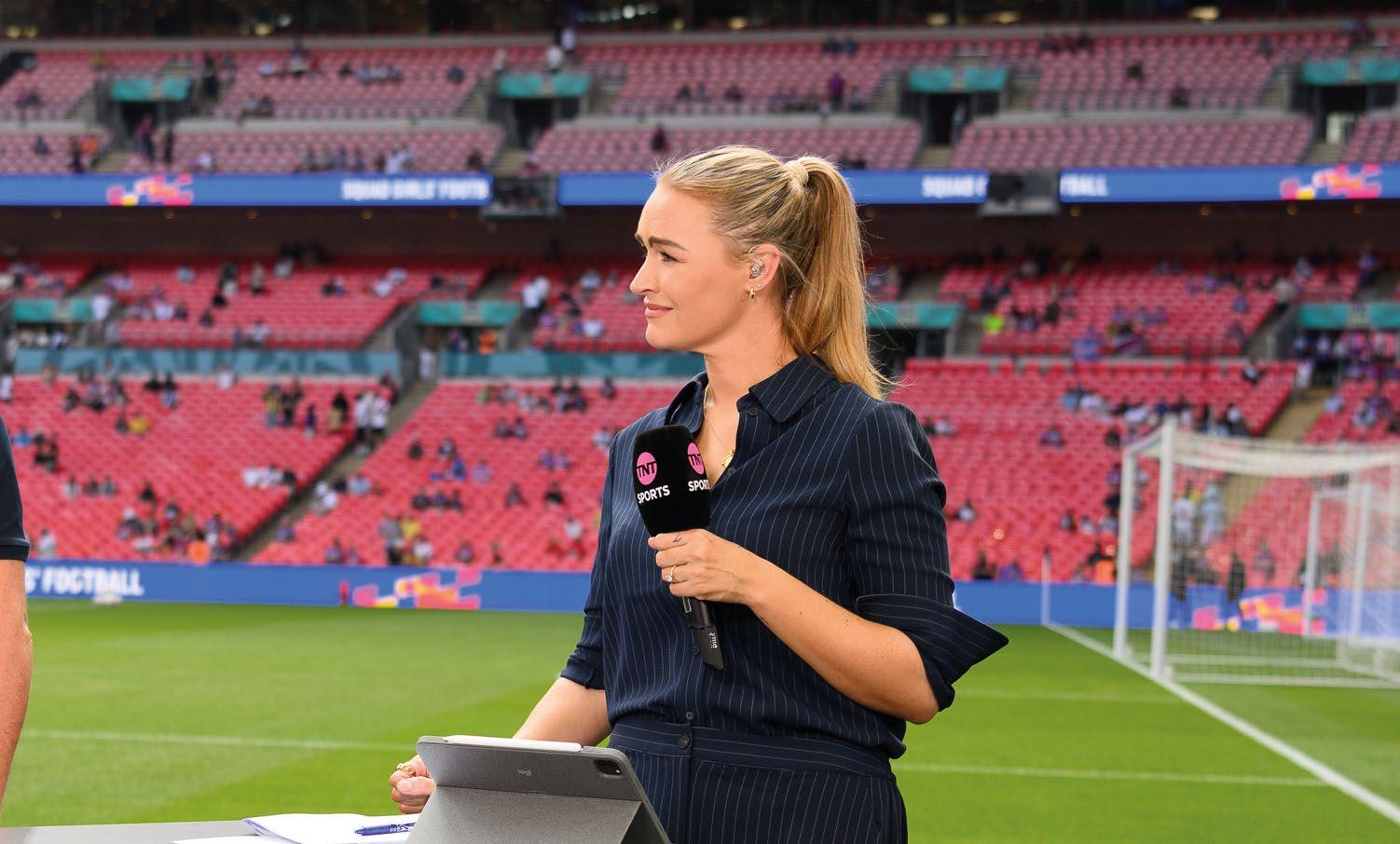
game. But, importantly, any changes have to add value for both the clubs involved and the viewers; we’ll never make changes or use gimmicks for the sake of it. The FA Cup is a great opportunity to do that; it’s down to earth, it’s about community and heritage.
We want to find ways to really bring the essence of what it feels like to be a club fan to life, so while we might talk about being pitch side, for example, the pitch isn’t necessarily the part of the club that makes people feel most connected or excited about the game. It might be your first sight of the stadium as you turn up, or the walk up to the turnstiles. We want to bring that authentic feeling, and make it fresh and
modern, but without the need to throw in gimmicks along the way.
IT’S AN EXCITING TIME TO BE BRINGING THE WOMEN’S FA CUP IN PARTICULAR. HOW ARE YOU APPROACHING THE OPPORTUNITY?
We’re committed to tackling it in much the same way as the men’s FA Cup in terms of visibility, and our focus on telling the stories that allow fans to really connect with their clubs and to the competition as a whole. But, while the platform and broadcast may look similar, we’re not coming at it with a broad brush. We understand that the Women’s FA Cup is unique; in particular, its fanbase is different and will connect with subtly different
stories and approaches, so we need to ensure we’re catering to that viewership.
We may also have some opportunities in the Women’s FA Cup to get even closer to the players and their clubs and managers. That will really help us to bring their stories to life, and create some strong narratives that people can connect with all the way through the competition. We’re working closely with The FA in that to find additional ways to raise visibility around the Women’s competition this year. It’s an incredibly exciting time, and we’re looking forward to making TNT Sports the home of the FA Cup, for both the men’s and women’s game.

FINANCIAL WELLBEING: SIX BUILDING BLOCKS.

According to Arbuthnot Latham’s 2024 Financial Wellbeing Report, financial planning is cause for concern for even affluent individuals, with 81 per cent admitting they ‘regularly feel stressed or worried about finances’. Here, the wealth management firm explains how expert support can provide peace of mind.
Photography: iStock

In senior leadership and management, pressure is a constant companion. From tactical decisions and contract insecurity to media scrutiny, the demands on a manager’s mental resilience are immense. Mental resilience is not about grit; it is about clarity, focus and the ability to make sound decisions under pressure. Therefore, anything that clouds that judgement, increases stress and distracts focus presents an additional challenge.
Given that financial management is a common concern, even among wealthy individuals, having the right support in this area can allow leaders to remain calm and focused on the job in hand. At Arbuthnot Latham, we believe there are six key areas that are key to financial peace of mind.
Anything that clouds that judgement, increases stress and distracts focus presents an additional challenge.
1. CASHFLOW FORECASTING
With earnings that fluctuate (bonuses, short contracts, gaps between jobs), cashflow forecasting gives you visibility over your finances, what’s coming in and going out, and what’s needed for the future. This control helps you to plan ahead, avoid surprises, and stay calm even during uncertain times.
2. RISK MANAGEMENT
With illness, injury or career disruption possible, having the right protection in place is vital. Income protection, critical illness cover and life insurance all play a role in shielding your family and lifestyle. With these foundations covered, you reduce the stress of what ifs.
3. TAX PLANNING
You may have complex earnings, including bonuses, endorsements or international income. Strategic tax planning ensures you are not paying more than necessary, and that income and assets are structured efficiently. Seek independent advice to stay compliant and optimise your position.
4. LIQUIDITY PLANNING
Even if your assets are substantial, they may not be very accessible. Readily available savings or investments ensure you can manage costs when needed, giving you flexibility, security and breathing space.
5. PENSIONS AND INVESTMENT PLANNING
You can’t predict how long your career will last, so it’s essential to plan ahead. A strong financial strategy, whether through pensions, investments, property or a combination of these, can help secure your lifestyle well after retirement. Diversification and regular reviews are key to long-term success and can bridge income gaps and support future goals.
6. ESTATE AND SUCCESSION PLANNING
Planning your legacy is about more than just making a will. Structuring your estate through trusts or tax-efficient transfers ensures your wealth is passed on according to your wishes. It also protects your family and gives you peace of mind that everything is in place.

REGULAR CHECK-INS
Financial planning is not a one-off exercise; it is an ongoing process. Your financial plan should adapt to life’s changes. Reflect regularly on whether your expenses or income are shifting, if your savings and investments are on track, and if your ambition or family situation has changed. Regular check-ins with a trusted adviser can also help to ensure that your plan stays aligned.
Financial planning is not about numbers and spreadsheets, but about empowerment and freedom, freedom to focus, to lead with clarity and to be fully present. As Arbuthnot Latham’s research confirms, peace of mind comes not from how much you have, but from how supported and in control you feel.
In partnership with trusted advisers, financial planners
can build a financial strategy that supports both your professional ambitions and your personal wellbeing. Because when your finances are in order, your mind is free to focus on what you do best.
To find out how Arbuthnot Latham can help you manage your wealth with confidence, contact Sam Green, Senior Private Banker, on SamuelGreen @arbuthnot.co.uk
CHECK IN ON WELLBEING.
The Premier League’s Inside Matters campaign aims to raise awareness of mental health and encourage fans to check in on the wellbeing of others.
Premier League
Photography:

During, and in the lead up to, Health Awareness Week (12-18 May) Premier League clubs helped to promote positive conversations around mental wellbeing, and highlighted the work going on in local communities to support fans with their mental health.
With research by the Premier League showing the power of football in connecting people and initiating conversations, the League is encouraging fans to reach out to fellow supporters, friends and family. Doing so can make a huge difference to their mental health and wellbeing.
To help initiate conversations around mental health, players and managers from all Premier League clubs have been filmed
making a call to check in on friends or family members. Among these were West Ham United head coach Graham Potter, speaking with his brother, and Brentford’s Thomas Frank, seen checking in on his motherin-law.
To help fans access professional support, the Premier League is collaborating with Shout, a free, confidential 24/7 text support service, run by the charity Mental Health Innovations. UK fans can text SHOUT to 85258 to receive round-the-clock support from trained volunteers, supervised and supported in real time by an expert clinical team.
Through the partnership, the League provided funding for Shout’s helpline services over the
weekend and during Mental Health Awareness Week.
Premier League Chief Executive Richard Masters said, “Football has a unique ability to bring people together and spark conversations. We want to harness this power to encourage fans to check in on those they care about.” Victoria Hornby, CEO of Mental Health Innovations, added, “Taking the time to check on others can have a huge impact on their wellbeing. Shout volunteers have taken more than three million conversations with people in crisis, and we know that asking if someone is OK can help them to open up about how they feel. It’s crucial that we keep the conversation going.”
DISCIPLINE AND RESPECT.
The FA has announced new measures to help improve behaviour and combat misconduct in grassroots football.
Photography: Alamy
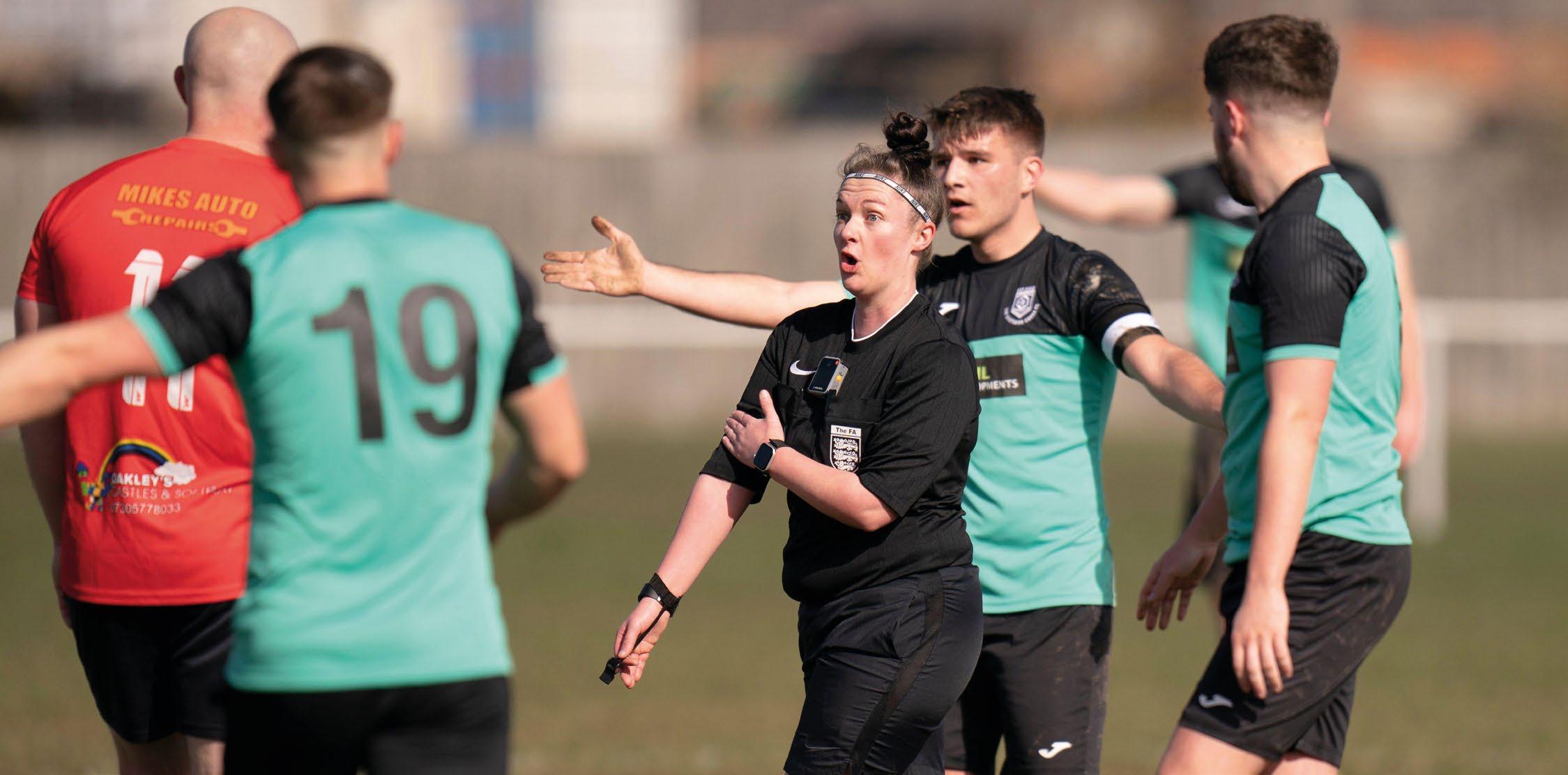
The interventions, which form part of the ‘Love Football. Protect The Game’ campaign, aim to drive a positive culture across grassroots football and will act as a clear deterrent against unacceptable behaviours. A number of measures have been introduced or will be trialled for the 2025/26 season, including a captains only protocol, whereby only the team captain can approach a match official to discuss a decision after it has been made, and cooling off periods to help prevent escalation during heated moments in a match.
Following the trial introduction of bodycams in over 4,000 matches across eight leagues last season, they will now be used in certain leagues targeted as a result of discipline records. Furthermore, all youth referees (those under the age of 18) will have the option this season to
wear a yellow armband to signify that they are not an adult. This will serve as a visual notice to players, coaches and spectators to treat them with an extra level of respect and patience.
Penalty points will continue to be attributed to teams for offences that are behaviourbased, such as violent conduct, dissent or threatening behaviour. Ultimately, ongoing accumulation of penalty points can lead to the removal of England Football Accreditation or even the removal of a team from a competition.
Following on from the introduction of league points deductions in grassroots football in 2023, The FA is committed to tackling repeat offenders, and points deductions can be applied to clubs where there are repeated incidents of serious misconduct,
for example, discriminatory abuse from spectators.
There will also be a mandatory minimum fine for the most serious of cases, including offences aggravated by reference to a protected characteristic, threats, physical contact or assaults on match officials and player-on-player assaults.
Finally, The FA’s Behaviour Improvement Programme will run again this year following its success in the 2024/25 season. The programme uses discipline and respect score data to monitor clubs for poor conduct, including dissent, abuse of referees or players, and serious misconduct. Clubs accumulate penalty points for repeated incidents and receive respect scores from opponents, creating a league table that identifies both the worst offenders and consistently well-behaved teams.
Referee Sophie Wood wears a bodycam during a Division One Manjaros Langbaurgh League match in April 2023. Alamy
Arsenal Women celebrate winning the 2024/25 UEFA Women’s Champions League after beating Barcelona 1-0 in the final in Lisbon, 24 May.
Reuters // Action Images
